

HOW ʼBOUT THAT LITTLE ROCK TOUCHDOWN CLUB!
INSIDE: ECONOMIC DEVELOPMENT / HOSPITALS AND HEALTH CARE / LREA Hall of Famer Jimmy Johnson leads all-star lineup


• Office
•
• Rehearsal
•
•
•
•
•
•
•
•

Precision and Protection in Cancer Treatment
WHAT WE DO

Everbranch invests in real estate and in businesses that enhance connectivity with the outdoors, led by people of exceptional character. We o er more than capital: we mentor, support, and connect operators within a growing ecosystem of mission-aligned companies. Together, we preserve heritage and build lasting value.
EVERBRANCHGROUP .COM




FEATURES AUGUST 2025
LRTDC SCORES AGAIN
The Little Rock Touchdown Club unveiled its 2025 lineup, led by former Razorback, Super Bowl champion and Fox Sports broadcaster Jimmy Johnson.


LEADERS ONLY, PLEASE In Little Rock’s close-knit community, one need not look far to find individuals who have played a substantial role in the capital city’s growth over the decades.
(Photo by Michael Steele/PA Images)

Louis Petit’s rise to the highest echelon of the restaurant game has been a dish of serendipity flavored by good fortune and hard work.
ECONOMIC DEVELOPMENT
The Natural State gets its name for a reason. Tourists are flooding to Arkansas, with its 52 state parks and a national park, in record
Time was when a big-city chamber of commerce was primarily interested, even exclusively, in hosting networking events. No more.
Arkansas Economic Developers & Chamber Executives annually recognizes outstanding individuals working in economic development in Arkansas.
HEALTH CARE
The Journal of the National Cancer Institute reported 18.1 million cancer survivors in the U.S, about four times as many as 30 years ago.
Natural medicine has taken off in the Natural State, mirroring a long-building trend of patients looking to correct hormone imbalances and more.
Since 2022, the 988 Lifeline has answered more than 13 million calls, texts and chats from people across the country in need of support.
Hunter Biram of the University of Arkansas Division of Agriculture talks row crops, legislation and tariffs, and how the impact on Arkansas farmers.
Little Rock’s Blue Truck is a 24-hour, seven-days-a-week operation, and the deliveries are not going to schedule themselves.
Janell Mason has seen a little bit of everything in her role as CEO of Ronald McDonald House Charities of Arkansas & North Louisiana.
The Little Rock Trojans are investing in athletics. Facilities are getting a hard look, and efforts at donor engagement have redoubled.
How does one even begin to compress into mere words the journey of the Arkansas Razorback football fan? Another daunting SEC gauntlet awaits in 2025.
PRESIDENT & PUBLISHER
Heather Baker | hbaker@armoneyandpolitics.com
EDITOR-IN-CHIEF
Dwain Hebda | dwain@armoneyandpolitics.com
SENIOR EDITOR
Mark Carter | mcarter@armoneyandpolitics.com
ASSOCIATE EDITOR
Mak Millard | mmillard@armoneyandpolitics.com
EDITORIAL COORDINATOR
Darlene Hebda | darlene@armoneyandpolitics.com
COPY EDITOR
Sarah DeClerk | sdeclerk@armoneyandpolitics.com
STAFF WRITERS
Doug Crise | dcrise@armoneyandpolitics.com
Alex Hardgrave | ahardgrave@armoneyandpolitics.com
MANAGING DIGITAL EDITOR
Kellie McAnulty | kmcanulty@armoneyandpolitics.com
ONLINE WRITER
Kilee Hall | khall@armoneyandpolitics.com
PRODUCTION MANAGER
Mike Bedgood | mbedgood@armoneyandpolitics.com
SENIOR ART DIRECTOR
Angela Stark | astark@armoneyandpolitics.com
GRAPHIC DESIGNERS
Lora Puls | lpuls@armoneyandpolitics.com
Lee Smith | lsmith@armoneyandpolitics.com
SENIOR ACCOUNT EXECUTIVE
Greg Churan | gchuran@armoneyandpolitics.com
ACCOUNT EXECUTIVES
Michelle Daugherty | michelle@armoneyandpolitics.com
Mary Funderburg | mary@armoneyandpolitics.com
Karen Holderfield | kholderfield@armoneyandpolitics.com
Carrie Sublett | carrie@armoneyandpolitics.com
EXECUTIVE ASSISTANT
Jessica Everson | jeverson@armoneyandpolitics.com
ADVERTISING COORDINATOR
Lisa Hern | ads@armoneyandpolitics.com
CIRCULATION
circulation@armoneyandpolitics.com
INTERN
Mary LeSieur
ADMINISTRATION
Marissa Porter | ayoffice@armoneyandpolitics.com
CEO | Vicki Vowell
TO ADVERTISE call 501-244-9700
email hbaker@ armoneyandpolitics.com
TO SUBSCRIBE armoneyandpolitics.com/subscribe
CONTRIBUTORS
Dr. Nirvana Manning, Justina Parker, Lori Sparkman, Harry Anthony Patrinos, Josh Stanley, Todd Traub, Ryan Parker
While policymakers are taking a hard look at the doctor shortage, a host of bright, young Arkansas medical students are not waiting for a go-ahead.
As students approach the end of their high school years, college tends to dominate most every conversation. For studentathletes, that now includes NIL.

A quality education is at the top of our
list for our child’s future, so we found a plan. No matter what higher education looks like when they’re ready for it, we’re saving today for their brilliant future.
The Arkansas Brighter Future 529 Plan allows our education savings to grow tax-deferred.
And
Help make your child’s future brilliant with an Arkansas Brighter Future 529 Plan. Open your account today.
PLUGGED

ON THE COVER
Former Hog, Super Bowl winner and Fox Sports broadcaster Jimmy Johnson, pictured during his time as head coach of the Miami Dolphins, will speak to the Little Rock Touchdown Club on Aug. 26.
The story starts on page 12.
Photo by Rich Kane Photography.
FEEDBACK
11TH ANNUAL LITTLE ROCK GOLF SHAMBLE TO HONOR BUCKY MAGNESS
I can’t think of anyone more deserving of this recognition than Bucky Magness. He is a true southern gentleman with a heart of gold. Congratulations Bucky!
Ashley Phillips Carper
AMP TRAILBLAZING WOMEN: ERIN LAINE
Love Erin Laine!!! Fabulous businesswoman!
Bryant Phelan
KEVIN TRAINOR JOINS ARKANSAS ALUMNI ASSOCIATION AS COO
Wow! Congratulations, Kevin Trainor!
Olivia Kays
CORRECTION
Nesia Dotson, associate director of product marketing at First Orion, and Max Hicks, project manager at McClelland Consulting Engineers, are members of the 2025 class of AMP ’s “Future Icons.” The wrong bios ran for each of them in the July issue. Below are the correct bios.
Wynesia A. “Nesia” Dotson, MBA, CDE
First Orion

Nesia Dotson is the associate director of product marketing at First Orion, where she leads go-to-market strategies, messaging and positioning for cutting-edge communication solutions. With more than 18 years of diverse experience, she blends deep expertise in telecom, operations and leadership to drive initiatives that resonate with customers and deliver business impact. Dotson began her career in the telecom industry working for Alltel Communications and Verizon Wireless, where she honed her skills in customer experience, employee development and leadership support — earning accolades such as the Verizon Coins of Excellence. She has a Bachelor of Science in business management and a Master of Business Administration from the University of Phoenix. She is certified by the Product Marketing Alliance, the Institute for Diversity Certification and Birkman. Passionate about empowering others, she shares weekly insights about leadership and personal growth across social media.
Max Hicks, P.E.
McClelland Consulting Engineers

Max Hicks is a licensed professional engineer in Arkansas and serves as a project manager at McClelland Consulting Engineers, where he specializes in water and wastewater engineering. A 2021 graduate of the University of Arkansas in Conway with a Bachelor of Science in civil engineering, Hicks began his career with MCE as an intern in the water/wastewater division, gaining hands-on experience throughout his career. With more than four years of postgraduate experience, he has contributed to the design and implementation of water and sewer lines, sewer lift stations, and wastewater treatment plant improvements across Arkansas. He currently serves as the credit hour chair for the Arkansas Water Young Professionals Network and served as the YP chair for the Arkansas Water Works and Water Environment Association in 2025 with the goal of supporting the growth and engagement of emerging professionals in the industry.

Simmons First National Corporation has announced a major leadership transition that will take effect at the start of 2026. Chairman and CEO George Makris Jr. is set to retire, and Jay Brogdon, current president of both the company and Simmons Bank, will step into the role of CEO and join the board of directors.

interventional pain management physician, to its medical staff.

The Little Rock Touchdown Club has revealed its 2025 lineup. Co-founder David Bazzel announced this year’s speakers during a ceremony Aug. 4 at War Memorial Stadium.
Arkansas Surgical Hospital in North Little Rock has welcomed Dr. James Caldwell, a board-certified anesthesiologist and fellowship-trained
By Mark Carter
The Cold War that defined the latter half of the 20th century lives on; it has just moved roughly 250 miles straight up into low Earth orbit.
Only this time, the cold adversary is Communist China. Its lunar probe continues to dig up dirt (and perhaps pyramids) on the dark side of the moon. Plus, the Chinese have landed a reusable spacecraft on the surface of the moon and are planning for manned missions to the moon and Mars.
China’s own space station was completed a couple of years ago. The Chinese station, named Tiangong, or “palace in the sky,” will be small, about a fifth of the size of the International Space Station (which, by the way, is visible to the naked eye in the night sky) and similar to the decommissioned Russian Mir station.

But it will be China’s, and the West will have to speculate about the research conducted there.
PUBLISHER’S LETTER
COLD WAR, LOW ORBIT TOUCHDOWN, LITTLE ROCK!
Chinese rockets have delivered laboratory cabin modules that were docked to the station. The trip takes less than 20 hours. By way of comparison, SpaceX has delivered astronauts to the ISS in about 16 hours, and a special “ultrafast” two-orbit flight plan sent Russia’s Soyuz MS-17 to the station in about three hours a few years ago.
Through companies such as SpaceX, commercialization of outer space — necessary commercialization — is underway. China has been open about its plans to commercialize the moon, and it has a head start. No telling what all China’s dark-side rover has learned.
We wonder how long it will be before commercial flights are ferrying scientists like Arthur C. Clarke’s Dr. Heywood Floyd to a moon base. (Fly, Elon, fly.)
And it wouldn’t surprise us to see Russian cosmonauts shaking hands with Chinese taikonauts on board Tiangong before you can say live long and prosper.
By Heather Baker
The late great Paul Eells, legendary Voice of the Razorbacks, was known for his famous “Touchdown, Arkansas!” call during Razorback football games. His signature call came to mind recently as Arkansas sports promoter David Bazzel revealed the slate of speakers lined up for the 2025 Little Rock Touchdown Club season — except in this case, I was thinking, “Touchdown, Little Rock!”
Jimmy Johnson, who graces our cover this month, headlines a group of speakers that includes NFL hallof-famer Lawrence Taylor, SEC Commissioner Greg Sankey, Heisman Trophy winner and all-pro Tim Brown, veteran ESPN sideline reporter Holly Rowe, former Pony Express running back Craig James, former Texas and North Carolina coach Mack Brown, and Dallas Cowboys Cheerleaders director Kelli Finglass, as well as Razorback greats Anthony Lucas, Madre Hill and the incomparable and should-be Heisman winner Darren McFadden.
kind in the country. It is a source of pride not just for Little Rock and central Arkansas but the entire state — touchdown, Little Rock.
Inside, cover boy Johnson dishes on his playing and coaching days and how he thought he was in line to become the next head Hog in 1983 after Lou Holtz stepped down. You won’t want to miss it.
Also inside, readers can learn more about the Little Rock Executives’ Association, a business leaders group that is entering its second half century of existence. The group maintains high standards through careful vetting of new members, and unlike other organizations, prospective members must be referred or sponsored by an existing member of the group and approved according to the bylaws.
It’s all fascinating stuff, and you won’t find it anywhere else.
The August issue’s economic development and health care packages will take readers across the Natural State, as well, from investigating lithium in south Arkansas and steel in Mississippi County to exploring the state’s outlook for cancer research and mental health.
The Little Rock Touchdown Club, now with more than 500 members, has grown into perhaps the most prominent club of its
There is a lot packed into this issue. As always, thanks for reading. Hit me up with any story ideas at hbaker@ armoneyandpolitics.com.
Heather Baker with Sam Pittman
EDUCATION PAYS IN ARKANSAS, ESPECIALLY FOR WOMEN
By Harry Anthony Patrinos
When we think about smart investments, we usually think about the stock market, real estate or retirement accounts, but there is another investment that delivers consistent, lifelong returns for individuals and society alike — education.
In a new study with Angelica Rivera-Olvera, a consultant in economics at the World Bank, the department of education reform at the University of Arkansas in Fayetteville looked closely at the relationship between education and earnings in Arkansas using the latest data from the U.S. Census Bureau’s 2024 Current Population Survey. Our goal was to answer a simple but important question: How much does an extra year of school pay off in the Arkansas job market?
The answer is clear — education pays. Each additional year of schooling increases earnings by 7.7 percent, on average, in Arkansas. The most striking finding is this: Women in Arkansas see even greater benefits. For women, each extra year of education boosts earnings by 8.9 percent.
individuals; it is a boost to the state’s economy. A well-educated workforce drives innovation, attracts new businesses and raises productivity across the board.
Interestingly, in nearly every comparison, women experience equal or greater returns than men for the same levels of education. That finding reflects national and global trends and confirms the powerful role education plays in advancing gender equity. It also signals a tremendous opportunity for Arkansas: By investing in women’s education, we invest in the state’s economic future.
That return rises further with a university degree. Across the state, a college graduate earns 8.8 percent more than someone without a degree. For women, that figure jumps to 10.8 percent. That means that women who complete university not only close the gender earnings gap but often surpass their male counterparts when it comes to educational return on investment.
Those gains help explain why more Arkansas women are pursuing higher education. The economic incentives are strong, and the rewards are tangible. Education leads to higher earnings, greater financial stability and expanded professional opportunities. It is not just about better jobs — it is about building better lives.
Of course, going to college involves costs — tuition, time out of the workforce and other expenses — but our research shows the average long-term payoff is well worth it. The private rate of return — what individuals and their families receive — to university education in Arkansas, after accounting for all costs, is an impressive 11.5 percent. That is higher than many traditional investments and comes with personal and societal benefits. For example, an investment in a college education beats an investment in the stock market.
In dollar terms, the average college degree in Arkansas adds about $1.1 million in lifetime earnings. That is not just a win for
We also looked at changes in returns over time. Like much of the country, Arkansas saw a jump in returns to education during the COVID-19 pandemic. However, unlike the national trend, which has stayed high, Arkansas has seen a slight dip in recent years. Still, the long-term benefits remain strong, especially for women.
What can we do to keep those returns high and make sure more people benefit?
First, Arkansas can continue to expand access to education, especially for women and underserved communities. Scholarships, career pathways and flexible learning options help make higher education more accessible and more attainable.
Second, education policy should be guided by labor market analysis to ensure students acquire the skills most in demand. When programs are informed by real-time data on employer needs, the connection between schooling and employment outcomes is strengthened, raising the return on education for individuals and improving the efficiency of public investment.
Finally, Arkansas should continue investing in its schools and universities. The state’s funding formula is well structured, and sustained support will ensure that public education remains a smart and rewarding investment for generations to come.
In the end, education is about opportunity, growth and mobility, and in Arkansas, especially for women, it is a path to prosperity.
Harry Anthony Patrinos is head of the department of education reform and 21st Century Endowed Chair in Education Policy at the University of Arkansas in Fayetteville. He specializes in the economics of education, particularly the returns to schooling, schoolbased management, demand-side financing and public-private partnerships.
Harry Patrinos
Our commitment to clients defines who we are and how we do business
At Stephens, relationships are built on mutual respect, integrity, and a culture that values transparency and trust.
We focus on what matters to you, your business, your family, and your legacy—fostering growth for today, tomorrow, and a lasting future.


WHY RETAIL INNOVATION STARTS IN BENTONVILLE
Ageneration ago, Bentonville began its journey to become the beating heart of global retail. As Walmart grew, its top suppliers planted roots nearby – drawn by the simple reality that proximity meant speed. Being closer to the retail action meant faster feedback, stronger merchant relationships and growth at America’s leading retailer. Decades of retail growth sparked one of the most successful business ecosystems in the country.
Today, those same forces are reshaping the region again.
This time, it is entrepreneurs and institutional capital moving closer to the problems they are trying to solve. Founders are building inside the very ecosystem they aim to disrupt, and they do not have to guess if their ideas will work. They can walk across town to test assumptions, gather feedback and forge partnerships with people shaping the future of commerce. And the capital backing them is moving in too.
Retail Innovation Week, coming this September, is designed to accelerate that momentum — bringing together founders, funders and Fortune 500s across consumer packaged goods and retail to build what’s next.
At Fieldbook Studio, our mission is to identify, validate and incubate high-potential retail concepts with the most entrepreneurial minds in the space. We are launching the next generation of retail and CPG startups by enabling them with technology and embedding them in the retail value chain capital of the world — where more than 1,400 CPG supplier offices sit within a short drive of Walmart’s evolving global headquarters.
This is a place where product decisions happen, supply chains get tested and market feedback comes fast. For startups, it is not just a location advantage — it is a live testing ground.
This past spring, more than 40 venture capital firms representing more than $2 billion in assets came to Bentonville for a founder-investor event. Over the course of two days, the VCs met with 250-plus founders, heard lightning pitches, and experienced firsthand what it looks like to build where the problems — and the partners — actually are.
That kind of turnout was not a fluke — it was a signal. Northwest Arkansas’ innovation economy is accelerating. In 2023, startups based in northwest Arkansas raised more than $100 million in venture capital, leading the state and proving the region can do more than support innovation — it can scale it, especially in categories such as retail tech, health tech and logistics.
Retail Innovation Week, happening Sept. 15 to 18, is a natural next step. It is a four-day series of curated events bringing together retail and CPG leaders, startup founders, investors, and operators from across the country and around the world.
At its core is the Embark Summit, proudly produced by Fieldbook Studio. Our goal for Embark is simple: to position Bentonville as the global capital of the retail value chain — and the launchpad for the next generation of retail and CPG startups.
The region has always been strong in operations, supply chain and brand execution. Now northwest Arkansas is developing the full stack: venture studios, accelerators, customer access and founder-friendly capital. And we are not doing it alone. We are co-hosting Retail Innovation Week alongside partners such as New Engen and dunnhumby, whose Retail Innovation Network has hosted summits from Bentonville to London. They bring a global perspective — and share our belief that proximity and collaboration drive better, faster innovation.
Throughout the week, we will hear about what is next from regional founders and tech leaders such as Brandon Viveiros of AdFury.ai, Joel Ponce of Hashku, Katie Duke of Divi and Sam Whiteside of Quality Origins — alongside compelling story-tellers from outside the region, including Jesse Itzler, serial entrepreneur and New York Times best seller, and Stephanie Stuckey, CEO of Stuckey’s. Their perspectives reflect what Bentonville is becoming: a place where ideas and execution sit side by side.
What made northwest Arkansas special in the supplier era still holds true today: Being close matters. But this time, it is not just about selling to Walmart — it is about co-building with the people, companies and capital reshaping how retail works in a digital, omnichannel world.
Retail Innovation Week is Bentonville’s flag in the ground — a bold statement that the future of retail is not being imagined on a whiteboard in a coastal city. It is being built right here in the heartland.
Josh Stanley is managing partner at Fieldbook Studio.

Josh Stanley
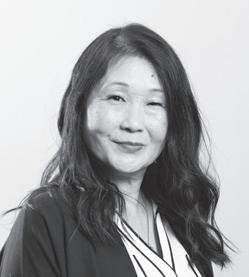


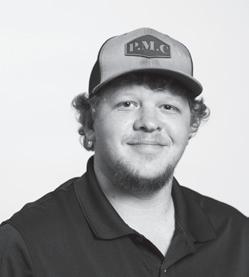
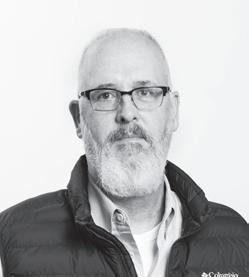


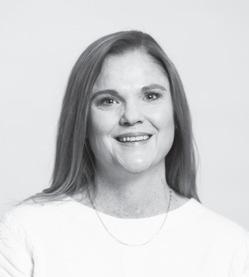
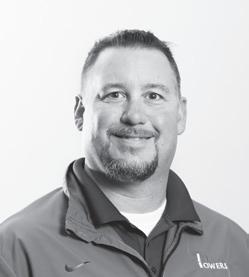

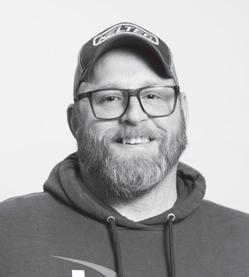


















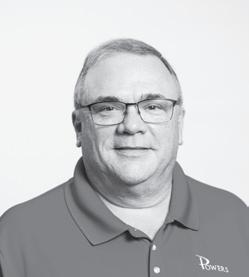


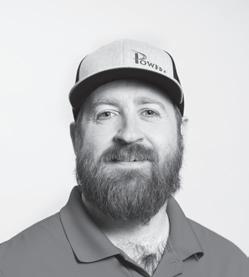












OOf all the legendary players and coaches who have passed through the annals of college and pro football, only a few select individuals have managed to stand out as true innovators, certified champions and compelling characters all rolled into one. Jimmy Johnson is at the top of that short but distinguished list.
Johnson, who has been announced as part of the 2025 Little Rock Touchdown Club roster of featured speakers, is the epitome of success. The fiery and unyieldingly competitive Johnson, raised in Port Arthur, Texas, played on Arkansas’ legendary 1964 National Championship squad that went undefeated under Head Coach Frank Broyles.
Johnson would have similar success on the sidelines, building his reputation with successful assistant gigs at Arkansas, Oklahoma and others before landing the head coaching job with the Oklahoma State Cowboys. In Stillwater, he would build the ’Pokes into a contender over five seasons.
After being snubbed for the head coaching gig at his alma mater, Johnson took over the program that would define both his coaching legacy and the face of college football, the University of Miami. Johnson would turn “The U” into a football factory in short order, lead the Hurricanes to national title contention in the 1980s, and win it all in 1987. Arkansas was among the victims of the national title campaign as Johnson’s squad won 51-7 in Little Rock in what was the Hogs’ most lopsided home loss ever at the time.
Now one of the hottest collegiate coaches in the country, Johnson accepted arguably the most prestigious head coaching position in football, as skipper of the Dallas Cowboys in 1989, the first hire of America’s Team’s new owner — the brash and audacious Arkansan Jerry Jones, who was Johnson’s college roomie and teammate in Fayetteville.
Johnson took his lumps his first season, but within three
(Photo provided by ZUMA Press)

STAR the
Hall of Famer Jimmy Johnson coming back to Arkansas

By Dwain Hebda
years, the Cowboys were Super Bowl champs and, more than that, back-to-back titleists in 1992 and 1993. The team Johnson built would win another Lombardi Trophy without him two years later.
After a middling stint with the Miami Dolphins, Johnson left coaching in 1999 to pursue broadcasting and became a stalwart of Fox’s NFL studio show. He announced his retirement from sports television in 2025. Among his many accolades, he was inducted into the College Football Hall of Fame in 2012; the Pro Football Hall of Fame in 2020; and enshrined in the Dallas Cowboys Ring of Honor in 2023.
Johnson came into the spotlight at a time when football was starting to be as much about image and hype as X’s and O’s. His teams were flashy, brash and not afraid to dish it out, a reflection of the outspoken, hard-charging Johnson himself. His ambition and success often burned bridges, some of them publicly and

most of them ultimately mended. With a lifetime coaching record of 161-98-3 in the college and pro ranks, his career was ably summed up by fellow Pro Football Hall of Famer Terry Bradshaw, who said, “Not bad for a kid from Port Arthur.”
Johnson, who will make his Little Rock Touchdown Club appearance on Tuesday, Aug. 26 at the Statehouse Convention Center, once described the essence of coaching and leadership this way:
“Treat a person as he is, and he will remain as he is,” he said. “Treat a person as if he were where he could be and should be, and he will become what he could be and should be.”
(Photo courtesy of Razorback Athletics)
Q:How were you first inspired to be a Razorback in the first place? How did you get to Fayetteville?
A:Well, actually, the first group that came to recruit me was the Air Force Academy. I was a good student, and I’d met with my congressman, and I was walking around the house, saluting everybody. Then the other schools came down, Texas and Alabama and a few other schools. Then, all of a sudden, Jim Mackenzie, who was an assistant for Arkansas, came down and offered me a scholarship.



Mother and Daddy were both from Lamar, Arkansas, and my grandfather still lived there, so Daddy says, “Well, listen, you can go wherever you want to go, but if you want us to watch you play, you’re going to Arkansas.” So yeah, I committed to them right then and there without ever visiting Fayetteville.
Q:
Let’s imagine that you were recruiting Jimmy Johnson in high school as a player. What would your scouting report have said about him?
A: It would say marginal size but a great playmaker, very intelligent, very fast. I was probably the fastest guy on our football team as a defensive lineman and linebacker. That fit Jim Mackenzie’s style of play — fast and smart.
Q: Once you got to the Hill and started your collegiate playing career, what were your impressions of the program?
A:
First of all, the Razorbacks, in that period of time, had probably the
ARKANSAS RAZORBACKS
finest, smartest coaching staff there was in the country. Obviously, Frank Broyles was very intelligent, you know, really played percentage football. He had great assistants with Jim Mackenzie, who I thought was an absolutely fabulous defensive coach, Doug Dickey, Bill Pace. Johnny Majors was a young coach just coming up, so their coaching staff was tremendous.
My junior year was the last year that we played both ways, and I started at offensive guard and on defense, I was what they called nose tackle back then, the nose guard. We went to platoon football my senior year, so there were a lot of changes.
Q: Going into senior year, did you know you had something special with that team?
A:We played great defense. We weren’t real big, but we were extremely active, and we all knew exactly what we were going to do. The key moment for that was when we beat Texas. We were undefeated, we went down there, and it
was a tremendous win for us.
From there, that last half of the season, we did not give up a touchdown until we played Nebraska, a much bigger, stronger team, in the Cotton Bowl. Of course, we won the Cotton Bowl, and that night, Texas beat Alabama and Joe Namath. Back then, they named the national champions in the [Associated Press] and the [United Press International] polls before the bowl game. After Alabama got
That last half of the season, we did not give up a touchdown until we played Nebraska, a much bigger, stronger team, in the Cotton Bowl.
Johnson as a player and coach at Arkansas. (Photos courtesy of Razorback Athletics)
beat by Texas, we were named the national champion by Grantland Rice and some of the other services.
Q:At what point did the idea of coaching come into play?
A: I got my degree in psychology. I was going to be an industrial psychologist, and right after [senior] season, the Louisiana Tech coaching staff came up to Arkansas, and they wanted Jim Mackenzie to teach them our style of defense. It was what they call the monster defense, the slant defense.
We were all kind of in the room when he was talking to the Louisiana Tech coaching staff, and he said, “Well, rather than me explain it, let me have one of my players get up here. He knows the entire defense. I’ll let him explain it.” So I got up on the board, and I explained the entire defense to this visiting coaching staff.
As it turned out, the defensive coordinator for Louisiana Tech had a heart attack right before the season. They called me and said, “Hey, would you take a temporary job as a coach? You know the defense. We just installed it. Our defensive coordinator’s not going to be able to participate, but he’ll get well, and he’ll come back after this year.”
I was married and had one child, living right there on campus in Fayetteville, and they offered me $1,000 a month, a car and an apartment in 1965. I jumped at that. I left my wife and child back in Fayetteville, and I went down, stayed at Louisiana Tech and got into coaching. In fact, I was there when we were recruiting a player by the name of Terry Bradshaw at Woodlawn High School. I sat in the stands and watched Terry play.
I still wanted to stay in coaching, so Johnny Majors talked me into taking a high school job in
Picayune, Mississippi, and then I went from Picayune to Wichita State, Iowa State, and on and on.
Q: David Bazzel, who came up with the Little Rock Touchdown Club, established the Broyles Award because he was inspired by Coach Broyles’ long list of legendary assistant coaches. When you got to Arkansas, what was it like to be in that environment?
A: It was very obvious to me, even as a player and a student, that we had a superior coaching staff, every one of them — Jim Mackenzie, Doug Dickey, Bill Pace, Johnny Majors, Wilson Matthews. Barry Switzer was a graduate assistant at that time. He was just starting his coaching career my last year there.
Q: Coaching is one of those professions where disappointment comes with it, right? You lose a big game. You miss out on the top recruit. You don’t get a dream job. Tell me about
I went down, stayed at Louisiana Tech and got into coaching. In fact, I was there when we were recruiting a player by the name of Terry Bradshaw.

Johnson (No. 60, upper right) and Jerry Jones (No. 61, lower left) celebrated the Hogs’ 1964 national championship after the Cotton Bowl win over Nebraska. (Photos courtesy of Razorback Athletics)
MIAMI HURRICANES

Q:Oh, wow. Never heard more?
A: I was livid. The next morning, Al Witty, who was our faculty rep and was one of the professors in the law school, picked me up and was taking me to the airport, and I told Al, “Why in the world did he bring me over here? I didn’t need to interview for this job. It was a token interview.” I was furious because I had a good football team. I just recruited the top player in the country. I didn’t need to be embarrassed like that.
being passed over for the head coaching job at Arkansas.
A:Well, I had a falling out with Coach Broyles because of the coaching position. I was at the University of Oklahoma with Chuck Fairbanks, and we had some great teams at Oklahoma. Chuck ends up taking the New England [Patriots] job, and Frank called and wanted me to come back to Arkansas as defensive coordinator, which I accepted. We had a great run there for a while.
Frank knew that he was going to retire, and he indicated to me that there was a good chance that I would be the head coach. Well, we didn’t play well the last couple of games, and so Frank called me in and said, “I know I talked to you about being the head coach, but I think I owe it to Arkansas to open this job up to other candidates,” and as it turned out, he hired Lou Holtz. Looking back, Lou Holtz was much more qualified and better prepared for the [Arkansas] job than I was, and so Frank made the right decision.
Lou wanted me to be the defensive coordinator, and I said, “Lou, listen, I was hoping that I would get the job, and I don’t know that I would really be good
for you, me having in the back of my mind that I should be the head coach.” I recommended Monte Kiffin, and I called Monte and talked to him about it.
I ended up going to the University of Pittsburgh as assistant head coach under Jackie Sherrill. Then I left Pittsburgh and went to Oklahoma State. They were on probation, couldn’t be on TV, but I took the job anyway because I wanted to be a head coach.
I ended up being Coach of the Year and had success there. In my last year, we won the Bluebonnet Bowl, and I had just recruited and committed the top player in the country in Thurman Thomas, so we were really going to be very good at Oklahoma State.
Well, Frank calls, and he said, “Hey, I’d like to interview you for the job here at Arkansas,” and of course, that was music to my ears. He brought me over, and he spent about 30, 45 minutes with me at Herman’s Ribhouse [in Fayetteville] and really didn’t say much of anything. I went back to the hotel, and I heard that night that he had committed to give the job to Ken Hatfield a few days prior to me coming in. I never heard more from Frank.
So Frank and I had a falling out over that, but it may be one of the best things that ever happened to me. A few months later, the University of Miami job came open because their head coach left to go to a new football league, and they were having a tough time trying to find a coach in June or July.
Their athletic director was asking me about some other coach, and I said, “Hey, I’d like to have that job.” He said, “Are you serious? If you’re serious, we’d like you to have it.” I took it having never been on campus. I tend to accept jobs like that.
Q:
Of course, you got the chance to beat the brakes off the Hogs with one of those Miami teams. Was there something a little extra satisfying, given how the whole coaching thing played out?
A: The Razorbacks probably don’t want to hear this story, but I’ve got to tell it. Our president at the University of Miami and I, we had a falling out over that.
We were undefeated, and we had Arkansas on our schedule, and they were undefeated, ranked. I don’t think Ken had ever lost a game in Little Rock up to that point. So we got to Little Rock, and before the game, I’m going to talk to the team, and Michael Irvin came up to me and said, “Coach, you don’t need to say a word. We know what this game means to you.”
Johnson led the Hurricanes to the top of the college football world. (Photo courtesy of University of Miami)

Well, I forget what the halftime score was — like, 35 to nothing or whatever — and we played our backups the whole second half. The story I heard was Tad Foote, the [Miami] president, showed up in the press box and says, “Why in the world is he doing this?” talking about me running up score. He was embarrassed because he was a relative to the Fulbrights, and he took a lot of pride in that. So, like I said, we were crossways from that time on, and he never let me get over that.
The way we played when I was at Miami, we never took our foot off the petal anytime we played a game. I was accused of running up the score on quite a few teams, including Notre Dame, but the thing is even when I did play the backups, all that did was just make them that much better.
Q: You said you intended to be an in dustrial psychologist. Given where you have worked, that is kind of what you became, isn’t it? Sounds like you got your money’s worth out of your degree.

A:Well, I gravitated towards psychol ogy because I really enjoyed evaluating people and motivating individuals — not just football players but assistant coaches, friends, etc. I’ve always tried to surround myself with intelligent people who had a passion for something and were willing to work around the clock to get the job done. That paid dividends for me.
The only thing is, I think because of my drive to be successful, it probably hurt my family life, maybe more than a little bit. I got a divorce after my two sons left home, and my youngest son struggled with alcohol, though he’s doing fantastic now. I sacrificed a little bit of my family to work around the clock to be successful.
Q:
One of the most famous chapters of pro football history is your time with the Dallas Cowboys and how that all went down so publicly with ownership. I saw a broadcast when you were going into the Pro Football Hall of Fame, and to see the genuine warmth between you and Jerry Jones now made me think that that professional relationship had a built-in shelf life, no?
COWBOYS
Johnson celebrates with Jones after winning the Super Bowl; Johnson with fellow Fox broadcaster Terry Bradshaw and Jones; Johnson and Jones catch up before a Dallas game during Johnson’s days at Fox; Johnson as head coach of the Dolphins with Dan Marino.

(Rich Kane Photography)
(UPI)
(Kirby Lee/Image of Sport)
(Photos courtesy of Razorback Athletics)
I’ve always tried to surround myself with intelligent people who had a passion for something and were willing to work around the clock to get the job done.
A:Oh, yeah, without question. [Jerry and I], we both really enjoy one another. We both have a ball when we’re with each other, and we both like each other. We did have a falling out, and the reason we had the falling out is the first couple years, when we were going 1-15, we communicated every day because I don’t think anybody else would speak to us. Each other was the only friend that we both had.
Jerry was trying to pay off that $140 million loan [that bought the team and Texas Stadium in 1989]. He was spending night and day trying to make money, trying to pay off that loan, and I was spending night and day trying to win a football game.
Well, he came into my office after our first Super Bowl, and he said, “Hey, I’m free and clear. I don’t owe a penny to anybody. Everything is profit from now on,” and that’s when it started. Once that loan
HALL OF FAME
was paid off, he had time to be involved with football a little bit more.
You had two individuals, both very strong minded, somewhat egotistical, who had success so easily early on, going from 1-15 to winning back-to-back Super Bowls. The mindset around there started to be like, “Hey, anybody can do this,” which is not the case.
Q: Lastly, talk about coming back to Arkansas, which has not happened often, particularly off the football field. What are you most looking forward to with your appearance at the Little Rock Touchdown Club and being back in the Natural State?
A: Well, I’m looking forward to seeing some old acquaintances. I won’t recognize them, but you know, as long as they either have a name tag or give me their name, it’ll bring back some great memories.
Troy Aikman helped induct Johnson into the Pro Football Hall of Fame. (UPI)
NAMES

BIG GROWTH BRINGS
LITTLE ROCK TOUCHDOWN
CLUB GEARS UP FOR 2025 SEASON
By Mark Carter, Sarah DeClerk and Mary LeSieur
Photos by Ryan Parker
Ray Lewis, left, with David Bazzel
Every Monday during football season, like clockwork, Arkansas football enthusiasts flood the DoubleTree by Hilton in downtown Little Rock, eager and energized to soak up stories, insight and wisdom from some of the biggest names in the game.
Starting in 2004 with a charter of only 17 members, the Little Rock commodity has grown into one of the biggest touchdown clubs in the nation, now having more than 500 participants and members.
“We had a writer down in Louisiana who called us the Oprah of touchdown clubs in America because we were getting all these great emotional interviews, and they were going nationwide,” David Bazzel, co-founder and emcee, said in 2023.
“I never thought, though, that within a couple of decades, this would be one of the best, if not the best, touchdown clubs in America.”
Over the past 21 years, the Little Rock Touchdown Club has welcomed an impressive roster of football legends. The club has hosted 21 Pro Football Hall of Fame inductees and 29 members of the College Football Hall of Fame.
The guest list has included players and coaches who together represent 60 Super Bowl and NFL Championships, 11 Super Bowl MVPs and 11 Heisman Trophy winners.
Collectively, the speakers have earned 134 NFL All-Pro selections, 205 Pro Bowl appearances and 70 All-American honors.
Bazzel also noted that the coaches who have spoken at the club have amassed a staggering 10,805 career wins, 47 college national championships, 368 bowl game victories and 210 conference titles.
– David Bazzel co-founder
“I wanted it to be the best,” Bazzel told Arkansas Money & Politics in 2023. “I want to be the best there is in whatever I do, if it’s creating an award or hosting a radio show.
“I never thought, though, that within a couple of decades, this would be one of the best, if not the best, touchdown clubs in America.”
The Little Rock Touchdown Club has welcomed big names like the Manning brothers, Brett Favre, David Pollack, Ray Lewis, Terry Bradshaw and Jon Gruden.
Bazzel attributed his success to the very boisterous and loyal Arkansas community, the same community that shows its steadfast support every year.
“One of the keys to our success is all of you,” Bazzel told the crowd at the 2025 lineup announcement. “I’m just telling you, all the members, all the sponsors, all the volunteers — all these high-profile guys and ladies, they feel it. They feel there’s something special about this group. I’m just telling you, they do. That’s why you’ve got to bring the energy every week. It makes a big difference.” AY Media Group is a media sponsor for the Touchdown Club. The presenting sponsor is Simmons Bank.
“I can tell you from a Simmons Bank perspective, we have been a very small part of the success of the Touchdown Club,” said George Makris Jr., chairman and CEO at Simmons Bank,

Bazzel with George Makris, Jr., CEO of LRTDC sponsor Simmons Bank (Photo by Sarah DeClerk)
NFL Hall of Famer Brett Favre
who credited Bazel with the club’s success. “It has been our absolute pleasure to have this opportunity, and we look forward to being a supporter for years to come.”
Additional sponsors include Stephens, Wright Lindsey Jennings, Oaklawn Hot Springs, Sissy’s Log Cabin and The Hatcher Agency in Little Rock, among others.
Chris White, executive vice president and chief community banking officer at Simmons Bank, said the Little Rock Touchdown Club was one of the best touchdown clubs in the region, if not the country.
“I think of a few words when I think of this club. I think of discipline. I think of commitment, and I think of passion,” he said. “A lot of those things that David has instilled in this club are the same things that we take pride in at Simmons Bank.”
This year’s schedule will feature an impressive lineup of former coaches and players, and for the first time ever, ticket sales are already open for the first two meetings. The club will tee up its 21st slate of state and national speakers when the 2025 fall schedule kicks off Aug. 18.
As is club tradition, the head Hog will lead things off. Sam Pittman, entering his sixth year as head football coach for the Razorbacks, will be the speaker for the first meeting.
The Hogs are coming off a 7-6 season that culminated in a Liberty Bowl win over Texas Tech, but Pittman finds himself on the hot seat after following a ninewin campaign in 2021 with two six-win regular seasons and a 4-8 mark in 2023. His overall record at Arkansas is 30-31, but Pittman took the Arkansas job when the program was at the lowest point in its history, coming off consecutive 2-10 and SEC winless campaigns under Chad Morris.
His reward for taking a job that reports said no one wanted at the time was COVID-19 and a contracted, 10game, all-SEC schedule. Pittman immediately instilled pride back into the program, and although the Hogs finished 3-7 that year, they earned an invitation to the Texas Bowl to play TCU. The Horned Frogs, however, backed out of the bowl at the last minute — Arkansas’ equipment managers were loading the team buses to leave for Texas when the call came that TCU was opting out because more players had tested positive for COVID-19.
With former head Hog Bobby Petrino back for his second season as offensive coordinator, as is starting quarterback Taylen Green, the Hogs look to field a potent offense in 2025.

From left, coaching legends Barry Switzer (Oklahoma), Ken Hatfield (Arkansas) and Fred Marshall (Arkansas)

On the heels of Pittman’s appearance comes former Razorback Jimmy Johnson, longtime broadcaster for Fox’ in-studio NFL coverage and Super Bowl-winning coach of the Dallas Cowboys. Johnson will speak to the club Aug. 26.
With Jerry Jones, Johnson was a member of the 1964 national championship squad in Fayetteville. The Port Arthur, Texas, native coached college ball at Oklahoma State before taking over at Miami and propelling the Hurricanes to the 1987 national title.
Johnson interviewed for the Arkansas job after Lou Holtz left in 1983, but Frank Broyles preferred another of his former players, Ken Hatfield, which led to a rift between Johnson and Broyles. Many believe that is why Johnson distanced himself from his alma mater.
In 1989, Jones, the new owner of the Cowboys, hired Johnson to coach the team. Johnson became just the second coach in team history, replacing the legendary Tom Landry. Despite going 1-15 his first season in Dallas, Johnson led the Cowboys on a run that included two Super Bowl titles during the 1990s.
Johnson left the Cowboys after four seasons after Jones told reporters that any coach could have coached Dallas to a Super Bowl title. Johnson returned to the NFL in 1996 after a stint as a broadcaster with Fox Sports. He coached the Dolphins for three mediocre campaigns before rejoining Fox as a studio analyst.
NFL hall-of-famer Lawrence Taylor, considered one of the greatest linebackers and defenders to ever play the game, will be the club’s guest Sept. 2. Taylor played college ball at North Carolina and for the NFL’s New York Giants. He led the Giants to two Super Bowls and was named the league’s most valuable

player in 1986. He was a three-time NFL defensive player of the year and was named to the NFL’s 100th anniversary all-time team, among numerous other accomplishments and accolades.
Razorback legend Darren McFadden, whose No. 5 will be featured on a special jersey patch worn by the Hogs this season, is next up on Sept. 8. McFadden is considered one of the greatest Razorback athletes of all time. He was a two-time consensus all-American, a two-time runner-up for the Heisman Trophy, a two-time winner of the Doak Walker Award, which recognizes the best running back in the country and a two-time Jim Brown Trophy award winner. He won the Walter Camp Award in 2007.
Injuries derailed a promising pro career, but “D-Mac” — as all of Arkansas knows him — played in the NFL for eight seasons with the Raiders and Cowboys.
Following D-Mac’s appearance, Arkansas athletic director Hunter Yurachek will speak Sept. 15, followed by Heisman winner and former Raider Tim Brown Sept. 22; Craig James, one half of the famed SMU Pony Express who played pro ball for New England, Sept. 29; Butch Jones, head coach at Arkansas State University in Jonesboro, Oct. 6; Nathan Brown, head coach at the University of Central Arkansas in Conway, Oct. 13; Kelli Finglass, director of the Dallas Cowboys Cheerleaders, Oct. 21; Holly Rowe, the award-winning sideline reporter for ESPN, Oct. 27; SEC Commissioner Greg Sankey Nov. 4; former Hog greats Madre Hill and Anthony Lucas (the latter currently coaching Pulaski Academy in Little Rock) Nov. 10; former Texas and North Carolina coach Mack Brown Nov. 17; and Mark May, former broadcaster and offensive linemen for the Washington Commanders, Nov. 24.
Sam Pittman
Hunter Yurachek
Darren McFadden
TRANSFORMATIONAL INDUSTRIES
By Sarah DeClerk

Arkansas benefits from a wide range of industries, from agriculture to defense manufacturing. Two industries in particular are set to make a substantial economic impact on the state. In south Arkansas, groundwork is being laid that will make the region a major player in domestic lithium production. Meanwhile, the steel industry that has been growing in northeast Arkansas for three decades is helping bring qualityof-life improvements to the area.
“One is in place already and having a profound impact on the overall economy, and the other one is in very early stages of development but holds enormous prospects for the future for its development and growth,” said Randy Zook, president and CEO of the Arkansas State Chamber of Commerce/Associated Industries of Arkansas, “so two totally different points in time or development for each one, but really high impact in both cases.”
LITHIUM
LITHIUM, STEEL POISED TO BRING NEW LIFE TO QUIET CORNERS OF THE STATE
the full benefits of the burgeoning industry.
“We really think that this impact could truly be transformational,” she said. “We’re looking at billions in investment just to get the actual plants and operations put in. It’s going to create a lot of really high-paying jobs, and then that whole supply chain, in general, is going to apply even more.”
workforce grant to support the LiTHIUMLEARNS initiative. Meadors said the initiative creates a pipeline from K-12 to the postdoctorate level to ensure workers all the way up the ladder have the skills needed to support lithium manufacturing.
With a royalty rate approved by the Arkansas Oil and Gas Commission in May, lithium production in south Arkansas can now get underway in earnest. Florence Meadors, program manager at the Lithium Regional Innovation Cluster, is one of those working to ensure Arkansans reap
The cluster recently launched a network of advanced subject matter experts to help lithium-related ventures and is gearing up for a series of networking events focused on topics related to the lithium industry. Meadors said her goal is to engage small businesses not only related to lithium and its downstream applications, such as battery manufacturing, but also supporting industries such as construction, transportation, and even restaurants and retail.
“In Lafayette County, where the majority of the actual industry’s going to be located, they don’t even have a 24-hour gas station,” she said. “There’s going to be a very broad range of small-business opportunities across that spectrum.”
Other initiatives are underway to help ensure a lithium-ready workforce. Southern Arkansas University in Magnolia recently received a $2.75 million HIRED
Just recently, the Arkansas Lithium Technology Accelerator in El Dorado made history as the first accelerator in the United States dedicated to lithium and battery supply chain innovation, and the yearly Arkansas Lithium Innovation Summit in Little Rock provides yet another avenue for collaboration among stakeholders.
“Something that I can see [the lithium industry] doing is bringing a lot of not only the really, really good jobs that we need, but once you have those people in there with those high-wage jobs and those companies that are willing to help and invest into the community, you’re able to better the quality of life,” Meadors said. “That just helps the economy immensely.”
Health care and housing are two immediate needs, she said, adding that new housing developments are already underway and local governments are working to provide additional recreational amenities.
“It’s going to be good for south Arkansas and the middle part of the country, for that matter,” Zook said. “All of Arkansas will benefit from tax revenue that will flow from it, job opportunities, community
Florence Meadors
Randy Zook

“It’s a complex, challenging requirement that takes a whole lot of people in an area working in concert to make any community continue to succeed.”
— Randy Zook President and CEO, Arkansas State Chamber/AIA
development. It will save some of south Arkansas that’s had a tough time losing population. That southern and southwestern corner has been needing this kind of opportunity, and here it comes.”
Although she does not predict overnight transformation in the region, Meadors said Arkansas is poised to become a global leader in the lithium sector with the utilization of the direct lithium extraction technique.
“It’s going to position us to set the standard for how lithium can be produced responsibly, efficiently and locally,” she said. “It’s an opportunity for us to lead the clean-energy transition on a national and international level.”
STEEL
Mississippi County has become the largest steelproducing county in the U.S. over the past 30 years. To find out why, one only has to ask Dave Stickler, CEO of Hybar, which recently constructed a state-of-the-art rebar mill in Osceola. Stickler previously served as CEO of Big River Steel, which has two mills in the area.

“We liked the work ethic in northeast Arkansas. There’s a lot of people who aren’t afraid to work hard, work with their hands, tend to be mechanically inclined,” he said. “We’ve got supportive government officials from the county and local government organizations. We’ve got the mighty Mississippi. We’ve got a great company for the power-providing perspective in Entergy. You have the [Burlington Northern Santa Fe] Railroad.”
Stickler has made a career out of building highly efficient minimills. Big River Steel was the first steel mill in the world to be certified in Leadership in Energy and Environmental Design, and Hybar is LEED certified, as well.
Add to those Nucor-Yamato and Nucor Hickman — two mills brought to the area in the 1990s by the late John Correnti, who also served as CEO of Big River Steel — and there are five steel mills in Mississippi County, not to mention countless supporting industries and downstream manufacturers. There is about to be a sixth one too. Although the first Hybar mill has barely begun production, Stickler said he already plans to double capacity by building another mill.

Dave Stickler
Piles of scrap metal wait to be turned into steel at the Hybar mill in Osceola.
(Photo by Sarah DeClerk)
The 2024 Lithium Innovation Summit in Little Rock brought together various stakeholders from across the industry. (Photo courtesy of LRIC)
“Arkansas as a state is a great place to do business,” he said, “but Arkansas as a state is a really, really, really great place to do steel business.”
The Nucor mills opened shortly after the closure of the Eaker Air Force Base in Blytheville and at a time when the area was losing light manufacturing plants. Although the mills helped replace some of the lost jobs, Stickler said that alone was not enough to make up the difference, and the county began to deteriorate.
“Crime statistics were going the wrong way. School performance was going the wrong way — not for lack of visionaries in the county, but Nucor and the county leaders were like the little kids with the fingers in the dike,” he said. “Instead of having 10 fingers, you needed 1,000 fingers.”
However, with the additional investment, new houses are being built for the first time in a long time. The county recently implemented a “live here, work here” program that provides incentives for workers to buy and build homes in the area.There are also efforts underway to turn around underperforming public schools.
“My goal is to have a small part in uplift-
ing all of the communities,” Stickler said. “If we can crack that code — the key is going to be improving the less-than-adequateperforming school systems — there’s no reason this county can’t just really build on all this momentum.”
Stickler said he strives to have the highestpaid steel workers in the world. With those wages, local families can send their children to college, he said. They can pay off their mortgages, take dream vacations, and buy new trucks and fishing boats.
Stickler said what struck him the most was learning from a hospital system in nearby Memphis that health metrics have improved since Big River Steel opened.
The local steel companies partner with Arkansas Northeastern College in Blytheville to ensure a highly trained workforce that benefits from some of the highest starting salaries around, but education is just one component of ensuring a robust workforce. Population is another.
Although Stickler said he has no trouble finding enough workers to staff a steel mill, Zook named population decline as one of the major challenges affecting northeast Arkansas. He said adequate housing, well-performing schools and ac-

cess to health care are essential to growing communities.
“You’ve got to have retail stores. You’ve got to have shopping opportunities. You’ve got to have housing developments so that you’re creating the housing space and family space that’s necessary,” he said. “It’s a complex, challenging requirement that takes a whole lot of people in an area working in concert to make any community continue to succeed.”
He added that he would not be surprised to see a few more steel mills in coming years. Arkansas lawmakers have done a lot to create a business-friendly environment through tax incentives, he said, adding that to continue attracting new industry, the state should invest in shovel-ready sites and be prepared to meet the energy needs of the future.
“Arkansas is being discovered by a lot of the rest of the country and the rest of the world,” he said. “We’ve got a lot of good things going for us. We just need to be prepared to take full advantage of them, and we need to help more of our young people realize that if you’re looking for economic opportunity, it’s staring you in the face if you’re in Arkansas.”

Dave Stickler, CEO of Hybar
(Photos by Sarah DeClerk)





























A ppeal NATURAL
Tourists flocking to Arkansas in record numbers
By Alex Hardgrave
The Natural State gets its name for a reason. With 52 state parks and a national park within its borders, Arkansas is a can’t-miss for outdoor enthusiasts. Beyond that, other attractions such as casinos, museums and an amusement park draw people to visit the state, as well.
Last year, tourism brought $10.3 billion to Arkansas’ economy, the 2024 Arkansas Tourism Economic Impact Report states. That is an all-time high for the state and a 4 percent increase from 2023’s total of $9.9 billion. The money was brought in by roughly 50.2 million visitors. Each Arkansas household would have to pay $930 to replace the amount of state and local taxes paid by visitors in 2024, the report states. The tourism industry in Arkansas also supported 71,633 jobs last year, and those workers made a collective $2.2 billion in income.
Outdoor recreation alone contributed $7.3 billion to the gross domestic product of the state and supported 68,000 jobs.
“You have these beautiful, crystal clear lakes with great fishing,” said Shea Lewis, secretary of the Arkansas Department of Parks, Heritage and Tourism and director of Arkansas State Parks. He noted the unique experiences and year-round entertainment that the state offers, such as digging for diamonds at Crater of Diamonds State Park in Murfreesboro or going to see a musical act at the Walmart AMP in Rogers. Lewis himself likes to float and fish across the state.

Arkansas State Parks operates one of the country’s most dynamic parks systems. Pictured is Davies Bridge at Petit Jean State Park in Morrilton.
Shea Lewis
“We know visitors are looking for experiences,” Lewis said. “It’s less about where you’re at but more about what you’re doing. Arkansas has some of the best, most unique experiences.”
HOT SPRINGS
In Hot Springs, tourism is a main driver for the economy, said Steve Arrison, CEO of Visit Hot Springs. Some of the main places that draw visitors to the area are Oaklawn Hot Springs, Magic Springs Theme and Water Park, Hot Springs National Park, the local lakes, and more.
The area welcomes about 9.3 million tourists a year, the Arkansas Derby at Oaklawn bringing 68,000 people into Hot Springs on one day alone. Visitors spent an average of $2.5 million per day in Garland county in 2023, totalling $902.3 million, the Garland County Tourism and Economic Impact Report states.
According to the report, Hot Springs National Park welcomed 2.5 million visitors in 2023. Those visitors generated $184 million for the local economy.
Downtown Hot Springs is booming thanks to tourism. The report states that $28.7 million in capital investments were made there in 2023. That year, 27 new businesses opened downtown, and 13 commercial properties were sold.
BENTONVILLE
In the northwest corner of the state, Benton County, which includes Bentonville, saw $1.2 billion dollars in spending from visitors last year.



Kalene Griffith, president and CEO of Visit Bentonville, said that many things bring people to the city, including cycling trails and the Crystal Bridges Museum of American Art, which saw nearly 785,000 visitors in 2023, its website states.
Restaurants also drew tourists in, with 47 new restaurants opened in the area last year. A report showed that 25 percent of patrons at Bentonville restaurants are visitors, but they make up 50 percent of the income at those establishments, Griffith said.
Large annual events brought many visitors in, as well, including the Bentonville Film Festival, Bentonville Bike

Fest and new exhibits at Crystal Bridges.
“We’re seeing those economic drivers that are bringing in people from all over the world, especially the cycling ones,” Griffith said.
She added that what draws people to the area are all the amenities offered there, which benefits not only tourists but the people who live locally.
“We have big-city opportunities and amenities,” she said.
Steve Arrison
Top: Bathhouse Row in Hot Springs (Visit Hot Springs); Bottom; Crystal Bridges Museum of American Art in Bentonville (Visit Bentonville)
Kalene Griffith
“Whether you live here or are just visiting, we want you to feel like you are home in Benton.”
Visit Bentonville has chipped in to build up amenities in the city, including investing about $3 million in a partnership with the city to expand a local baseball field.
The mix of visitors coming for business and leisure makes Bentonville a destination year-round, Griffith added.
Recently, lodging spending has been down in the area, she said. That reflects numbers at the state level, too, which measured 16 million overnight visitors in 2024, down 1.2 percentw from 2023, according to the 2024 impact report.
“I think there is an uncertainty of the environment we’re in right now,” she said. “People are unsure if they should take that big trip or hold off.”
She also said that bouts of bad weather have hurt tourism to the area somewhat, but overall, Griffith believes visitor numbers will continue to grow.
BENTON
There are new attractions coming to other areas of Arkansas, too, including a Buc-ee’s in Benton, which broke ground in April and is expected to open September 2026. A Buc-ee’s of similar size in Tennessee saw about 5 million visitors its first six months, Benton Mayor Tom Farmer said.
“We are told that Buc-ee’s is a destination for people, which I truly believe after talking to people who have traveled and stated that they planned their stops for fuel around Buc-ee’s locations,” Farmer said. “We have also been told that people will travel 200-plus miles to stop at a Buc-ees. We hope that when they stop, they come to our beautiful downtown area and visit the many shops we have or even visit one of our great restaurants that are located downtown.”
Farmer has been to a Buc-ee’s himself.
“I can tell you that it truly felt like Christmas shopping with the grandkids because their eyes were big, their excitement was great, and they truly wanted to see everything before they chose something,” Farmer said.
While Buc-ee’s is set to increase tourism in the area, there are other attractions that have been bringing people to Benton already. One is the Third Thursday street festival, which Farmer said sees a little more than 5,000
Mayor Tom Farmer
people each month. Visitors also come for the plays at the Royal Theatre, he said.
In the way of out door attractions, Benton has a mountain bike park located a few blocks from the downtown area and other parks that host sporting events.

“Benton welcomes all to our beautiful city,” Farmer said. “As we like to say, we want you to feel at home. Whether you live here or are just visiting, we want you to feel like you are home in Benton.”
OUTLOOK
Throughout the state, tourism was greatly affected by the COVID-19 pandemic, but numbers recovered quickly.
In Bentonville, Griffith said that it only took about 14 months to get back to 2019 numbers.
“I think that’s because we’re a business destination, so we’re fortunate,” she said.
Arrison said the numbers are finally “settling out” after a large postpandemic travel boom that has been seen in Hot Springs and around the state in the past few years.
“A lot of people discovered Arkansas during that time,” Arrison said.
Lewis said the state parks have also seen a plateau in its number of visitors.
Nationally, the same trend is being seen. Domestic leisure travel has come back fully to prepandemic levels. However, business travel nationally and international inbound travel still lag behind prepandemic rates, according to the 2023 Garland economic study.
The growth of the tourism economy in Arkansas is not stopping, just slowing. The economic impact has returned to an average 3 to 4 percent increase per year in the state, Arrison said.
“The positive continued growth supports the work we’re trying to do and the impact tourism has on the state,” Lewis said.
(Image provided by the Royal Theatre)

WorkingLivingfor a At 50, Arkansas Northeastern College just getting warmed up
By Dwain Hebda

In the grand scheme of things, 50 years is not a long time in college years, especially of the four-year variety. All but one of the state’s institutions of higher learning are considerably older than five decades, some tracing their roots back to the Civil War era.
Among two-year schools, however, 50 years — or thereabouts — is more the norm than the exception. Of the 23 Arkansas colleges in the category, only six were established outside of a window from 1963 to 1975. The boom was not an anomaly, coming during an era when government and pro-business and industry groups actively leveraged state and federal funds to provide training in skilled careers through a robust network of what were then known as trade schools and community colleges.
While all of the state’s two-year schools look and think differently than they did when they were founded, a handful have led the category when it comes to size and sophistication of programs. One such school, Arkansas Northeastern College in Blytheville, founded in 1975, has grown into an unqualified success story thanks to steady and consistent leadership, proactive investment, and vision.
Those elements combined to help ANC prepare itself to serve one of the state’s largest emerging industries, the steel mills of northeastern Arkansas, via 2018’s Arkansas Steelmaking Academy, 2022’s Steel Tech Academy, and Arkansas Steelmaking Bootcamp, launched in 2023.
Also in 2023, the college welcomed its fifth president, Christopher Heigle.
of like what Bill Clinton always used to say: ‘There’s no problem the Delta has or that Arkansas has that economic development, can’t fix.’ I think dignity and self-respect is earned through a job with a living wage. I feel like the community college model is the workforce model for achieving that, obviously.”
Heigle shared with Arkansas Money & Politics the latest in the college’s successful run of programs and looked ahead to the future of skilled careers training in Arkansas.
Christopher Heigle
The Heber Springs native earned his undergraduate degree at Arkansas State University in Jonesboro before pursuing a masters and Ph.D. at the University of Memphis. Prior to entering higher education professionally, he also spent time on the staff of the late U.S. Rep. Marion Berry, which helped shape his view of the state and its people, especially those in the job-strapped Arkansas Delta. Today, he rides herd over programs designed to improve those lives through education and job skills.
“I’m a big economic development proponent,” said Heigle, 42. “I’m kind
Arkansas Money & Politics: Two-year schools, as a species, have undergone something of a transformation over the past 10 years or so in which they are increasingly becoming an institution of first choice, not last resort. What has been leading that?
Christopher Heigle: Students that are graduating today from high school are generally apathetic toward the systems that were sold in my generation. They’re not looking to go to a four-year school and get a marketing degree and then hopefully work for
Photos provided by ANC
a good company and make $45,000 and hopefully move into management. That was the plan I had out of high school, and I thought that was a good plan.
Well, they’re not interested in that today. I go to a high school, and I look around, and I say, “How many of you are ready to go to college?’ Five out of 40 are raising their hands. I say, “Well, how many of you all want to go immediately to work?” The rest of them are raising their hands. We don’t disrupt that pathway. We try to do everything we can to get them there.
AMP: We hear a lot about the economics of some technical careers these days, but that can be difficult for a typical 18-year-old to grasp. How do you sell that value proposition?
Heigle: There’s an exercise I use for kids who just do not have any understanding of what it actually takes to provide income for yourself, for your family, for the type of life you want. I tell them: Let’s imagine your life at 40. What kind of house are you in? What kind of car do you have? Do you have a spouse? What do they drive? Do you have a child? What do they drive? Are you saving for their college? Etc., etc. Very quickly, young people will describe an $80,000- or $90,000-a-year lifestyle, and I’m talking liability of

$80,000 or $90,000 a year. Well, OK, that’s great. You have a goal. How can you get there?
Our short-term certificate of proficiency is earning, on average, $67,000. That’s a six-month degree, so I can take you, and in six months, I can get you a job like that. In two years, you can earn an associate’s degree, and we can get you out making $80,000 a year where, within two years, you’re making $150,000 with production bonuses. People don’t understand that, but it’s real. It happens all the time.
What else I would say is we’re not just locking you in to be a mill worker for the rest of your life. We currently have two-plus-two agreements, and we’re actively working to create more with other universities where, if you’ve graduated with that Associate of Applied Science in steel technology, you can move directly into a program where all 60 credit hours will transfer into [a partner] program, no questions asked. That gives individuals who started working at the mills at 20, 22 years old, maybe, who work for 10 years and who are now ready to be off the production line, but they know the industry and they want to stay in the industry, we can help prepare them to move into metallurgy or management or something else. We’ve given them that pathway.
AMP: What is the sticker price for that two-year degree these days?
Heigle: We’re roughly $1,400 a semester, and so I’d say less than $10,000, all in.
AMP: So that translates to virtually no student debt compared to other institutions, particularly if they’re pulling down that kind of money right out of school.
Heigle: Well, actually, we don’t do loans. We offer Pell grants, and we do a tremendous job getting those out. We’re also unique in that we own about 1,500 acres of farmland, and
every year, we get about $350,000 in revenue that goes immediately and directly into student tuition, so we subsidize an incredible amount for our postsecondary students.
Beyond that, we try our best to keep a good cadre of active workforce grants where, as of right now and if things go well for the next few years, our students are really not paying anything, so the value proposition is honestly through the roof.
AMP: Some two-year schools around the state have engaged in something of an arms race to attract students — sports teams, dorms and so on. It appears ANC has avoided that to a large extent. Are those things that will eventually be required to stay competitive?
Heigle: We don’t have to pretend to be a university because we’re too busy being a community college. I hate to say it like that, but the truth is we could start sports, and we could have dorms, and we could do all that, but it would incredibly impede our ability to provide a workforce. We spend quite a bit of money on professional trainers, and we keep them. If we don’t — well, let’s say an industry comes in, and they need us to teach a new procedure in extrusion. We don’t have an extrusion person, so we have to fly them in from Sweden. When I say we are a workforce college, that’s what we’re doing with our money.
I’m not saying what [other colleges] are doing is bad because you have to have an industrial need in order to spend the money that we’re spending. If we didn’t have steel, yeah, we’d be doing basketball. We’d be doing anything we could to enhance the quality of life for our people. Right now, however, the biggest priority we’ve got is to keep the industries moving so that we’ve got an active economy.
I think we’ll see the same out of El Dorado soon. I think South Arkansas College is just going to do incredible work down there. They already have a pretty good leg up as a work-
force college, and I’m very excited to see what they’re going to do with it. They’re probably going to behave very similarly to us.
AMP: So if they’re not lured in by a basketball team or a climbing wall, what are student expectations or demands, if you want to use that word? How have they changed over the years?
Heigle: Well, at the risk of undermining myself, they do want climbing walls, and they want lazy rivers and all that. The truth is we have a student grill. We have a game room. We do everything we can within our budget that’s reasonable for us to give them the experience and make sure they’re happy and healthy here.
AMP: Keeping with the recruitment theme, what steps have you taken to help increase ANC’s reach into underserved communities, women and students of color?
Heigle: We have made progress in that area. To be honest, we’ve had trouble with that in the past. It’s no secret that we’ve struggled, at least industrially, to make sure representation is what it should be. All we know to do is to continue to get into the high schools and be among the people we want to impact the most. I want to say that it’s working. We have a growing population of African American students. We’ve got, probably, more first-gen [college students] than we’ve ever had. With us, everything we do is based on poverty metrics. We don’t typically means test for our services; we reach out to the populations that we know we have to work with in order to make an impact. Poverty is endemic within the area, and we’re trying to address that regionally, and we feel like we’re doing a pretty good job of it. I always say that the purpose of publicly funded economic development is to change the outcome of poverty.
AMP: You are only the fifth president in ANC history, and you follow the
very successful tenure of James Shemwell. How has that continuity of mission in general and Shemwell’s contributions in particular set you and the college up for success?
Heigle: We could write a book on Dr. Shemwell. Obviously, he’s incredible, a strict capitalist. He would always say, “We move at the speed of business. We listen to the industries.” We have to listen to the industries, and if they’ve got a problem, we have to solve it, or else they will figure out how to solve it themselves, and we become superfluous.
AMP: Given that mantra, what do you see as the biggest opportunities for the future, and how will that shape the catalog and programming at ANC?
Heigle: The future looks like automation and electricity. Electrical engineering is going to happen one way or the other, and that’s going to happen in all industries, in all sectors. Automation, obviously, is manufacturing specific, and we’ve got a new computer science instructor who’s very excited about tying in some machine learning, which is what the market is asking for right now. We have recently reengaged our industries and had a large countywide meeting just to say, “We know what we’re doing now, but what’s the next step?” We believe it’s time for the college to grow again, and
so we’ve got a task force of industry representatives that are helping us define that. We do not have the facilities we need, and so we’re looking at an expansion, probably another 100,000 square feet in our allied tech center.
AMP: Obviously, you have a proximity advantage of having the steel industry in your backyard, but what other industries are commanding your attention as you look to the future? Are there new industries that are emerging?
Heigle: Right now, everything is still being driven by the steel industry, but the truth is there are other ancillary industries that work alongside them, and that affects our programs. Industrial maintenance as an example: You could transfer into any industry in Arkansas with an industrial maintenance degree.
Another thing I want to mention is Mississippi County is going through an explosion of aeronautics growth. Our former air base has shut down, but we’ve had two companies announce recently they’re expanding. As a result, our associate of aviation maintenance degree, where we’ve been carrying around four students, all of a sudden it looks like we’re going to have about 25 students, and we may have to hire another instructor. I am all for sector diversification, you know? This is good for us.


BRIGHT LIGHTS,
METRO
CHAMBERS EVOLVE WITH THE TIMES
Time was when a big-city cham ber of commerce was primarily — even exclusively — interested in hosting networking events and helping tend to the needs of the compa nies within a very limited tent.
Those days are gone, say chamber leadership. Members’ needs continue to evolve and, with them, the expectations of what chamber membership should afford. Effective chambers must also be as skilled at attracting new businesses as they are at nurturing existing ones, yielding recruitment efforts that are far more developed and proactive than in previous eras.

ment at the Hot Springs Metro Partnership, a sister organization of the Greater Hot Springs Chamber of Commerce, takes that period as inspiration for what people of big thinking and hard work can accomplish, even facing enormous obstacles.
By Dwain Hebda
Arkansas Money & Politics reached out to four chambers in the state’s metro regions to see how their missions have changed and how they are embracing the challenges of the future.
GREATER HOT SPRINGS CHAMBER OF COMMERCE
Cole McCaskill has not been in chamber work that long, but the time he has put in has been transformative for the city of Hot Springs.
“We’ve got our challenges. One of the biggest ones is available land,” he said. “We have all these wonderful outdoor recreational areas. We have a lot of federally owned property, such as the Ouachita National Forest, the Hot Springs National Park, obviously, in and around the downtown area. Yet we’ve still managed to develop two industrial parks in Garland County that are completely full.

Cole McCaskill
“I was hired as the downtown development director after the [Majestic] hotel burned down,” he said. “There was a big initiative locally to try to spur some redevelopment because we had a bunch of empty, boarded-up buildings, and there wasn’t a
“That’s a good thing and a bad thing because it’s great that the industrial parks are full and thriving, but those were two of the most ideal pieces of land for industrial development, so where do we look in the future? Well, our organization just purchased another 26-acre piece of property where we’re doing site development for industrial purposes, and we’re also working on a new industrial park to be announced soon.”
McCaskill said other perceived hurdles to attracting manufacturing and industry to a town known primarily for tourism are actually opportunities.

LITTLE ROCK REGIONAL CHAMBER
There is a lot to smile about in the Little Rock business community — growth in every sector of the city, the Port of Little Rock bursting at the seams with tenants and a new downtown master plan pointing the way to the city’s future. Even so, leadership is hardly resting on its laurels.
Chesshir, longtime chamber president and CEO, said the drive to evolve with the times and needs of membership is a constant challenge.
“In the past, the chamber was much like an order taker. Somebody needs to go do this. Somebody needs to make this better. Somebody needs to help the economy do whatever. Today, that’s evolved,” he said. “I’ve been in this business now
for a little over 30 years, and early in my career, the chamber was about what’s now, but today, especially with those younger businesspeople coming on board, it’s about what’s next.”

Chesshir said that perspective permeates all areas of chamber operations, from economic development to tourism.
“In the old days, the larger companies within the community were all about economic development because they
saw it as a way to help grow the overall economy, and doing so would help themselves,” he said. “Today, you have smaller companies who are looking for relationships they can leverage to not only help their business grow but also leverage resources and information on some cutting-edge areas to help them with whatever it is they’re doing.
“Our No. 1 economic development issue over the last seven to eight years, for example, was public education. That’s why we birthed the Academies of Central Arkansas through the Ford Next Generation Learning Framework to help our high school students from the ninth grade on be better prepared both for college, as well as career.”

Downtown Hot Springs (Visit Hot Springs)
Jay Chesshir
Chesshir said the comprehensive view of the chamber’s mission is also useful in avoiding blind spots when it comes to the less-sexy elements of growth.
“If you don’t have the basic infrastructure in place required for a growing population, you just can’t be successful,” he said. “Before we talk about anything, we have to make sure that we have ample capacity of water, ample capacity of wastewater treatment, ample electricity and gas, good roads. You can have the most wellfunded economic development organization in the United States, but if it’s sitting in the midst of a crumbling community, it’s not going to work.”
NORTH LITTLE ROCK CHAMBER OF COMMERCE
Few communities in Arkansas have enjoyed the transformative couple of decades that North Little Rock has. Long gone are days when the city north of the river was the homely sister to the beauty queen, and Dogtown has consistently gone toe to toe with its larger neighbor to the south in growth, entertainment and economic development.
Derrell Hartwick, president and CEO of the North Little Rock Chamber of Commerce, said continuity of vision across multiple administrations such as City Hall is a big reason why.

“North Little Rock, specifically, has had great leadership for over 30 years,” he said. “That’s been from when my dad, [Terry Hartwick], was mayor in the 1980s to Pat Hays when he was mayor and Joe Smith was in city government, and then he became mayor and had the continuation of a vision that Pat had. Then Dad ran and won again, which is three mayors over 30-plus years. That gave us a sustained vision and goal for everyone in the community.”
Fortunately for the chamber, that vi-
sion has been very pro-business and progrowth over that time, resulting in conspicuous development from the showy Argenta entertainment district and the less visible but no less vital growth in the city’s industrial parks.
“There’s not a lot of red tape here. We’re business friendly,” Hartwick said. “Having leaders who can communicate and have that same perspective where they can see what a successful city will look like is why you’re seeing the success now. It doesn’t happen overnight, but we are starting to see that success happen.”
Hartwick said another advantage the chamber has is a willingness to let youth be heard, which introduces new ideas and fresh thinking into the process of carrying the community forward. He himself is a prime example as he leads the chamber to serve the needs of all members regardless of generation.
“We really try to listen really well,” he said. “I was raised by an individual who was community focused, and I’ve always been around his generation of people, a lot of our leaders in central Arkansas, and I learned how they operated and their vision.
“Now I’m trying to be a bridge from that generation to the next, letting people know they not only have a seat at the table; we need those younger people to step up. That’s the biggest thing we’ve done, specifically on the chamber board, is say, ‘OK, who’s next?’”
ROGERS LOWELL CHAMBER
The past two decades have been remarkable for the four-headed economic monster of Fayetteville, Bentonville, Springdale and Rogers, which collectively comprise the northwest Arkansas growth juggernaut. Raymond Burns, president and CEO of the Rogers Lowell Chamber, has watched from the front row both as a native resident and through 38 years leading the chamber.
He said the most amazing thing is how each of the four communities continue to cooperate yet maintain their own identities.
“If you get right down to it, I think the
communities that have thrived the most are the ones that have been able to be the most proactive,” he said. “Certainly in Rogers, we’re always out there, looking at the next 10, 15 years, you know? What are the short-term goals and what’s the big, hairy, audacious goal?”

The Rogers Lowell Chamber track record has proven very effective in that regard. Burns pointed to several bond issues the organization has helped shepherd through channels, which built transportation and other infrastructure that literally paved the way for major developments by heritage and newcomer companies alike.
“I think we’ve done a really good job of being the downtown of northwest Arkansas. Our location is really good in terms of where we fall on the interstate, where some of the most sought-after amenities are,” he said. “We can put 10,000, 12,000 people in a concert at Walmart AMP, we can get to a convention center for different activities, and we can get to shopping or our medical campus, which is continuing to grow by hundreds of millions of dollars.
“We also cover the city of Lowell, where, with the aggressive expansion plans that J.B. Hunt has, it’s been very good for the many small businesses that have filled in around the main headquarters.”
Burns also praised the collaborative spirit of the four communities that has sparked and sustained the remarkable run of growth.
“If you look back 25 years, it was more about Friday-night football than it was collaboration,” he said. “Today, our regular monthly meeting of the chamber execs runs for two or three hours, and we collaborate with each other. Sure, we all want to get everything we can for our community, but if 200 jobs goes to Springdale instead of Rogers, there’s going to be a good number of those people who live in Rogers. It’s good for everybody.”
Derrell Hartwick
Raymond Burns


Country Country
Arkansas’smaller communities a potent attractor of companies, people
ABy Dwain Hebda
fter years of eating metropolis dust and being derided as merely bedroom communities, small to medium-sized towns across America are enjoying a boom in popularity. In part, they have COVID-19 to thank for it.
“During the pandemic, when remote working was enforced, the concept of ‘Zoom towns’ became a phenomenon,” wrote Snejana Farberov earlier this year in the New York Post. “These remote suburbs and rural areas soon saw an influx of city workers ridding themselves of their cramped apartments and homes in favor of larger and more affordable living.
“Young adult populations in most rural counties were accompanied by a surge in incomes, suggesting that many were able to hold on to their remote work arrangements in the postpandemic years.”
Unlike the 2010s, when 90 percent of the growth in the young adult population was concentrated in large metros with more than 4 million residents, the 2020s have been starkly
different. Farberov noted U.S. Census Bureau trends over the past five years that showed 75 percent of the growth in the 25 to 44 demographic has been seen in cities with populations of less than 1 million or in rural areas.
What is more, young adults are not proving to be nomads but are staying put and putting down deep personal and career roots. Many are going all in by launching small businesses in their new hometowns. From 2019 to 2023, IRS applications to launch new businesses in the smallest metro areas and rural counties shot up 13 percent faster than in other parts of the U.S., the Post reported
The influx is not headed just anywhere, however, but is selective of smaller cities and rural enclaves that offer sufficient amenities for recreation, leisure and outdoor activities. With all that being equal, however, small to medium communities are facing their best opportunities for demographic growth and economic development in a decade, which is great news for Arkansas communities. Arkansas Money & Politics spoke to chamber leaders in four such towns to see what is underway in those areas.
CABOT AREA CHAMBER OF COMMERCE
With an outstanding public school system, inflow of national retail and restaurants, and a pro-business environment with an eye on the future, Cabot is one of the major success stories in central Arkansas. Chain restaurants, a forthcoming veterinary college and a sparkling multisport complex just scratch the surface of what is new in town.
Gina Jones, president and CEO of the Cabot Area Chamber of Commerce, said a combination of big-city ambition and small-town friendliness are what sets the business community apart from other cities Cabot’s size.
“We truly love our area, and we sup-
port local,” Jones said. “We are a very active chamber. We are very much hands on, and we’re always out in the community, loving on our members.”

Jones said the organization pours a lot of time and effort into its slate of activities, giving the more than 600 chamber member businesses ample opportunity to get involved and stay involved. Chamber staff are constantly beating the drum for companies to brand themselves and push that brand, she added.
“We are very big into networking,” she said. “We have 14 or 15 different events every year, whether it be a morning brew once a month, a local lunch once a month and then any of our ribbon cuttings. These are great for networking, but we also use these events to preach to members to show up and participate because that’s when people see them and when they can talk about their services.
“We’re always telling our members, ‘You’ve got to get out, and you’ve got to be seen. You can’t hide behind your keyboard and stay in your office the whole time, or you’re not taking full advantage of your membership.’ As a result, we have a huge group of small businesses here, and they support one another like no other.”
HARRISON REGIONAL CHAMBER OF COMMERCE
A community of great natural beauty and easy proximity to outdoor attractions, Harrison is looking to exploit those resources to the fullest as a way to diversify the corporate base.
“Diversification of the workforce is al-
ways a big issue,” said Jeff Nielsen, president and CEO of the Harrison Regional Chamber of Commerce. “We’re a small town of 13,500 people here, and our business community is primarily industrial. We’ve got a very strong, very healthy business community, but some of what we’ve been looking at as far as prime directives are we have an industrial park that’s pretty much full. One of our big pushes is to try and find ways to grow the industrial park and get some new businesses to relocate.
“We have somewhat of a tourist industry here. We’re what we call the Gateway to the Ozarks. Branson’s 30 minutes to the north. The Buffalo River is 30 minutes to the south. If you go to the Buffalo River, that’s a great place to go visit, but it’s going to be very rustic. We’re the closest town to come to for dining, entertainment and things like that, so we’re trying to develop some of that tourism.”

Nielsen said athletic tourism holds a lot of promise for the city’s future thanks to investment in facilities.
“The mayor has done an outstanding job developing facets of the city,” he said. “We just got through completing the Creekside Community Center, which has a full Olympic swimming pool and multiple indoor basketball courts that double as volleyball courts. The city’s done a good job of marketing that for high school tournaments and travel tournaments. It’s a really great facility, and hopefully, it can attract enough events that it will help persuade a hotel chain to look at us a little closer.”
Gina Jones
Jeff Nielsen
RUSSELLVILLE AREA CHAMBER OF COMMERCE
Representing 750 members spread out over Johnson, Pope, Yell and Faulkner counties, the Russellville Area Chamber of Commerce is an organization on the move. Not only has the active group — described by CEO Megan Selman as “hungry to win” — seen business growth across the board in number and scope; it has also adopted a new image and mindset thanks to recent rebranding.
Selman said the move was less about coming up with a new logo and website and more about changing the way the chamber sees its role in the community.
“The chamber has always been a very strong networking group in Russellville,” she said. “What we’re moving to and what I would want every business to know is that in addition to being that networking convening group, we also want to level up and be problem solvers, the advocates, the growth partners, really championing these businesses in our community. I think we’re ready to do that, and we’re excited to do that.”
The new shift coincides with one of the most ambitious periods in the city’s history. Over the past three years, the community has attracted $250 million in new investment from the aerospace, defense, cold storage and advanced manufacturing sectors; has invested in downtown revitalization; and opened a new office park. All of that is growing the area’s probusiness reputation and catching attention from all corners of the country.
“SelectUSA identified the top 100 micropolitans in the United States, and Russellville was the only city in Arkansas on the list in 2025,” Selman said. “We’ve got several competitive advantages: We have strong schools all the way through the col-
lege level, we’ve got natural beauty and resources, and we’re a values-driven culture. All that adds up to a place where companies want to locate and a place where families want to live.”
SEARCY REGIONAL CHAMBER OF COMMERCE
In the 25 years that she has been involved with the Searcy Regional Chamber of Commerce, Tara Cathey has seen a great deal of change for the better. The White County community has steadily added amenities and invested in infrastructure, moves that today are starting to pay off in new residents and new economic development.
Cathey, who serves as chamber CEO and president, said quality-of-life improvements have led the city’s recent run of prosperity and growth.
“We’re getting a brand-new outdoor aquatics center, we’re getting some new ball fields, and we are completely changing the face of our trail system,” she said. “We’re even getting a dog park, which is very, very needed.”
All over town, one can see signs of prosperity, starting with the charming city square. Cathey said the neighborhood is a far cry from a few years ago, and the city is better for it.
“Probably starting in the mid-2000s, the city made the decision we were going to invest in downtown, and it’s paid off,” she said. “Having the festivals and the farmers market and trying to have that mixed use of downtown is so very important. It’s now a very active downtown, and that’s exciting to see.”

With all the growth, however, comes challenges, especially pertaining to the community’s independent, homegrown businesses.
“One of the things about us is we’re growing so much that we are starting to attract big-box retailers,” she said. “One of the challenges that we’re going to face as a result of that — not just the chamber but the community as a whole — is how do we make sure that we support those small, privately owned mom-and-pop businesses that really make our community unique? We’re planning a lot of ‘shop local’ events to help the independent businesses thrive.”

Megan Selman
Searcy Master Plan New Property Map (City of Searcy)
Tara Cathey






2025
AEDCE Awards4honor
By AMP Staff
provided by AEDCE
Arkansas Economic Developers & Chamber Executives, an affiliate of the Arkansas State Chamber/Associated Industries of Arkansas, annually recognizes outstanding individuals and their contributions across both volunteer and professional sectors within community and economic development in Arkansas.
The four awards, presented in August at AEDCE’s annual conference, celebrate honorees’ leadership, professionalism and measurable positive impact in Arkansas communities.
Arkansas Money & Politics joins with AEDCE in congratulating this year’s distinguished slate of winners.
Maria Haley Lifetime Leadership FOR ECONOMIC DEVELOPMENT
Raymond Burns CCE President/CEO Rogers Lowell Chamber
Raymond Burns, a certified chamber executive, has served as president and CEO of the Rogers Lowell Chamber for the past 38 years. The chamber is a FiveStar Accredited Chamber, the highest certification of quality available in the industry. Only 149 of 7,022 chambers nationwide have earned the honor.
Actively involved with the U.S. Chamber of Commerce in Washington, D.C., Burns served on the Chamber of Commerce Committee of 100 and the accreditation board. He is a past chairman of the SMU Institute for Organizational Management; the Association of Chamber of Commerce Executives Certified Chamber Executive Commission; and the Arkansas Economic Developers & Chamber Executives. Burns currently serves on the Arkansas State Chamber of Commerce board and executive committee.
Burns also sits on the board of Bikes, Blues & BBQ in Rogers and served an eight-year board term for the Northwest Arkansas Regional Airport Authority.
A member of Rotary International and Central United Methodist Church of Rogers, Burns and his wife, Katie, have four children and five grandchildren.
Photos

Danny
Outstanding ECONOMIC DEVELOPER
Danny Games is vice president of business and economic development at Entergy Arkansas. Based in Little Rock, Entergy’s team of economic development professionals focuses on assisting the state and local communities in becoming more competitive for attracting new businesses and supporting existing businesses throughout the Entergy Arkansas service territory.
Games has more than 22 years of economic development experience at state and local levels, including management positions with BHP, Chesapeake Energy and the Arkansas Economic Development Commission, where he served as the executive vice president of global business under then-Gov. Asa Hutchinson before joining Entergy Arkansas.
Games CEcD Vice President, Business and Economic Development, Entergy Arkansas

He has a Master of Science degree in economic development from the University ofSouthern Mississippi; earned his Certified Economic Developer certification from the International Economic Development Council; and earned an Economic Development Finance Professional certification from the National Development Council.
Games currently serves as a board member for Goodwill Industries of Arkansas and co-chairs the Department of Commerce Career Education and Workforce Development Board.
Outstanding CHAMBER EXECUTIVE
Gary Troutman was named president and CEO of the Greater Hot Springs Chamber of Commerce and Metro Partnership in August 2017 after serving on the group’s board of directors and executive committee the past several years.
A former president of Arkansas Economic Developers & Chamber Executives, Troutman previously served as vice president of First Security Bank in Hot Springs after spending 14 years with WEHCO Media, where he served as classified advertising director at the Arkansas Democrat-Gazette in Little Rock and, later, as general manager of The SentinelRecord in Hot Springs.
Gary Troutman CCE,
IOM
President/CEO Greater Hot Springs Chamber of Commerce and Metro Partnership
A sample of his board service includes the Arkansas State Chamber/Associated Industries of Arkansas, the U.S. Chamber of Commerce Winter Institute, Fifty for the Future, The Oaklawn Foundation in Hot Springs, National Park College Foundation in Hot Springs, Southern Economic Development Council and AEDCE. He was president of the Hot Springs National Park Rotary Club during their centennial year from 2016 to 2017 and was named HSNP’s Rotarian of the Year for 2017 to 2018.
A native of Hot Springs, Troutman graduated from Lakeside High School in Hot Springs and the University of Central Arkansas in Conway. He and his wife, Michelle, have one daughter, Shelby, a labor and delivery nurse at CHI St. Vincent Hot Springs.
Volunteer OF THE YEAR
Darryl G. Treat, who since 2013 has served as executive director of the Greater Searcy County Chamber of Commerce, has led his all-volunteer chamber of commerce to great heights and much recognition during his tenure.
Under Treat’s leadership, Searcy County became the first county in north central Arkansas to achieve certification as an ACT Work Ready Community, and in 2016, the organization was recognized with the Bootstrap Award denoting an individual, organization or community that has achieved significant success “on a shoestring” budget.
After graduating from Marshall High School in 1979, Treat served 27 years in the United States Air Force as a master navigator, retiring in 2010 with the rank of colonel. In 2011, he started his own business in Leslie, the Elk & Eagle Trading Post, which operated for 11 years. He has also worked as an evangelist for the Church of Christ in Fox and Marshall since 2013. Treat, an eighth-generation resident of Searcy County, and his wife, Dana, have four children and seven grandchildren.
CHAMBERS OF COMMERCE
CHAMBERS OF COMMERCE IN ARKANSAS

A
ALMA AREA CHAMBER OF COMMERCE
ALTUS CHAMBER OF COMMERCE
ARKADELPHIA REGIONAL ECONOMIC DEVELOPMENT ALLIANCE AND AREA CHAMBER OF COMMERCE
ARKANSAS CITY AREA CHAMBER OF COMMERCE
ARKANSAS STATE CHAMBER OF COMMERCE
AUGUSTA AREA CHAMBER OF COMMERCE
B
BALD KNOB AREA CHAMBER OF COMMERCE
BATESVILLE AREA CHAMBER OF COMMERCE
BEEBE CHAMBER OF COMMERCE
BELLEVILLE AREA CHAMBER OF COMMERCE
BENTON AREA CHAMBER OF COMMERCE
BRADLEY COUNTY CHAMBER OF COMMERCE
BRINKLEY CHAMBER OF COMMERCE

CCABOT AREA CHAMBER OF COMMERCE
CALICO ROCK AREA CHAMBER OF COMMERCE
CAMDEN REGIONAL
CHAMBER OF COMMERCE
CARLISLE CHAMBER OF COMMERCE
CAVE CITY CHAMBER OF COMMERCE
CHARLESTON CHAMBER OF COMMERCE
CLARENDON CHAMBER OF COMMERCE
CLARKSVILLE-JOHNSON COUNTY CHAMBER OF COMMERCE
CLINTON CHAMBER OF COMMERCE
CONWAY AREA CHAMBER OF COMMERCE
CORNING AREA CHAMBER OF COMMERCE
COTTER-GASSVILLE CHAMBER OF COMMERCE
COTTON PLANT AREA CHAMBER OF COMMERCE
CROSS COUNTY CHAMBER OF COMMERCE
CROSSETT AREA CHAMBER OF COMMERCE
DARDANELLE AREA CHAMBER OF COMMERCE
DECATUR CHAMBER OF COMMERCE
DERMOTT CHAMBER OF COMMERCE
DES ARC CHAMBER OF COMMERCE
DEWITT CHAMBER OF COMMERCE
DIAMOND CITY CHAMBER OF COMMERCE
DIERKS CHAMBER OF COMMERCE
DOVER AREA CHAMBER OF COMMERCE
DUMAS CHAMBER OF COMMERCE E
EL DORADO-UNION COUNTY CHAMBER OF COMMERCE
ENGLAND AREA CHAMBER OF COMMERCE F
FAIRFIELD BAY CHAMBER OF COMMERCE
FAYETTEVILLE CHAMBER OF COMMERCE
FLIPPIN CHAMBER OF COMMERCE
FORDYCE CHAMBER OF COMMERCE
FORREST CITY AREA CHAMBER OF COMMERCE
FORT SMITH REGIONAL CHAMBER OF COMMERCE G
BULL SHOALS LAKE/WHITE RIVER CHAMBER OF COMMERCE D
GENTRY CHAMBER OF COMMERCE
GLENWOOD CHAMBER OF COMMERCE
GRANT COUNTY CHAMBER OF COMMERCE
GREATER BENTONVILLE AREA CHAMBER OF COMMERCE
GREATER BERRYVILLE AREA CHAMBER OF COMMERCE
GREATER BLYTHEVILLE AREA CHAMBER OF COMMERCE
GREATER BRYANT CHAMBER OF COMMERCE
GREATER EUREKA SPRINGS CHAMBER OF COMMERCE
GREATER FARMINGTON AREA CHAMBER OF COMMERCE
Fayetteville
GREATER GRAVETTE CHAMBER OF COMMERCE
GREATER HOT SPRINGS CHAMBER OF COMMERCE
GREATER SEARCY COUNTY CHAMBER OF COMMERCE
GREEN FOREST CHAMBER OF COMMERCE
GREENBRIER CHAMBER OF COMMERCE
GREENWOOD CHAMBER OF COMMERCE
GREERS FERRY AREA CHAMBER OF COMMERCE
GURDON CHAMBER OF COMMERCE
HHAMBURG AREA CHAMBER OF COMMERCE
HARRISBURG CHAMBER OF COMMERCE
HARRISON REGIONAL CHAMBER OF COMMERCE
HAZEN CHAMBER OF COMMERCE
HEBER SPRINGS AREA CHAMBER OF COMMERCE
HOLIDAY ISLAND CHAMBER OF COMMERCE
HOPE-HEMPSTEAD COUNTY CHAMBER OF COMMERCE
HOT SPRINGS VILLAGE AREA CHAMBER OF COMMERCE
HUNTSVILLE AREA CHAMBER OF COMMERCE
I
IZARD COUNTY AREA CHAMBER OF COMMERCE
J
JACKSONVILLE CHAMBER OF COMMERCE
JONESBORO REGIONAL CHAMBER OF COMMERCE
LAFAYETTE COUNTY CHAMBER AND ECONOMIC DEVELOPMENT COUNCIL
LAKE VILLAGE CHAMBER OF COMMERCE
LAVACA AREA CHAMBER OF COMMERCE
LAWRENCE COUNTY CHAMBER OF COMMERCE
LINCOLN AREA CHAMBER OF COMMERCE
LITTLE RIVER CHAMBER OF COMMERCE
LITTLE ROCK REGIONAL CHAMBER
LONOKE AREA CHAMBER OF COMMERCE
MARIANNA REGIONAL CHAMBER OF COMMERCE
MARION CHAMBER OF COMMERCE
MARKED TREE CHAMBER OF COMMERCE
MAUMELLE AREA CHAMBER OF COMMERCE
MAYFLOWER AREA CHAMBER OF COMMERCE
MCCRORY AREA CHAMBER OF COMMERCE
MCGEHEE AREA CHAMBER OF COMMERCE
MENA/POLK COUNTY CHAMBER OF COMMERCE
MONTICELLO/DREW COUNTY CHAMBER OF COMMERCE
MORRILTON AREA CHAMBER OF COMMERCE
MOUNT IDA AREA CHAMBER OF COMMERCE
MOUNTAIN HOME CHAMBER OF COMMERCE
MOUNTAIN VIEW AREA CHAMBER OF COMMERCE
MURFREESBORO CHAMBER OF COMMERCE
J
NASHVILLE CHAMBER OF COMMERCE
NEWARK CHAMBER OF COMMERCE
NEWPORT AREA CHAMBER OF COMMERCE
NEWTON COUNTY CHAMBER OF COMMERCE
NORFORK LAKE CHAMBER OF COMMERCE
NORTH LITTLE ROCK CHAMBER OF COMMERCE
O
OSCEOLA/SOUTH MISSISSIPPI COUNTY CHAMBER OF COMMERCE
OZARK AREA CHAMBER OF COMMERCE
P
PARAGOULD REGIONAL CHAMBER OF COMMERCE
PARIS AREA CHAMBER OF COMMERCE
PERRY COUNTY CHAMBER OF COMMERCE
PHILLIPS COUNTY CHAMBER OF COMMERCE
PIGGOTT CHAMBER OF COMMERCE
PINE BLUFF REGIONAL CHAMBER OF COMMERCE
PRAIRIE GROVE CHAMBER OF COMMERCE
PRESCOTT-NEVADA COUNTY CHAMBER OF COMMERCE
R
RANDOLPH COUNTY CHAMBER OF COMMERCE
RECTOR AREA CHAMBER OF COMMERCE
REDFIELD CHAMBER OF COMMERCE
ROGERS LOWELL CHAMBER
RUSSELLVILLE AREA CHAMBER OF COMMERCE
S
SALEM CHAMBER OF COMMERCE
SEARCY REGIONAL CHAMBER OF COMMERCE
SEVIER COUNTY CHAMBER OF COMMERCE
SHERWOOD CHAMBER OF COMMERCE
SILOAM SPRINGS CHAMBER OF COMMERCE
SMACKOVER CHAMBER OF COMMERCE
SOUTH LOGAN COUNTY CHAMBER OF COMMERCE
SPRING RIVER AREA CHAMBER OF COMMERCE
SPRINGDALE CHAMBER OF COMMERCE
STAR CITY AREA CHAMBER OF COMMERCE
STEPHENS CHAMBER OF COMMERCE
STUTTGART CHAMBER OF COMMERCE

MAGNOLIA-COLUMBIA COUNTY
CHAMBER OF COMMERCE
MALVERN/HOT SPRING COUNTY CHAMBER OF COMMERCE
TEXARKANA CHAMBER OF COMMERCE
TRUMANN AREA CHAMBER OF COMMERCE
VAN BUREN CHAMBER OF COMMERCE
VILONIA AREA CHAMBER OF COMMERCE
WALDRON CHAMBER OF COMMERCE
WARD CHAMBER OF COMMERCE
WEINER AREA CHAMBER OF COMMERCE
WEST MEMPHIS AREA CHAMBER OF COMMERCE
WHITE HALL CHAMBER OF COMMERCE
YELLVILLE AREA CHAMBER OF COMMERCE
Source: AEDC

Still in the Fight
Medicine, tech throwing all they’ve got at cancer
By Dwain Hebda
Dr. Fred Divers is a master of the long game. An oncologist with Genesis Cancer and Blood Institute in Hot Springs, he has spent more than two decades of a distinguished medical career in the trenches against cancer.
During that time, he has watched the pharmaceutical and medical industries develop far more effective medications delivered with a high degree of precision. More people than ever can claim cancer survivorship today, being given more quality years over mere consolation and being made comfortable while awaiting the end.
Divers’ voice rings like a bell as he shares the progress that hundreds of years of medical evolution and billions of dollars in research and development have brought humanity — but he stops short of claiming at-long-last victory over one of mankind’s most sinister and enduring plagues.
Improved outcomes is one thing, but eradicating cancer is quite another, and Divers has been in this business too long to blind himself to medical realities.
“It drives me nuts when the American Cancer Society or any other group says, ‘Donate! We’re going to cure cancer.’ I just, like, throw up in my mouth,” he said. “I mean, these are your own cells, right, and normally they’re restrained, but if a mutation occurs in certain areas, it creates a competitive advantage for themselves. They’re just doing what they do, kind of like natural selection in fast-forward. It’s not a curable entity.
control appear to be working better today than at any time in history. In June, Cancer Today published an article entitled simply “Survivorship Soars,” in which the magazine gave a glowing assessment of the state of the industry.
The outlet cited results of a Journal of the National Cancer Institute study that found there were 18.1 million cancer survivors in the U.S, about four times as many as 30 years ago or, as The American Journal of Managed Care put it, 5.5 percent of the total U.S. population. About 7 out of 10 cancer survivors today had lived five or more years since being diagnosed, half had crossed the 10-year mark, and more than 1 in 10 had lived a quartercentury or more postdiagnosis.
“There’s been this massive increase in clinical trials, which really serves the cancer patients of Arkansas because these are trials that go through all of the big four — lung, breast, [gastrointestinal], [genitourinary] tumors — and even includes rare tumors like multiple myeloma. That creates a portfolio [of drugs] that, no matter what your cancer is, it’s highly likely we’ve got something to offer you.”
— Dr. Michael Birrer, UAMS
“This is not a virus that you can eradicate like we thought we did with measles or smallpox or whatever. We all have inheritable DNA with junk viral DNA, and we’re getting hit by cosmic neutrinos that pass through the earth into your DNA and cause damage. We smoke, we do things that are not healthy for our immune systems, and all that leads to cancer development, so there’s not a singular cure — but we can be better at diagnosing and detecting [cancer] earlier.”
For whatever is out of humanity’s control in its existential battle with cancer — one that dates back to ancient Chinese and Egyptian civilizations — the steps that the species can
Divers credits those strides to a better understanding of various cancer species and their individual characteristics. That, in turn, has enabled the medical community to attack strategically, using the medical equivalent of laser-guided missiles instead of lobbing hand grenades in the dark.
“Look at lung cancer. It used to be you got lung cancer, and we said, ‘Man, that’s tough. Sorry,’” he said. “You gave them four cycles or whatever, even if there was no benefit after that. We just treated them all the same.
“Now the lung cancer bucket is divided into literally 15 to 18 different slices based on genetic biomarker testing and mutations within the tumor. If you speak to me as an oncologist and say, ‘Hey, I’ve got lung cancer,’ I’m like, ‘OK, well, we need to know a lot more than that before I can even begin.’ As a result, we look at patients with Stage 4 lung cancer today, and 25 percent of them are still alive at five years.”
While all of that is undeniably positive, there still remain some very thorny issues when it comes to improving outcomes for cancer patients. The best and most cutting-edge drug or therapy in the world is of little use if it is out of the reach of the people who need it, for instance, which puts the onus on hospitals and cancer centers to improve access.
Some, like Rogers-based treatment center Highlands Oncology, have put considerable time and resources into physical expansion. Highlands operates six locations in northwest and
north-central Arkansas, the most recent opening in Mountain Home in 2023. Jeff Hunnicutt, CEO, said bringing next-level cancer treatment to both urban and rural areas are goals of equal importance.
“As this area grows, we find having our cancer centers close to the [Interstate 49] corridor works really well,” he said. “It’s very easy to get to and from those locations, and as this region continues to grow, accessible points of care are going to become more important.
“Now for rural points of care, and I would say Mountain Home counts as more of a rural point of care, we continue to look at these hotspots of growth that are outside of northwest Arkansas. As people continue to migrate to more remote areas of our state, it’s going to be important to evaluate those on a case-by-case basis and absolutely look at the possibility of bringing high-level care to people in those more remote areas.”
Hunnicutt chalked up the company’s expansion strategy as part and parcel of delivering the best quality care available, as important as employing the latest medical robot or delivering quality face-to-face interaction at the bedside. He said facilities and practitioners that ignore that immutable fact of life in today’s health care arena do so at their own peril.
“One constant factor in caring for patients over the last 20 years in oncology has absolutely been the imperative of keeping the patient at the center of the journey,” he said. “It’s no secret we’re running businesses here, and you have to be able to keep the lights on and generate revenue, but what I’ve seen over the years is that when practices lose sight of that core tenant, it opens up a door toward declining reputation and poor patient experience. That’s a very quick and, unfortunately, perilous path.”
Hunnicutt said patient experience is a great equalizer in the marketplace and may, in fact, favor smaller treatment organizations that can often more easily pivot than larger health systems can.
“I think one major factor that sets Highlands Oncology apart from some of the other providers in the state is the truly independent nature of the practice as far as the patient experience and the possibility of reducing financial toxicity,” he said. “When you combine that lower cost of care with the ability to move quickly when it comes to business decisions, there’s an advantage in an independent setting’s ability to deliver a lowcost, high-quality patient experience.”
Little Rock-based CARTI has also aggressively expanded in the state, offering hematology/oncology services, radiation therapy and diagnostic radiology in various combinations at more than a dozen locations in Arkansas. They include small,
rural communities from Clarksville to Crossett and Clinton to Stuttgart.
Jeremy Land, CARTI’s senior vice president of regional operations, said the organization’s impact on cancer care in the state extends well past the doors of its clinics.
“CARTI takes a holistic approach to patient care,” he said. “Even in communities without a CARTI Cancer Center, we partner with primary care providers and organizations to ensure patients’ needs are met. This may entail our physicians serving as sounding boards and second opinions or inviting local providers to join us for weekly tumor board meetings.
“We’re steadfast in our focus of offering early detection screenings and complementary services such as cancer genetics and risk management to help improve patients’ outcomes while also reducing health care costs. Increasing the utilization of proven screenings — such as mammograms, low-dose CT scans for lung cancer and prostate-specific antigen tests — is one of the most effective ways to enhance patients’ outcomes.”
Maintaining a physical and consultative presence on that scale takes resources, and given the state’s notoriously low reimbursement rates, CARTI, like most medical facilities in Arkansas, faces a daily challenge of generating the dollars it needs to operate.
“With greater access to [diagnostic and treatment] tools in rural areas of our state, we can reach patients sooner, ideally before the disease can advance, increasing the likelihood of successful treatment and better quality of life,” Land said. “While reimbursement rates have been a persistent challenge in oncology care, particularly for nonhospital systems, we’ve been fortunate to find generous individuals and organizations that connect with our mission of making trusted cancer care accessible.
“As a not-for-profit cancer care provider, CARTI is dedicated to maximizing our resources to deliver the best possible care. Our decisions have always been — and will continue to be — patient focused.”
Expansion by Highlands Oncology, CARTI and others continues to pay dividends from an economic development perspective. In 2024, the total annual economic impact of hospitals in Arkansas was more than $18 billion, up from $15.2 billion in 2022, a report released recently by the Arkansas Hospital Association states. Overall, the health care industry also provided jobs for more than 48,000 individuals last year, roughly 1,000 more than three years ago.
The curious reality of an industry that generates billions of dollars being made up of health care institutions facing an uphill battle to fund operations is not lost on administrators.
“Health care accounts for a significant portion of our GDP,” Land said. “The American Cancer Society estimates 19,700 Ar-
kansans will receive a cancer diagnosis in 2025, While this statistic is sobering, survival rates for many types of cancer continue to improve.
“With increased accessibility, particularly to early-detection screenings, we can reduce the need for more expensive and invasive treatments, decrease cancer care costs, and improve patient outcomes. I believe there is a reason for hope in the fight against cancer.”
The University of Arkansas for Medical Sciences in Little Rock’s top cancer executive administrator, Dr. Michael Birrer, shares that optimism. He said the potential for increasing the economic impact of quality cancer treatment, as well as the benefits to society at large, is poised for a significant boost in the coming years as UAMS seeks to take the crucial element one step further in its ongoing quest to achieve National Cancer Institute Designation, a kind of Good Housekeeping Seal for cancer centers.
Awarded by the National Cancer Institute, NCI Designation alone is expected to generate $72 million in additional economic impact for Arkansas and create about 1,500 new jobs over five years, to say nothing of the impact it would have on the state as a destination of choice for patients coast to coast.
“The practicality is NCI Designation is a title, but it’s title with a certain amount of power,” said Birrer, vice chancellor and director of the UAMS Winthrop P. Rockefeller Cancer Institute and spearhead of the designation efforts. “First of all, you’re not going to get [designation] unless the cancer care is outstanding. That itself will benefit patients in Arkansas who are suffering from cancer. The general health of the state, I think, will get better as [cancer] competes with cardiac disease as either the state’s No. 1 killer or No. 2 killer, depending upon the week.
“I also think that [designation] will grow the product in at least two ways: First of all, cancer treatment is not just a UAMS experience. If we were designated, it will affect, in very positive ways, the entire state, which includes practices like Highlands Oncology, which we collaborate with, which will grow their business. We already have a joint venture with Baptist [Health] that
will grow their product, bringing in Medicaid and Medicare dollars in addition to, of course, private insurers.”
Birrer said NCI designation could also benefit cancer treatment in Arkansas through major infusions of cash and medical weaponry. Designated institutions have access to grant funding that other health care entities do not and also carry clout with the world pharmaceutical manufacturers.
“We would have enough business to attract the Pfizers, the AstraZenecas, the Eli Lillys in some format, at least in Little Rock, if not elsewhere,” he said. “This is because we’ve got the use of their medications both commercially approved but also in clinical trials.
“There’s been this massive increase in clinical trials, which really serves the cancer patients of Arkansas because these are trials that go through all of the big four — lung, breast, [gastrointestinal], [genitourinary] tumors — and even includes rare tumors like multiple myeloma. That creates a portfolio [of drugs] that, no matter what your cancer is, it’s highly likely we’ve got something to offer you.”
UAMS is already working closely with drug companies to conduct testing of cancer medications, giving patients with few options left a ray of hope.
“We established the first academic Phase 1 unit in the state, trials where the companies have spent billions of dollars developing drugs, and they’re coming off the shelf for the first time in humans,” he said. “There’s a certain amount of risk involved, but these are patients who usually are at the end of their rope. They’re at the end of the natural history of their disease.
“We’ve got these Phase 1 trials where they’re new agents, new targets, and it’s been remarkable. We’ve had over a 30 percent response rate in our Phase 1 unit, including two notable patients who had refractory tumors, really had no other choices, and ended up in a complete response. The state needs more of this, and it doesn’t have to all be UAMS, but those kinds of really novel therapies are what cancer patients in Arkansas need right now.”



Jeremy Land
Dr. Michael Birrer
Jeff Hunnicutt
Dr. Fred Divers
Natural Thinking, Positive Results
From hormone balance to gut health, natural medicine solutions are taking off in Arkansas

By Doug Crise
For Marina and Mikhail Ivanovsky, failure was not an option.
“We came to San Francisco as Jewish refugees,” Marina said, “with $100 and a 3-month-old child, both of us knowing very basic English.”
Stories of immigrants arriving in America looking for a fresh start have been told so often, it is easy to forget just how remarkable each and every success story is. For Marina, each passing year makes the past seem even harder to believe and the present just that much sweeter.
“My husband had a career already in Russia. He was a physician,” she said. “I came after finishing three years of pharmacy school.”
Their medical credentials meant little in the United States, not until both underwent training and exams. It was, at times, a desperate existence, Marina working double shifts as a nurse while Mikhail applied for medical residencies.
“We were on welfare first, and we had food stamps,” she said, “but we had education.”
It is hard to believe now, almost two decades later, with Marina at the helm of Marina Lifestyle Medicine in Little Rock

and Mikhail, now an anesthesiologist, as a partner. Together, the two have built a business dedicated to natural and holistic medical treatments that is booming.
They are not alone. Natural medicine has taken off in the Natural State, mirroring a long-building national trend of patients looking to correct hormone imbalances, energy deficiencies, signs of aging and more. As the field expands, practitioners are finding more and more treatments to offer, to the point where clinics seem to have something for everyone.
For Christa Jackson, who became a nurse practitioner in 2015, the work is everchanging. A provider at Beyond Wellness, Jackson offers a wealth of options to clients searching for everything from a trimmer waistline to more energy and better moods.
These days, Jackson is thinking a lot about mitochondria. For those not yet recovered from high school biology class, mitochondria are essentially tiny structures
Marina Ivanovsky

— “organelles” — within cells that help regulate energy.
“The mitochondria is the energy-supply house of every cell in the body,” Jackson said, “so when it’s not working like it should, you definitely have fatigue. You can have fuzzy cognitive thoughts or just difficulty concentrating. You can have joint pain discomfort.”
As a solution, Beyond Wellness includes naltrexone as part of its therapeutic offerings. A drug commonly used to treat opioid addiction, small doses of naltrexone have been found to boost the function of mitochondria.
“We use it for immune modulating, antiinflammatory benefits and mitochondrial support,” Jackson said. “It’s been around a long time, but it kind of got more popularity with long-haul COVID[-19]. It was used to basically lower inflammation and support mitochondrial function. There’s really been a lot more research, and its uses have expanded. We use it for chronic fatigue syndrome.”
Mitochondrial boosts are far from the only thing Jackson is offering; Beyond Wellness has done booming business with hormone replacement therapy, sexual wellness treatments and weight-loss management. A visit to Beyond Wellness is hardly transactional, however, and is always intensely personalized. Jackson employs all of her background as a nurse practitioner to identify the root causes of clients’ problems and treat them from the ground up.
Dr. Amy Beard is also interested in getting to the bottom of her clients’ issues. Working exclusively in an online format, Beard counsels clients on everything from

weight management to energy level with a particular interest in gut health. In fact, Beard offers a gut-improvement kit made up of numerous supplements and backs it up with planning materials and online access for virtual consultations.
Most of Beard’s concerns center on what is being prescribed for the body, since she is grounded in a belief that any treatment offered needs to attack the root cause rather than just the symptoms.
“In medical school and in residency, I realized what we were doing was not working, just prescribing pills for symptoms,” Beard said. “I was a dietitian before I was a physician, so there was a lot of interest in lifestyle and how [diet] was playing a role in people’s health.”
Beard has a ready example of the efficacy of her alternative treatments in using her own health journey to explain both what she embraces and what she now avoids.
“I was diagnosed with [multiple sclerosis] in my 30s,” Beard said. “I had most of my colon removed then, and I had seen all kinds of specialists and had all kinds of pills. Nothing was working until I started down that functional medicine path.”
Beard pours herself into her clients, creating planners and diet/health courses, as well as leveraging an online platform to perform one-on-one consultations and medication counseling.
“I started using these principles and approaches on my patients, and I started seeing results” Beard said. “Patients were getting better, and I was able to get them off medications. So much of the chronic issues people face today are lifestyle driven.”
As the years have gone on, Ivanovsky has similarly expanded her offerings at Marina Lifestyle Medicine, and she has come to take a similar view on treating root causes versus surface symptoms. Along with what
Christa Jackson
Christa Jackson, nurse practitioner at Beyond Wellness, provides a consultation to Heather Baker, president and publisher at AY Media Group. (Ryan Parker)

is expected, such as hormone therapy and antiaging treatments, Ivanovsky also spends time crafting personalized weight-loss plans for several clients.
As a callback to her nursing background, Ivanovsky starts with a blood test and lab work, and then tailors a personal plan based on vital blood data such as cholesterol and thyroid status. Using that data as a foundation, Ivanovsky builds from the ground up, examining a client’s daily schedule, meal schedule, possible outside stress factors and family history.
From there, clients are not simply handed a game plan for health with a pat on the back and encouraging words. Somebody, often Ivanovsky herself, will meet clients
“I started using these principles and approaches on my patients, and I started seeing results. Patients were getting better, and I was able to get them off medications. So much of the chronic issues people face today are lifestyle driven.”
— Dr. Amy Beard

at their local grocery stores and create a thorough game plan for making healthy food choices. Ivanovsky is also accessible for online or personal “check-ins” throughout the process, in addition to making herself available to assess clients’ current kitchen and pantry offerings. She has even been known to discover new recipes and share there with patients looking to get the most out of their food.
As all three of the practitioners attest, one thing consistent in Arkansas’ natural
medicine explosion is the personal touch. Neither Ivanovsky nor Jackson nor Beard are content to sell treatments, create weightloss plans and send people on their way. Each is committed to finding the root cause behind every client’s issue and treating it in a comprehensive and holistic manner.
“I like to think we are very invested in people,” Ivanovsky said. “We like their successes. That’s what people value. They forget how much they pay on this, but they will remember how you made them feel.”

Dr. Amy Beard


The Right Frame of MIND
Mental
health services in Arkansas making progress, facing challenges

By Mak Millard
In 2022, 988 launched as the dialing code for the nation’s suicide-prevention and mental health crisis hotline.
That same year saw the creation of the Arkansas Opioid Recovery Partnership to distribute the state’s share of opioid litigation settlement funds. Over the years since, the 988 Lifeline has answered more than 13 million calls, texts and chats from people across the country in need of support. Provisional Centers for Disease Control and Prevention data, meanwhile, has shown three consecutive years of declining overdose deaths in Arkansas. The promising results of stigma reduction, outreach and increased resources are tangible. Still, there is no shortage of work left to be done.
“In recent years, we’ve seen a steady increase in the number of individuals seeking mental health treatment at The BridgeWay,” said Megan Miller, CEO and a licensed clinical social worker. “This rise reflects broader national trends where more people are recognizing the importance of mental health and actively seeking care.”
The greatest increase in those seeking care has been among children, adolescents and young adults, Miller said, but older adults are also seeking help more often, especially for cooccurring disorders and age-related mental health needs. The 988 line gaining momentum has also increased The BridgeWay’s reach, she said.
The availability of capital through avenues such as ARORP and funding made available during the COVID-19 pandemic has contributed to more organizations entering the recovery space and, crucially, filling gaps in rural and underserved areas. For Justin Buck, executive director of the Wolfe Street Foundation in Little Rock, the positive impact of collaborative efforts between different providers, agencies and resource groups has been “huge.” Progress in preventing overdose deaths highlights the ongoing need for communitybased services.
“We must remember that substance use disorders are chronic health conditions, and community support is vital. … We’re
Megan Miller
thrilled about the reduction in opioid death rates, but stimulants like methamphetamine, novel drugs like xylazine and nitazenes, and pervasive alcohol-related issues will continue to challenge our communities,” he said.
While Peak State Recovery has not received opioid settlement money, founder and CEO Chris Dickie said the funds are targeted at similar programs — “rural, trauma informed, holistic and built to meet people where they are.”
“We opened because Saline County had zero residential treatment options,” Dickie said. “Now we have men and women walking through our doors who never thought recovery could look like this. They’re resting for the first time in years. They’re doing yoga in the morning and journaling at night. They’re talking about goals, real ones, for the first time in a long time.”
Peak State recently opened its residential facility in Paron with an emphasis on wellness treatments such as yoga, aromatherapy, art therapy and nutrition. That focus reflects a larger shift in the way providers are thinking about treatment and is informed by Dickie’s own recovery experience.
“When I got sober, the focus was all on the clinical: detox the body, stabilize the mind and send you on your way, but addiction isn’t just a disease of the brain,” Dickie said. “It lives in the nervous system, in trauma stored in the body, in loneliness, in shame. You can’t heal that with medication alone.”

resources again proves vital. In addition to incorporating wellness treatments, the health of the “whole person” — mental and physical — can be impacted by a variety of other needs, such as food, housing and employment.
“When we can understand that those outcomes drive health outcomes, then it makes a lot more sense to work in a coordinated way to treat that whole person’s needs,” Buck said.
Those social determinants can pose even steeper barriers in rural areas, where a lack of transportation, limited in-network providers, and limited or infrequent internet access can reduce one’s ability to receive care. The most significant obstacles for mental health care in Arkansas are access, affordability and stigma, Miller said, particularly in rural communities.
“We’re encouraged by the increased integration of mental health into primary care settings, as well as the growing interest in schoolbased mental health programs,”

Holistic treatment has garnered renewed interest in many areas of medicine, but it is not a new concept for the recovery space either, Buck said. Coordination between different providers and
Miller said. “The rise in telehealth, particularly since the COVID-19 pandemic, has also made services more accessible for many patients, especially in underserved areas.”
When it comes to addressing youth mental health concerns, Miller said, schools are often the first line of defense. School-based resources such as access to counselors, mental health therapists, peer support programs, and other programs aimed at early detection and intervention are critical.
In addition to the need to devote more resources to child and adolescent mental health, Miller added that research is still emerging on the impact of social media, as well as how trauma affects mental health outcomes. New developments and findings
Justin Buck
Chris Dickie

are likely to change future treatment recommendations and effective interventions.
“Suicide is the leading cause of violent death in Arkansas,” Miller said. “Young adults are among the highest risk for suicide in Arkansas. Youth face a unique set of challenges. Fear of stigma, lack of trusted adults to confide in and the normalization of distress on social media often prevent them from seeking the help they need.”
Perhaps the biggest specter hanging over the mental health care industry in recent months is the uncertainty that has also affected other areas of medicine, in addition to entire swathes of programs, nonprofits and public services. Federal funding cuts and policy changes pose a significant threat, Miller said, especially in rural areas, where resources are already limited. Reduced support for Medicaid, block grants or workforce development could significantly strain providers.
“We continue to work to create innovative care models that allow us to remain resilient amid financial uncertainty,” Miller said. “Our priority remains clear: providing high-quality, accessible mental health care to those who need it, regardless of geography or income level.”
Public grants that fund organizations such as the Wolfe Street Foundation are becoming less predictable and reliable, Buck said, and uncertainty across the sector is contributing to a scarcity mindset. A lack of clarity at the federal level trickles down to statelevel grants and makes grantwriting as a whole more difficult. Even charitable giving changes significantly from year to year.
While the passage of the reconciliation bill alleviates some uncertainty, it also solidifies policy changes with potentially dire consequences. Buck said he expects some of those changes to have a big impact not only on substance use disorder, recovery
and treatment but on mental and behavioral health as a whole.
“There are also some really damaging things that are happening, like the Substance Abuse Mental Health Services Administration is going to be shut down,” Buck said. “Many of these offices and agencies are being consolidated. … On top of funding uncertainty and funding reduction, there’s going to be some reduction in technical assistance and some other noncash support.”
Legislative machinations aside, pandemic-era grants and opioid settlement funds were always finite resources. The question facing mental health care providers, recovery organizations and other community resources is turning the progress of the last few years into a sustainable upward trajectory.
“We have to think beyond short-term fixes,” Dickie said. “That means building workforce pipelines, supporting quality staff, expanding access to recovery housing and transitional care, and ensuring Medicaid reimbursement is fair and consistent. Recovery doesn’t end when the grant ends. If we want real change, we need real systems behind it.”
For The BridgeWay, part of sustaining mental health gains is taking full advantage of community education efforts, school partnerships and outreach programs that normalize mental health treatment. The BridgeWay works with schools, primary care providers and local organizations to help shift perceptions and encourage early intervention, Miller said, and staff frequently speak at events, participate in awareness campaigns and help share resources.
“On a more micro level, we work to provide every patient with a discharge continuing care plan that includes a safety plan if they find themselves in crisis again and a connection to other providers in their community to continue their treatment beyond the hospital,” she said.

Ultimately, Buck said, sustainability will require a permanent, reliable source of funding for the most effective programs and interventions — in his view, that would mean opening up the ability for community-based organizations like the Wolfe Street Foundation to bill Medicaid, Medicare and other insurance providers for community-based support. It also, he said, means “recognizing that those public savings merit public investment.”
“We know recovery support means a healthier, more engaged workforce — in fact, unsupported alcohol and substance use challenges cost U.S. businesses an average of $81 billion in lost productivity and profit every year,” he said. “Businesses have to have meaningful ways to invest in recovery, and we know that for every public dollar invested in recovery support, between $4 and $7 in savings show up in public health and law enforcement costs. City, county and state governments need common-sense mechanisms for funding these supportive services.”
The organization’s “big, hairy, audacious goal” is to ensure that every county in Arkansas has access to effective prevention and recovery resources, Buck added. The foundation is currently either partnered with a local organization or directly providing those services in 12 counties.
“I don’t want to have to try and open Wolfe Street Foundations in every county,” he said. “I want to find the right partners to learn and grow with so local solutions are available to meet local needs.”


Tyler Henderson began his career with American Concrete Concepts Inc. in 2018. Prior to the polished concrete and coating industry, Henderson operated his own farming operation in England, Arkansas. His projects have varied from big-name retail, industrial manufacturing and food plants to multimillion dollar fulfillment centers all over the country. Henderson’s experience includes polished concrete and coating installation, project management, estimating, and contract negotiation. Previously recognized as one of ArkansasMoney&Politics’ “Top 100 Professionals” and “Future Icons,” Henderson is also the chairman of the Saline County Ducks Unlimited chapter and an avid outdoorsman.












Up-and-coming health care pros ready to tackle the challenges of tomorrow
By Doug Crise
According to the Arkansas Center for Health Improvement, a nonpartisan health care policy center based in Little Rock, Arkansas is struggling to meet the demand for health care providers throughout the state. While some of the state’s more populous and affluent counties score high marks for accessibility, other areas simply lack the manpower to fully serve their residents.
The numbers are staggering. In a 2020 study, ACHI found that over one-third of the Arkansas residents lived in what are termed as “health professional shortage areas.” During the same study, it was found that six of the state’s counties boasted only one primary care physician. To put some numbers to the findings, Craighead County had the most physicians at 13.2 per 10,000 residents. On the flipside, Montgomery County was found to have 0.8 primary physicians per 10,000 residents.
The consequences of such a shortage, needless to say, can be immense. Areas with a shortage of doctors have been linked to
Despite — or maybe because of — the challenges, medicine remains a popular track for Arkansas students. While policymakers both locally and nationally are taking a hard look at the doctor shortage, a host of bright, young Arkansas medical students are not waiting for a go-ahead.
everything from higher mortality rates and higher costs of medical care to more cost-intensive trips to the emergency room.
The issue is a nationwide trend of health care providers aging out of the profession. In 2024, the Association of American Medical Colleges projected the United States will face a shortage of 86,000 physicians by 2036. As of now, roughly 20 percent of the nation’s physicians are 65 or older, and 22 percent of the workforce is aged 55 to 64.
There is pushback against the state’s doctor shortage. Sen. John Boozman is championing a bipartisan bill that would create more medical residency slots for aspiring doctors. The Resident Physician Shortage Reduction Act would lift the federal cap on Medicare-funded residency slots, raising the number of slots by a projected 14,000.
In 2020, Arkansas’ medical residency slots were still meeting in-state demand at 289 in-state medical school slots and 264 instate medical school graduates, ACHI states, but the numbers have inverted since then, and there are now more medical school graduates than available slots. As of 2023, Arkansas had 401 med school graduates and 356 available residency slots.
Beyond legislation, there is hope for brighter days ahead. Boozman, a former optometrist, is also pushing for the Physicians for Underserved Areas Act, which would alter how residencies are distributed and tilt the odds more in favor of areas where a hospital has recently closed.
In addition, medical schools have opened in both Fort Smith and Jonesboro, and Bentonville’s Alice L. Walton School of Medicine just opened its doors to its inaugural class of students.
Despite — or maybe because of — the challenges, medicine remains a popular track for Arkansas students. While policymakers both locally and nationally are taking a hard look at the doctor shortage, a host of bright, young Arkansas medical students are not waiting for a go-ahead. Their reasons for getting into medicine are unique and personal, but they share a commitment to serving a state that has never needed their talents more. What follows are their stories, their goals, their ups and downs, and their plans to make better health care a reality for all.

Mary Deal Doing What She Loves
By Alex Hardgrave
Mary Deal is an emergency room nurse at Conway Regional Medical Center and is currently enrolled in the Doctor of Nursing Practice program at University of Central Arkansas in Conway. Even though she said she always knew she wanted to pursue health care, her path was not straightforward.
When she was asked what she wanted to be when she was older, she told people she wanted to be a pediatrician.
“My mom said when I was a toddler, she’d take me to Walmart and let me pick out toys, and I’d always get the stethoscopes or the fake shots,” she said.
upset that summer, trying to figure out what I was going to do,” she said. “Then I found nursing, and it ended up being the best thing that’s ever happened to me.”
She said from that experience, the advice she would give is to always stay optimistic and positive.
“I try to have that mindset in everything I do,” she said.
Now she has worked in the emergency room at Conway Regional for two years. During her time there, she has seen firsthand just how hard nursing is and said she was surprised by the turnover.
“It’s truly shocking, the mental and physical strain,” she said. “We’ve had a lot of nurses come and go — not because of the organization. It’s because of the job itself.”
She said it takes a specific disposition to work in the ER.
“In the ER specifically, it’s always chaos, hectic, crazy,” she said. “We don’t ever really get a laid-back day. You have to have a lot of self-control and focus. It’s easy to get caught up in things.”
What drew Deal to ER work and working at Conway Regional was her six-week clinical experience she had there. During that time, she met a nurse who became a friend and mentor to her.
Now she is back in school at UCA part time while working in the ER and said the balance is difficult.
“It’s definitely challenging,” Deal said. “I thought softball and nursing school was challenging, but being a nurse and doing nurse practitioner school is just as hard.”
When she is not working or doing school work, she watches her husband, who is a musician, perform. During hunting season, they can be found out in the fields with their hunting dog.
“The months of November to February, you won’t see much

To achieve her dream, she took all the advanced placement classes she could, and after high school, she enrolled at UCA in the premedical program. While there, she also played on the UCA softball team. She said balancing both softball and her degree was “quite literally the most challenging thing I’ve ever done.”
That led her to switch from premed to the Bachelor of Science in Nursing track, and while the change was difficult for her, it worked out in the end, she said.
“My premed dreams got taken away pretty early, and I was so
of us outside of work unless we’re in camo,” she said. “We like to hunt a lot.”
Deal also has a garden she likes to tend.
After graduating in 2027, she hopes to stay at Conway Regional, whether in the ER or another department, she said. Throughout her journey, she has taken a piece of advice with her.
“You’re not all knowing,” she said. “You’re not going to have every solution and every answer. Do your best every single day, but don’t set yourself an unattainable goal.”
Mary Deal
Rachel French “I Fell in Love with Arkansas”
By Dwain Hebda
Memphis area native Rachel French, a fourth-year medical student at the University of Arkansas for Medical Sciences, took a winding route to get to central Arkansas. By the time she completed her undergraduate at Arkansas State University in Jonesboro, she had fallen in love with two things that would bring her deeper into the heart of the Natural State.
“I fell in love with Arkansas,” she said, “and my husband is from the central Arkansas area. He was in law school here at the same time that I was in medical school.”

other training.
“It was a little bit different than I initially imagined — more classroom stuff and less clinical stuff at the beginning than I expected,” she said. “Being away from home was a little bit difficult at first, but thankfully, Memphis is so close that it’s easy to go home and visit my family. Plus, I have new family and friends in Arkansas, and they’ve made me feel very welcome.
“[Medical school] is very much a picture of the days are long, but the years are short. When you’re in the midst of studying for a test and it’s the end of the week, you’re like, ‘There’s so much content to learn, and I don’t know how I could possibly do it.’ Now I feel like I’ve blinked my eyes, and I’m from Day 1 orientation to almost graduated and in charge of patients, and it’s crazy how fast it went.”
In order to cope with the unrelenting demands and high stress, French developed routines to help her compartmentalize and focus on what was in front of her.
“For the first two years, you have lectures in the morning, and then you kind of just have the rest of the time off and you have to manage the time yourself,” she said. “I treated it like a job, like a 9 to 5. I would go to lecture, and then we would get done at noon, and I would spend from noon to 5 doing study for the day. That way, I had the evenings and most of the weekends off.
“I also learned how to bake as a hobby, and I love to fill my time with baking. I’ve recently really gotten into sourdough. I also make a mean set of chocolate chip cookies.”
Of course, the pressure of a medical career only intensifies after classroom instruction, when residencies and then actual practice trades concepts for actual patients and real accountability. While acknowledging no class can adequately prepare a medical student for what awaits in hospital wards and operating rooms, UAMS

The change in geography is not the only thing different about her career path; French is the first member of her family to pursue a life in medicine.
“In high school, I took an anatomy and physiology course, and I just thought it was the coolest thing ever,” she said. “I knew I wanted to do medicine of some kind. I thought about nursing versus being a physician, but I really loved the science aspect of [medicine], and I knew that I would get more of that with an M.D.”
Like many aspiring doctors, French found medical school to be an adjustment not only for the intense academic expectations but for the long hours put in over nearly a decade in school and
provides classes and resources to help as much as possible.
“We actually have a fantastic course at UAMS called Practice of Medicine,” she said. “It’s longitudinal across the first three years about ethics in medicine and how to stave off burnout. We also have a fantastic student health center with therapists that you can go see for free. That’s an amazing resource that I feel is underutilized because it’s such a great tool.
“[UAMS] does a really good job of prepping us to have difficult conversations and to know that it’s not always going to be sunshine and rainbows. I feel that they have done a pretty good job of prepping us for that.”
Rachel French
HOSPITALS
the high blood pressure to start with,” Soden Guymon said.
Before entering medical school, she worked as a scribe, charting physician-patient encounters at an emergency room for two years, which showed her that may be the type of medicine she wants to pursue. She said she would like to be either an emergency room doctor or a pediatrician.
She added that she was inspired by the control she watched doctors in the ER have.
Kyla Soden Guymon ‘Answered
Prayer’
By Dwain Hebda
Everyone aspires to live out their dreams, and that is exactly what student doctor Kyla Soden Guymon is doing, even if it means long hours and grueling study sessions.
“Its really, really hard, but thinking about the heart behind it and the privilege it is to be here is such a good motivator for the hard study times and the day-to-day grind,” Soden Guymon said.
The Cabot High graduate completed her undergraduate degree at Ouachita Baptist University in Arkadelphia and is now getting ready to enter her second year of school at the New York Institute of Technology School of Osteopathic Medicine at Arkansas State University in Jonesboro.
Despite how difficult medical school is, she would still rather not be studying any other field.
“I never had teacher aspirations or astronaut aspirations even
“Even where I, as a scribe, could feel so flustered, seeing their control is something that I really aspire to be like,” she said. “I believe I can be a steady hand in the midst of chaos and have the strength to maintain control in tumultuous environments.”
After scribing, she completed a biomedical-science masters program at NYIT that worked as a bridge into medical school acceptance. She credited the program with teaching her how to study and be successful in medical school.
“My first year of medical school was truly made possible because of that program and learning how to study in a way I never had before to be successful at learning that much information at one time,” she said.
Also as part of that program, she worked on a research project that later was published. It highlighted the retention of physicians in rural areas and looked at health disparities in the state, Soden Guymon said.
“People are losing their lives strictly due to geographical location, and there has got to be a solution,” she said. “It was heartbreaking and so insightful to see how many Arkansans are affected by a simple lack of access to health care.”
Soden Guymon has another three years of medical school, two of which will be rotations through different specialties.


though those are all phenomenal,” she said. “Really and truly, I do think it’s a calling, and you have to recognize the privilege it is.”
Soden Guymon explained osteopathic medicine as paying attention to the patient as a whole rather than treating individual symptoms with pharmaceuticals. She said she likes this philosophy and specifically chose to go to an osteopathic medical program because of it.
“Instead of immediately resorting to a pharmaceutical if you have a blood pressure problem, which is going to come with 15 side effects, let’s see if we can treat the root cause of what’s causing
Afterward, she said, she will do three to seven years in a residency program before finally going into practice.
“It’s quite the journey,” she said.
She said she hopes her residency program will be in Arkansas, since she is a self-proclaimed homebody, but if her residency does take her and her husband out of state, she plans to come back and practice in central Arkansas afterward.
“While medical school is quite overwhelming at times, I think that it is such an answered prayer in my life,” she said. “It’s something that I sacrificed for, and cried for and prayed for, and I’m grateful to be here.”
Kyla Soden Guymon
HOSPITALS AND HEALTH CARE
I liked looking for answers,” he said. “I’ve been told by every schoolteacher I grew up with that I was more of a gifted student than most, even though I never would’ve considered myself that.
“When I saw what my dad went through with my grandfather, it was the first time I really thought what happened to them wasn’t fair. I thought, well, if I really am good at this, and I have a gift to understand things and to question things and to find the right answers, maybe I should look into doing something that will allow me to put that gift to use. That was where the idea of medicine started.”
Ryan Reagan Fighting for Others
By Dwain Hebda
Career inspiration can come from anywhere. For Ryan Regan, the first spark for following a career in medicine grew from a traumatic family experience during his teen years.
“When I was about 14 years old, I watched my grandfather go through very aggressive Alzheimer’s,” he said. “He was a healthy, 86-year-old. My last memory I have of him that I can remember is him chasing me around in the back yard in Fort Smith with a football. Then, two months later, he was gone.
“It wasn’t so much what happened to him — we had known that Alzheimer’s was in the family — it was more of what happened to my father. My father adored his dad, and like most sons do, he saw his father as almost invincible. Watching [my dad] go through that experience, I was just about old enough

After graduating from Greenwood High School, Reagan earned an undergraduate degree in biology and two minors in chemistry and medical humanities from the University of Arkansas in Fayetteville. He then enrolled at the Arkansas Colleges of Health Education in Fort Smith, where he is in his second year studying to be a doctor of osteopathic medicine.
He said it can be challenging to maintain energy through the intense classroom and hands-on training that is likely going to be a 12-year educational journey. He has been able to motivate himself, he said, by thinking about what awaits him at the end, hopefully in a practice in Fort Smith, which has been his de facto hometown since early childhood.
“I have always wanted to fight for others who couldn’t fight for themselves. I always felt a passion to try to hold the world together one piece at a time,” he said. “Going through all of this schooling, it is hard to see the light at the end of the tunnel. In fact, most days, it feels like they just keep building onto the end of the tunnel as I’m walking through it. This is something my friends and I talk about all the time. You know, there’s a 30-yearold man or woman right now who, in 15 years, is going to have a

to start to really understand feelings and understand grief, but I’d never seen weakness in my father before, and I’ve never seen weakness in him since. That’s the only moment in his entire life that I’ve ever seen weakness in him.”
The experience so impacted Reagan that he decided to turn his already considerable aptitude in the sciences toward helping other families grapple with their own health challenges.
“I was always good at science and math and that kind of thing.
stroke on the worst day of their life. I’m standing here right now, preparing to meet them.
“That is what medicine is. Every person you’ve ever met in the medical field started somewhere and never knew that they would ever meet you, and you never knew you were going to meet them. As a medical student, had you not stuck through it, you never would’ve been there for that person who needed you.”
Ryan Reagan
ADMINISTRATORS OF THE STATE’S LARGEST HOSPITALS




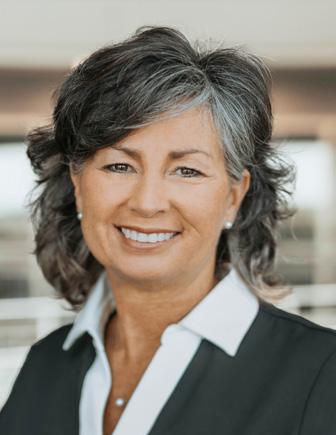
Chad S. Aduddell
CHI St. Vincent Infirmary
Little Rock
Chad S. Aduddell has been CEO of CHI St. Vincent, with its flagship CHI St. Vincent Infirmary in Little Rock, since 2015. He previously served as executive vice president and chief operations officer at CHI St. Vincent and president of CHI St. Vincent Infirmary. Aduddell came to CHI St. Vincent from St. Anthony Hospital in Oklahoma City.

Brad Bloemer
Arkansas Methodist Medical Center
Paragould
Brad Bloemer served as chief financial officer at Arkansas Methodist Medical Center in Paragould prior to being promoted to interim CEO and CEO. He previously served as CFO at hospitals in Tennessee, Kentucky and Missouri. He holds a Bachelor of Science degree in accounting and finance and a Master of Health Care Administration from Southeast Missouri State University.
Jeff Carrier
Baptist Health
Fort Smith
Jeff Carrier became president of the Baptist Health Western Region in 2022, assuming responsibility for Baptist Health’s hospitals in Fort Smith and Van Buren. A registered nurse, Carrier previously served as president and CEO of Centura Health in Kansas, as well as holding multiple leadership positions over a span of 12 years at Freeman Health System in Joplin, Missouri.
Marcy Doderer
Arkansas Children’s
Little Rock and Springdale
Marcy Doderer was named president and CEO of Arkansas Children’s, the state’s only pediatric health system, in 2013. Prior to joining Arkansas Children’s, Doderer held various leadership positions at hospitals in Texas, including at CHRISTUS Santa Rosa Health System in San Antonio, CHRISTUS St. Joseph’s Health System and McCuistion Regional Medical Center in Paris and Presbyterian Hospital of Dallas.
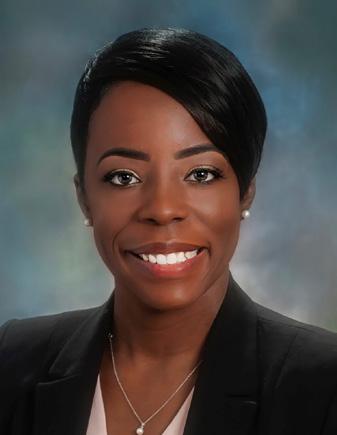
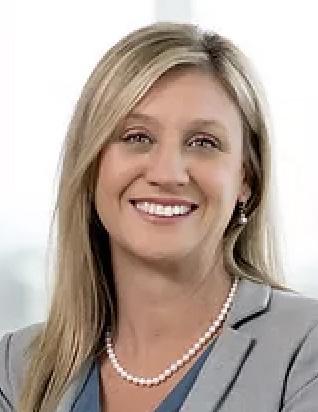
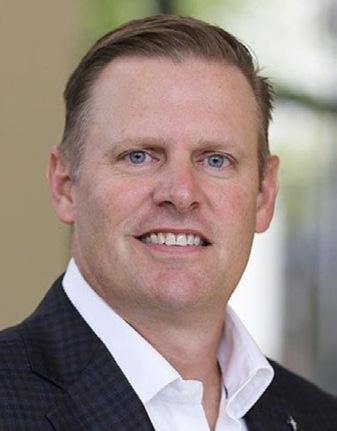
LaDonna Johnston
Unity Health-White County Medical Center
Searcy
LaDonna Johnston serves as president and CEO of Unity Health. Johnston was appointed to her role in 2024 and previously served as vice president of patient services for the system and administrator of Unity Health-Newport. As a registered nurse, Johnston brings clinical expertise to her role and has served in the organization for more than three decades.

Chris Barber
St. Bernards Healthcare
Jonesboro
Chris Barber is president and CEO of St. Bernards Healthcare, which serves 23 counties in northeast Arkansas and southeast Missouri. In his three decades with St. Bernards, Barber worked his way up from intern to administrator before assuming his current role. He has now overseen the corporate operations of the nonprofit health care system for 13 years.
Char Boulch
Saline Memorial Hospital
Benton
Char Boulch is CEO of Saline Memorial Hospital in Benton. She most recently served as chief nursing officer for the system and in the same role at Willamette Valley Medical Center in Oregon. She holds a Bachelor of Nursing from South University in Georgia and is currently working on earning her doctorate degree in nursing practice.
Sammie Cribbs
North Arkansas Regional Medical Center
Harrison
Sammie Cribbs was appointed president and CEO of North Arkansas Regional Medical Center in 2022. Cribbs was previously named chief nursing officer in 2014, as well as vice president of clinical services and chief nursing officer in 2016. She joined the hospital in 2007 and has served in leadership roles since 2011.
Ryan Gehrig
Mercy Arkansas Communities
Fort Smith and Rogers
Ryan Gehrig is the president of Mercy Arkansas Communities, where he leads all of the Mercy hospitals across the state. Gehrig joined Mercy in 2012 as the president of Mercy Hospital Fort Smith. He previously served as vice president of enterprise systems and chief administrative officer and chief operating officer at hospitals in Oklahoma and Mississippi.
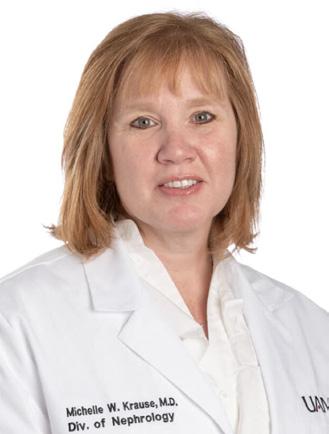
Michelle W. Krause, M.D.
UAMS Medical Center
Little Rock
Michelle W. Krause was named CEO of the University of Arkansas for Medical Sciences Medical Center in Little Rock and senior vice chancellor of UAMS Health in 2023, having held in both roles on an interim basis since 2022. She previously held numerous administrative positions, including ambulatory medical director, vice chair for clinical programs of the department of internal medicine and director of the integrated medicine service line.

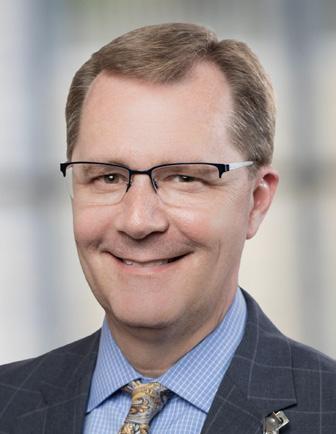
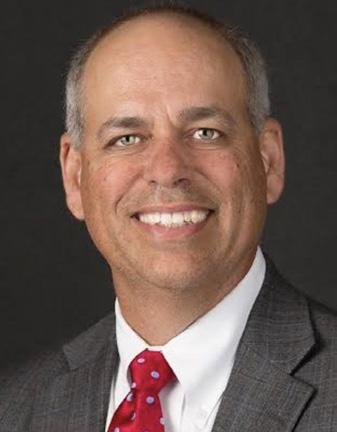

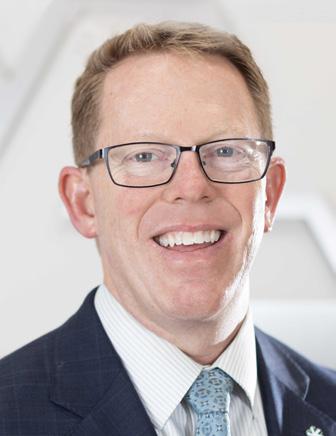

Sam Lynd
NEA Baptist Memorial Hospital
Jonesboro
Sam Lynd was named administrator and CEO of NEA Baptist Memorial Hospital and NEA Baptist Health System in 2020. Lynd previously served as chief operating officer at Baptist Memorial Hospital-Memphis and administrator of Baptist’s emergency services system wide. Lynd joined the Baptist Memorial Health Care system in 2011.
Mike Perkins
Baptist Health Medical Center
Little Rock
Mike Perkins is president of Baptist Health Medical Center-Little Rock and has additional oversight at Baptist Health Rehabilitation Institute, Baptist Health Extended Care Hospital and Baptist Health College
Little Rock. Perkins has been with Baptist Health for mor than three decades in various positions, including president of the North Little Rock medical center and vice president and administrator of Baptist Health’s rehabilitation institute and extended care hospital.
J. Larry Shackelford
Washington Regional Medical Center
Fayetteville
J. Larry Shackelford was named president and CEO of Washington Regional in 2017. Shackelford joined Washington Regional in 2010 and served as vice president of strategy and outreach before assuming his current role. Before coming to Washington Regional, Shackelford was CEO of Medical Associates of Northwest Arkansas and worked for the accounting firm Baird, Kurtz & Dobson.
Danna Wagnon Taylor
South Arkansas Regional Hospital
El Dorado
Danna Wagnon Taylor is the president of South Arkansas Regional Hospital. Taylor previously served in other leadership roles at the Medical Center of South Arkansas, as well as in administrative roles at UAMS and the Arkansas Department of Health. She graduated from Ouachita Baptist University in Arkadelphia and earned a master’s degree in health care administration from Trinity University in Texas.
Matt Troup
Conway Regional Health System
Conway
Matt Troup is the president and CEO of Conway Regional Health System. Troup has more than 20 years of executive leadership experience in the health care industry and has held various administrative roles at hospitals in Texas, Oklahoma and Florida. Before joining Conway Regional in 2015, Troup served as vice president of ancillary and support services at CHI St. Vincent.
Steven Webb
White River Health
Batesville
Steven Webb serves as president and CEO of White River Health in Batesville. Appointed in 2025, Webb previously held the role of COO at WRH. A fellow of the American College of Healthcare Executives, he holds a Bachelor of Business Administration from East Texas Baptist University and a Master of Health Services Administration from the University of Arkansas at Little Rock.
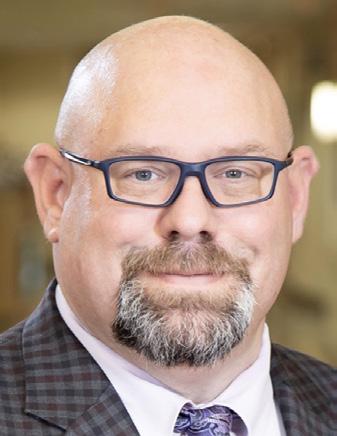
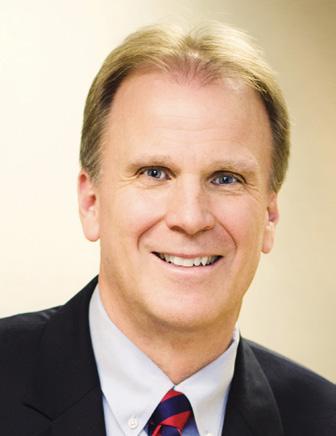

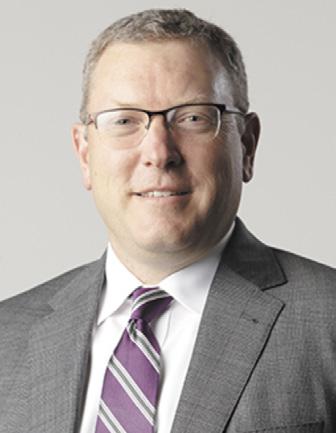

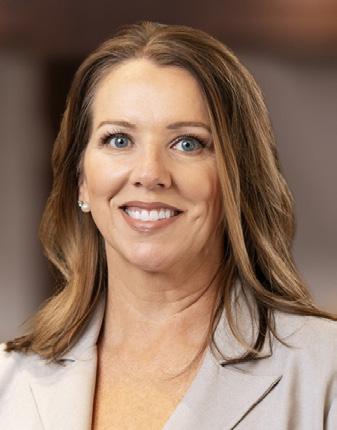
Rick Naegler
Northwest Medical Center
Springdale
Rick Naegler was named market CEO of Northwest Health and CEO of Northwest Medical Center — Springdale in 2023. Naegler joined Northwest Health from Poplar Bluff Regional Medical Center in Poplar Bluff, Missouri, where he was CEO. He was previously CEO and chief nursing officer at Lake City Medical Center in Lake City, Florida, and has served as chief nursing officer at other hospitals in Florida and Texas.
Ron Peterson
Baxter Health
Mountain Home
Ron Peterson is president and CEO of Baxter Health, formerly Baxter Regional Medical Center, and has served in that capacity since 2007. Previously, Peterson served as president and CEO of Regional Medical Center, a division of Trover Health System in Madisonville, Kentucky.

Scott Smith
National Park Medical Center
Hot Springs
Scott Smith has served as CEO of National Park Medical Center since 2020. Smith also serves in the expanded leadership position of market CEO. He oversees both National Park Medical Center and Saline Memorial Hospital, which are both Lifepoint Health facilities. Prior to joining National Park Medical Center, Smith was CEO of Western Plains Medical Complex in Kansas.
Brian Thomas Jefferson Regional Medical Center
Pine
Bluff
Brian Thomas has served as president and CEO of Jefferson Regional Medical Center since 2017. Thomas first joined Jefferson Regional in 1998 as the director of physician practices and operations support. He then went on to hold various leadership positions at other hospitals, including in Arkansas at Howard Memorial Hospital in Nashville, as well as out-of-state at J.F.K. Memorial Hospital in Indio, California; and Crestwood Medical Center in Huntsville, Alabama.
Cody Walker
Baptist Health Medical Center
North Little Rock
Cody Walker is president of Baptist Health Medical Center-North Little Rock. Walker previously served as vice president of hospital operations at the Little Rock medical center. Before joining Baptist Health in 2020, Walker held various titles at Brookwood Baptist Health in Birmingham, Alabama, including market administrator, interim COO and associate administrator.
Casey Willis
St.
Mary’s Regional Medical Center
Russellville
Casey Willis is CEO of St. Mary’s Regional Health System and St. Mary’s Regional Medical Center in Russellville. She previously served as COO of National Park Medical Center in Hot Springs. She serves as a health care expert on the Federal Reserve Council for Arkansas. She earned a bachelor’s degree in management and human relations from Trevecca Nazarene University and a master’s from Martin Methodist College, both in Tennessee.
Every year, AMP celebrates these outstanding men and women with the “Champions of Health Care” designation. This honor highlights the very best professionals at the bedside, in the clinic and at the administrative level, even recognizing entire hospitals and health systems.
OF HEALTH CARE CHAMPIONS 2025
The health care industry is the largest employment sector in the U.S., employing an estimated 17 million people as of 2023, according to the Health Resources and Services Administration. While it is a hard business, it is also big business for the economy. In 2022, the U.S. spent $13,493 per person on health care, which is 17.3 percent of the country’s gross domestic product.
Medical professionals are by our sides for some of the best days of our lives, such as the birth of a child, and some of the worst days, as in the event of a dreaded diagnosis. At Arkansas Money & Politics, we see it as our responsibility to publicly honor the hard work and dedication of outstanding medical professionals.
Every year, AMP celebrates these outstanding men and women with the “Champions of Health Care” designation. This honor highlights the very best professionals at the bedside, in the clinic and at the administrative level, even recognizing entire hospitals and health systems.
The people and institutions on this list are not just meeting the call of duty but exceeding it, so much so that patients and the community have taken notice. We hope this roster serves as a fitting spotlight for the best health care workers in the state and serves as a database for readers seeking medical help across a variety of health fields.
AMP is proud to give these hard-working professionals the spotlight this month as we congratulate all of the 2025 “Champions of Health Care” honorees.

From its start in 1921 as a small community hospital, Conway Regional Health System has grown into a network of more than 250 providers and 2,000 employees serving the health care needs of Arkansans across a wide swath of north central Arkansas.

Conway Regional
“What sets Conway Regional apart is our culture, one that embraces challenges headon. We possess a certain grit and confidence that stems from decades of rising to meet challenging moments.”
By Mary LeSieur
What distinguishes the system, said president and CEO Matt Troup, is the people.
“We’re not afraid to be bold when it matters most,” he said. “What makes us thrive is our people. Doctors, nurses and anyone who works in health care want to be a part of an organization that doesn’t stand idle but that acts with boldness because the work and purpose for which we exist is so important.”
The Conway Regional system touches many communities across the region, from Dardanelle to Clinton. Its network includes hospitals, emergency rooms and after-hours clinics, primary care clinics, specialty care medical offices, imaging centers and labs, a rehabilitation hospital, therapy centers, and a top-notch health and fitness center.
The medical center itself has served as cultural bedrock and one of the city’s economic drivers since it opened more than 100 years ago. Conway Regional has been recognized numerous times as a best place to work in state and national publications, and its employee engagement score ranks among the top 25 percent of hospitals nationwide.
That dedication to patient and employee satisfaction has placed Conway Regional on Arkansas Money & Politics’ 2025 list of “Champions of Health Care” for health care systems.
Troup said the system’s approach to care is designed to foster an environment that results in satisfied patients and happy employees, and such accolades reflect a “culture rooted in accountability, teamwork and purpose.”
“Conway Regional’s effectiveness stems from its strong, physician-led and professionally managed model, which creates a culture of accountability, innovation and collaboration,” he said. “Conway Regional is a not-for-profit health system that puts patients first through a curated experience that brings together key services, technology and community partnerships in a way that is both intentional and personal. Our accountable clinical management model fosters shared governance between medical staff and leadership, aligning decisions directly with patient outcomes and experience.”
The system’s strengths lie in its people,
culture and deep connection to the community, Troup said.
Conway Regional is an essential part of the health care story in the communities it serves, in some cases offering services local residents would otherwise have to drive long distances to access.
“Clinically, we offer a comprehensive range of services through 11 primary care and 17 specialty clinics, a health and fitness center, a rehabilitation hospital, and a critical access hospital in Dardanelle,” Troup said. “We are committed to expanding access to care by bringing specialty providers to our primary care clinics, allowing patients to receive care closer to home. Our strong athletic training partnerships with local schools and colleges help keep student-athletes healthy, active, and connected to quality care.”
As one of the region’s top employers, Conway Regional plays a key role in the community’s physical and economic health.
“We have had a long-standing commitment to be the community’s hospital,” Troup said. “That means playing a key role in health and wellness while also supporting our community’s economic health and wellness. From supporting local 5K and 10K races to sponsoring events like Biketoberfest and engaging with local teachers and the chambers of commerce, we are actively involved in promoting health and wellness across the region.”
Conway Regional is equally invested in the future of health care, Troup added. Each year, the system hosts the MASH Program for high school students interested in medical careers.
“In 2025, the program saw a record number of applicants, with over 40 students participating in hands-on, immersive experiences designed to spark a passion for service in the next generation of health professionals,” he said.
Plus, Conway Regional’s graduate medical education program helps address Arkansas’ physician shortage while training the next generation of much-needed doctors. In 2025, the program reached a significant milestone with a full complement of residents across internal medicine, family medicine and the family medicine ruraltraining track.
The health care industry is not likely to get any easier. Whatever challenges lie ahead, Conway Regional will continue to lean on what always made it strong, Troup said.
Matt Troup, CEO
















































































































































OF HEALTH CARE CHAMPIONS 2025



























This year, Arkansas Money & Politics readers selected almost 100 health-care professionals and institutions across multiple health care categories to be recognized as “Champions of Health Care” for 2025. Champions of Health Care can be anyone in the industry, from surgeons and physician assistants to nurse practitioners and volunteers, and they can work for large health systems or small clinics. As they continue to work the front line to help keep us all safe, AMP salutes these true “Champions of Health Care.”



ALLIED HEALTH CARE PROVIDERS






ARIEL ADAMS, AU.D., CCC-A Hear Again America








SARAH HAYS, D.C.
Little Rock Chiropractic & Acupuncture
DEREK LAGEMANN, PT, DPT, FAAOMPT Physical Therapy Institute



EVAN NEWBOLT, M.D.
McFarland Eye Care








CANCER CARE PROVIDERS







JERRI S. FANT. M.D., FACS CARTI



Dr. Ariel Adams is a clinical audiologist at Hear Again America in Little Rock, where she is passionate about putting patients first in hearing health care. A graduate of Gallaudet University in Washington, D.C., and lifelong hearing aid user, Adams focuses on how hearing impacts her patients’ individual lifestyles rather than simply selling hearing aids. She is committed to providing the premium service patients actually want — genuine care and integrity that restores not just sound, but meaningful connections in daily life.
Hospital and Ohio State University. At UAMS, Xia leads National Institutes of Health-funded research on radiation resistance and brain metastasis and has played a pivotal role in advancing state-of-the-art radiation oncology treatments, such as proton therapy.
HEALTH CARE ADMINISTRATORS













IRLNA INGRID TANTCHOU, M.D. Highlands Oncology Group

KIM CLATWORTHY



MONTANA CHAPMAN, PT, DPT
Advanced Physical Therapy of Central Arkansas










Montana Chapman has been with Advanced Physical Therapy of Central Arkansas since 2018 and specializes in orthopedic and pelvic health physical therapy for women. She is the co-owner and clinical director of the CARTI location. She is certified in trigger point dry needling, LSVT BIG and The One80 System.


MICHELLE WALTERS, D.O., FAOCR MANA The Breast Center

R. TIMOTHY WEBB, M.D., FACP Genesis Cancer & Blood Institute
FEN XIA, M.D., PH.D., FASTRO UAMS















Elder Independence Home Care

REBEKAH FINCHER





Conway Regional Health System






Dr. Fen Xia is professor and chair of radiation oncology at the University of Arkansas for Medical Sciences in Little Rock. She is both a Harvardtrained cancer biologist and a boardcertified radiation oncologist who has held clinical and academic positions at Vanderbilt University School of Medicine, Massachusetts General







Rebekah Fincher serves as chief administrative officer at Conway Regional Health System, where she oversees strategic growth, physician recruitment, clinic acquisitions and graduate medical education for more than 30 residents each year. Her leadership has expanded access to specialty care across central Arkansas. She has received multiple honors, including awards from local publications and the C.E. Melville Young Administrator of the Year.






























CONGRATULATIONS TO MONTANA CHAMPMAN. PT, DPT.
Won in category Allied Health Care Provider.





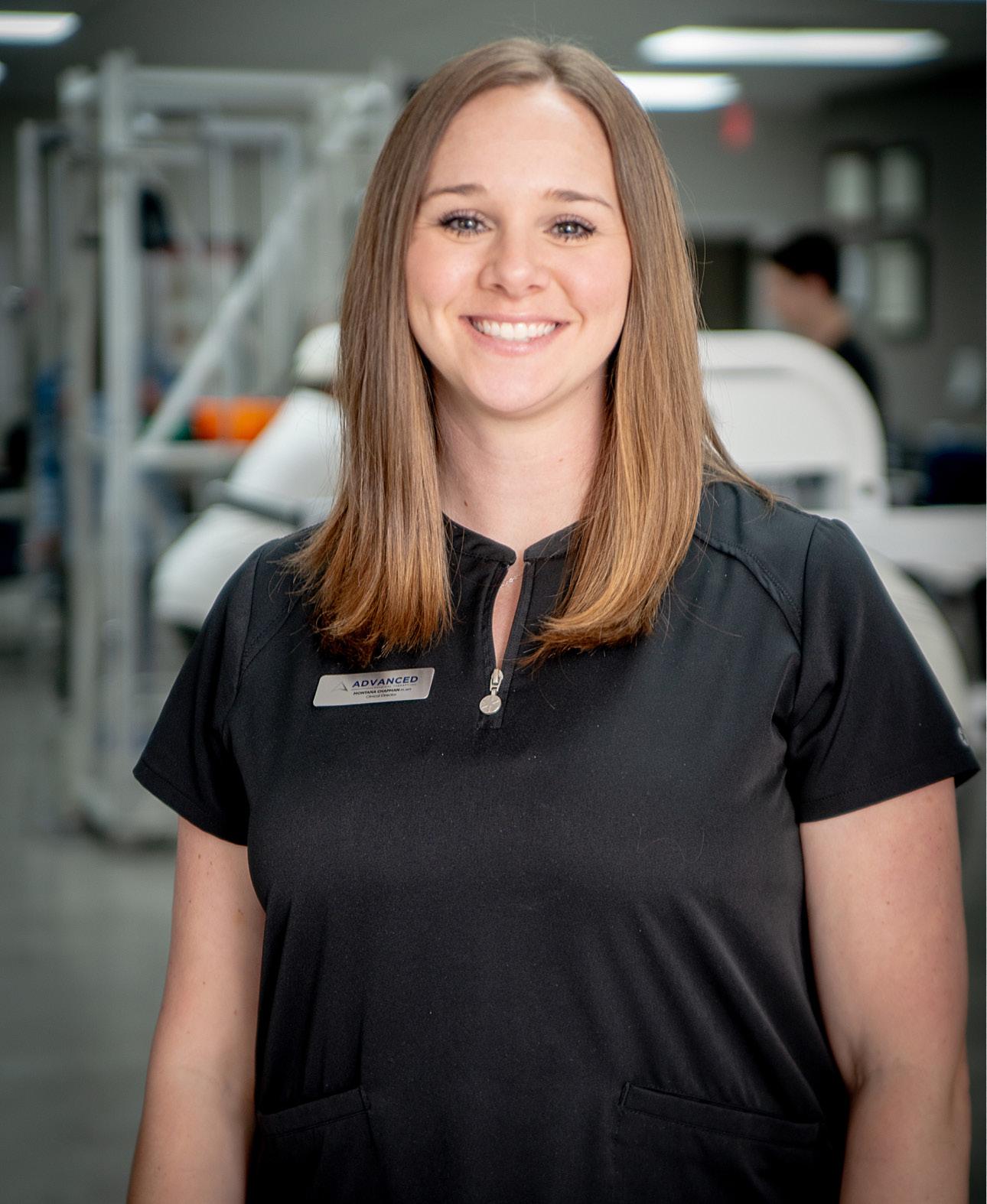
At Advanced Physical Therapy, our focus is on providing patient-centered, outcome oriented and scientifically based treatment for general orthopedic problems, prenatal and postpartum conditions, and pelvic floor dysfunction for men, women, and children of all ages.














Advanced Physical Therapy of Central Arkansas aptlr.com






































































BRIAN GITTENS, ED.D., MPA
UAMS

























































Brian Gittens is the vice chancellor for human resources at the University of Arkansas for Medical Sciences in Little Rock, a position he has held since June after serving in an interim capacity for several months. Previously, Gittens oversaw the division for academic pathways and workforce development. A Marine Corps veteran who joined UAMS in 2019, Gittens is a human resource professional, researcher and educator with more than 35 years of operational and administrative experience.







HEALTH CARE CEOS
ZACH BIRD
Springwoods Behavioral Health
MARCY DODERER, FACHE

Arkansas Children’s









NICHOLE SIMPKINS
CHRIS TROPP
HEALTH CARE VOLUNTEER/ PHILANTHROPIC ORGANIZATIONS
ARKANSAS CHILDREN’S FOUNDATION


Arkansas Surgical Hospital



Pinnacle Pointe Behavioral Healthcare



Marcy Doderer is president and CEO at Arkansas Children’s, where she leads the state’s only pediatric health system. Under her dynamic leadership, Arkansas Children’s is advancing specialized clinical, research and academic programs to create a healthier future for children, especially in the American heartland. In more than a decade, Marcy has extended the health system’s reach through an expanded physical footprint to better serve the children and families of Arkansas.




Chris Tropp, chief operating officer at Arkansas Surgical Hospital in North Little Rock, graduated from the University of Arkansas for Medical Sciences in Little Rock with a Bachelor of Science degree in nursing in 1994. He started his career as an operating room nurse and helped develop a total joint and spine program. He served as the director of surgery at two local hospitals before coming to Arkansas Surgical Hospital.

ADAM HEAD CARTI

VERONICA LOVE
Home Health Care of Arkansas
Because of the generous support of Arkansas Children’s benefactors, 850,000 children in Arkansas have access to nationally recognized care close to home at Arkansas Children’s two pediatric hospitals, statewide clinics and many community programs. Yet the work together is not complete. By most national measures of child health and well-being, children in Arkansas are among the least healthy. Gifts ensure Arkansas Children’s is always available to help children and provide resources to meet the needs of each family who arrives seeking treatment.
CARELINK




MATT TROUP, CEO
Conway Regional Health System









HEALTH CARE ADVOCATES








CONWAY REGIONAL HEALTH FOUNDATION
ARKANSAS BIRTHING PROJECT



ARKANSAS CENTER FOR HEALTH IMPROVEMENT






For the past 10 years, Matt Troup has served Conway Regional Health System as president and CEO, leading the organization through record growth and earning consecutive Best Places to Work honors both statewide and nationally. He brings prior leadership experience from Texas, Oklahoma and Florida. He has degrees from Texas A&M University and Trinity University in Texas. Troup views health care as a faith-driven calling, inspiring teams across the system to be bold, exceptional and committed to serving others.

The Conway Regional Health Foundation, established in 1996, supports Conway Regional Health System by funding equipment, facility improvements, community programs and education. As a not-for-profit hospital, Conway Regional reinvests all revenue to enhance care. The foundation relies on donations from individuals, corporations and foundations to meet growing health care needs and advance innovative projects, ensuring high quality, compassionate care for central Arkansas.


ARKANSAS MEDICAL SOCIETY







TROY WELLS
Baptist Health

HEARTLAND WHOLE HEALTH INSTITUTE




DONNA TERRELL’S WARRIORS FIGHTING CANCER










UAMS INSTITUTE FOR COMMUNITY HEALTH INNOVATION























The UAMS Institute for Community Health Innovation is a leader in community-based health research and programs designed to create a better state of health for all. Located in Springdale, the institute exists to change the state of health in Arkansas by driving impactful, lasting changes in health outcomes, clinical practices, education and policy. The institute is strategically focused on maternal and child health; access to health services; health, hunger and nutrition; and diabetes and cardiometabolic diseases.
Troy Wells is the President and CEO of Baptist Health. Wells joined Baptist Health in 2006 and assumed the role of president and CEO in 2014, becoming only the third person to hold the title since World War II. Wells earned a master’s degree in health services administration from the University of Arkansas at Little Rock and a bachelor’s degree in microbiology from the University of Arkansas at Fayetteville.






SICKLE CELL WARRIORS OF BLYTHEVILLE











HOME HEALTH CARE
CONWAY REGIONAL HOME HEALTH






HEALTH CARE CLINICS






FRANKS DERMATOLOGY
GASTROARKANSAS
CABOT HEALTH & WELLNESS





PINNACLE HEARING


LITTLE ROCK FAMILY PRACTICE


Conway Regional Home Health provides high-quality, in-home care for patients recovering from illness or disability. Services include skilled nursing, therapy, wound care, IV therapy and more, all coordinated under a physician-directed treatment plan. Rated 4.5 stars by the Centers for Medicare & Medicaid Services, the team exceeds national averages in key quality measures. With a dedicated staff of nurses, therapists and support professionals, Conway Regional Home Health helps patients heal comfortably and safely at home.




























Dr. Hayden Franks opened Franks Dermatology in Little Rock nine years ago and has since been help ing patients both young and old feel good in their skin.







Dr. Hayden Franks, owner

Franks Dermatology




“We do not necessarily want to










By Alex Hardgrave


biggest, but we just want to be known as the best,” he said.

From the friendly staff to the spa-like de cor, every part of Franks Dermatology has been created to make patients feel safe and comfortable, Franks said.

“When patients come in, we have to assume they’re nervous, itching, in pain or anxious,” he said. “They may be none of those things, but we assume they could be one of those things or more. We wanted the decor and feel of the space to take them off their guard.”

Franks said what drew him to specialize in dermatology is he gets to see patients of all ages and how quick paced things can be.

“It’s a very fast-paced specialty,” he said. “You never know what you’re going to see. Every day is different, and to me, that’s very rewarding, very stimulating and a lot of fun.”
Originally from Magnolia, Franks graduated from Hendrix College in Conway and completed medical school at the University of Arkansas for Medical Sciences in Little Rock. After a dermatology residency, he practiced in Texarkana before moving to Little Rock 19 years ago.
Franks said he found a lot of success since starting the practice and has grown his team to include two physician assistants, Bailey Pollock and Elizabeth Turbeville. Also, four years ago, he opened a separate medical spa called SKN at Franks Dermatology. SKN features a nurse injector and esthetician on the team to do the more cosmetic types of skin care, such as Botox, lasers and fillers.
“The plan is to continue to grow,” he said.”We’re looking at adding another provider in the next year or two, and the same thing at SKN. It’s growing and has been very busy.”
He said he and the team will remain curious and dedicated to patient care.
“It’s hard to toot your own horn, but we love patient care, and we love being in central Arkansas and, hopefully, being seen as a champion, as a premier provider of dermatology services for Arkansas,” Franks said.


One part of his practice he is especially proud of is the gap-year program. Every year, he hires five to seven health care students who are taking a gap year between college or nursing school programs.

One of his favorite parts of the job is get ting to interact with the patients.
“Most physicians go into practice to help people,” he said. “I certainly did.”





To manage his own practice, Franks said he had to learn a lot about business that was not taught in med school, but he re ally enjoys the independence of owning his own practice and the learning opportunities he has had along the way.
“We teach them along the way, and with their curiosity and intelligence, they really help us to provide high-quality care,” he



“You wear a lot of different hats,” he said. “You need to know a lot about business. You need to know a lot about accounting, [human resources], marketing.”
He said he considers health care professionals who own their own practices a “dying breed” but sees many benefits to how they are able to provide care by being a small business.

“We really get to know our patients well,” he said. “When they call the clinic, a person answers. It’s almost concierge-type medicine.”
He also said the Franks team stands out from the rest because it stays curious and asks questions to give the best care possible to their patients.
“We do not necessarily want to be the

He said staff enjoy helping students who might have applied to a program and did not get in but are looking to reapply.

“They’re maybe at a low point in their lives because it’s disappointing,” he said. “We get to be a part of their upward trajectory. They’re only with us for a short period of time, but they’re really going places in their lives, and we get to be a spot for them to learn and continue their education.”
Beyond Franks Dermatology, Franks is a husband and father. He also likes hunting and playing golf.
“I don’t get to do much of those things because of my busy practice,” he said. “There is not a lot of time left over for hobbies, but when I do have free time, I’m spending it with family or outdoors.”
Franks is also the chair of the Arkansas Game and Fish Foundation, which he said has been an avenue for him to give back to the state he loves.
He said he relishes the work he does, even though it keeps him busy.
“It’s been gratifying and really fun,” he said. “I can’t imagine doing anything else.


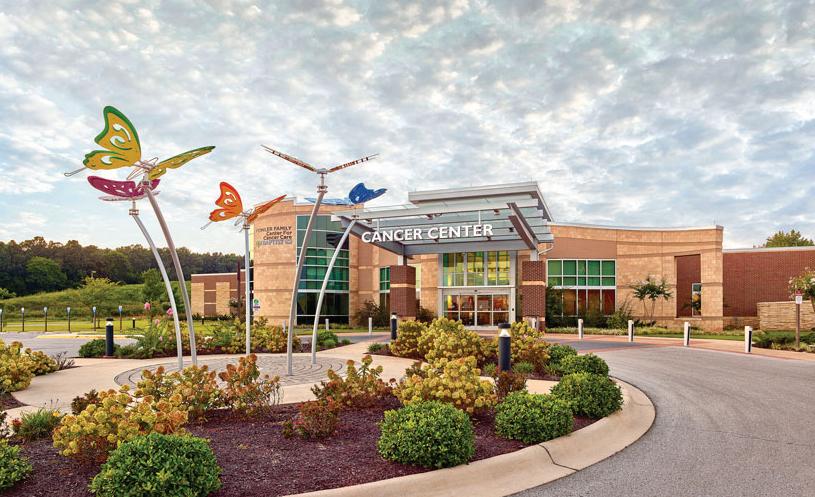















































































































SUPERIOR SENIOR CARE






































































For four decades, Superior Senior Care has been the trusted name in In-Home care across Arkansas. Locally owned and founded in Hot Springs in 1985, we’re proud to continue our legacy of client-directed care. With 27 locations statewide, we make it easy for families to find reliable, personalized care in the comfort of their own homes.



INNOVATION IN HEALTH CARE
ADVANCED PHYSICAL THERAPY OF CENTRAL ARKANSAS





HOSPITAL SYSTEMS


ARKANSAS CHILDREN’S


At Advanced Physical Therapy of Central Arkansas, the focus is on providing patient-centered, outcome oriented and scientifically based treatment for general orthopedic problems, lymphatics and prenatal and postpartum conditions, as well as pelvic floor dysfunction for men, women and children of all ages.

ARKANSAS SURGICAL HOSPITAL









Arkansas Children’s is a nationally ranked health care system dedicated to caring for families across the region, including Arkansas’ 850,000 children. The private nonprofit organization includes two pediatric hospitals with 361 licensed beds, a pediatric research institute and U.S. Department of Agriculture nutrition center, a philanthropic foundation, a nursery alliance, statewide clinics, and many education and outreach programs — all focused on fulfilling a promise to define and deliver unprecedented child health.











BAPTIST HEALTH











including White River Medical Center in Batesville and Stone County Medical Center in Mountain View. White River Health includes hospitals, primary care and specialty clinics, as well as outpatient care centers.
LARGE HOSPITALS (100 BEDS OR MORE)
BAPTIST HEALTH MEDICAL CENTERLITTLE ROCK

Baptist Health Medical Center-Little Rock is the largest private, notfor-profit hospital in Arkansas. The nationally recognized, faith-based hospital opened as Baptist State Hospital in November 1920 and was legally incorporated on Feb. 16, 1921. BHMC-Little Rock has 827 licensed beds and serves as the flagship hospital of Baptist Health. It is easily accessible off Interstates 30 and 630 in west Little Rock. BHMC-Little Rock’s emergency department is a Level II Trauma center.
NORTH ARKANSAS REGIONAL MEDICAL CENTER
UAMS MEDICAL CENTER

Arkansas Surgical Hospital in North Little Rock is one of the only five-star hospitals in the state and ranks in the top 5 percent in the nation for patient experience. The hospital features 41 private patient suites and 13 state-ofthe-art operating rooms. The surgeons’ specialties range from orthopedic and spine treatments to breast oncology and interventional pain management. The physicians at Arkansas Surgical Hospital perform more joint replacement procedures than any other hospital in the state while maintaining a lower-than-average infection rate.



For more than a century, Baptist Health has delivered the best in health care through Christian compassion and innovative services. Baptist Health, Arkansas’ most comprehensive health care organization, is here “For You. For Life.” with more than 250 points of access that include 12 hospitals, urgent care centers, a senior living community, more than 100 primary and specialty care clinics, a college with studies in nursing and allied health, and a graduate residency program.
CHI ST. VINCENT


CONWAY REGIONAL HEALTH SYSTEM


















BEYOND WELLNESS




Beyond Wellness is a total health destination that elevates the traditional wellness experience by serving individuals seeking a custom and holistic lifestyle. Utilizing functional medicine and cutting-edge breakthrough therapies, Beyond Wellness creates a specialized solution that promotes longevity and champions clients’ personalized wellness journey results.

PROTON CENTER OF ARKANSAS

















Conway Regional Health System delivers comprehensive care to eight counties in north central Arkansas and the River Valley. Anchored by a 180bed medical center, the organization offers services that include heart health, women’s health, orthopedics, endocrinology and more. The system includes 11 primary care and 17 specialty clinics, a rehab hospital, and a health and fitness center. Nationally recognized for workplace excellence, Conway Regional partners with physicians through a unique shared governance model to elevate care and patient experience.
























The Proton Center of Arkansas opened in 2023, becoming the first proton therapy center in the state and only the 43rd in the nation, providing the most advanced cancer radiation treatment in the world. A collaboration between the University of Arkansas for Medical Sciences, Arkansas Children’s, Baptist Health and Proton International, the center is located in the UAMS Radiation Oncology Center in Little Rock. Proton therapy uses positively charged proton particles to destroy tumors with greater precision and significantly less damage to healthy organs and tissues.
A 535-bed hospital with outpatient clinics in midtown Little Rock, the University of Arkansas for Medical Sciences Medical Center in Little Rock is the state’s only adult Level 1 trauma center and the state’s first comprehensive stroke center. UAMS also has the state’s only solid organ, bone marrow and stem cell transplant programs. In 2024, the UAMS Medical Center was awarded the highest international recognition for excellence in nursing from the American Nurses Credentialing Center, achieving designation as a Magnet hospital, making UAMS one of just five hospitals in Arkansas to the distinction.




WASHINGTON REGIONAL MEDICAL CENTER




UNITY HEALTH




WHITE RIVER HEALTH



LONG-TERM CARE FACILITIES





BELVEDERE NURSING & REHABILITATION

BRIARWOOD NURSING & REHABILITATION
NURSING AND REHABILITATION






CENTER AT GOOD SHEPHERD





White River Health offers multiple health care facilities and clinics throughout north-central Arkansas,





The Nursing and Rehabilitation Center at Good Shepherd in Little Rock offers a full range of services, including skilled nursing, rehab after surgery or illness, and long-term care, all provided by a caring and experienced team. Every
























Launching a health care business just weeks before a global pandemic might sound like a risky move, but for Veronica Love, it was a calling.









Veronica Love





“I learned early that how you treat







By Mary LeSieur
In December 2019, after 25 years in the au tomotive industry, Love opened the doors to Home Health Care Agency of Arkansas.


Before she founded one of Arkansas’s fastest-growing agencies, Love spent decades climbing the corporate ladder, but she often thought back to her childhood, which was defined by caregiving.


“I was helping grow other people’s businesses,” Love said. “I finally asked myself, ‘What if I used those same skills to build something of my own — something with purpose?’”

That question led her to home health care, a field she was no stranger to. As a child, she and her sister helped care for their father, who had multiple sclerosis. The experience left a lasting impression, shaping the values she now brings to every part of her business: compassion, patience and kindness.
“I learned early that how you treat people matters — especially people who can’t do for themselves,” she said. “I wanted to create a company that reflected that.”




Love’s shift from finance director and general manager to founder and CEO was dramatic but deliberate. She had already begun laying the groundwork for her business for four years before officially leaving the auto industry. She was ready to step in full time when she opened her agency in late 2019, but soon after, the COVID-19 pandemic knocked those plans for a loop.



caregivers who are not only trained but emotionally equipped.

“You have to be aware of the unaware,” she said. “Dementia clients may not know they’re being unkind, but we still have to show up with compassion. That’s something I screen for in every single hire.”
Love credited her company’s growth to more than strategy and staffing. Faith is a central part of her life and her leadership. Every workweek at the agency begins with prayer and a group discussion rooted in John Maxwell’s leadership books. She also offers her staff access to an on-call chaplain for spiritual support.
“This is a faith-based business,” she said. “Everything I have, God gave me. I want that to be reflected in how we treat people — clients and staff.”

The agency’s reputation has grown largely through word of mouth. Love said referrals come from one satisfied client telling another — and sometimes those clients do not even know each other directly.


“You can buy Google ads, but they don’t compare to someone speaking your name when you’re not in the room,” Love said. “That’s the kind of marketing you can’t pay for.”

Although she now manages more than 130 employees between two businesses, Love remains closely involved in day-to-day op erations. She travels across Arkansas to per sonally meet new clients and caregivers and performs regular spot checks alongside the agency’s nurse.

“My husband thought I was crazy,” Love said. “He said, ‘You’re opening a business, and the world is shutting down?’ but I knew we were doing something needed.”
Despite the challenges, the agency stayed open and quickly found its footing. What started with a few clients in Little Rock has grown into a statewide operation. Today, Home Health Care Agency of Arkansas serves more than 100 clients across urban centers and rural towns, from Stuttgart and West Memphis to Fayetteville, providing personal care, companionship and transportation to elderly and disabled individuals.
A significant part of the company’s client base includes veterans and patients with dementia or Alzheimer’s disease. Love emphasized the importance of pairing clients with


“I want people to know we’re real,” she said. “We’re local, we care, and we’re going to show up.”
Love also makes weekly calls to clients, follows up on referrals, and continually updates the company’s website and offerings. Whether addressing no-shows, checking schedules or ensuring client satisfaction, her leadership is deeply personal.
Despite her success in the automotive industry, Love said her current role is more rewarding than anything she has done before.
“I made great money in the car industry,” Love said, “but now I’m doing something that makes a difference for people who can’t give anything back in return, and that feels right.”
While the agency continues to grow, Love said her mission remains simple: “If we can help one more person stay in their home, stay safe and feel seen, we’ve done our job.”


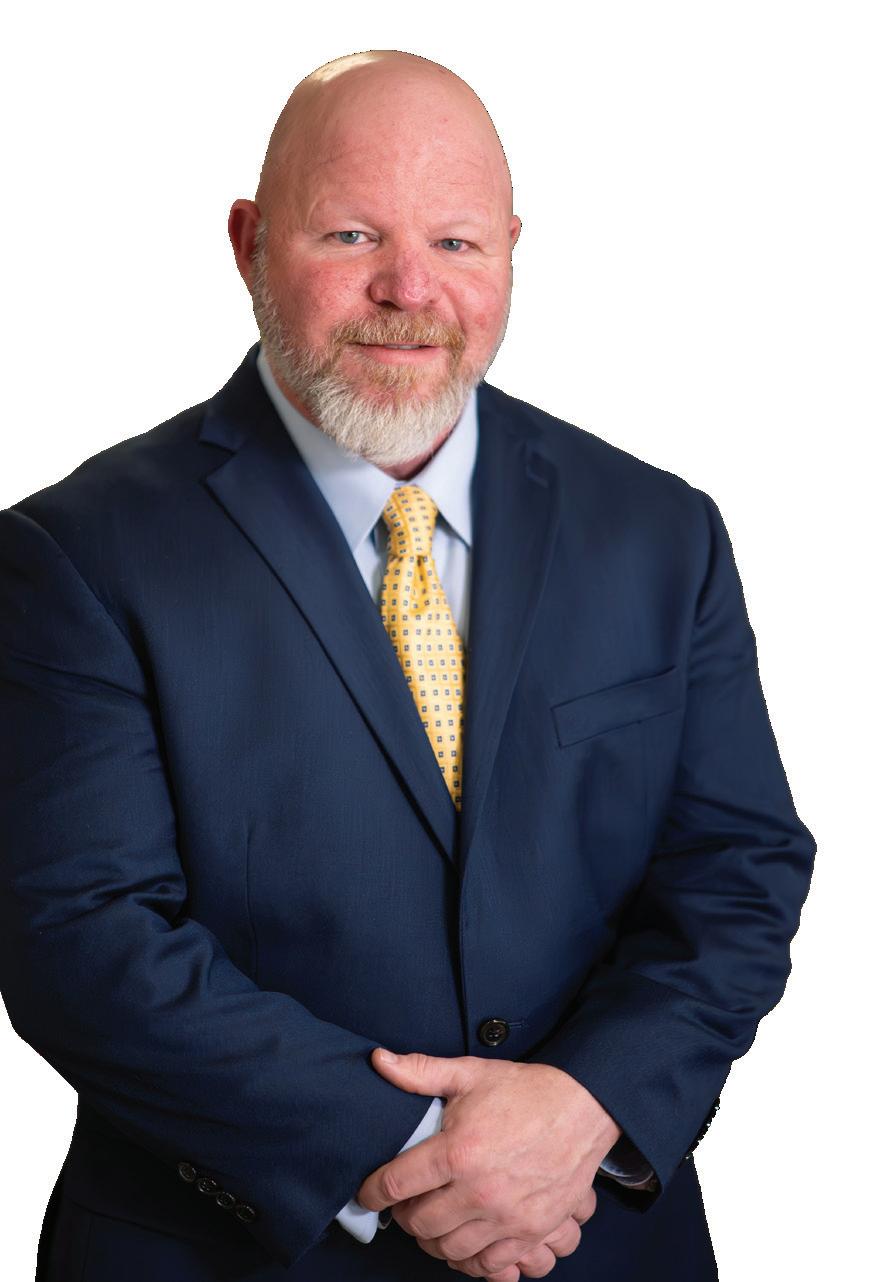
UAMS Proudly Celebrates our Champions of Health Care
We congratulate the outstanding individuals and teams across UAMS recognized as Champions of Health Care. From providers to community health leaders, they are everyday heroes making a difference.
Health Care Administrator
Brian Gittens, Ed.D, MPA
UAMS Vice Chancellor for Human Resources
Health Care Advocate
UAMS Institute for Community
Health Innovation
Registered Nurse
Terri Imus, BSN, RN
UAMS Institute for Digital Health & Innovation
Large Hospital (100 beds or more)
UAMS Medical Center
Cancer Care
Fen Xia, M.D., Ph.D.
UAMS Winthrop P. Rockefeller Cancer Institute
Physician
Omar Atiq, M.D.
UAMS Winthrop P. Rockefeller Cancer Institute
Innovation in Health Care
Proton Center of Arkansas
A collaboration of UAMS Health, Arkansas Children’s, Baptist Health and Proton International.
At UAMS Health, we’re here to provide you with the best care, right here close to home. With a staff of the best and brightest, personalized medicine and convenient access to clinics, you can feel confident knowing the state of your health is in exceptional hands.
To find a doctor, visit UAMS.Health/Champs or call 501-686-8000
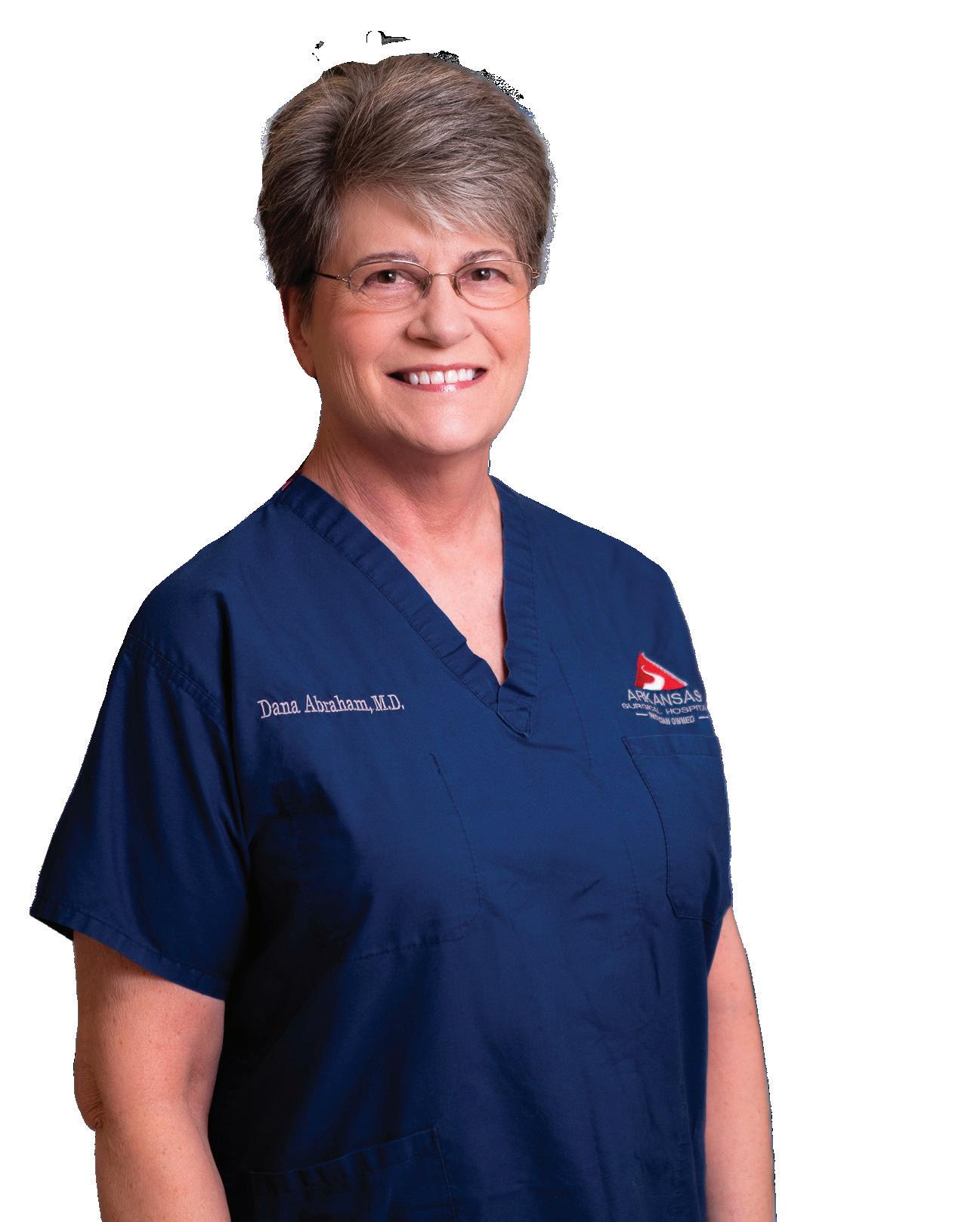


Chris Tropp, COO Health Care Administrator
Small Hospital & Innovation in Health Care Arkansas Surgical Hospital
Dr. Dana Abraham Surgeon
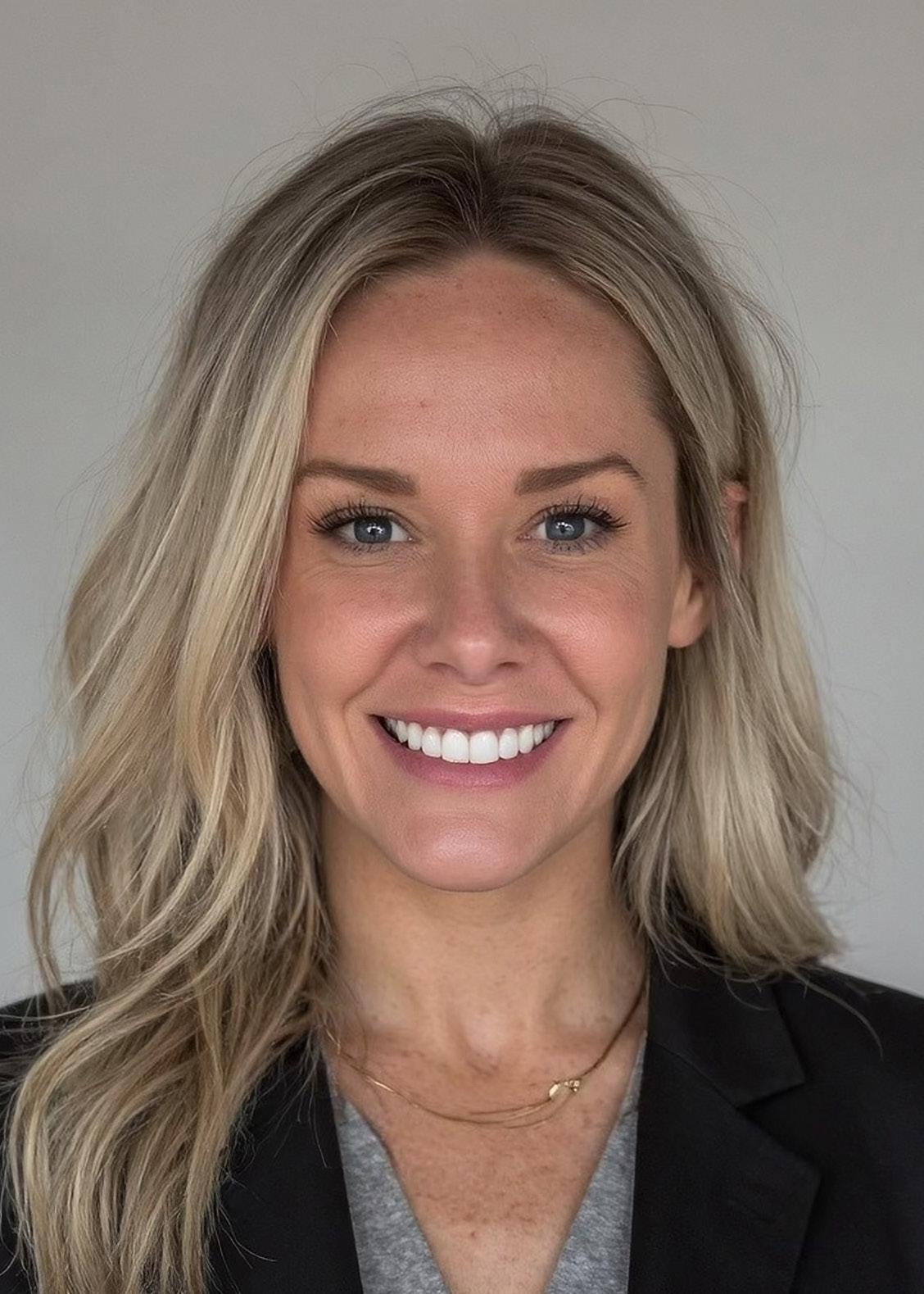
CareLink
Randi Metcalf, chief operating officer at CareLink, has worn many hats since joining the agency only a year and a half after graduating from college. She has now been a part of the team for 17 years.
CareLink is a nonprofit agency with the mission to provide resources for older people and their loved ones. It offers services such as information and assistance, in-home care, Meals on Wheels, family caregiver support and more.
“I loved the mission, loved what we did,” she said.
Metcalf started at CareLink as a social worker doing home visits and assessments.
After two years, she moved over to the development department and also worked as the former CEO’s executive assistant. She said in those positions, she was introduced to and became familiar with every aspect of CareLink’s operations.
“I just got a really well-rounded view of the agency,” she said.
A few years later, she was promoted to vice president of development. While in the development department, she helped start CareLink’s big fundraising effort, Cupcakes for Goodness Sake, which brings together local professional and amateur bakers who make confections for the community to sample.
“We wanted it to be something fun,” she said.
In 2020, Metcalf moved to the COO position. The role entails overseeing all the programs and even the facilities at the three buildings CareLink has, she said.
team for the community it serves.
One example is the urgent needs fund, which can be used for anything clients may need and not be able to afford.
“They might choose to pay their electric bill over getting a medication,” she said.
With the fund, CareLink can provide people with money to cover surprise costs they may not have the money to pay for themselves.
Metcalf said she is also proud of the organization’s transportation department, which provides a door-to-door transport service that can help older individuals get where they need to go, such as doctors appointments, even if they have mobility issues.
CareLink also has a Meals on Wheels program that provides dietitian-approved meals Monday through Friday to any seniors 60 and older who are homebound and unable to prepare meals. The free program is funded by donations and grants.
Another program is Bone Appétit, which provides dog food and care services.
“Though it actually serves an animal, it’s for the older person who has them as their companion, their lifeline,” she said.
Metcalf has a dog of her own which she enjoys spending time with to recharge after a long day at work. She also likes to make time to exercise.
Beyond that, to sustain herself through difficult days, she loves to hear success stories from her coworkers.
“Recharging is talking to staff and hearing what they have going on, hearing the good stories,” she said.
“Senior centers back in the 70s and 80s, they were playing bridge and bingo. Seniors now don’t look like seniors. They don’t act like seniors.
By Alex Hardgrave
“All of that lives under this role,” she said. “I kind of touch everything other than [human resources], finance and development.”
CareLink is a one-stop shop for caring for oneself as one ages or for a loved one or neighbor to help assist an older person. Even if something is not covered in one of CareLink’s many programs, the organization has staff on call to connect people with outside resources, she said.
“We have our hand in a lot, but we also just know everything,” she said.
Metcalf said she spends her days keeping a pulse on what is happening and troubleshooting issues that arise. The best part of the job, in her opinion, is when she can see new needs being met by the CareLink
Metcalf also said she has to find the lighthearted moments.
“You have to laugh,” she said. “You have to find humor in everything.”
Further on in her career, she plans to continue working for CareLink and to continue to meet the ever-evolving needs of elderly Arkansans.
“Senior centers back in the ’70s and ’80s, they were playing bridge and bingo,” Metcalf said. “Seniors now don’t look like seniors. They don’t act like seniors. I want to make sure that we’re aware of that, responsive to that and able to meet that need, whatever it’s going to be. This requires us to constantly change, constantly educate ourselves and keep a pulse on what’s going on with the population we serve.”
Randi Metcalf, COO







Not mass-produced health care. Curated care.
Conway Regional has a vision. For more than a century, our team has brought together key service lines, providers, and technologies to create patient experiences that are highly intentional and refreshingly personal. It’s about blending access and excellence. Familiarity – and erce commitment. Advocating for patients while providing the services our communities deserve. See what curated care looks like for you.













































































































resident has a personalized care plan that focuses not just on medical needs, but also on emotional well-being and quality of life.
PRESBYTERIAN VILLAGE












SHERWOOD NURSING & REHABILITATION CENTER


MENTAL HEALTH FACILITIES

ARGENTA COUNSELING & WELLNESS










PHYSICIANS
OMAR T. ATIQ, M.D. UAMS



THE BRIDGEWAY
THE CENTERS

COMMUNITY SERVICES


Dr. Omar T. Atiq is a medical oncologist at the University of Arkansas for Medical Sciences Winthrop P. Rockefeller Cancer Institute in Little Rock and a distinguished professor in the UAMS College of Medicine Department of Internal Medicine Division of Hematology and Oncology. He also holds the Omar T. Atiq, M.D., MACP, Distinguished Chair in Physician Leadership. In 2023, he became the first Arkansan to serve as president of the American College of Physicians, the largest medical specialty organization in the nation.



MAGGIE BROWN, PA-C OrthoArkansas
JARED ELMQUIST, PA


Conway Regional Health System

SPRINGWOODS BEHAVIORAL HEALTH

WESTROCK COUNSELING




NURSE PRACTITIONERS
ZACH COCO, APRN



ROSEMAY BATTA-MPOUMA, M.D.
Jared Elmquist is a physician assistant at Conway Regional Surgical Associates. He earned his bachelor’s degree from the University of Central Arkansas in Conway in 2013 and completed his Master of Physician Assistant studies at the University of Arkansas for Medical Sciences in Little Rock in 2021. Jared brings 12 years of experience in the operating room and is eager to support patients in any way he can. He also serves as a preceptor for physician assistant students from various programs.
Washington Regional Shiloh Clinic
ANTHONY FLETCHER, M.D.

CHI St. Vincent Heart Clinic Arkansas
CHEN HUANG, M.D.
North Arkansas Regional Medical Center
BROOKE MONEY
Conway Regional Renaissance Women’s Center
New Path Mental Health & Wellness
CHRISTA JACKSON, APRN Beyond Wellness








CARROLL SCROGGIN, M.D.

NEA Baptist Fowler Family Center for Cancer Care










With a holistic approach to health care, Christa Jackson discovered her passion for both men’s and women’s health, quickly realizing her calling in helping patients achieve and maintain optimal well-being. Jackson firmly believes in listening, educating and empowering her patients to protect and restore their health. She specializes in a range of areas, including weight management, peptide therapy, hormone optimization, laser therapies, body contouring, microneedling, radio frequency microneedling, hair restoration, joint injections and injectables. Jackson finds fulfillment in her work, where she can integrate her faith into her practice.

















Brooke Money provides compassionate, comprehensive care at Conway Regional Renaissance Women’s Center. A graduate of the physician assistant program at Harding University in Searcy, she is passionate about educating women about their health through every stage of life. She values building strong patient relationships, addressing a wide range of women’s health needs and making a difference during significant life events of her patients.











Dr. Carroll Scroggin plays a key role in teaching within the community-based internal medicine residency program at NEA Baptist Clinic in Jonesboro. He serves as medical director for a local hospice and an educator for physicians on end-of-life care. He earned his medical degree from the University of Arkansas for Medical Sciences in Little Rock in 1985 and completed his internal medicine residency and fellowship in hematology/ oncology at the Winthrop P. Rockefeller Cancer Institute there in 1991. Scroggin was recently awarded the Robert Shields Abernathy Laureate Award from the American College of Physicians.
BAILEY POLLOCK, PA-C Franks Dermatology
SIDNEY BENNETT, RN Beyond Wellness
DANIELLE LYNCH, APR










Renew Mental Health and Wellness



PHYSICIAN ASSISTANTS

NECIE REED, APRN














EVA BARLOGIE, PA-C
Conway Regional Hendrix Medical Clinic


Arkansas Children’s

Necie Reed is a certified family nurse practitioner at Conway Regional Hendrix Medical Clinic, where she provides compassionate, community-focused care to college students and the broader Conway community. A graduate of the University of Arkansas for Medical Sciences in Little Rock, she has both a Bachelor of Science in Nursing and a Master of Nursing Science. Prior to her current role, she served as director of student health services at Hendrix College in Conway for 12 years.


















REGISTERED NURSES






Eva Barlogie graduated with honors from the University of Arkansas for Medical Sciences in Little Rock in 2015. She began her career in plastic surgery at UAMS in 2016 and has been with the burn surgery team at Arkansas Children’s Hospital in Little Rock for the past six years. Eva treats pediatric and adult patients, guiding them from critical care to rehab. Outside of work, she enjoys outD.O.or exercise and spending time with her two children, Oliver and Charley.
















Sidney Bennett, a registered nurse and seasoned aesthetic injector at Beyond Wellness in west Little Rock, embodies a growth-oriented mindset that has propelled her career forward. Her journey into aesthetics began during her time at a dermatologist’s office, where she discovered a passion for enhancing natural beauty. As a dedicated aesthetic nurse injector with more than six years of extensive experience in Little Rock, Sidney is passionate about helping her patients achieve their personal beauty goals. Throughout her career, she has developed a deep expertise in advanced cosmetic procedures, including dermal fillers, neurotoxins and regenerative therapies, always prioritizing safety and natural-looking results.





























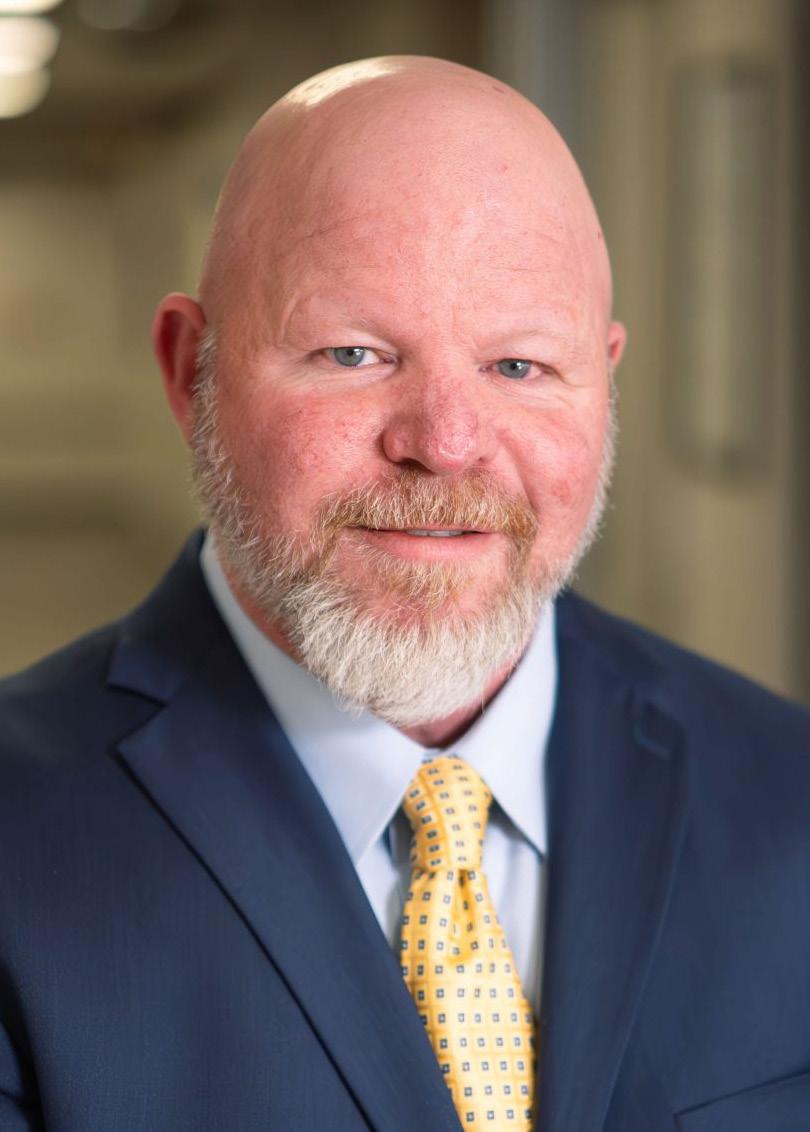
To Chris Tropp, chief operating officer at Arkansas Surgical Hospital in North Little Rock, leadership is not about conference rooms, corner offices, online surveys or paperwork — it is about being seen.







Chris Tropp









“We don’t just recruit them — we retain them. We’ve brought on seven surgeons in the last 10 years, and they all tell me it’s the culture and the efficiency that makes them stay.”









On a normal morning, Tropp can be found walking the halls of ASH, notebook in hand, greeting all the nurses, nursing assistants, physicians and other employees of the hospital. His habit, rooted in humility, has shaped the culture of ASH since the beginning.

“You can’t lead from behind a desk,” Tropp said. “You have to be there. If I don’t know who you are by name or face, that’s a problem.”
Tropp’s journey in health care began in 1994, after he earned his Bachelor of Science in Nursing degree. Starting at Baptist Health Medical Center-Little Rock, he cultivated years of experience as a surgical nurse, learning the ins and outs of the operating room.
After a decade of growing his understanding of OR flow and staff dynamics, he was recruited in 2004 to help launch what was soon to be one of Arkansas’ largest orthopedic and spinal programs.
“We want people who take ownership,” he said. “If you see something, you fix it. That’s the culture here. It’s not optional.” Tropp also holds himself to the same standard. His routine hallway rounds are not just about visibility — they are about listening. He carries a notebook to capture feedback from staff or observations he wants to follow up on. It is a habit he adopted from a former boss, one he said transformed how he sees leadership.
Although Tropp places monumental importance on the workplace environment, efficiency is where Tropp’s operational mindset shines.
Under his leadership, ASH has grown to perform more than 9,000 surgeries a year, nearly 4,000 of which are total joint replacements. What sets ASH apart is not just volume but speed. While many hospitals average an hour or more to turn over an operating room, ASH does it in less than 15 minutes.


“Surgeons can do eight or nine cases here and still be home by 4 p.m.,” Tropp said. “It’s because the process is dialed in — same staff, same instruments, same routine.”

“They brought me in before Arkansas Surgical Hospital opened,” Tropp said. “I bought equipment, hired staff and helped write the policies. I wish they’d hired me a year earlier. There was so much to do.”




What began as a project quickly shifted into his long-term mission: offering incomparable health care. Over the next two decades, Tropp worked his way through the rankings and now oversees everything from surgical scheduling to supply chain contracts.




Influenced by his background in nursing, he anticipated surgical needs while thinking like an administrator. His dual perspective has spearheaded the ASH Direct program, a purchasing strategy that cuts out vendors, saving hospitals millions on implants and surgical supplies.

At the heart of Tropp’s approach is a relentless focus on culture. At ASH, every employee undergoes annual “culture training” — a refresher on standards, communication expectations and how to interact with patients.

“We teach things like the 10-5 rule,” Tropp said, referring to the practice of acknowledging others at 10 feet and verbally greeting them at 5 feet. “It seems simple, but it makes a difference. Every patient, every coworker deserves to feel seen.”
Other expectations include proper phone etiquette in hallways, standardized greetings for patients and families, and a “never list” outlining behavior that is grounds for termination.

“I understand why a surgeon wants a specific instrument — and I also know how to get it at the right price,” he said. “That’s the advantage.”
One of the most consistent points of feedback Tropp hears from newly recruited physicians is how easy it is to work at ASH.
“We don’t just recruit them — we retain them,” he said. “We’ve brought on seven surgeons in the last 10 years, and they all tell me it’s the culture and the efficiency that makes them stay.”
ASH offers predictability — the same nurses and techs in every room, instruments that are triple checked, and minimal delays between cases. The consistency helps surgeons deliver better care and maintain a better work-life balance — a continual goal of Tropp’s.
“They don’t burn out here,” Tropp said. “They thrive.”
By Mary LeSieur






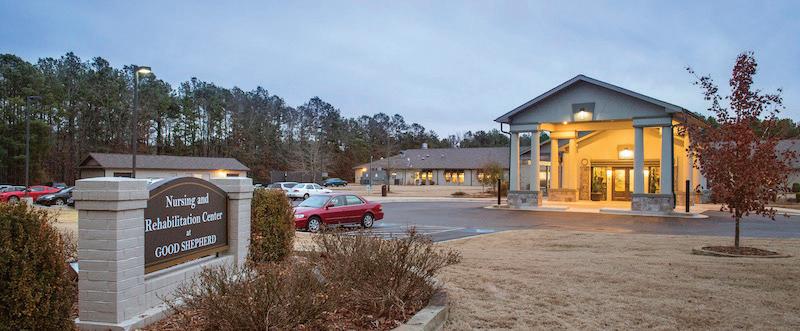















































































CHAMPIONS





Baptist Health
































BRADLEY HEIRD, MHA, BSN, RN


















Bradley Heird serves as nurse manager at Baptist Health Medical CenterNorth Little Rock, where she oversees patient care, aligns work schedules and makes strategic personnel decisions, which are pivotal in streamlining nursing operations and enhancing staff retention. He joined Baptist Health as a registered nurse in 2018. Heird earned a master’s degree in health care administration from Western Governors University in Utah, a Bachelor of Science in registered nursing from the University of Arkansas for Medical Sciences in Little Rock and a Bachelor of Science in dietetics and nutrition from Ouachita Baptist University in Arkadelphia.

RURAL HOSPITALS
BAPTIST HEALTH MEDICAL CENTERSTUTTGART








Baptist Health Medical Center-Stuttgart opened in 1957 and became a part of Baptist Health in 2009. The hospital has 49 licensed beds and is Medicare certified. The hospital’s emergency department is a Level IV trauma center, which means it has demonstrated the ability to provide advanced trauma life support (atls) prior to the transfer of patients to a higher-level trauma center. The staff is able to provide evaluation, stabilization and diagnostic capabilities for injured patients.


TERRI IMUS, BSN, RN UAMS








CHI ST. VINCENT MORRILTON

MERCY HOSPITAL BERRYVILLE
NORTH ARKANSAS REGIONAL MEDICAL CENTER




Terri Imus is director of operations for clinical telemedicine at the University of Arkansas for Medical Sciences Institute for Digital Health & Innovation in Little Rock, where she works to help increase access to care, particularly in rural areas. She has played major roles in developing a host of critical digital health systems including Arkansas’ first high-risk obstetrics call center, the state’s first statewide digital stroke program, a statewide trauma image repository and video consultation programs for burn and hand trauma patients.




OUACHITA COUNTY MEDICAL CENTER





PAIGE KELLY, RN







CHI ST. VINCENT NORTH
MAGNOLIA REGIONAL MEDICAL CENTER
UNITY HEALTH-JACKSONVILLE
SURGEONS
DANA ABRAHAM, M.D., FACS
Arkansas Surgical Hospital

Dana Abraham is a surgeon with Arkansas Surgical Hospital and the owner of Abraham Breast Clinic in Little Rock, which she founded in 2007. A Little Rock native, she graduated from Dartmouth College in New Hampshire in 1989 before completing a general surgery residency and breast fellowship at Baylor University Medical Center in Dallas. She is a fellow of the American College of Surgeons, a member of the American Society of Breast Disease and a member of the Association of Women Surgeons.
J. CAMILO BARRETO, M.D., FACS CARTI

SMALL HOSPITALS (50 BEDS OR MORE)


ARKANSAS CHILDREN’S NORTHWEST








Wright Plastic Surgery and Medical Spa


Arkansas Children’s Northwest is the region’s only children’s hospital. Situated off Interstate 49 in Springdale, the hospital offers convenient access to families and visitors. In addition to offering a full range of pediatric medical services, the hospital provides expertise, compassion and amenities to allow the best outcomes for patients and families.

ALI KRISHT, M.D., FACS
CHI St. Vincent Arkansas Neuroscience Institute
ADAM NORWOOD, D.O., FAAOS Baptist Health


ROSA ZAMORA, BSN, RN, CPN
Arkansas Children’s













ARKANSAS SURGICAL HOSPITAL














Rosa Zamora began her career at Arkansas Children’s Hospital in Little Rock and earned a Bachelor of Science in Nursing from the University of Central Arkansas in Conway in 2011. She has worked in various care settings and has a passion for professional development. As nursing excellence manager, she supports nursing education, nursing research, transition to practice programs, career progression and magnet efforts. She is a 2024 “40 Nurse Leaders Under 40” honoree and enjoys traveling to new cities for concerts.

























Adam Norwood is an orthopedic surgeon for Baptist Health-Stuttgart. He moved to Arkansas in 2023 from Port Orchard, Washington. He graduated from the University of North Texas Health Science Center.





Arkansas Surgical Hospital is one of the only five-star hospitals in the state and ranks in the top 5 percent in the nation for patient experience. The hospital features 41 private patient suites and 13 state-of-the-art operating rooms. The surgeons’ specialties range from orthopedic and spine treatments to breast oncology and interventional pain management. The physicians at Arkansas Surgical Hospital perform more joint replacement procedures than any other hospital in the state while maintaining a lower-than-average infection rate.














LEWIS PORTER, M.D. Saline Surgery and Weight Loss Center









































Dr. Fen Xia is a busy woman. She wears many hats at the Univer sity of Arkansas for Medical Sci ences in Little Rock, including working as a physician, professor, residency direc tor and chair of a department. That creates quite the balancing act for her.









Dr. Fen Xia



“Cancer got me into the medical field. I’ve always









By Alex Hardgrave




“You have to love it,” she said. “Of course, you have to work hard. It’s long hours every day.”

She received her medical degree from Suzhou Medical School in China and a Ph.D. in cancer biology from the Harvard T.H. Chan School of Public Health in Massachusetts before completing a residency at the Vanderbilt University Medical Center in Tennessee.
“Cancer got me into the medical field,” Xia said. “I’ve always wanted to be an oncologist.”
After medical school, she worked as faculty at Vanderbilt University and then Ohio State University, where she was also a translational research director. Nine years ago, she moved to Arkansas to work at UAMS.

A key discovery of the lab has been identifying a specific signaling axis that regulates DNA damage repair and influences a tumor’s sensitivity to some cancer therapies, she said.
Her third role is as the radiation oncology medical resident program director, for which she helps advance the careers of medical students and residents.
She is also the chair of radiation oncology, which she said requires a lot of administrative work.
The days can be very challenging sometimes, she said. One way she has learned to recharge from her work is through dance. When she was at Vanderbilt, she was part of the dance team.

She also enjoys time with her husband, son, and two goldendoodles named Tantan and Feifei, who bring the family “endless joy,” Xia said.





“I was drawn to UAMS by the oppor tunity to build an academic radiation oncology center dedicated to deliver ing outstanding patient care, advancing translational and clinical cancer research, and training the next generation of lead ers in radiation oncology,” she said.

“Although my work is demanding and often requires long hours, I find balance by caring for my orchids and spending quality family time playing with our dogs during my downtime,” she said.

Her favorite part of her job is when she is able to give good news to patients. She appreciates that she is in a career field that affords her the chance to make a difference in patients’ lives.



Xia has four distinct roles she fulfills at UAMS. The first is being a physician and directly seeing patients. She specifically works with those who have central nervous system tumors.
Second, she leads a team of researchers in her federally funded lab. The team focuses on brain tumors and head and neck cancers.

“Our lab uses animal models, cell systems, and a combination of molecular and genetic approaches to investigate the underlying mechanisms driving cancer initiation, progression and treatment resistance,” she said.


“You feel good about that and that you’ve done something really meaningful,” she said.
She also loves watching those she works with and people she mentors succeed at something in their careers.
“It’s a pure happy feeling seeing my faculty and trainees have success,” she said. “Every success they achieve, I truly enjoy.”
While she and her research team work hard every day and have built a successful program, there is more work to be done, Xia said.
“There is still a long way to go to improve our cancer patients’ clinical outcomes,” she said.
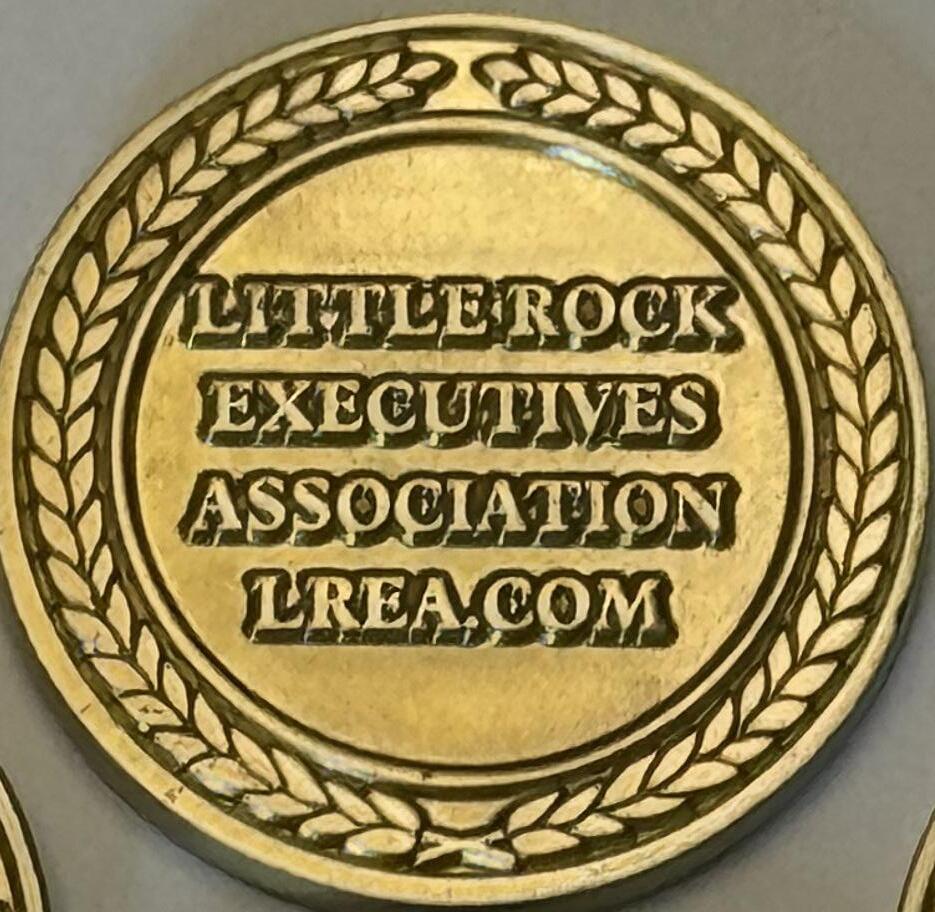
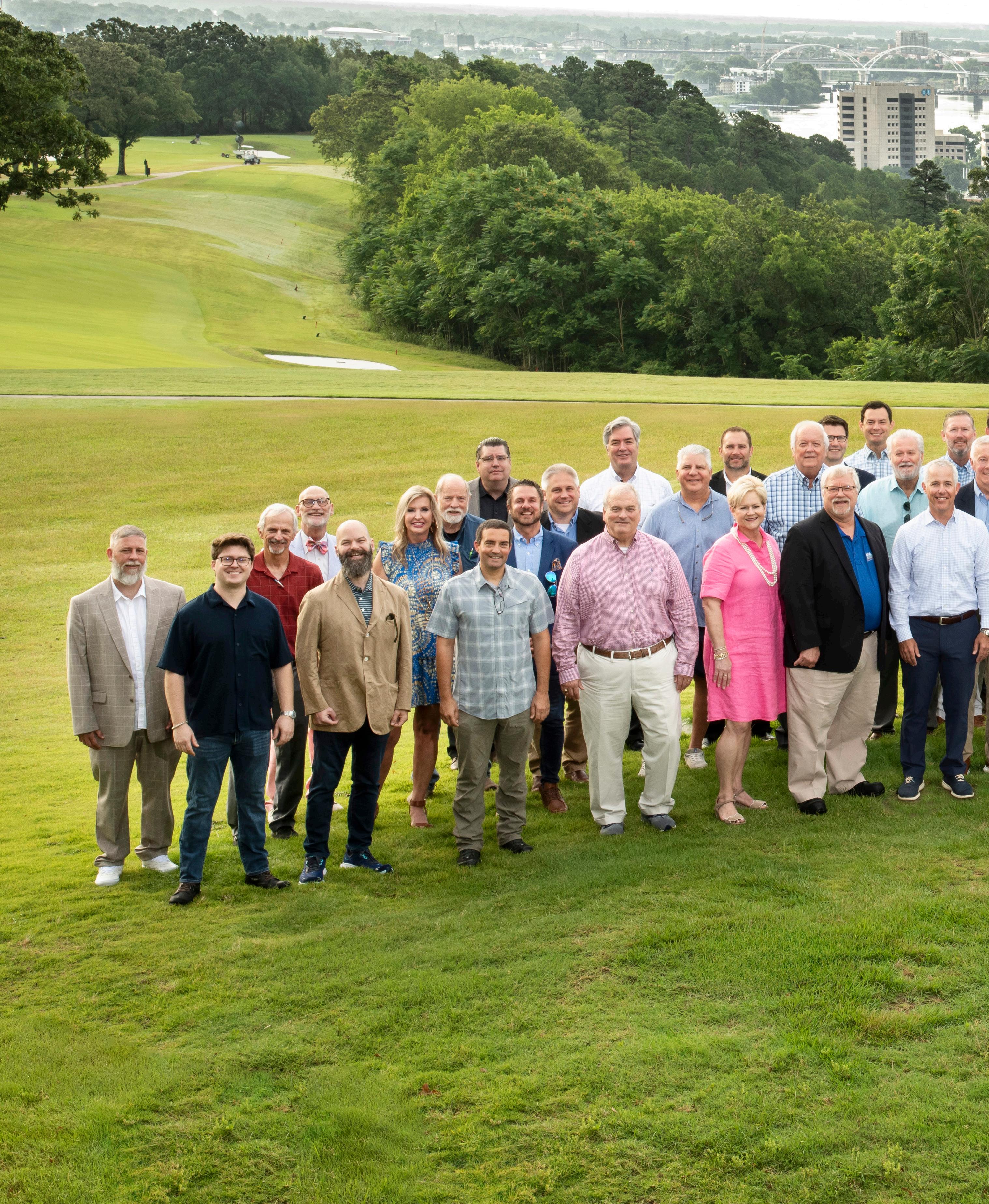
ALL FOR ONE LREA LOOKS TO SECOND 50 YEARS
By Dwain Hebda
Photos courtesy of LREA
Photo courtesy of LREA
LREA

InIn Little Rock’s close-knit community, one need not look far to find individuals who have played a substantial role in the capital city’s growth over the decades. Members of the Little Rock Executives’ Association, a business leaders group that is entering its second half century of existence, need only look across the table to do so.
“The main purpose of LREA hadn’t changed since day one,” said Bob Russell, owner of Russell Chevrolet & Honda in North Little Rock, who has been a member since 1979. “The main purpose is reciprocal business as much as possible.”
One of the longest-lived and most successful business groups of its kind anywhere in Arkansas, LREA has lived by a core set of principles that have sustained both the group and its members during lean times and fat. The groups’ primary ethic may best be summarized as, “Shop
“The core of LREA is serving and growing those smaller, independently owned businesses. That’s really the core of what we do.”
— Robert Hall vice president of Hugg & Hall
Local First,” a philosophy members have been buying into long before it became a millennial tagline.
“So many local businesses are hidden. You don’t even know they exist,” said Robert Hall, vice president at Hugg & Hall, who joined LREA in 1994. “There’s a lot that goes on in a small town like Little Rock that reaches much further than most people can ever imagine. The core of LREA is serving and growing those smaller, independently owned businesses. That’s really the core of what we do.

“LREA isn’t an organization that’s a wide-open, we-want-your-dues kind of group. We really want to create a membership that includes what we consider the best-quality person representing the best company in any category.”
The group stands as a reminder of the power of supporting one’s own business community and receiving that support in return, delivering the benefits of accelerated networking and a membership that supports each other as opportunities arise.
“LREA is invaluable for
leads and people giving you advice and just helping you in many ways that you just can’t put a price on,” said Becky Cranford, general manager at The Bug Man, Inc. in Little Rock, who joined in 1998. “There’s so much of a business legacy in this group, where members become members after their parents or whatever. I think that speaks to the loyalty of the group.
“The way it is set up, it’s an honor because your business was chosen to be here, and you get to do business with the best of the best companies in the city.”
“Loyalty” is a term that comes up a lot when asking members to describe the organization, as well as words such as “reciprocity,” “commitment” and “excellence.” The terms could also describe the members themselves, many of whom have passed down their affiliation across generations. Brett Russell, vice president of Russell Chevrolet & Honda, is one of them.
“There is maybe a quarter of the group that are second generation,” he said. “We all recognize the benefits of this, and obviously, as a young guy getting in, not only did I get information from my dad on how to deal with business, but you also get to talk to all these other business owners.
“Now, through the course of years, I’m working with the second generation, as well. There’s a lot of information to be had from these people and how they handle business.”
Russell family 1997 Genuine Leaders Award
ALL MY BUSINESS FRIENDS

The group traces its roots to Shreveport, Louisiana, where Little Rock photographer Greer Lile was attending a convention in the fall of 1973. While there, an acquaintance pulled him aside to tell him about an exciting new organization that
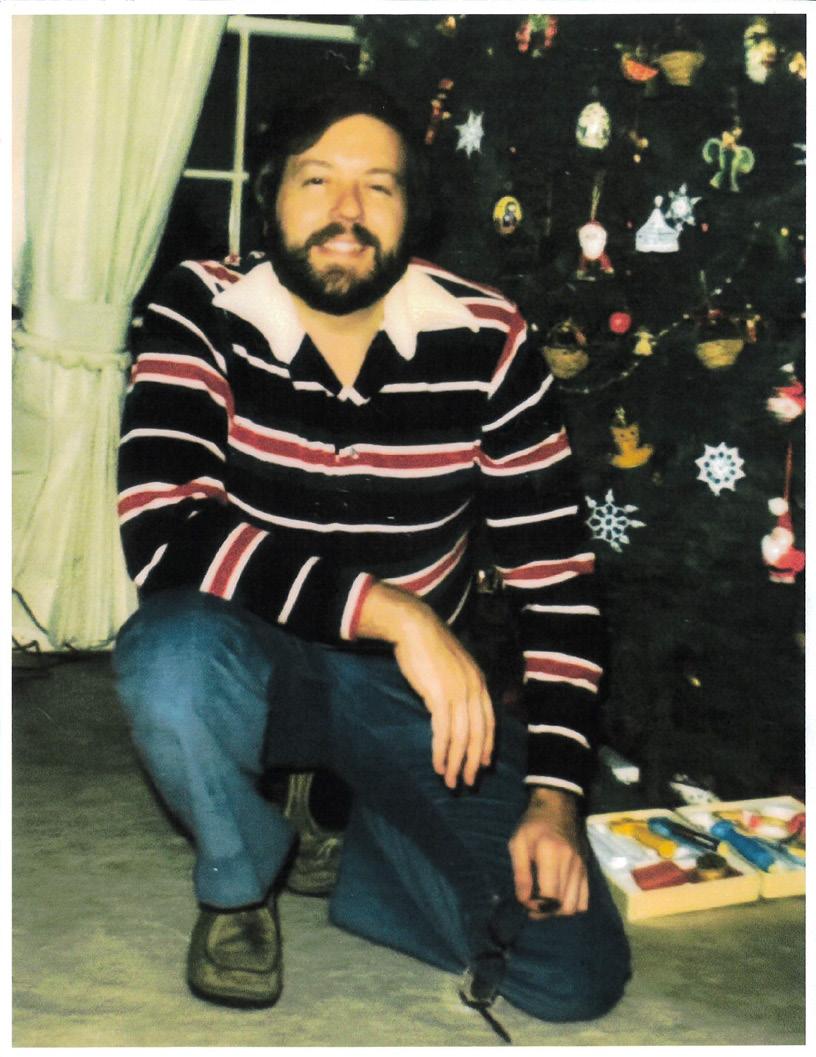
had been formed in town, the purpose of which was to generate business for its members through direct reciprocal dealings, as well as through leads informing members about opportunities within the community.
Lile liked the idea, and upon returning home, he contacted four close friends — Dick Vinsant, John Jaco, Jack Somers and Ferreal Friday — to discuss the possibility of creating a similar organization in central Arkansas. Intrigued, the colleagues made some return visits to Shreveport to learn more and ultimately launched the Little Rock Executives’ Association in March 1974.
“A very valuable part of the organization is that you get to meet some of the best of the best in business,” said Bill Miller, owner of R&E Supply Co., who joined the group shortly after its founding in 1974. “Our whole theory is we’re there to help each other. No matter what the issue, we can always depend on each other to get ideas. You have some technical issues, you can find that out generally. If you have a specific project, somebody in the group usually knows something about it. That’s how it’s valuable, and it’s how we help each other grow.”
As with many fledgling organizations, LREA started on wobbly legs, devising and refining bylaws, organizing meetings, and selling the concept and its benefits to prospective members. Then, as now, the group believed participatory membership was a strong membership, and so attendance at weekly breakfast meetings and monthly member open houses
was required. That proved too much for some, but after a time, the roster filled out with businesspeople savvy enough to appreciate the value of commitment.
In addition to the attendance requirements, LREA features several other elements that make it unique among other business-oriented organizations. For one thing, membership is built around categories of goods or services and includes one business per category according to each member’s primary stock and trade.
Only one active member is listed per company, but additional employees — such as the child of a founder — can be assigned “associate” status. An associate member may take over the active status due to the active member’s retirement, at which time the original member’s status changes to “honorary member.”
Members say that exclusivity in membership not only ups the prestige of the group but makes the all-for-one business model work.
“When you recommend somebody, you want to feel confident that these people’s services are good, that they’re the best,” said Howard Hurst, president of Tipton & Hurst, a member since 1987. “We only wanted the best in the membership for that reason, so people can assume they’re dealing with good people, people you can recommend to others and trust them to reciprocate. That’s a very strong thing, that trust.”
“The loyalty that we developed, that’s a hard thing to come by,” Miller added. “One of the difficult things in business anymore is to be able to depend on other people. All of these people [in LREA] have learned to service their accounts and treat people properly. I’d say that over the years, I’ve met 500 or so of the top businesspeople in the state and in central Arkansas through LREA, and even as people come and go, I still have that connection with them. It stays with you your whole life.”
Bill Miller, president of R&E Supply Co. in Little Rock, pictured in the early 1970s, about the time he joined LREA.
LREA president’s retreat

A FISTFUL OF DOLLARS
The group also maintains the high standards of the organization through careful vetting of new members, either due to new business cat egories being formed and filled or in the event an existing member drops out.
Unlike other organizations, which follow a come-one-come-all membership model, prospective members must be referred or sponsored by an existing member of the group and approved according to the bylaws.

As a result, mem bership has stayed con stant at 80 to 100 members through the years, manageable enough to form solid business relationships yet diverse enough to cover most if not all categories of goods and services.
the very beginning is the issuance of a coin denoting membership. According to the official history of LREA, the coins were originally very similar in appearance to a silver dollar and imprinted with the LREA motto “Business Through Reciprocity” and a number representing the numerical sequence in which the bearer was admitted.
As with attendance, members were expected to keep their coins on their person or face the consequences.
“There were, in history, attempts to ensure that members always carried this coin with them to remember their commitment to the principles of LREA,” the archive reads. “Fines were levied at meetings for lack of coins, lack of leads. … The younger days were financially tedious at best.”
Discretion was also expected. For a good portion of the group’s existence, members talking about LREA and its operations was officially frowned upon, even to the company owners who were being considered for membership. In more recent times, that attitude has been relaxed.

“I found we got more business out of LREA than you do other service clubs,” Bob Russell said. “I guess the reason being is because we put so much emphasis on doing business with other members. That doesn’t seem to be the case with your other types of service organizations. I think that really has something to do with it.”
Another unique feature that has promulgated from
“Prior to just recently changing our bylaws, you could not let a member know you were talking about them coming in the group until they were approved,” Cranford said. “Naturally, a lot of them wouldn’t know what you were talking about once you told them they were approved.
“We changed that recently, and now you can let somebody know. You can talk to them, see if they can handle the attendance requirements before you go to all the trouble of sponsoring them for mem bership. I think that’s much better than how we used to do it.”
Despite the exclu
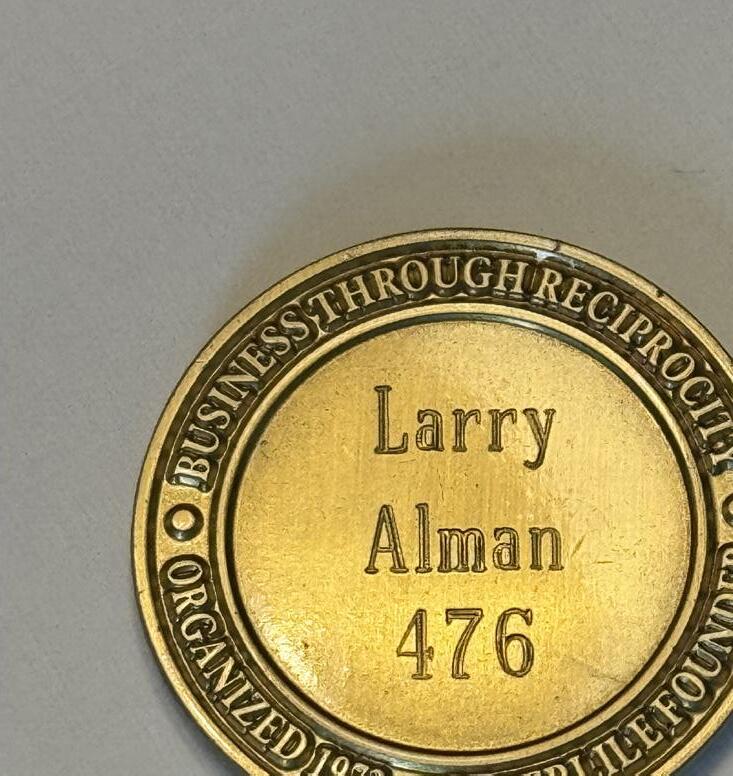
LREA members
Brent Schmiegelow, from left, Austin Watters, Sunday Adebayo and Scott Moritz
sive nature of the organization, businesspeople of all backgrounds have been welcomed within their respective categories. Cranford said while women have always been in the minority, she never felt any different treatment by other members based on her gender.
“The members were very welcoming,” she said. “I was never the only woman, but there were only about four or five others, yet I was never ostracized or called out or anything. I was just one of the group, and I was never treated nor felt anything different than that.”
Spouses have always been essential in the workings of LREA, as well, since the group recognizes the crucial role they played in the success of so many small businesses.
As the LREA handbook states, “A wise member will realize that the ‘spouse force’ is doubling the network value of their dues dollar. Many spouses have additional occupational and social contacts apart from those of the LREA representative.”
Spouses are welcome at weekly breakfast meetings, and family members may attend the monthly open houses showcasing different members’ operations. In fact, some of today’s legacy members got their first exposure to the organization through the open house events, which members take turns hosting to explain their services and show off their facilities.
“I remember as a kid going to the Tuesdaynight open houses many times,” said Jeff Smith, owner of Smith Family Funeral Homes and current LREA president. “I remember going to the news studio, I remember going to The Bug Man, and I remember going to various other businesses in LREA.
“That was great exposure as a young kid and as a teenager. I just grew up comfortable in networking situations or being in a room full of professionals. I look back on it now, and that was a really valuable early exposure to
GENERATION TO GENERATION

Of everything for which LREA is known, singularity of purpose is arguably the most resolute. Members look to each other for goods and services first and, when the opportunity presents itself, recommend fellow LREA members for prospective sales and potential clients, actions to which members are held accountable.
“Sometimes there’s a conflict, like one of my best friends was my accountant,” Hurst said. “Well, obviously, I didn’t use the accounting firm [in LREA] because he’s my best friend, and I had a preexisting business relationship.
“Another thing I would tell you is when people refer you, you better take care of business. You’ve got to do the right thing. Otherwise, you’ll make somebody look bad who recommended you.”
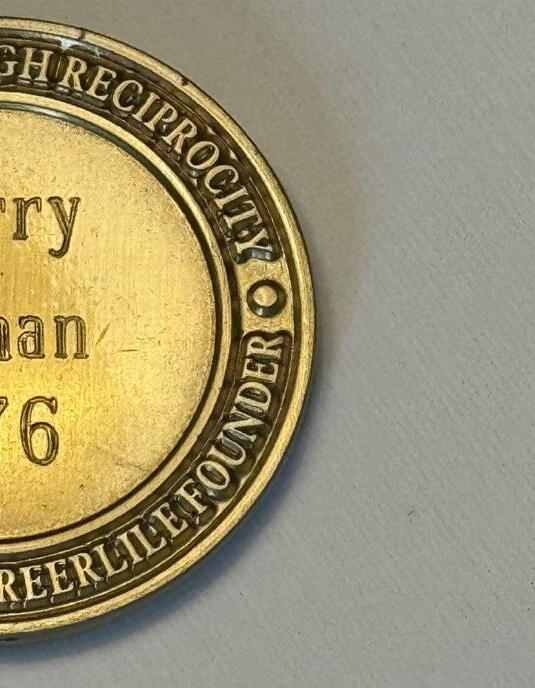

Some of the hardest things for any organization to accommodate are the changing needs and attitudes of the membership through time. One way LREA has maintained its amazing continuity is through the commingling of generations of business leaders and the wisdom and experience that is for the asking.

“I think the older generation naturally looks to help the younger generation when they need it because they know how they used to be,” Hall said. “I was 39 when I joined, and the whole group, frankly, embraced me from day one. The benefit of having a network of friends and quality businesses at my fingertips was extremely valuable.”
Such expertise does not just flow one direction, either, since members rally to help any member that is undergoing some
Jeff Smith, left, of Smith Family Funeral Homes and his father, the late John Smith
sort of challenge or, in the case of 2020’s COVID-19 shutdowns, when every member was under duress. Brett Russell said for as unpleasant as business conditions can sometimes be, it is extremely helpful to have a group that understands the pressures of making payroll and navigating challenges.
“As the kid of a member, I saw and met the people involved in LREA,” he said. “I saw the value of the organization, but I didn’t truly understand it until I became a part of the family business myself. The way my dad talked about the organization for years, that it was such a benefit for our business as a whole, helping us grow and sell vehicles and maintain those great relationships, that continues to this day.”
LOOKING TO THE FUTURE
For everything that can trace a direct line back to 1974, there has been steady tweaking of the bylaws through LREA’s history. Time and again, the group’s astute leadership recognized the need to adapt to the times and market realities in ways that have enhanced — but not altered — the central focus of the group.
Little Rock businesspeople. He said he would like to see the history of the group be more widely told and tout the organization’s success story, one few people outside LREA even know about.
“I think it’s really special that Little Rock has had, for over 50 years, a business organization that is strictly focused on promoting its members and doing business with other Arkansas-based businesses that are the best of the best,” he said. “I think that’s been kind of clandestine for too long, and I think it benefits central Arkansas to know there’s a lot of exciting things going on, and one of them has been going on for a long time and, hopefully, will continue to go on for a long time.
“The idea of local businesses promoting each other and doing business with each other — and beyond that, the relationships that are forged in this group — are playing a big role in the health of our business community. Most cities don’t have something like this, and I think it should be celebrated.”
LREA has maintained its amazing continuity through the commingling of generations.
Fifty strong years, and the continuing relevance of the group has borne out the wisdom of those actions, paying many of the same financial and relational dividends envisioned by the founders.
“It would be extremely remiss not to briefly discuss the ancillary benefits associated with membership in LREA,” reads the official history. “The business and social contacts and friendships developed cannot be duplicated in any other organization. The annual conference has long been a favorite, especially among the ‘old guard’ members who have benefited from the camaraderie developed at these functions.”
That visionary mentality continues today as Smith and his fellow officers seek to chart a path for LREA’s next five decades and oncoming generations of
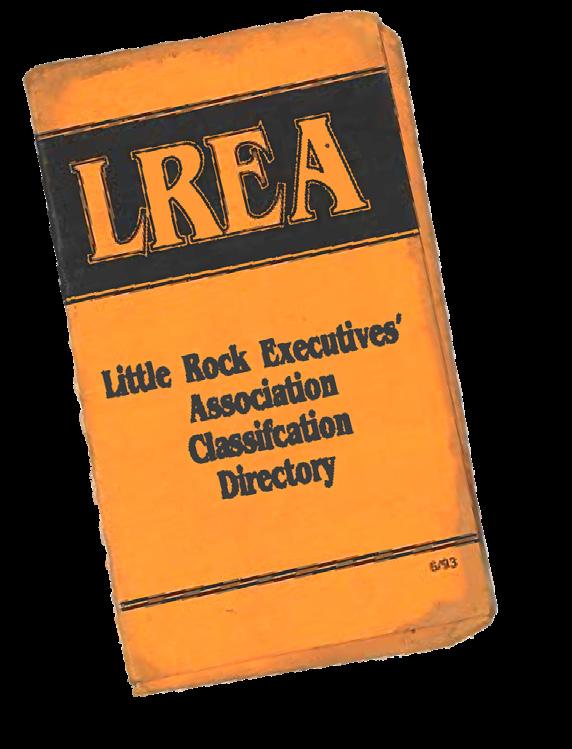
That said, Smith noted he is not out to fix what is not broken. As a legacy member, he has had the benefit of a lifetime watching the organiza-
tion grow his family’s business, and even though he desires the group to raise its profile a bit, there are some things that cannot be improved upon. He said the core value of LREA is as valuable and worth preserving today as it was in the very beginning.
“My dad, J-ohn Smith, joined LREA in 1978 and was president in 1982-1983,” he said. “In 2006, Dad said, ‘Hey, I’m going to retire in about five years. If you think you want to come into the business, now’s a good time to do it. I really only have one requirement: You have to join LREA.’ It was nonnegotiable.
“That really cemented for me how important LREA was to my dad and our family business, and I’m so grateful that he just flat out required me to be a part of it. Dad always said LREA was the best business networking group he’d ever been involved in because when it comes down to it, business is all about relationships, and that’s what LREA is really about.”
ACTIVE & ASSOCIATE MEMBERS
Sunday & Michelle Adebayo
Adebayo Cleaning Service
Dennis & Marshia Adkins
Adkins & Associates
Erica Akel Moore & Witt Moore
Akel’s Carpet One Floor & Home
Clint & Marla Albright
Albright Ideas
Larry & Jan Alman
Alman Recycling Co.
Chris & Katie Apple
Arkansas Pro Wash
Bubba & Cheryl Arnold
CHI St. Vincent
Heather Baker & Ryan Parker
AY Media Group
Kenny Bell
Bellco Plumbing
Bobby & Lydia Bemberg
Bemberg Iron Works
Mark & Patti Bennett
Brown, Rogers & Co.
Jason Bermingham
Maple Leaf Lawns & Sprinklers
Mike & Starr Boschetti
Strategic M&A Advisors
Nicole & Josh Burrow
Burrow’s & Mr. Frank’s Optical
Cherb & Connie Coleman
Hiland Dairy
Matt & Mindy Coleman
Network Services Group
Becky Cranford
The Bug Man, Inc.
John & Bliss Dean
Dean Dental Solutions
Evans & Bryan Dietz
D & D Sun Control
Sandy & Lisa Downs
Don’s Supply
Roderick Edwards
Triple-S Alarm Co.
J.T. & Amanda Ferstl
Ferstl Valuation Services
Mike & Rhonda Flagg
Hiland Dairy
Ryan & Misti Flynn
Tom & Leslye Gibbens

Network Services Group
Beverly Foster & T. Martin Davis
Chiropractic Health & Rehabilitation
Jason & Julianna Garner
Antique Brick & Block
Lamar Outdoor Advertising
Aaron & Kala Grimes
Capitol Glass Co.
Glenn & Charlotte Grimes
Lacey’s Boating Center
Robert Hall
Hugg & Hall
Lance & Stacey Hines
Priority1
Melissa Holland & Natalie Gay
Advanced Physical Therapy
Howard & Stacy Hurst
Tipton & Hurst
William & Dawn Jones
Sissy’s Log Cabin
Harold & Jeanne Joyner
Fence World
Bram & Michelle Keahey
TAGGART Architects
Andrew & Sarah King
Complete Payroll Services
Kyle & Ginger King
KARK/KLRT
Tony Lawhon
Salon Artistry
René & Sonya LaVergne
Pinnacle Valley Westrock Animal
Hospital
Jonathan & Hillary Looney
O’Looney’s Wine & Liquor
Stuart & Mandi McLendon
Flexion Point
Jurek & Lesly Makowski
InstallAV
Robert & Tara Maltby
Market Place Pharmacy
Evan & Brittney Mathews
National Custom Hollow Metal
Shea & Sarah Mathews
Maple Leaf Canvas
Bill & Shirley Miller
R&E Supply
Cory & Becca Miller
R&E Supply
Cindy Minor
Small World Big Fun
Pat & Shelly Moon
Meridian Investment Advisors
Scott & Rachael Moritz
Trivia Marketing
Joe & Kim Murdaugh
Joe Murdaugh Masonry
Ryan Myers
Myers Supply
Kevin & Leigh Ann Newton
CBM Construction Co.
Joey & Melissa Nichols
Friday, Eldredge & Clark
Matthew Nicolo
Arkansas Industrial Roofing
Kathryn & Jake Pannell
Citizens Bank
Bill & Jessica Parkinson
Parkinson Building Group
Gary Parrish
Parrish Delivery Services
Jim & Leslie Pender
First National Title Co.
Hoyt & Heather Plunkett
Jackpot Interactive
Todd & Kathy Rice
Colliers International
Brett & Ashley Russell
Russell Chevrolet & Honda
Joel & Jennifer Schmidt
Joel’s Photography
Brent Schmiegelow
American Concrete Concepts
Vernon & Susan Scott
Citizens Bank
Jeff & Leslie Smith
Smith Family Funeral Homes
Blaine & Virginia Tanner
The Oyster Bar
Joel Warwick
Tim & Wanda White
Brown & Brown Insurance
Kevin & Jennifer Wilcox
Arkansas Graphics
Keith & Karyn Wortsmith
DASH Heating & Cooling
Tim & Teresa Zimmerman
First Choice Drug Testing & Occupational Health Services
HONORARY MEMBERS
Chris & Margaret Albright
Ted & Becky Bishop
Bill & Donna Bosley
Sid & BJ Bray
Renie & Diane Bressinck
Lunsford & Carol Bridges
Jim & Diana Camp
Lee Carter & Nancy Sherman
George & M’Liss Collins
Jeff & Brenda Kay Duncan
Rick & Mary Edwards
Charles & Patty Enderlin
George “Red” & Mary Freeman
Howard Hardin
Terry & Jan Hill
Don & Linda Houff
Gary & Beth Houston
Steve & Kathleen Jonsson
Leif & Sallie Lorenz
Chuck & Gigi Magill
Judy Myers
Dan & Diana Richards
Ronnie & Mary Lynn Roberson
Becky Rogers
Frazier Rogers
Bob & Beverly Russell
Cindy Scott
Kay Smith
Kaye Stanley




Celebrating the people, stories and spirit of the Natural State, AY Media Group produces two of the most widely read magazines in the region, AY About You and Arkansas Money & Politics. President and Publisher Heather Baker has led the two magazine brands, as well as a range of special publications, to unimagined heights across print, digital, broadcast and social media platforms. The company’s products are viewed by 1.2 million readers monthly.
“Arkansas is a small state with big advantages, and there are so many great things happening here that are worth promoting,” Baker said, “A low cost of living, big-city amenities with beautiful scenery — not to mention the incredible people who work, live and play here every day.”
A central Arkansas native and industry veteran of more than 20 years, Baker delights in showcasing her home state from multiple angles through the media company. AY About You brings readers the best in home and garden, food, entertainment, travel, health, beauty, arts, and community events happening statewide. The monthly magazine also advances many charitable causes through its feature writing, sponsorship and through the participation of Baker, who is in high demand for promotional and emcee duties.
Arkansas Money & Politics covers business, philanthropy and public policy throughout the state every month, highlighting both heritage business sectors and the cutting-edge entrepreneurism that are propelling the state into the future. In a little more than a decade, AMP has raced to the forefront of its category to become a trusted and informative source of business and political news.
The company also produces a variety of specialty publications, the largest of which is Arkansas Mental Health Guide Magazine. An annual publication, MHG spotlights mental health issues and mental health services available in the state. In doing so, the magazine works to reduce stigma surrounding mental health, addiction, trauma, behavioral issues and post-traumatic stress disorder while advocating for wider access to treatment for all Arkansans.


“If I had to boil it down to what makes AY Media Group different, ‘passion’ is top of mind,” Baker said. “The people who make up our amazing staff love this state, they see the good that is happening here, and they want to spotlight those stories.”
AY Media Group’s seasoned sales team also leverages the company’s reach to promote its advertisers and to build and advance their brands. The company’s roster of advertising clients includes Arkansas’ most successful companies and nonprofits — and those that aspire to be.
“Our publications give companies and organizations brand recognition and exposure that is worth several times the cost of the advertising,” Baker said. “It’s another way that we’re proud to do our part to lead our beloved state and its people to success.”
aymag.com
armoneyandpolitics.com

Year founded 1988
Years in Business 37
# of Employees 27
Years in LREA 30
AY Media Group aims to show the best of what the Natural State has to offer through its suite of awardwinning monthly and specialty publications.
Heather Baker

Adkins & Associates Real Estate is a proudly family-owned and operated brokerage firm serving the heart of central Arkansas. With a reputation built on trust, experience and results, the Adkins team is not just selling real estate but building relationships that last. Adkins & Associates prides itself on being a true advocate for clients, with agents who walk alongside buyers, sellers and investors at every step.
Led by owners Dennis, Sharon and Jennifer Adkins, the brokerage boasts a team of top-producing agents with more than 500 years of combined experience. Since opening its doors, the firm has facilitated hundreds of transactions and millions in total sales volume. Driving that success is a diverse, collaborative group of professionals dedicated to excellence in every regard. Each agent brings a unique background and skill set to the table, allowing Adkins & Associates to provide clients with the expert insights needed to reach their goals. The company’s deep commitment to its fiduciary duty means agents work tirelessly to negotiate the best possible outcomes and put the interests of their clients above all else.
“At Adkins & Associates Real Estate, everyone is welcome,” Dennis said. “We’re honored to be the trusted choice for so many Arkansans.”
The company specializes in residential and investment properties, helping clients navigate a wide range of real estate opportunities. The Adkins team’s range spans all over the central portion of the state, from Hot Springs to Hillcrest and Cammack Village to Cabot. Whether one is a first-time homebuyer, a seasoned investor or just looking to sell, Adkins & Associates agents are fully trained, highly responsive and committed to meeting
clients’ needs with professionalism and care.
“Buying or selling a home is one of life’s biggest decisions, often your largest investment,” Dennis said. “That’s why our mission is simple: Deliver unmatched service, informed guidance and resultsdriven strategies for every client every time.”
A longtime LREA member, Dennis understands the importance of strong relationships when it comes to making sure businesses thrive in central Arkansas. Since embarking on his real estate career in 1972, Dennis has built a successful company from the ground up, garnered a reputation as a consistent multimillion-dollar producer and become a charter and life member of the Little Rock Board of Realtors Million Dollar Club.

11621 Rainwood Road
Suite 4
Little Rock
501-224-3900
adkins-associates.com
Years in Business 53 # of Agents 28 and counting
Years in LREA 18
With centuries of combined business experience, Adkins & Associates has the expertise clients need to buy, sell and invest throughout central Arkansas.


Sharon, from left, Dennis and Jennifer Adkins
Based in Little Rock with an office in Rogers, Antique Brick & Block has delivered unparalleled quality and innovation to residential and commercial clients since 1979.
“We stand for quality,” said Jason Garner, president. “From the concrete products we manufacture and distribute to the thousands of brick options, each represents the best available quality and maximum durability to build impressive residential and commercial structures.”
The company offers residential and commercial cladding systems, as well as hardscape products that include traditional clay brick, concrete blocks for foundation and commercial uses, and a host of other durable systems — but Garner said his company does not sell products. It sells solutions.
In addition to providing best-in-class customer service, Antique Brick & Block also delivers the latest and most advanced products and techniques to clients. In addition, Antique Brick & Block owns and operates Ninth and Co., situated in the Promenade at Chenal in west Little Rock, which provides an upscale lifestyle selection for home and patio.
The staff has decades of combined on-the-job experience, and team members work closely with vendor partners to expand product knowledge, often through industry events such as plant tours and seminars.
“We don’t consider our company as a retail or wholesale operation,” Garner said. “We exist to serve the needs of our customers and provide solutions. This mentality motivates us to maintain our position on the cutting edge of our industry, allowing us to introduce new products, techniques and ideas to residential consumers, architects and engineers, and installation professionals.”
With a commitment to providing unmatched quality and innovation, Antique Brick & Block has built enduring relationships with its clients, providing superior materials and exceptional service to support the creation of extraordinary structures.
Over the years, the company’s mission has led Antique Brick & Block down paths of expansion in central Arkansas, northwest Arkansas and regionally, all
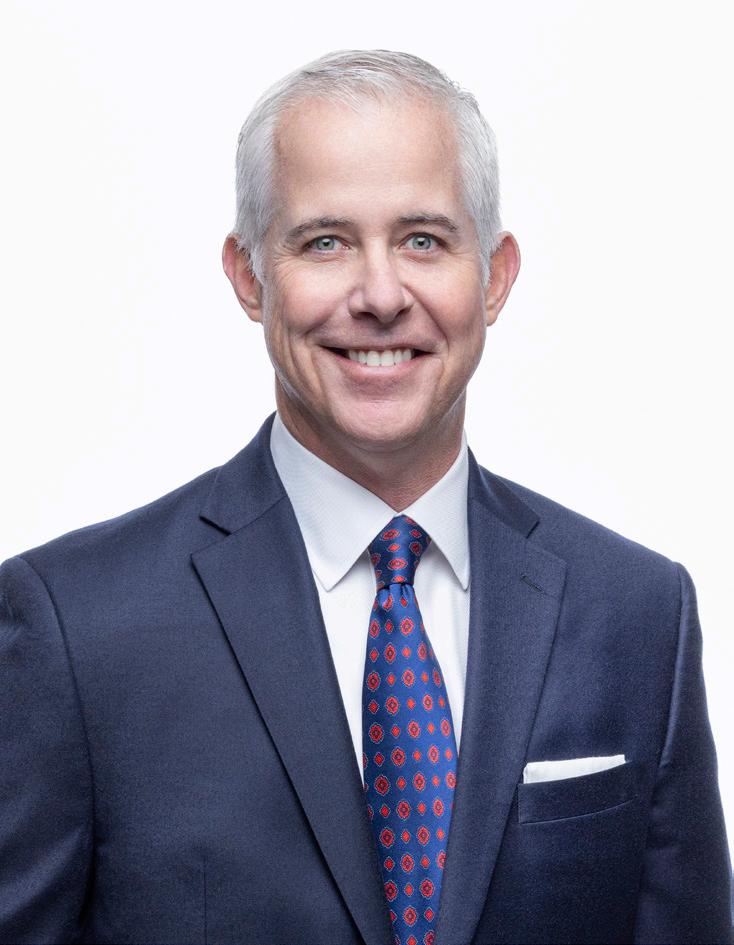
to be a better resource to clients, be they residential, commercial or wholesale. To Garner, each client touchpoint presents an opportunity to differentiate the company from other suppliers and earn the business of customers.
“Our business has transformed from a side hustle in my father’s living room into a 50-acre campus serving the entire state,” he said. “We have evolved from reclamation and resale of used products to manufacture and distribution of the most reputable product lines available.”
Antique Brick & Block has been a member of the Little Rock Executives’ Association since 2009.
“The benefit and lasting impact is building relationships that transcend the day-to-day transactional nature of business,” Garner said. “Learning from small-, medium- and large-business owners on how they approach their respective goals and objectives gives valued perspective to apply to your own business.” 1609 E.
Years in LREA 16 WITH A MISSION TO DELIVER UNPARALLELED QUALITY AND INNOVATION, ANTIQUE BRICK & BLOCK PROVIDES SUPERIOR MATERIALS AND EXCEPTIONAL SERVICE TO SUPPORT THE CREATION OF EXTRAORDINARY STRUCTURES.

Jason Garner
800 S. Gaines St. Little Rock
501-376-8436
arkansasgraphics.com
Amarketing services provider since 1974, Arkansas Graphics in Little Rock provides a vast range of products and services, from graphic design to printed forms, marketing materials and annual reports — and the company is always looking to enhance its services.
The company was founded in 1974 by Dale Wilcox, father of current president and CEO Kevin Wilcox. Kevin Wilcox started off as a janitor at the company in high school and worked in different departments throughout college before starting full time in 1990. He took full ownership of Arkansas Graphics in 2013.
The success of Arkansas Graphics is the result of hard work, perseverance and commitment to excellence. Those core values drive the company today and will continue to drive it in the future.
As one of the top offset and digital commercial printers in the region, Arkansas Graphics continues to expand its offerings to include digital storefronts, variable data printing, UV coating, promotional products, and largeformat graphics and signage.
Earlier this year, Arkansas Graphics completed a historic merger with TCPrint Solutions in North Little Rock. The merger brought together two companies with a combined 130 years of experience in print and marketing services. Arkansas Graphics was founded in 1974, while TCPrint Solutions began in 1945.
“This merger is about creating something greater than the sum of our parts,” Wilcox said. “Together, we’re enhancing our capacity to deliver cuttingedge solutions while maintaining the personal service and quality our customers have trusted for decades. It’s a
rare opportunity to combine legacies, talent and technology in a way that moves us all forward.”
TCPrint President Leigh Ann Newton, daughter of owner Mike Simpson, remained with the company in a leadership role to help guide the transition. Her brother, Drew Simpson, also remained with the company as a senior account executive.
“We’ve always prided ourselves on delivering exceptional value to our customers, and that will only grow with this partnership,” Mike Simpson said. “Arkansas Graphics shares our values, our work ethic and our belief in putting the customer first. This merger secures our future and opens new doors for our team and clients.”
Arkansas Graphics is more than just a printing company, offering many solutions to enable customers to communicate effectively. Whether it is traditional litho printing, new digital variable printing, web-based communication, large display graphics or branded promotional items, Arkansas Graphics is here to serve the Natural State.
Year founded 1974
Years in Business 51 # of Employees 54
Years in LREA 49
Arkansas Graphics in Little Rock recently completed a merger with TCPrint Solutions in North Little Rock set to enhance service to clients.


Leigh Ann Newton, from left, Kevin Wilcox and Drew Simpson
2120 Riverfront Drive Little Rock
706 W. Main St. Russellville
5540 Bleaux Ave. Springdale
501-372-2232
bbrown.com
With more than 500 locations in the U.S. and abroad and three locations in Arkansas, Brown & Brown (NYSE: BRO) offers insurance and reinsurance products and services, as well as risk management, third-party administration and managed services related to health care.
Ranked the sixth-largest insurance brokerage globally by Business Insurance magazine, Brown & Brown is committed to providing innovative strategies to help protect what customers value most.
“Brown & Brown is a competitive, collaborative, customer-obsessed team,” said Tim White, executive vice president of Arkansas operations. “The importance of ‘team’ — one that wins and learns together — cannot be understated. Our team is composed of individuals who are deeply committed to our customers, and we place immense value on our teammates and organizational culture.”
Founded in 1939 in Daytona Beach, Florida, Brown & Brown became publicly traded in 1993 and began acquiring insurance operations across the country. Since Brown & Brown entered Arkansas in 2002, its offices in the state have grown 500 percent through the acquisition of several insurance operations.
Although it is a national broker, Brown & Brown operates with a decentralized sales and service model. That empowers local offices to support customers and communities with the backing of a global insurance provider. As a national broker, Brown & Brown has the resources to be at the forefront of industry trends and publish the latest developments in a newsletter to clients.
All agents are fully licensed and maintain their licensing credentials.
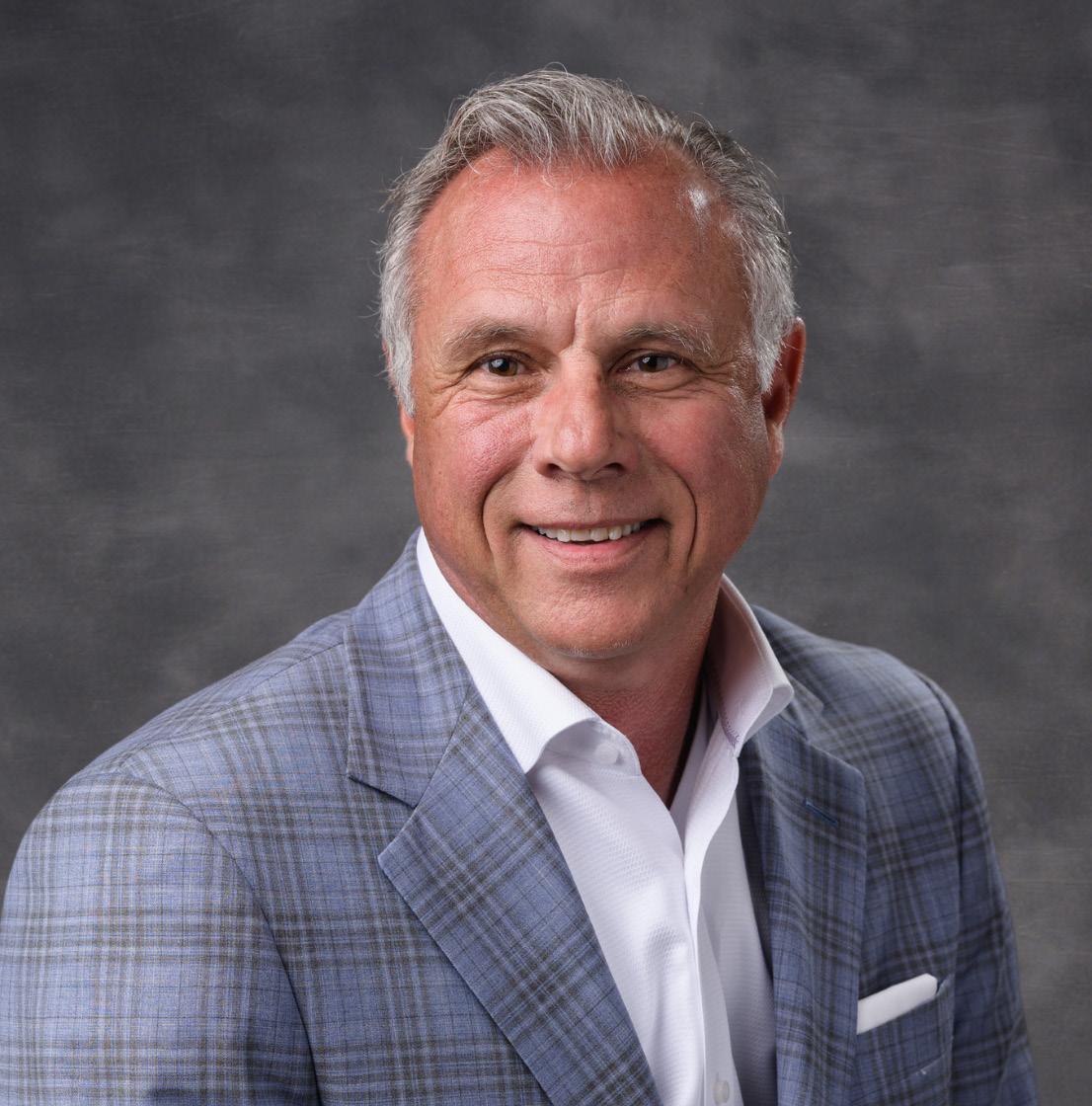
Many also earn Certified Insurance Service Representative and Certified Insurance Counselor designations. In addition, Brown & Brown provides extensive training and development through BBU, the company’s learning and development platform.
A “forever company,” Brown & Brown is passionate about its growth goals. White attributed the company’s success in Arkansas and beyond to the top-notch staff.
“Our growth is solely due to the talented team we have in the Arkansas operations, nationally and internationally,” he said. “Brown & Brown has been awarded a ‘Great Place to Work’ for five years in a row by over 94 percent of the team.”
He added that his favorite part of his work is cultivating relationships with clients as a trusted insurance provider. He also appreciates the relationships he has developed thanks to his membership in the Little Rock Executives’ Association.
“The relationships with LREA members are invaluable,” he said, “not only as a business source in the Little Rock market but personally, as well.”

Year founded 1939
Years in Business 86
# of Employees
About 17,000 (U.S.); about 50 (Arkansas)
Years in LREA 16
A team mentality has helped Brown & Brown become one of the largest insurance providers in the world.
Tim White
2700 S. Booker St. Little Rock
501-663-9464
bugman.com
Not too often does a business come along where the quality of the service is exceeded only by the conviction of its leadership. That is the case with The Bug Man, Inc., whose founder, the late Bill McCauley, started the business in 1976 with the promise that he would credit God with its ownership and success. Now coming up on five decades in operation, The Bug Man continues to be the No. 1 name in pest management across the state.
“Our motto is, ‘Your satisfaction is our only contract,’” said General Manager Becky Cranford, who joined her father’s company in 1991. “We don’t want to make a customer continue service with us by a binding contract. We want them to continue doing business with us because we are doing a great job.”
The Bug Man is recognized by loyal customers and pest professionals alike for its depth of experience, attention to detail and exceptional customer service. The Bug Man is a member of the Arkansas Pest Management Association and the National Pest Management Association, and many of the company’s new clients come thanks to referrals by current happy customers.
Homeowners sometimes make the mistake of thinking they can handle a pest problem on their own, Cranford said. However, the do-it-yourself approach can cause more trouble than it is worth, and people usually end up calling in the experts anyway.
There is a reason that scores of Arkansans continue to trust The Bug Man’s technicians to protect their homes: Staff are as professional as they are personable, which makes the entire process as smooth as possible.
“We continue our training monthly to keep our technicians abreast of new pro-
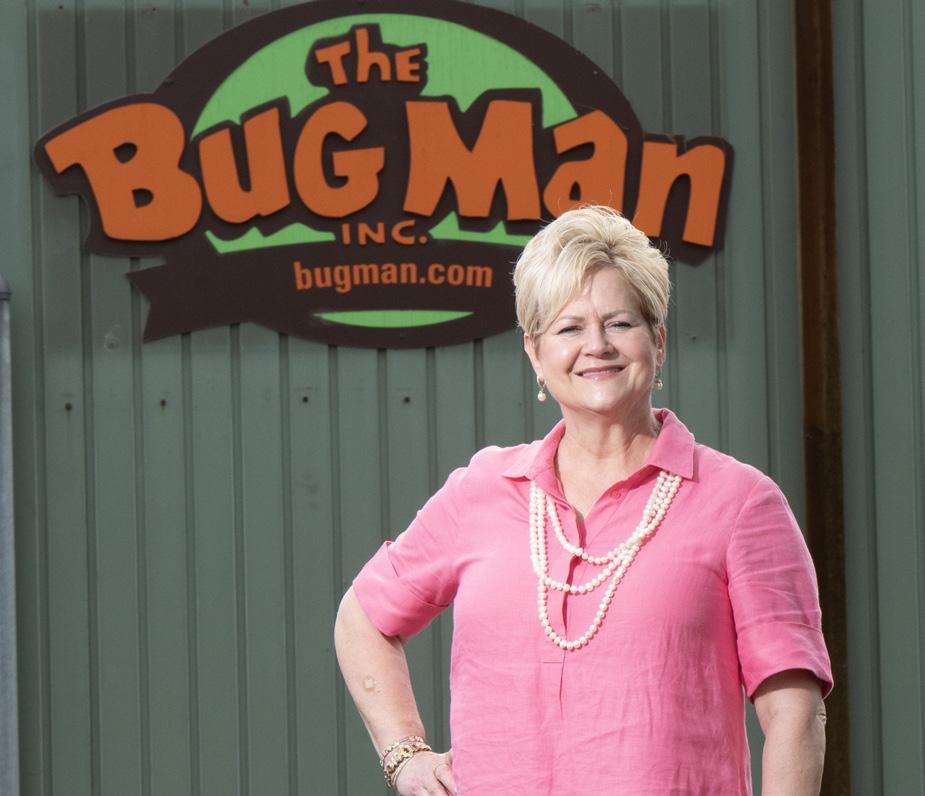
tocols, products and treatments,” Cranford said. “We also have our technicians complete a lengthy Purdue pest course that teaches them additional techniques and procedures. They have testing at the end of the course they must pass before they receive certification.”
After a thorough inspection, technicians discuss issues with the homeowner and walk them through what to expect with the treatment. Especially pressing during the summer months are the company’s mosquito services. The Bug Man also offers a one-time or special event mosquito service, in addition to yard treatments for fleas and ticks.
Other popular services include termite pretreatments, clearance letters for real estate sales and closings, monthly pest management for both commercial and residential properties and Sealeze brushes for entry points with gaps. While each of The Bug Man’s services provides invaluable protection for one’s home, Cranford especially recommends a crawl space encapsulation or moisture barrier service for homeowners with crawl spaces.
Between its locations in Searcy and Little Rock, The Bug Man is able to service most areas of the state. Cranford and her team cover a 50-mile radius from Little Rock, and they take great pride in helping customers protect their families, homes and businesses.

Year founded 1976
Years in Business 49
# of Employees 19
Years in LREA 27
General Manager
Becky Cranford is following in her father’s footsteps at the helm of The Bug Man, Inc., which has built a reputation for excellence over nearly 50 years.
Becky Cranford (Photo by Steve Lewis)
801 S. Broadway St. Little Rock
501-374-6422
capitolglassinc.com
Now celebrating its 75th anniversary, Capitol Glass Co. was established in 1950 — and has been at the corner of Eighth and South Broadway streets in downtown Little Rock since 1953 — making it the oldest locally owned and operated glass company in the Little Rock metropolitan area.
Capitol Glass has been led by three generations of the Grimes family, including cofounder Jack Grimes and his son, Glenn, and grandson, Aaron. The three current owners, Glenn Grimes, Aaron Grimes and Austin Watters, are all members of the Little Rock Executives’ Association.
Needless to say, the auto glass industry looks very different from 75 years ago. The Capitol Glass team has had to contend with advances in technology that have made a simple windshield replacement much more complicated than meets the eye. When it comes to the business itself, however, little has changed except for a logo update in recent years and renewed branding efforts. The secret to success is the same as it was in 1950.
“Quality work and exceptional service,” Aaron said. “Always placing an emphasis on craftsmanship and always listening to and taking care of our customers no matter what the situation.”
The company is also involved in the downtown community through event sponsorships, supporting local churches and groups such as Habitat for Humanity, and even sponsors a few local youth sports teams.
While Capitol Glass plans to keep adapting to emerging technologies and industry trends, customer feedback will continue to be the measure of the business’ success. With Aaron currently raising the fourth generation of ownership, Capitol Glass seems set to keep doing what it does best for a long while yet.
“From the past to the present to the future, thank you central Arkansas for 75 years of business and counting,” Aaron said. “We look forward to serving you for many more years to come.”
Services include auto glass replacement, rock chip repair, advanced driver-assistance system recalibration, sunroof replacement, door glass repair, door lock repair, rearview mirrors, bus and big rig auto glass and water leaks. Mobile service, in-shop service, and pickup and delivery are available.
The introduction of ADAS has changed the automotive glass industry. Various safety features have brought with them a bevy of new sensors, cameras and systems that have to be carefully recalibrated when replacing a windshield. That causes complications on both the repair and the insurance sides, but Capitol Glass has worked tirelessly to adapt while never compromising its high standards.
“When you call our shop, you are going to talk to an actual person who is experienced and extremely knowledgeable about auto glass,” Aaron said. “We do all the auto glass work for most of the luxury car dealerships in Little Rock, and there is a reason for that.”
Year founded 1950
Years in Business 75 # of Employees 12
Years in LREA 35
Now celebrating its 75th anniversary, Capitol Glass Co. in Little Rock has been led by three generations of the Grimes family, and the fourth generation is on its way.
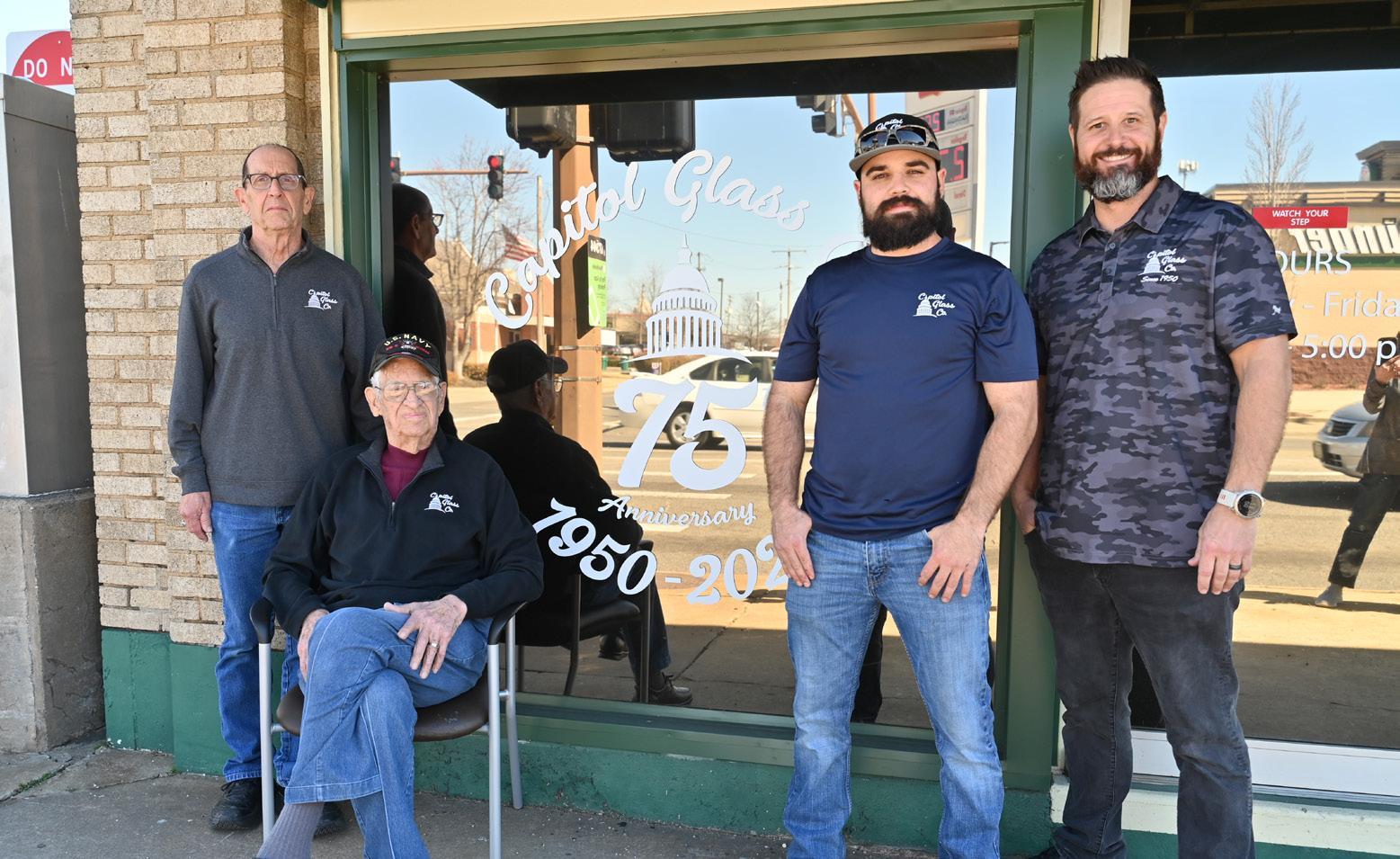

Glenn Grimes, from left, Jack Grimes, Austin Watters and Aaron Grimes (Photo by Chris Davis)

Founded in 1931, DASH Heating & Cooling stakes its claim as the oldest heating, ventilation and air conditioning company in Arkansas. With locations in Little Rock and Hot Springs, the family-owned company has been serving customers throughout the central Arkansas region for generations.
Keith Wortsmith, president and co-owner, joined the family business shortly after beginning work as a mechanical engineering consultant following graduate school. He transitioned into a manager position at his family’s HVAC company, then called Independent Air Conditioning, and helped launch a successful rebranding as DASH Heating & Cooling. He has led the company since 1997.
“I want people to know that we are not a new-to-town company from some other part of Arkansas or an out-ofstate company owned by a private equity group,” he said. “We are the same locally owned and operated company that has been serving central Arkansas for nearly 100 years.”
Success in the HVAC industry requires more than just technical expertise. It relies on a visionary management team and friendly, dedicated, well-trained employees who feel appreciated for their contributions. What sets DASH apart is its exceptional response time to its Comfort Club Members, a transparent and honest pricing model, and an unwavering commitment to service excellence in every customer interaction.
The company offers the DASH Comfort Club which includes annual preventative maintenance, front-of-theline emergency service, no overtime charges, discounts on service, repairs, and equipment replacements.
“At DASH Heating & Cooling, fixed right the first time is our top priority,” Wortsmith said. “Whether a customer has used us for years or is calling for the first time, we work to provide everyone with friendly, expert service while ensuring a timely turnaround and up-front pricing so there aren’t any surprises or hidden cost.
“Our top-notch team is ready to assist you with all your heating and cooling needs.”
DASH offers maintenance, service, repair and replacement of residential and light commercial heating and cooling systems, as well as indoor air quality solutions such as air cleaners, UV systems and duct cleaning. 12417
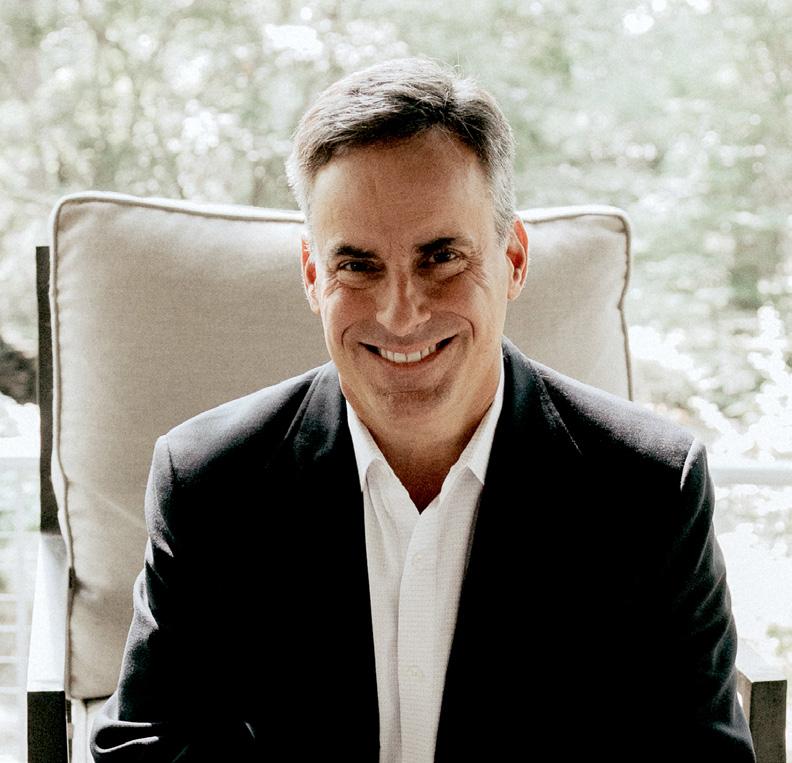
Year founded 1931
Years in Business 94
Years in LREA 33
True Transparency up-front pricing ensures DASH Heating & Cooling clients know the prices of needed repairs and supplies so they can make informed decisions without hidden costs.


Keith Wortsmith, President

While Dr. John H. Dean opened the doors to Dean Dental Solutions in 1994, there has been a Dean serving the dental needs of North Little Rock residents for more than six decades. Dean’s father, Dr. Paul Dean, opened his practice in 1959. Dean Dental Solutions moved to its current location on Crestwood Road in 2019 and benefits from the expertise of two associate dentists, Dr. Chelsea Seelinger and Dr. Brandon Jones. The third generation of the Dean family to practice in their hometown is also quickly approaching — Dean’s son, Andrew, is a member of the inaugural class at the Lyon College School of Dental Medicine in Little Rock.
When Dean first began practicing alongside his father, the work mostly consisted of the usual procedures, such as fillings, extractions and crowns. However, Dean quickly realized his interest in expanding his repertoire and a desire to offer his patients a wider variety of services. He began performing root canals in-office rather than sending patients to an endodontist, as was common at the time, and grew even more interested in bringing the latest techniques and technology to his patients. Dean Dental Solutions now offers a variety of services, from comprehensive general dentistry and cosmetic restorations to same-day crowns and sedation.
“I know my dad would be proud of the way Dean Dental Solutions has grown and changed, but I would venture to guess that he wouldn’t recognize it,” Dean said. “We do things completely differently than we used to just 31 short years ago.”
The latest addition to the practice’s offerings is the All-on-4 procedures. The All-on-4 dental implant system is an advanced technique designed to replace
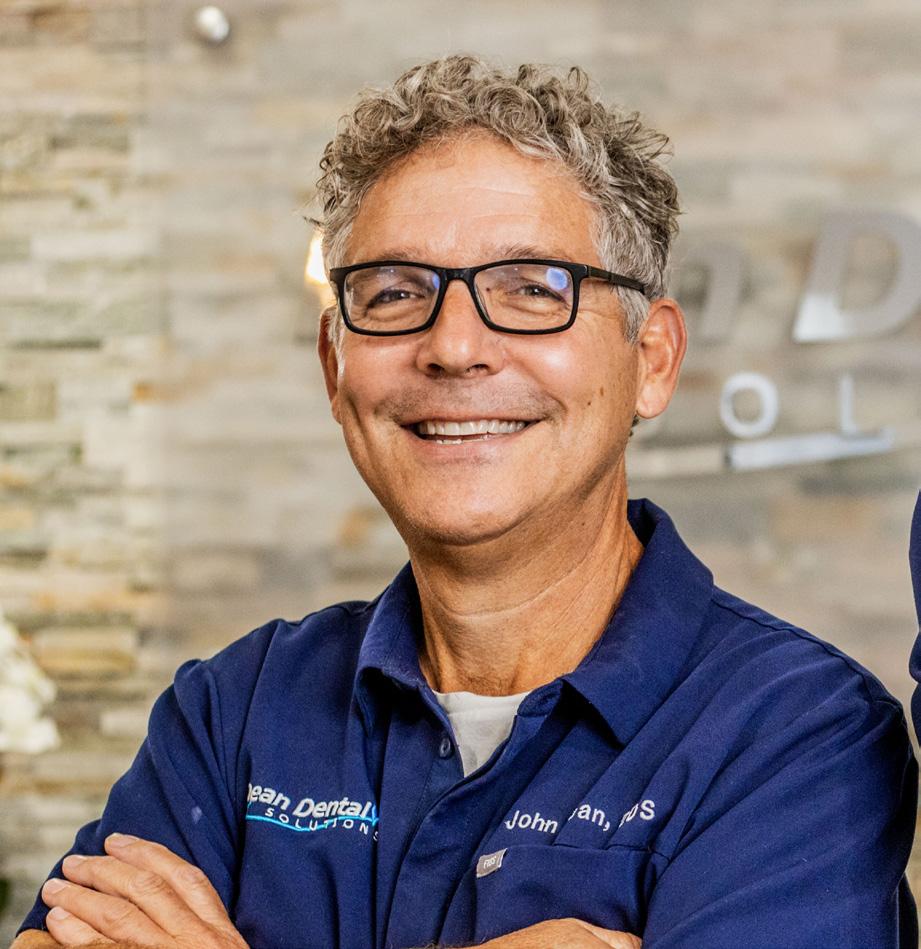
a full arch of missing or severely damaged teeth using just four or more implants. The procedure offers a permanent, stable and natural-looking solution often referred to as a “same-day smile” because patients can leave the dental office with a functional set of teeth on the same day as surgery.
“The thing that I enjoy most about my work is seeing someone take pride in a new smile,” Dean said. “It is truly gratifying to know I have helped someone achieve a higher level of confidence in their appearance.”
Dean has been an LREA member since 2021 and has seen the positive impact the association has had on his practice. The group offers an invaluable opportunity to connect with professionals across different industries who take the same great pride in their businesses.
“Even though I’m the only dentist in the group, I have been able to learn from others at presentations, open houses and even during casual conversations at breakfast,” Dean said. “I have also benefited by gaining new patients and new contacts through networking opportunities. My wife, Bliss, and I have both enjoyed being a part of such a great group of people and business owners.”
2524 Crestwood Road Suite 2
North Little Rock
501-771-2911
deandentalsolutions.com

Year founded 1959
Years in Business 66
# of Employees 24
Years in LREA 4
Dean Dental Solutions values patients and works to earn their trust so that together, they can accomplish each individual’s goals for a happy, healthy smile.
Dr. John H. Dean
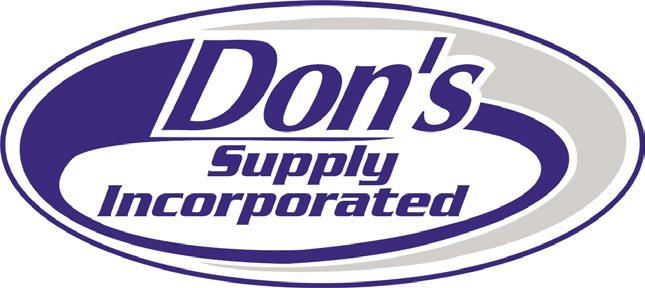

Founded in 1968 by Don Downs, Don’s Supply in Little Rock seeks to provide the best in products, service and availability to its customers. Initially founded as a bar supply company, Don’s added restaurant supply items during the 1990s and now sells everything from vent hoods and walkin freezers to toilet paper.
Originally started in a 12-by-30-foot garage, the business grew quickly and moved into a building on Patterson Road in the early 1970s. The business built its own 7,200-square-foot facility in the late 1990s but soon outgrew the facility and purchased an adjacent building for office space.
In 2004, Don’s Supply purchased the 34,000-square-foot building on Interstate 30 formerly occupied by the headquarters of Hank’s Fine Furniture. The business now boasts a 13,000-squarefoot air-conditioned showroom, the largest of its type in Arkansas.
The business remains family owned and operated, now under the leadership of Don’s children, Sandy Downs, Karen Young and Dean Downs. All three second-generation owners are college educated, and the four central employees at the company have more than 170 years of combined experience in the food service equipment and supply business.
The business provides all nonfood items found in a restaurant, including furniture, equipment, disposables, china and flatware. Don’s Supply is part of the Alynaty Buying Group, which offers extensive training and keeps staff abreast of changes happening on a daily basis.
Product lines run the gamut of industryleading brands and include a wide range of cooking, refrigeration and dishwash-
ing equipment, along with furniture, food display, tabletop needs, food preparation items and even chef apparel.
After 52 years at the family business, Sandy said working at Don’s Supply is more than just a job; it is his life. Don’s Supply has been a member of the Little Rock Executives’ Association since 2008.
As a commercial operation that is open to the public, Don’s does not generate as much business with other LREA members as others do. However, Sandy said he benefits from using other members as a trusted resource for needs ranging from banking and legal services to janitorial supplies.
“All members are absolutely the best in their field,” he said. “I don’t have to worry whether the job will be done right. If there are issues, they are handled immediately and professionally. On top of being a resource, I’ve made lifelong friends I will take with me to the grave. One of the best business and personal decisions I’ve ever made is becoming a member of this organization.”
in LREA 17
A family-owned restaurant supply company that has been in Little Rock more than 50 years, Don’s Supply has the largest showroom of its kind in the state.
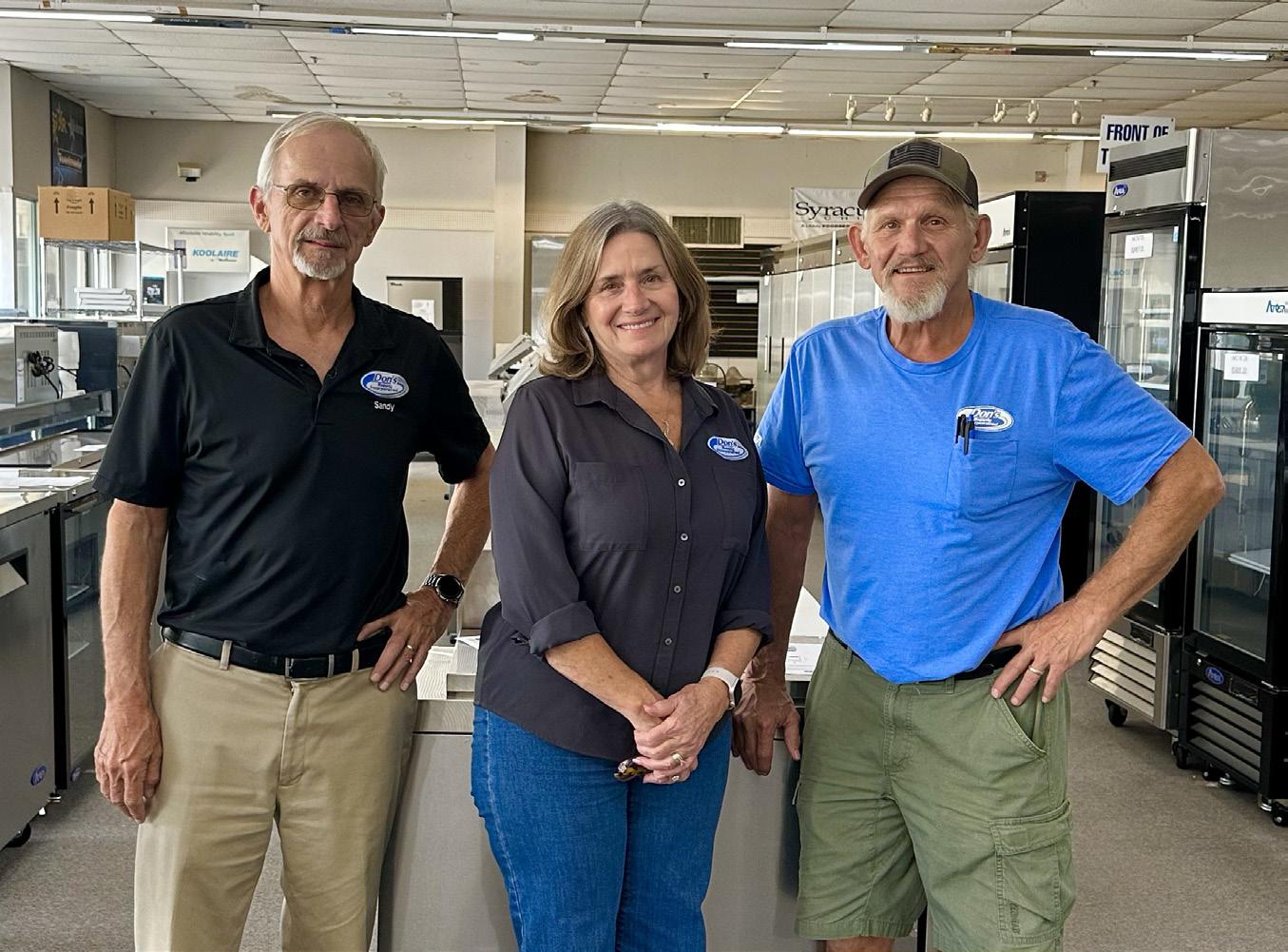

Sandy Downs, from left, Karen Young and Dean Downs

Faithfully serving clients since 1997, First National Title Co. is widely recognized for its commitment to closing deals, no matter how much work is involved. The company is helmed by attorneys Jim Pender and David Harrison, whose legal expertise allows them to handle even the most complex real estate transactions.
In an era — and a real estate industry — where it would be easy to look upon title services as just another stream of revenue to supplement one’s main line of business, First National Title opts for depth rather than breadth. Not only has the company stayed in its lane; it has become the standard-bearer for what a title and closing business ought to consist of. As the state’s largest independent title company, First National Title employs close to 200 team members across the state who provide hundreds of years of combined experience in the title business.
That expansive footprint also ensures that even clients in rural areas of the state have access to local experts and quality service. The company’s 25 brick-and-mortar offices are in constant communication, giving the company’s dedicated and attorney-supervised staff the ability and know-how to serve clients in all 75 counties. A broad network of title plants, largely maintained by the company itself, also gives First National Title an edge when it comes to the thoroughness of its research.
First National Title Co. closes both residential and commercial sales, as well as loan refinancing transactions. The company provides title examination and escrow closing services for all real estate transactions, including 1031 tax exchanges, and issues mortgagee’s and owner’s title insurance policies. A reputation for results has led First National to be called upon frequently by out-of-state title companies
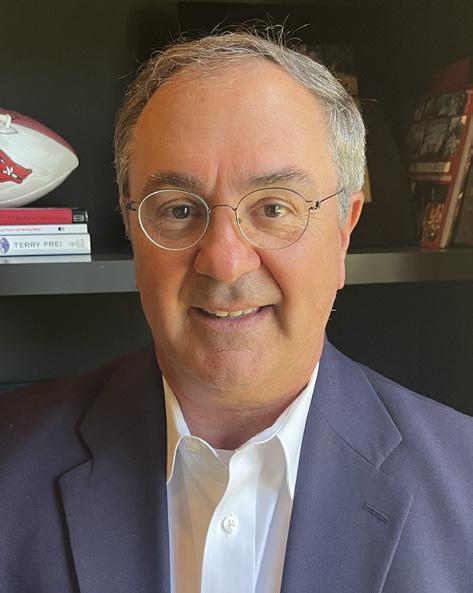
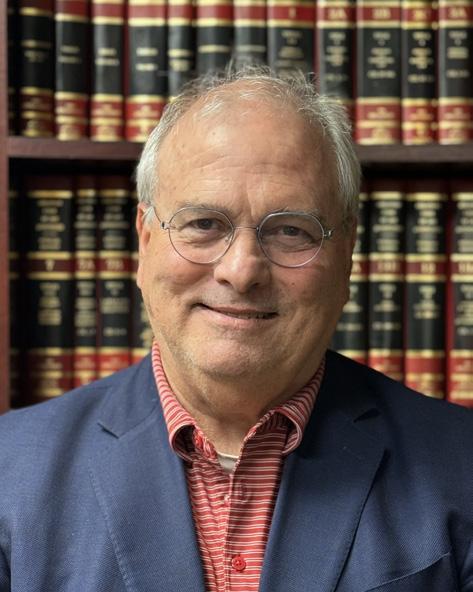
needing to get deals over the line in Arkansas. The company also works behind the scenes with plenty of companies based in the Natural State, as well.
First National’s vision is to continue expanding its franchise statewide and regionally, instilling its business model in strategic markets poised for growth while never compromising on expertise and service in any of the communities it is fortunate enough to serve. As the title company of choice for scores of clients, including real estate agents, lenders and even other title companies,
Year founded 1997
Years in Business 28
# of Employees 174
Years in LREA 21
First National Title offers locations across the state, so it is more than likely customers looking for world-class title services have a branch within reach.
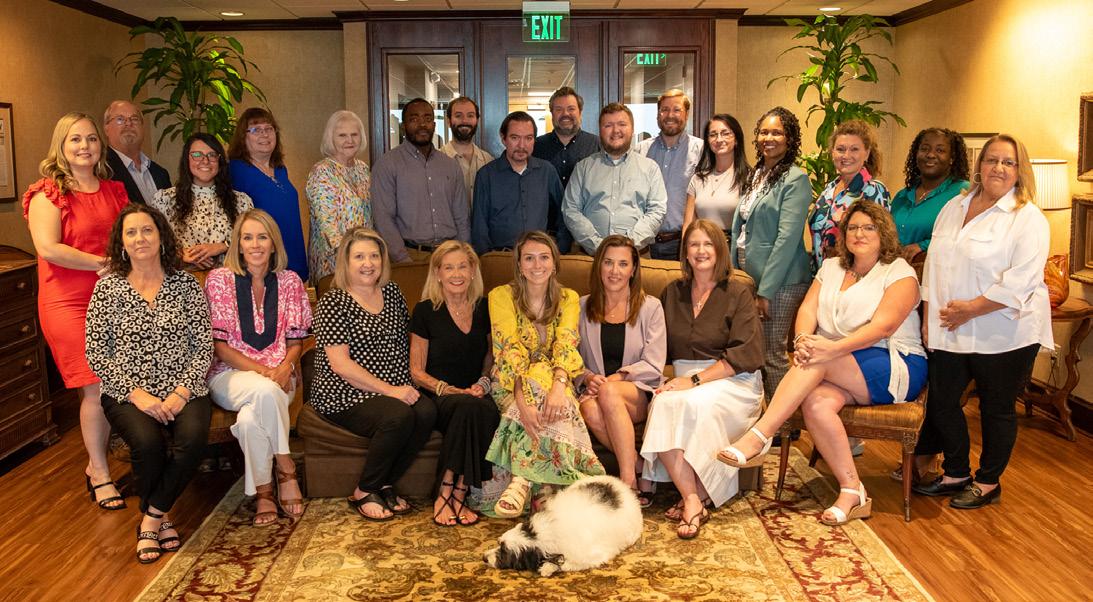
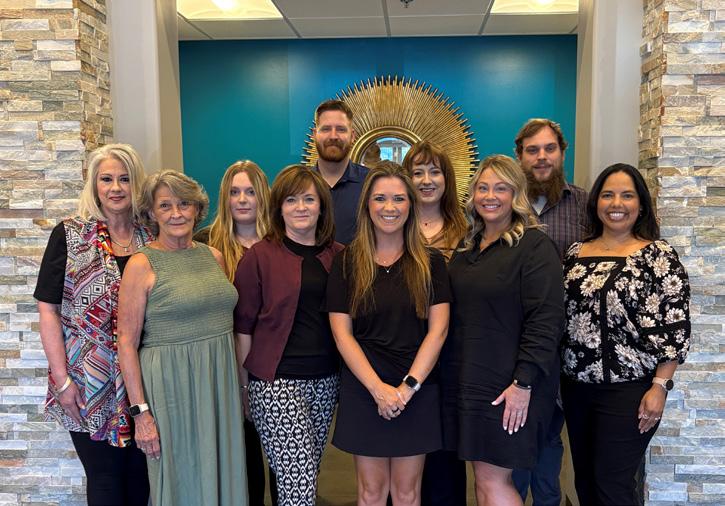
First National is an agent for First American Title Insurance Co., Chicago Title Insurance Co., Commonwealth Land and Title Insurance Co., Fidelity National Title Insurance Co., and Old Republic National Title Insurance Co.

First National Title provides Arkansas with a level of comprehensive service that is unmatched anywhere else.
David Harrison Jim Pender

The mission of Flexion Point in Little Rock is to help build great businesses by building great relationships. Led by president and CEO Stuart McLendon, the Flexion Point team believes paperwork should never hold small- and mid-size-business owners back from success. The fractional staffing firm offers support in accounting, finance and human resources, giving businesses the expertise they need to thrive without the added hassle and costly overhead of recruitment and full-time hires.
The firm’s fractional chief financial officer support provides businesses with high-level expertise on a part-time or project basis. By leveraging fractional CFO services, companies can enhance their financial decision-making processes, ultimately driving growth and stability.
Flexion Point’s comprehensive range of accounting and finance capabilities includes basic tasks such as accounts payable and accounts receivable management, as well as more advanced financial planning and analysis. The firm also offers support for a variety of human resources and payroll needs, such as employee onboarding, benefits administration, and creating employee handbooks and policies.
A central Arkansas native, McLendon has spent his professional career helping other leaders achieve their goals through specialized support in leadership, finance and accounting. While serving as CFO at DYNE Hospitality Group, McLendon recognized a widening gap between the number of open finance and HR positions and the talent available to fill them. Taking a cue from successful fractional staffing approaches in areas such as information technology and marketing, he founded Flexion Point to address the growing demand in his own area of expertise.
Flexion Point’s model is built around giving business owners access to the right people at the right time. In many cases, the firm is able to find savings opportunities that more than cover the cost of its services. The diverse Flexion Point team has experience across several industries,

including retail, restaurants, medical settings, mineral rights, construction and more. From rapidly expanding small businesses to middle-market company acquisitions, Flexion Point provides clients with a tailored experience designed to meet their unique needs and goals — never a one-sizefits-all solution.
McLendon’s team strives to make a difference for businesses through its commitment to a set of deeply held core values. Every action and decision at Flexion Point is guided by four cultural pillars: relationships first, execute relentlessly, embrace flexibility and lead with integrity. With the company’s emphasis on trust, collaboration, precision and innovation, clients are assured that their confidence in Flexion Point services is well placed.
At Flexion Point, the goal is more than just achieving financial success; it is empowering businesses to thrive with the strength of its relationships and the integrity of its actions.

Year founded 2023
Years in Business 2
# of Employees 12
Years in LREA 1
Flexion Point’s bespoke fractional support services in accounting, finance and human resources are designed to help business owners scale their companies efficiently and effectively.
Stuart McLendon
Jurek Makowski founded InstallAV in Little Rock in 1996, and over the decades since, the company has become central Arkansas’ go-to source for cuttingedge audio, video and smart home automation delivered with deep expertise and trusted service.
“Great design is only as good as the technology behind it,” Makowski said. “That is why we take the time to carefully evaluate and hand select every product we use in audio, video and automation installation. We don’t just install what’s available; we install what works best.”
Key to the company’s success has been the ability to adapt to homeowners’ evolving needs. Recent years have seen InstallAV lean into the growing home automation market. The Install My Shades division is a one-stop shop for motorized shades, smart blinds and other automated furnishings.
“People don’t build big home theaters anymore,” Makowski said. “We don’t install video projectors and build home theaters, at least not here in Arkansas. We install TVs, hang TVs and install soundbars, but then we automate everything, making everything easy to operate by the client. We make it simple.”
One aspect that has made InstallAV such a sought-after name is its focus on adapting the products and systems it installs to match each clients’ expectations and abilities. People expect simplicity, Makowski said, and whether the company is automating window shades or building a whole-home smart system, InstallAV ensures every component is built for performance, ease-of-use and aesthetic harmony.
“We have to learn what the client wants, what is their dream, and we have to find out how technologically advanced the client is,” Makowski said. “There is a
lot of psychology involved in it because when we write the programs for the automation, we have to learn how the client is thinking, how easy it’s going to be for them to operate and what is going to make it easy for the client.”
InstallAV stands apart for its depth of experience. With nearly 30 years in the business, the company is adept at handling both old and new systems in a way that many others are not. Where possible, InstallAV is able to offer customers more convenient, cost-effective updates to their existing setups rather than ripping them out to install an entirely new system.
“Right now, we are in a moment where a lot of customers are updating systems that they put in many, many years ago,” Makowski said. “We are basically the only company in town that is capable [of doing that]. We are able to go and evaluate an existing system and make the existing system upgraded to the newest standards without totally replacing it.”
Looking ahead, Makowski said the company will continue to keep up with the latest and greatest products in the AV market, but he also intends to expand the company’s automation offerings. Install My Shades has a separate website dedicated to automated and motorized window treatments and will also specialize in creating higher-end automation systems for both commercial and residential clients.
“AV is what we do every day, but the automation is evolving,” he said.
Makowski joined LREA at the beginning of 2007 and said he has developed great relationships with the other members. Members trust that their fellow executives are the best in their respective industries and go above and beyond to meet the association’s high standards, he said, which allows LREA members to easily refer business to one another.
“They feel safe to recommend LREA members to their friends and employees and family because they know that we’re going to say what we do and do what we say,” Makowski said.
7304 Kanis Road, C3 Little Rock 501-205-5002
installav.com
installmyshades.com
Year founded 1996
Years in Business 29 # of Employees 4 Years in LREA 18
InstallAV has been in business since the days when equipment ran on vacuum tubes, and it has kept up with every innovation since.


Jurek Makowski
(Photo by DeWaine Duncan)

Originally housed in the Walden Building in Little Rock and known simply as the Dermatology Clinic, Little Rock Dermatology Clinic was founded by Dr. Calvin Dillaha and Dr. Thomas Jansen in 1956.
The two pioneers of dermatology discussed starting a clinic while at the 1955 American Academy of Dermatology meeting in Chicago. They were also responsible for establishing the dermatology clinic and resident training program at the University of Arkansas for Medical Sciences in Little Rock.
Dillaha, who studied at the University of Chicago and published a pivotal paper about acrodermatitis enteropathica and its formal recognition as a malabsorptive disease, was instrumental in developing the dermatology division at UAMS. He also built the dermatologic unit at the John L. McClellan Memorial Veterans’ Hospital in Little Rock into one of the most active dermatologic inpatient units in the United States at the time.
Jansen succeeded Dillaha as the chair of dermatology at UAMS and had a hand in the development of groundbreaking dermatologic treatments. He helped develop and popularize the use of frozen section analysis for diagnosis of conditions such as skin cancer and helped bring the Mohs procedure to Arkansas, revolutionizing care for cancer patients in the state.
Although not the first dermatologic practice in Arkansas, Little Rock Dermatology is now the longest established dermatology clinic. Little Rock Dermatology Clinic moved to the Doctor’s Building in Little Rock 1962, and the practice is still there today.
Physicians at the practice include Dr. Matthew Kagy, Dr. Thomas Manning, Dr. Austin Morgan and Dr. Brian Wayne. Other staff members include physician assistants Alexandra Sanroma and Hailey Arens, registered nurse Karen Spruell, and licensed aesthetician Madison Moody.
Providing both general and cosmetic dermatology, Little Rock Dermatology spots potential problems and diagnoses a multitude of conditions. The team’s skills and knowledge help improve the lives

Dr. Brian Wayne
of patients of all ages, from infants with birthmarks and children with eczema to baby boomers with sun-damaged skin and senior citizens with shingles.
Some of the more common conditions treated at the practice include eczema, acne, rosacea, warts, skin cancers and psoriasis, but any concern about the skin, hair or nails can be addressed.
A wide range of cosmetic services is also available. Cosmetic services offered include Botox, dermal fillers, Laser Genesis skin therapy, Juvéderm, Sculptra Aesthetic, ZO Skin Health, SkinPen, Colorscience, hydrafacials and more.
Whether providing general medical care for the skin or focusing on a specialized area of medical, surgical or cosmetic dermatology, Little Rock Dermatology takes pride in being a trusted partner in managing the health of patients’ skin, hair and nails.
500 S. University Ave., Suite 301.
Little Rock
501-664-4161
littlerockdermatology.com

Year founded 1956
Years in Business 69
# of Employees 30
Years in LREA 2
After nearly seven decades in business, Little Rock Dermatology Clinic continues its mission of providing clients with state-ofthe-art care using cutting-edge technologies.
11300 Cantrell Road Suite 200 Little Rock
501-663-7055
meridiania.com
“Investing for a rich life, realizing what you value” is the mantra at Meridian Investment Advisors in Little Rock.
“What we do is invest money for people and companies, but the reason we do that is they have something that they want to accomplish with that money,” Chartered Financial Analyst Pat Moon, managing principal, told Arkansas Money & Politics earlier this year. “Those are really the things that they value. What we do just enables them to be able to do that, so that’s what our strategy is.”
The firm offers a full suite of wealth management, financial planning and retirement plan services. Charley Gardner, retirement plan advisor, and his team are experts at helping business clients develop a suitable retirement plan.
The firm’s vendor-partner selection process determines the best fit for record keeping, administration and plan document services, and Meridian employs a due diligence checklist that helps plan and document fiduciary control activities and responsibilities.
While the bulk of the firm’s work has historically focused on institutional money management such as pension and profitsharing plans, city and government groups, endowments, and foundations, Meridian is increasingly leaning into wealth management for families.
Of particular importance is the more active role women are now taking when it comes to financial planning. The company is also staying abreast of the ongoing wealth transfer from baby boomers to younger generations.
“Although what we’re doing is essentially the same, the service model is changing completely, so we’re making investments in people — in many cases, younger people,” Moon said. “We’re investing in systems and technology where we’ll be able
to address the experience that the younger people are looking for, because they’ve grown up having [come] to expect that.”
With more than $800 million in assets, Meridian has distinguished itself not only by financial savvy but by having a strong focus on education, providing resources to clients, and working to make complex topics and strategies more approachable.
Founded in 1983, Meridian provides clients with invaluable knowledge due to the experience of its long-tenured staff, three of whom have been with the firm for more than 25 years. At the same time, the business continues to grow, adding new team members, new assets and new clients.
“The culture that we have is when somebody walks through the door, everybody’s on alert about what would make that client’s experience good for that particular visit,” Moon said. “The client experience aspect of our business is something we are focusing a lot on as we continue to grow our team and move towards the future.”
Years in LREA 32
Having served the central Arkansas community for more than 40 years, Meridian Investment Advisors continues to evolve while serving clients with professionalism and expertise.


Rena Williams, from left, Charley Gardner, Crystal Swearingen, Pat Moon, Diana Hinojosa, Jennifer Greer and Marshall Moon

Myers Supply, founded in Hot Springs in 1955, is a family-owned distributor of janitorial, cleaning and facility maintenance products headquartered in Arkansas. The company expanded its reach by opening a second location in Little Rock in 1977. Today, Myers Supply is led by Judy Myers, president, and Ryan Myers, vice president, who continue the company’s tradition of excellence and innovation.
For seven decades, Myers Supply has served as a full-line supplier of cleaning equipment, chemicals, safety supplies and facility solutions across industries. Operating from its facilities in Hot Springs and Little Rock, the company provides comprehensive single-source purchasing of cleaning and sanitation products. Products are stocked locally and delivered regularly to customers. The products are available with minimal lead time, so there is no reason for Myers customers to stock large amounts of the products at their facilities.
Because Myers Supply is an independent company, it can pivot with trends quicker than some of its national competitors. Myers has partnered with the pioneers of healthy, eco-friendly products that provide the most impactful results for clients. This broad capability enables clients to obtain everything from everyday janitorial necessities to advanced specialty systems through one trusted partner.
Myers Supply delivers a wide array of facility maintenance solutions to keep workplaces clean, safe and well supplied. Key product categories include janitorial and sanitation supplies; commercial cleaning equipment; laundry and warewash systems; paper and disposables; and safety and maintenance, repair, and operations supplies.
Myers Supply fosters a culture of continuous improvement, embracing new technologies to enhance cleaning processes. The company continually introduces innovative product systems supported by an expert technical staff to make maintenance and sanitation tasks easier and safer. This forward-thinking approach keeps Myers Supply at the forefront of industry trends.
As an example of its innovation, Myers Supply established a dedicated robotics division, Myers

Robotics, to provide autonomous cleaning and service robots. These state-ofthe-art robots perform tasks such as floor scrubbing, vacuuming, UV-C disinfection and supply delivery, significantly improving efficiency and facility hygiene. By deploying these solutions, Myers Supply helps clients boost productivity while allowing staff to focus on higher-value tasks.
The long-term success of Myers Supply is built on a strong commitment to customer service and excellence. The company’s professional consultants and training programs ensure that clients not only receive products but also the knowledge and support to use them effectively. Myers Supply strives to be more than a vendor by acting as a true partner and value chain consultant to help customers achieve optimal results at the lowest total cost.
The customer-focused philosophy at Myers Supply has led to decades-long business partnerships founded on trust and mutual success. By investing in relationships and delivering high-quality solutions at competitive prices, the company has earned a reputation as a trusted industry leader.
900 Arch St. Little Rock
501-372-6677
831 Third St. Hot Springs 501-623-7742
myerssupply.com

Year founded 1955
Years in Business 70
# of Employees 23
Years in LREA 44
Myers offers clients the systems necessary for maintaining clean and healthy buildings in addition to providing training and logistical support.
Ryan Myers

Ryan Flynn, president of Network Services Group, is clear about what sets his company apart in the world of information technology.
“Other providers in this industry want to have full control of all decisions surrounding IT and cyber security,” he said. “We want to advise our clients of the best way to handle IT and cybersecurity, but we understand that some suggestions may take time to implement, and we work with them to accomplish these goals over time.”
Flynn is the son of co-founder Gary Flynn, who incorporated the company with business partner Richard Beard in 1989. The company began by helping clients save money on long-distance phone service at a time when consumers had fewer options for carriers and then branched into selling, installing and servicing business phone systems.
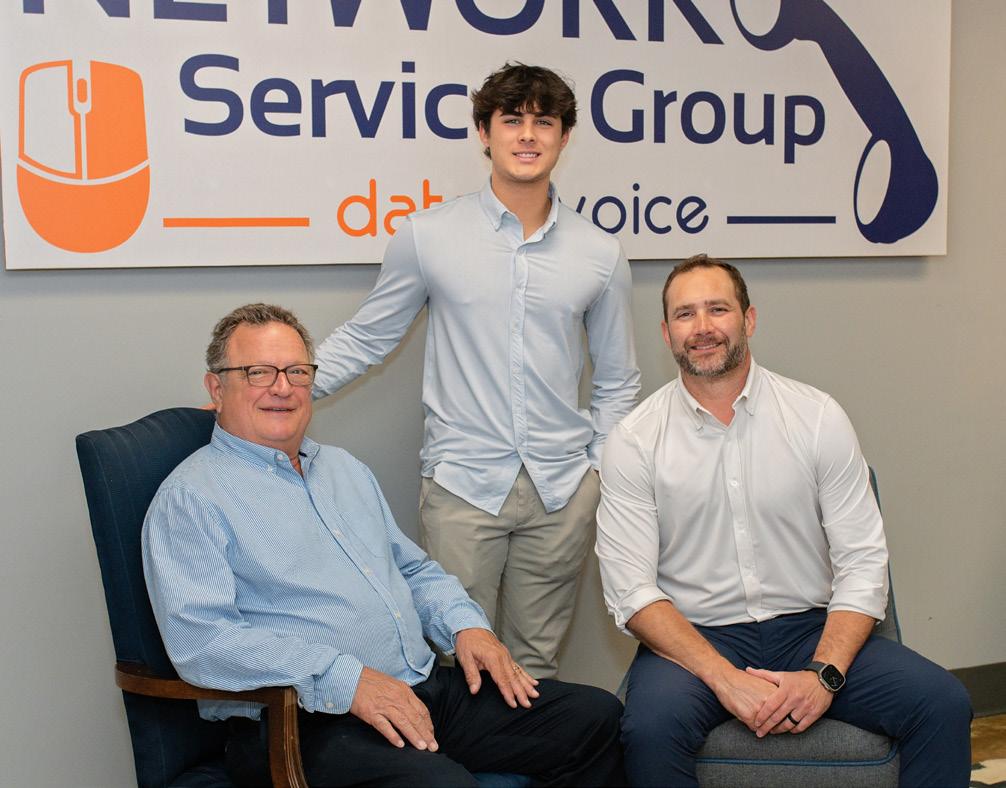
Ryan Flynn worked his way up from cleaning offices in high school to installing systems, working in sales and, eventually, joining the leadership team.
Customers have come to expect a genuine and consultative relationship with NSG, where the goal is to understand each company’s unique needs and customize a solution for long-term stability and security.
“Having the opportunity to help our clients accomplish their business goals by providing a worry-free IT solution that utilizes technology is the most exciting part of what we do at Network Services Group,” Flynn said.
Headquartered in North Little Rock with an office in Fayetteville, NSG offers a full range of IT services across sectors that include health care, financial, automotive, municipality, education, business and nonprofit. The company provides managed IT services, phone systems, internet provider consulting and cloud services, as well as artificial intelligence consulting and cybersecurity.
Paying attention to ever-evolving trends in
technology is key for NSG, as is a willingness to change and adapt — both in approach and offerings — in order to better serve clients. The company has been focusing more on cybersecurity in recent years, and NSG is beginning to explore the potential for artificial intelligence to enhance work at the company and for its clients.
Flynn also recognizes the importance of quality personnel. Members of the NSG team are more than that: They are like family members. The culture at NSG is one that prioritizes communication, support and feedback, all with the aim of helping employees reach their personal and professional goals.
“We want to not only provide a place to work, but also a place that feels like home for our employees,” Flynn said.
Flynn is planning to bring the next generation of the family into his fold with the addition of his oldest son, Cole Flynn, who is currently studying at the University of Arkansas in Fayetteville. Gary Flynn is now retired but said he feels fortunate to see the company under the expert guidance of his son, Ryan.
5105 McClanahan Drive Suite J-3
North Little Rock 501-758-6058
2928 N. McKee Circle Suite 126 Fayetteville 479-308-5450
nsgdv.com

Year founded 1989
Years in Business 36
# of Employees 78
Years in LREA 29
Based in North Little Rock, Network Services Group has embraced two generations of family ownership and is in the process of ushering in a third.
Gary, from left, Cole and Ryan Flynn (Photo by Jamie Lee)

The Oyster Bar is one of those iconic restaurants that seems to have been a fixture in the Little Rock restaurant scene since time immemorial. Now celebrating its 50th anniversary with a new look but the same emphasis on quality seafood, The Oyster Bar seems poised to bring in new clientele while remaining the go-to spot for its regulars.
“We’re bringing the best seafood to Arkansas,” said Blaine Tanner, general manager. “You can get service just about anywhere you go, but you can’t always get hospitality, and that’s what we aim to serve with each plate.”
Tanner’s parents, restaurateurs Chris and Samantha Tanner, bought the restaurant in 2019 and have completely restored the 101-year-old building, adding a new ambiance and a Cajun atmosphere. Upgrades to everything from the bar and patio to the kitchen equipment have helped to not only increase the flavor and quality of the food but decrease ticket times and improve team efficiency.
“The reason why I lined the back walkway with shucked oyster shells is so that you’re transported from Arkansas to the coast,” Blaine said. “We just unfortunately don’t have an oceanfront view.”
Blaine said his father has also worked to ensure The Oyster Bar serves the finest seafood around, even driving to the Gulf Coast to secure the best oysters.
“We have worked hard to ensure we trust the sources of where our seafood comes from,” Blaine said. “We don’t want people’s hard earned money going to something not worth it. Just as our remodels have enhanced and improved the dining atmosphere, we’re driving our business to keep developing in the correct direction of fresh food, reasonable pricing and an unforgettable experience here in Arkansas.”
The Oyster Bar offers specialty raw oysters from around the world, along with wood-grilled oysters, smoked prime rib, a blue crab butter bowl and other delectable offerings that pair well with a wide selection of grower champagne and expertly crafted cocktails.

Food and libations are only half the reason to visit The Oyster Bar, however. Live music is the other half. Patrons can catch performances from 6 to 9 p.m. Thursday through Saturday, along with happy hour shows 3 to 6 p.m. Saturday, making The Oyster Bar one of Little Rock’s ultimate hangout spots.
Blaine recently became the representative for The Oyster Bar at the Little Rock Executives’ Association, following in the footsteps of Chris, who was representative for 17 years.
“LREA is imperative to our business success. Not only are the connections beyond valuable for business, but the member connections that come along with it go even further,” Blaine said. “I’m so grateful that my father was given the opportunity to join this group so that myself and our future family members can also experience this amazing group.”

Years in LREA 17
The Oyster Bar recently completed a top-to-bottom renovation that has enhanced the atmosphere and quality of food at the establishment.
Blaine Tanner
(Photo by Lori Sparkman Photography)
When it comes to building a home, few are prepared to navigate the myriad details that go into such a task. That is where Parkinson Building Group in Little Rock comes in. Founded in 1999, PBG has developed a comprehensive system for walking clients through the various steps of a project from start to finish.
“Most of our clients have never built before, and it is our job to walk them through what can feel like a daunting list of details on a large custom home,” Bill Parkinson, owner and founder, told AY About You in January. “Your home is one of your largest investments, and building one entails a lot of decision making where every detail is important.”
Over more than 25 years, PBG has developed a system in which every aspect of the homebuilding process, from financing to finishes, is handled in ways designed to reduce the stress as much as possible. The company’s sizable team of in-house construction professionals help shepherd the process, while a vast network of outside professionals such as architects and designers allows PBG to connect clients to needed services.
That dedication to service has garnered the company a glowing reputation and accolades such as being named Best Home Builder in “AY’s Best of 2025” readers’ poll. The firm’s portfolio boasts home after home seemingly lifted from the pages of a magazine, each built to the highest standards of craftsmanship and design.
As the homebuilding industry picks up steam, Parkinson Building Group finds itself in a prime position to make the most of that new momentum by expanding into additional markets. Not only is the firm well entrenched in
the Little Rock market; it has also broadened its reach into the Hot Springs market, where the firm’s proven process and incredible body of work has made fast fans among lake lovers in Spa City.
“We’re excited about Hot Springs. We think it’ll be a good, natural fit for us,” Parkinson said. “It’s close enough that we can be down there to work hand in hand with our team and clients and offers a new opportunity for the upper-end market that we serve.”
PBG embraces the challenge of bringing ever more elaborate homes to life. Today’s homeowners have more choices than ever when it comes to custom perks and high-end finishes.
“I realize the options are endless,” he said. “From golf simulators to whole-house automation, home technology continues to offer more each year as people are becoming more connected to their homes. Believe it or not, upgraded roofs have probably been the biggest shift we’ve seen this year. More and more of our clients are opting for slate or metal roofs than we’ve ever had before. We love this trend, along with other elevated exterior finishes, as it is a permanent stamp of quality for the home that everyone can enjoy from the owner to the passerby, and it speaks to the level of craftmanship that is important to our clients.”
The company can embrace a full range of design tastes and homeowner needs. Whether an empty nesting couple who is downsizing into a dream home or a growing family finding the ideal lot on which to make memories, the pros at PBG are equipped to handle the job.
18122 Cantrell Road
Suite C
Little Rock
501-954-8570
parkinsonbuildinggroup.com
Year founded 1999
Years in Business 26
# of Employees 14
Years in LREA 8
After more than 25 years, Parkinson Building Group has streamlined the homebuilding process, building luxury homes for clients first in west Little Rock, then the Heights and now in Hot Springs.

Bill Parkinson


Acentral Arkansas institution for nearly a century, Refrigeration and Electric Supply Co. has stayed true to founder Carl Miller Sr.’s vision of a business built on long-lasting relationships and customer service. R&E prioritizes integrity, excellence and communication in every interaction as it helps HVAC/R contractors succeed with unparalleled service, expert guidance and quality parts.
Miller founded his company in Little Rock in the 1930s alongside two business partners, relocating to East Sixth Street after World War II and officially rebranding the operation as Refrigeration and Electric Supply Co. After a fire destroyed that location, Miller used a loan against his life insurance to open on South Spring Street, which remains the R&E Supply home office today.
Second-generation owners Carl Jr., now retired, and Bill, took over in 1992, and now Bill’s son, Cory, serves as vice president. The wholesaler offers all manner of HVAC/R related parts, and its large inventory is complemented by a knowledgeable staff eager to help contractors. The company footprint has grown steadily through the decades, adding a first branch location in Pine Bluff followed by sites in Hot Springs, Russellville, Conway, Searcy, Fort Smith and, most recently, Jonesboro.
“Other than the additional store locations, the business has developed into a more sophisticated company, keeping culture as a top priority no matter the growth,” Cory said. “Not only do we want to be your choice of supplier, but we also want to be your choice for a career.”
The company’s culture is unmatched thanks both to its extensive history and

its loyal employees. The tenure of some team members exceeds 40 years, giving R&E Supply a deep pool of expertise from which to serve its customers. That consistency makes a difference for the contractors who continue to call upon R&E Supply time and again.
As the No. 1 source for HVAC/R solutions in Arkansas, the R&E Supply team works to stay ahead of trends by participating in industry groups and always listening closely to the needs of customers. Cory said he hopes to continue to grow the business into the largest HVAC/R wholesaler in the state. He has also found the connections made through LREA to be “so meaningful,” an apt membership for a company born and raised on the power of relationships.
“It doesn’t matter what widgets or services you sell — when you have as many business leaders as are in LREA together, you can always find someone that has seen similar things, and so you can always trust in LREA to be able to help find solutions,” Cory said.
Multiple locations throughout Arkansas
501-707-0197
resupplyco.com

Year founded 1938
Years in Business 87
# of Employees 70
Years in LREA 51
With nearly a century of service, each milestone in R&E Supply’s history tells a story of hard work, persistence and unwavering commitment to its contractors.
Cory, left, and Bill Miller

Whether one is looking for the latest Corvette or a dependable Honda Civic, top-notch service awaits customers at Russell Chevrolet & Honda in North Little Rock. Vice President Brett Russell was named Arkansas Dealer of the Year in 2016, and the dealership has earned Chevrolet’s Mark of Excellence Award several times, not to mention being named for numerous “Best Of” honors by readers of Arkansas Money & Politics.
“In my opinion, it’s pretty easy to get into the car business, but whether or not it’s in your wheelhouse, it takes a little bit of time and effort of working with people that know how to sell a car to pick up the good habits, forget the bad habits and make a living of it,” Russell told AMP last year. “It’s not for everybody, but those that it’s a good fit for, they do a remarkable job of selling and making a living at it.”
Now in its third generation, Russell Chevrolet & Honda started in 1963, when founder John Russell, Brett’s grandfather, bought Critz Chevrolet in North Little Rock, where he worked as a sales manager. The business passed to sons Bob and Rick after John’s retirement, and Brett is now joined as the third generation at the business by Rick’s sons, Jarrod and Rory.
“We try not to overwork our employees,” Brett Russell said. “We give them family time. We like the fact that our employees don’t feel overstressed, and they aren’t missing out on family engagements or family events, and we just want to impress that back onto all of them that we’re a family, and we want you to be involved in yours, as well.”
During the 1970s, a gas crisis brought an influx of imports to the market, including Toyota, Nissan, Mazda and Honda. The Russells owned a Mazda franchise in addition to the Chevy dealership before eventually getting into Hondas. Russell

said the brand is a “mirror” to Chevrolet.
“We have one domestic and one import, and they both complement each other pretty well,” he said.
The dealership takes a low-pressure approach to sales, Russell said, adding that he and his team see themselves as advisors who can talk customers through the process of buying a car and all aspects of car ownership. That dedication to service helps set Russell Chevrolet & Honda apart in a competitive market.
“It’s really competitive in this business,” Russell said. “People have got a lot of options out there. It seems to me that 20 or 30 years ago, people were very loyal to a brand. Now you don’t see that much anymore, so they’ll have a Chevy today, and then tomorrow, they’ll switch over and drive a Honda or Toyota or Tesla.”
Russell works to be involved in the community by partnering with schools and other organizations, as well as participating in local chambers of commerce. He recently served on the board of commissions for the North Little Rock Housing Authority, and he has been chairman of the board of the Arkansas Automobile Dealers Association.
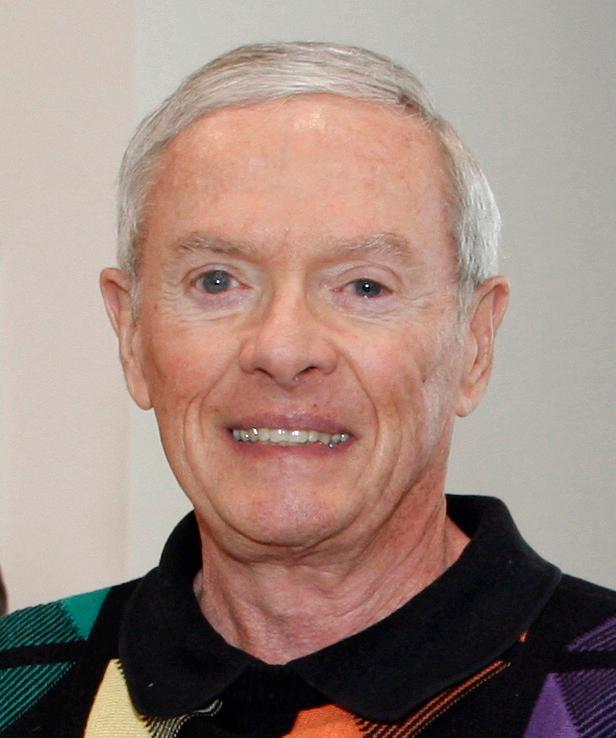
russellhonda.com
Now in its third generation of family leadership, Russell Chevrolet & Honda in North Little Rock has seen a lot of change, but its commitment to customer service remains the same.


Bob Russell, owner
Brett Russell, vice president
Locations across Arkansas and in Memphis sissyslogcabin.com
When Sissy Jones opened Sissy’s Log Cabin in a log cabin in Pine Bluff, it is doubtful that she knew what her humble shop would grow to become. Since its founding in 1970, Sissy’s Log Cabin has grown to include locations in Pine Bluff, Conway, Fort Smith, Jonesboro, the Heights and the Promenade in Little Rock, and Memphis, and the company has become the Mid-South’s largest family-owned and -operated jeweler.
Established in 1970, the story of Sissy’s Log Cabin began when Sissy Jones noticed a log cabin for sale as she was driving down U.S. 79 in Pine Bluff. Sissy, an avid collector of antiques, began renting the cabin for $50 a month and stocked it with pieces from her attic and home. Soon, word began to spread about the wonderful goods that could be found at Sissy’s Log Cabin. One hot summer day proved to be a turning point in the store’s history. Sissy and her son, Bill, sold a rolltop desk, which they delivered up two flights of stairs in an unair-conditioned building. Upon returning to the store that afternoon, Bill sold a 1-carat diamond without even breaking a sweat. Soon thereafter, the focus of the store shifted to jewelry and remains so today.
Joining Bill, now CEO, is grandson William Jones IV, who became president of the company in 2024, along with other members of the Jones family. Sissy’s Log Cabin has grown to be the pinnacle of jewelry and shopping.
The team at Sissy’s sells both modern and estate jewelry, timepieces, and more. With multiple graduate gemologists, as well as master jewelers and designers, Sissy’s is more than a retailer — it is a onestop shop for jewelry design, craftsmanship, repair and services that lasts the life of the jewelry.
The “Sissy’s Experience” of top-of-the-
line jewelry and second-to-none customer service is what makes shopping at Sissy’s Log Cabin special. The staff at Sissy’s strives to make everyone feel at home when they walk through the door of any of the company’s locations. Sissy’s Log Cabin is dedicated to serving its customers and strives to be the place that people trust for any jewelry needs.
With a passion for helping communities, Sissy’s Log Cabin gives to many charities each year. The company’s motto, “because life’s too short for ordinary jewelry,” rings true with every interaction, and the Jones family legacy of making each person feel extraordinary when they visit Sissy’s Log Cabin will continue for years to come.
The company is working on a new, state-of-theart location in the heart of Little Rock, and William was recently named to the 2024 class of Jewelers of America’s “20 Under 40,” a recognition that highlights young professionals who exhibit exemplary leadership skills and demonstrate commitment to advancing the future of jewelry retail.
“William has been a driving force behind the innovation and success at Sissy’s Log Cabin,” Bill said. “His role as a co-founder of the JewelLink by Jewelry Sales Academy shows his dedication to education and professional growth within the jewelry sales community.”
Year founded 1970
Years in Business 55 # of Employees
150
Years in LREA 8
Over 55 years, Sissy’s Log Cabin has grown from an antique store in Pine Bluff to a leading jeweler with locations across the state and in Memphis.


The Jones Family pictured at the Diamonds Do Good Awards Gala

What started as a Disney Destinations agency more than 15 years ago has grown to become 50 agents in 18 states planning thousands of trips for travelers to destinations around the world. Based in Little Rock, Small World Big Fun offers a wide range of travel experiences, from luxury river cruises, ocean cruises and European tours to tropical getaways, destination weddings and honeymoons.
Cindy Minor established Small World Big Fun with a singular purpose: creating meaningful and memorable experiences. She and her team of agents plan each journey with care and attention to detail, ensuring that every trip reflects the traveler’s vision. Minor especially enjoys river cruising, appreciating the way these journeys combine cultural immersion, comfort and ease. She takes pride in helping travelers discover the unique joys of exploring the world by river.
“I make so many decisions on a daily basis that with river cruising I just have to show up and enjoy,” she said.
With more than 20 years of experience, Minor began her career planning trips for friends and family, later becoming an independent contractor before founding Small World Big Fun after more than a decade of hands-on experience. Her best travel advice is to have a plan but leave room for the moments of joy and surprise that unfold along the way.
For Minor, helping others plan their travels is an adventure in itself. Whether it is a milestone anniversary, a river cruise through Europe or a long-awaited tropical escape, she sees each journey as an opportunity for connection, celebration, and discovery. She told AY About You in 2023 that she has learned a valuable lesson from the less glamorous aspects of travel: “We can spend hours and hours planning, but really, it’s out of our hands, kind of like life. Expect curveballs.”
She believes travel, especially international travel, broadens perspectives, builds empathy and offers lessons that stay with you long after the trip ends. Minor often recommends guided travel experiences where travelers are supported every step

of the way, from logistics and language to safety and cultural insight.
“A good travel agent is going to listen to your vision and deliver a travel experience that reflects your goals at the price that meets your needs,” Minor said. “The key to this is good communication with your travel agent. You want a trusted connection with your agent.”
Outside of work, Minor serves as membership experience advisor for the Tri Delta chapter at the University of Arkansas in Fayetteville. She describes Tri Delta as one of the most influential aspects of her life, providing a sense of belonging, countless opportunities for growth and many lifelong friendships. She also values helping develop and empower the next generation of women leaders.
Through Small World Big Fun, Minor continues to blend her expertise with a genuine love for travel, guiding her clients toward experiences that inspire, refresh and connect them with the world.

Years in Business 17 # of Employees 50
Years in LREA 3
Small World Big Fun was founded as a Disney Destinations agency and has since grown to assist clients with dream vacations of all kinds.
Cindy Minor (Photo by Lori Sparkman Photography)

Arkansas native and entrepreneur
Jeff Smith has spent his career blending family tradition with bold innovation.
As president and owner of Smith Family Funeral Homes, central Arkansas’ largest funeral home company, he continues a legacy that began when his grandfather founded the business in 1955. Today, Smith Family Funeral Homes remains proudly family owned and operated by the Smiths — now three generations strong.
When Jeff and his wife, Leslie, purchased the funeral homes from his parents in 2010, they brought a vision of growth and excellence. Under their leadership, the company grew by 500 percent in volume and revenue, expanding to nine locations, a cremation society, a cemetery, and three crematories.
That impressive growth and commitment to care have earned Smith Family Funeral Homes features in The Director, American Funeral Director, AY About You, Arkansas Money & Politics, and other publications. The company has also been named one of Arkansas’ best places to work — a testament to its strong culture and focus on people.
At the heart of Jeff’s leadership is an unwavering belief in superior customer service. He has built a company culture where families are treated with dignity, compassion and respect, values instilled in every team member.
“We’re not just here to plan funerals,” Jeff said. “We’re here to walk alongside families during one of the hardest times in their lives. That responsibility means everything to us.”
Jeff’s entrepreneurial spirit did not stop there. In 2020, he acquired Cyrus Life Insurance Co. and launched Cyrus Works, a company devoted to equipping
funeral homeowners with tools, services and strategies to thrive in a competitive industry.
One of Jeff’s most personal initiatives emerged after the loss of his father. Experiencing firsthand the overwhelming tasks families face after a funeral inspired him to create Aftercare by Smith, a service that helps guide families through the many practical matters that follow a loss. One customer, Velma Sorrows, shared her experience.
“We’ve used Smith Family Funeral Homes several times, and they’ve always taken such good care of us, but Aftercare by Smith is something special — it was like having a guide to help us through everything we didn’t even know we needed to handle,” Sorrows said. “It truly was a blessing during a hard time.”
Jeff’s story is one of vision, service and deeprooted values in Arkansas, leading his family’s legacy into the future.
Multiple locations across Arkansas smithfamilycares.com
Year founded 1955
Years in Business 70 # of Employees 120
Years in LREA 13
Jeff Smith is president of the Little Rock Executives’ Association and third-generation leader of Smith Family Funeral Homes.

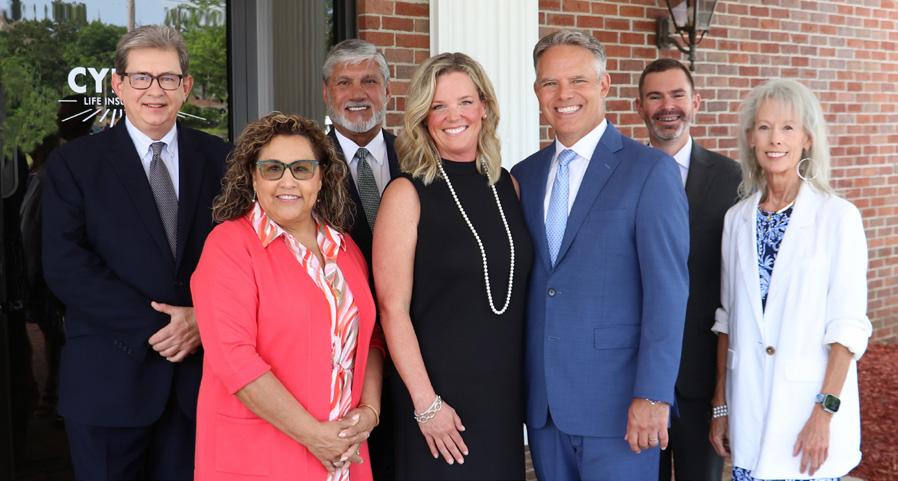


Leslie and Jeff Smith
600 Main St., Suite 300 North Little Rock 501-758-7443
taggarch.com
For 50 years, TAGGART Architects in North Little Rock has been working to create a better world one project at a time. Founded as Burt Taggart and Associates by Burt Taggart Jr. in 1975, what began as a passion for thoughtful, purposeful design has grown into an award-winning practice licensed in 32 states and with a reputation for shaping spaces that are focused, intentional and passionate.
Over the past five decades, TAGGART Architects has been privileged to design schools that foster learning, workplaces that drive innovation, civic buildings that connect communities and health care spaces that improve lives. With each project, the team has remained committed to the core principles of sustainability, innovation and a deep understanding of the people who inhabit the spaces the firm creates.
The firm has been a driving force behind the revitalization of the Argenta Arts District in downtown North Little Rock, where TAGGART Architects now calls home after moving in 2020 from its original location just off the city’s main retail hub.
From the roof of the firm’s new 600 Main building in Argenta, designed and built to serve as the company’s new headquarters, several iconic TAGGART projects can be seen — Argenta Plaza, the First Orion building, Simmons Bank Arena, Dickey-Stephens Park, the Arkansas Regional Innovation Hub and Argenta Contemporary Theatre.
The new North Little Rock Events Center, under construction nearby on the riverfront, is another TAGGART project.
Some of the firm’s signature projects outside Arkansas include the Cleveland Clinic Edwin Shaw Rehabilitation Hospital in Ohio and Select Medical Rehabilitation hospitals in St. Louis and Las Vegas. Inside the Natural State, work in

the health care arena includes numerous projects for Little Rock-based CHI St. Vincent Health System and Unity Health.
On the educational front, TAGGART has done extensive work with the North Little Rock School District, as well as the University of Central Arkansas in Conway and the Little Rock and North Little Rock campuses of the University of Arkansas-Pulaski Technical College.
As managing partners Bram Keahey, James Meyer and Brandon Ruhl reflect on the milestone anniversary, they look forward to continuing to elevate details above all else. They believe that exceptional service and great design are nonnegotiable and that details define how they plan, design and build spaces for communities.
The next 50 years have the potential for even greater possibilities. The built environment continues to evolve rapidly, shaped by advancements in technology, climate-conscious considerations and the ever-changing needs of the people whose interactions give life and purpose to every project. TAGGART Architects is prepared to embrace the challenges of the future with the same forwardthinking approach that has defined the firm over its history.

Year founded 1975
Years in Business 50 # of Employees 25 Years in LREA 7
Now celebrating its 50th anniversary, TAGGART Architects in North Little Rock was integral to the development of the Argenta Arts District.
Bram Keahey (Photo by Jamie Lee)


Advanced Physical Therapy was founded in 2006 with a focus on providing patient-centered, outcome-oriented and scientifically based treatment for general orthopedic problems, lymphatics, prenatal and postpartum conditions, and pelvic floor dysfunction for men, women and children of all ages. Over the almost two decades since, the company has expanded into more communities while retaining the same passion and dedication to patient wellness it started with.
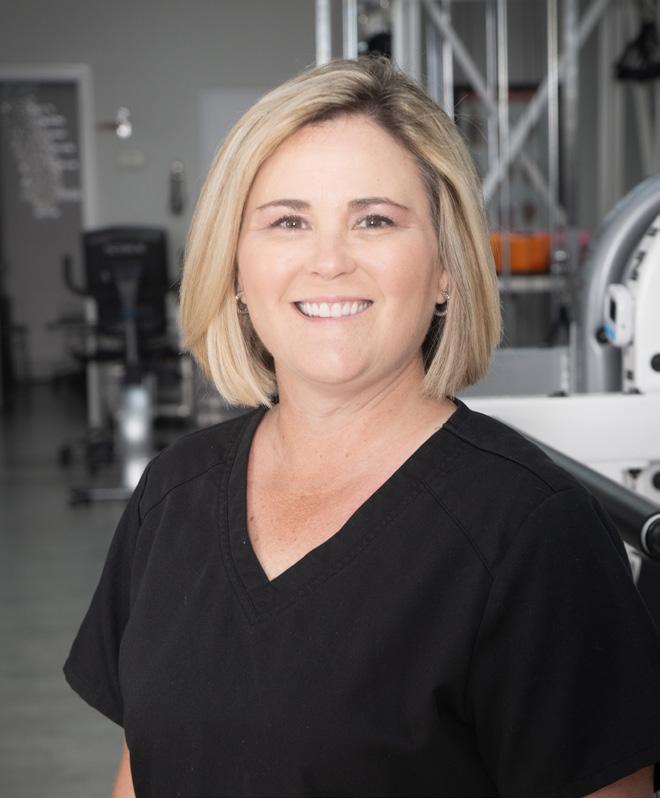
The practice is staffed by a growing team of experts with the highest credentials in physical and occupational therapy, personal training, and sport-specific therapy. With the addition of orthopedic and lymphatic therapy, the exceptional therapists at Advanced Physical Therapy advocate for holistic care, educating patients about their health and bodies, and providing best practices that lead to a healthy, pain-free life. Advanced Physical Therapy has multiple clinics in the central Arkansas area, but they all share one purpose: to make a positive impact on the health and well-being of each patient who walks through the doors.
Advanced Physical Therapy was also one of the first private, outpatient physical therapy clinics to provide pelvic health services to central Arkansas and to educate members of the community in all seasons of life that their issues are common but not normal. Patients may turn to Advanced Physical Therapy when they have a specific ailment, but when they leave, they are equipped with the tools and techniques needed to maintain both a healthy body and mind.
Family owned and operated for more than 38 years, Akel’s Carpet One Floor & Home excels in helping customer achieve their design goals while staying on budget.
With locations in Sherwood and Maumelle plus a new showroom on Rodney Parham Road in Little Rock, the business offers a full range of flooring options, including carpet, vinyl plank, hardwood and tile. The company also provides custom showers, cabinets, countertops and backsplashes.
Erica Akel has been with the company 10 years and serves as general manager of all three locations. The highly trained staff handles the remodeling process from start to finish, always striving for 100 percent client satisfaction. With up to 36 months of 0 percent financing and a quick turnaround time for projects, it is easy and affordable to turn one’s home dreams into reality.

Owner Richard Akel founded the company as a lumberyard in 1987 after an incredible tennis career that saw him win a title at the ATP Challenger level. He was inducted into the Arkansas Sports Hall of Fame in 2019 and has served as a mentor to many in the home remodeling business.
Erica Akel
LREA MEMBERS
Melissa Holland
LREA MEMBERS


Arkansas Industrial Roofing in Little Rock was founded in 1977 by the late Corbett Sanders III. His wife, Cathy Smith, now carries on the company’s tradition of excellence alongside general manager and lead roofing consultant Matthew Nicolo. Nicolo has been with the company since 2004, and he takes great pride in being able to continue giving customers the level of service and dedication they have come to expect over the decades.
“Our customers and prospective customers can call me directly on my cellphone anytime,” Nicolo said. “They know we answer quickly and respond rapidly to their needs.”

From servicing repairs to production work and prudent consulting, Arkansas Industrial Roofing takes its responsibility to its customers throughout Little Rock and Hot Springs seriously. The full-service roofing contractor is known for quality workmanship. Mistakes, though rare, are always rectified because Nicolo and the rest of the Arkansas Industrial Roofing team believe in doing right by every project, no matter what.
Nicolo also relishes the opportunity to serve his home state. The company makes it a point to give back to the community by supporting nonprofits and offering roofing services at value-oriented prices to organizations on tight budgets.
“If you don’t go to bed every night and wake up every day thinking about your company, your customers and your community, then you are failing in those areas,” Nicolo said. “I don’t do this for recognition. I do this for the pride I feel when we have done a job right.”
LREA MEMBERS

Since 2009, Arkansas Pro Wash has been the go-to for professional exterior cleaning among commercial real estate owners and property managers in Arkansas. Owners Chris and Katie Apple sold the toolshed out of their backyard to buy their first power washer and have since turned the company into a statewide leader that services properties all over the Natural State with expertise.
“We really believe that the work we do for our clients matters,” Chris said. “The work we do makes their job easier. It makes a difference for them.”
The company also sets itself apart with its three founding principles — serving its clients, employees and community well.
Whether cleaning restaurants, reviving concrete surfaces or washing the facades of office buildings, the Arkansas Pro Wash team has the capacity to get the job done — to the benefit of property owners, whose tenants, patrons and customers find themselves with a clean place to work, eat or visit.

Recently, the company expanded its services even further for busy clients. The company’s CAMPro services allow clients to rely on Arkansas Pro Wash for management of the overall property image, giving business owners one less thing to worry about. In addition to the master pressure washing services customers have come to know and expect, the company now offers services such as painting, parking lot maintenance and more.
Matthew Nicolo
Chris Apple
LREA MEMBERS


For Kenny Bell, there is no such thing as “right place, wrong time.” After attempting to buy his father’s plumbing company only to find him unwilling to give up the post, Bell decided to start his own operation in 2003. Bellco has since become a trusted name in central Arkansas plumbing.
“I think what sets me apart from other plumbing companies is that the customer gets me, the owner, every time,” Bell said. “I don’t have employees. Some may think this is worrisome, but I see it as a benefit to my customer. When they call, they get me. When the plumber shows up to bid a job, they get me. When it’s time for work to begin, they get me.”
Bell is a people person and enjoys forging deep, long-lasting relationships with his customers, many of whom he has been working with for nearly 30 years. He gets all of his clients through word of mouth and makes it a point to return every call, even if it is just to refer the caller to someone else.

“My vision for Bellco is to continue to take care of my customers as long as I’m able and they’ll have me,” Bell said. “At some point, I won’t want to lift water heaters into attics and crawl under houses, but I think it will be a good while before that happens.”
As one of the newer members of LREA, Bell has been thoroughly impressed by the support the association provides. He called the experience so far “eye opening” and said he receives several calls weekly either from fellow executives or their families or friends to whom he has been recommended.
LREA MEMBERS

Providing professional accounting services with a personal touch, Brown, Rogers & Co. in Little Rock works to meet clients at their individual level of understanding and need. BRC was founded in 1963 by Russell Brown, who was soon joined by Frazier Rogers.
In addition to tax preparation and accounting services, the firm’s services include traditional audit and review, benefit plan audits, comprehensive tax and estate planning, and business consultation.
BRC is currently led by Jim France, Mark Bennett, Joe Colford and Daniel Morrison, who have more than 150 years of combined experience, France and Bennett have experience with large national accounting firms. That variety and depth of experience ensures that whatever a client’s situation, someone at the firm has likely handled something similar before.
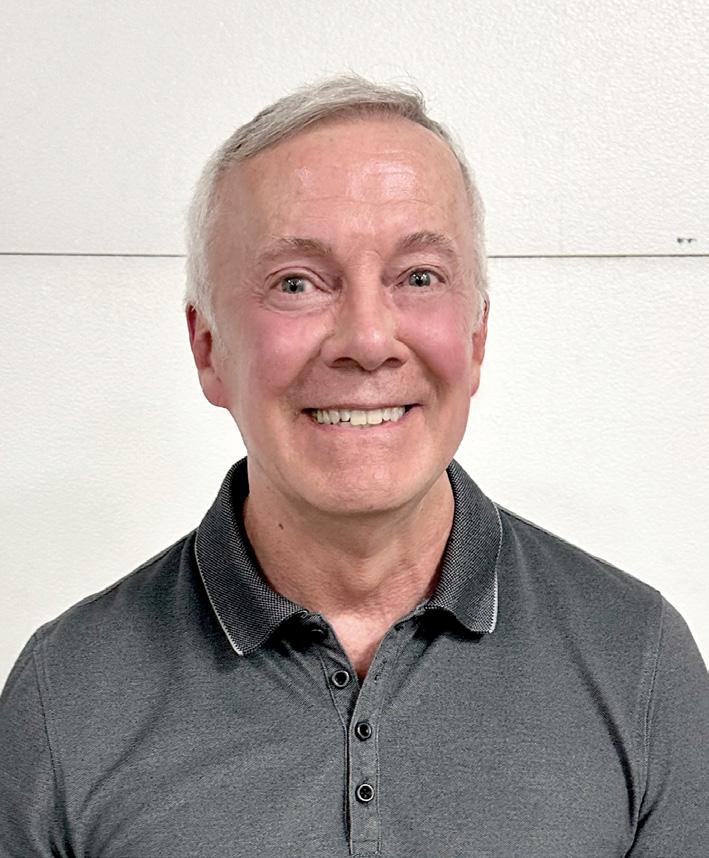
Staff at the firm are personally invested in the well-being of each client and enjoy helping small businesses succeed, whether it be through financial budgeting, loan assistance, purchasing or selling a business, or income tax planning.
Bennett has been the representative for BRC at the Little Rock Executives’ Association since 2000, a role previously filled by Rogers starting in 1974. Bennett said since his business grows mainly through referral, he works to provide exemplary service to his LREA clients making it easy for them to refer BRC to friends and family.
Kenny Bell
(Photo by DeWaine Duncan)
Mark Bennett
LREA MEMBERS


Since 1953, Citizens Bank has stood for more than just banking; it has stood for people. Under the leadership of Chairman and CEO Jeff Teague and President and Chief Lending Officer Vernon Scott, the bank remains rooted in Arkansas but built for the future.
What began as a small-town community bank has grown into a $1.5 billion financial institution that serves the entire state. Although the bank has expanded, its mission remains the same: to put people first — always.
Citizens Bank does not just serve communities but works to be an active part of them. From volunteering at schools to leading chamber events, the bank’s team members are invested where it counts, knowing that when communities thrive, the bank does too.

Driven by a belief that innovation should strengthen relationships rather than replace them, Citizens Bank continues to invest in people and progress. The bank has prioritized supporting local business and continues to expand its offerings to include advanced treasury management tools. Led by Senior Vice President and Director of Treasury Management Kathryn Pannell, the division delivers tailored, comprehensive solutions to meet evolving business needs. As part of its strategic growth and commitment, the bank recently launched Citizens Bank Mortgage to make homeownership more accessible for the communities it serves.
At Citizens Bank, great service starts with leaders who stay engaged. Many team members serve in key roles across the state, ensuring the bank stays attuned to the real needs of Arkansas. At Citizens Bank, leadership is not just a title but a responsibility to be carried with purpose.
LREA MEMBERS

Founded by Tom Ferstl in 1967, Little Rockbased Ferstl Valuation Services’ impressive 58-year history makes it one of the oldest fullservice appraisal firms in Arkansas and one of the largest. The scope of the business has expanded since Ferstl opened its doors, but one thing that has remained the same is the company’s commitment to trustworthiness.
“It is crucial to maintain the highest level of integrity so we can continue to preserve the trust of our clients and the public,” said owner J.T. Ferstl, who took over from his father in 2010.
Ferstl is a sought-after firm for everything from real estate appraisal to consulting and even litigation support. The highly qualified team of experts both in Arkansas and surrounding states serve as critical advisors in an ever-changing real estate industry. The firm is not afraid to tackle tough assignments, and most jobs are far from easy. Ferstl emphasized the company’s mission to be prepared “regardless of the complexities that might arise.”

Also setting Ferstl Valuation Services apart from the competition is Ferstl’s expertise in property law. A licensed attorney specializing in commercial and residential property litigation, Ferstl, along with the rest of his team, has the ideal combination of professional licenses and certifications to meet clients’ needs at one convenient location.
Ferstl’s company has earned a reputation in the real estate industry, and for good reason. It all comes back to loyalty, respect and pride in the services they provide.
Vernon Scott and Kathryn Pannell
J.T. Ferstl
LREA MEMBERS


When it comes to meeting regulatory requirements, business owners need the most accurate information possible as quickly as possible in order to make informed hiring decisions. Since opening in 2006, First Choice Drug Testing & Occupational Health Services in Little Rock has garnered a reputation for providing the highest quality service in the most efficient manner to the benefit of employers and employees alike.

Tim Zimmerman, president and owner, was brought in as a partner in 2010 with the goal of growing the company’s reach. His zeal for the business was evident, and he eventually bought out the original founders, later transforming First Choice into a true family affair by bringing his son, Adam, on board.
As a full-service third-party administrator, First Choice provides a wide range of services for businesses of all kinds, from Department of Transportation drug testing to tuberculosis skin tests and physical exams to meet a variety of industry needs.
In addition to physicals, First Choice offers blood work, audiograms, respirator fittings and more. Roughly 25 percent of services are performed at the client’s location, making it easier than ever for employers to access drug screening and occupational health services.
LREA MEMBERS
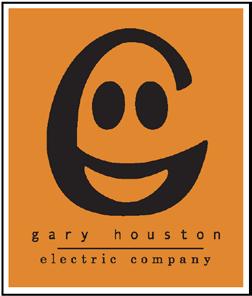

1922 W. Third St.
501-375-8330
garyhoustonelectric.com
When it comes to staying in business throughout the decades, customer service, quality workmanship and a strong team are nonnegotiables — and they are exactly what sets Gary Houston Electric Co. in Little Rock apart from the competition.
For 50 years, Gary Houston Electric Co. has been providing central Arkansas with affordable, quality and timely commercial and residential electrical contracting services. Known for its strong emphasis on customer satisfaction, Gary Houston offers a variety of services, from whole-home generator installs and preventative maintenance to USB-C outlet installation, landscape lighting and more.

Gary Houston followed in the footsteps of his late father to become an electrician and founded his company in 1975. President Keith Weeks has been with the company for more than 30 years, working his way up from apprentice to his current position, and he has continued to build upon the Gary Houston legacy of quality and trust. The company became an LREA member in 1984, and Weeks joined the association in 2004.
Gary Houston Electric is proud to provide its clients with quick and dedicated customer service. The company’s contractors are reliable and bonded, and the helpful support staff is available to fix any issue clients might face.
With friendly professionals like those at Gary Houston, the choice between do-ityourself and relying on expertise is a simple one, and that is why customers keep calling on Weeks and his team for all their electrical needs.
Adam, left, and Tim Zimmerman
Keith Weeks
LREA MEMBERS


For more than 50 years, Hugg & Hall has valued its membership at the Little Rock Executives’ Association. Charlie Hugg became the representative for Clarklift of Arkansas, which later became Hugg & Hall, in 1974 and is considered a founding member of LREA.
Robert Hall, vice president of Hugg & Hall, assumed Hugg’s position in 1994. He served as president of LREA from 2010 to 2011 and was awarded the organization’s Gene Smith Award in 2022.
“The members not only promote each other in the marketplace but also try to do as much business with each other that is practical,” Hall said. “The direct business, the referrals from other members, and, maybe most importantly, the relationships with other top-tier businesses and people has played a very important role in our longterm success.”


Charlie’s son, John, purchased the company with Hall in 1990, and the business has grown tremendously over the years since. With locations in four states, Hugg & Hall works to be the leading provider of materials and personnel handling products and services for the industrial and construction markets. Hugg & Hall will celebrate its 70th anniversary next year.
LREA MEMBERS
Put simply, Jackpot Interactive is how the web is won, according to founder and president Hoyt Plunkett Jr. He is a self-taught full-stack developer and started his career in downtown Little Rock in 1999. Plunkett opened Jackpot Interactive in 2012 with his former business partner, whom he bought out in 2015.
“The founding of the company was a leap of faith,” he said. “No money was brought to the table — only a couple of laptops and a whiteboard. I had the bills paid for that month, and I had $600 in the bank.”
Jackpot Interactive specializes in the creation, promotion and management of highly effective websites and social presences for its small business clients. The firm provides a variety of services its clients need to get and stay ahead, such as hosting, social media monitoring and engagement, content creation, digital advertising, and email newsletters.
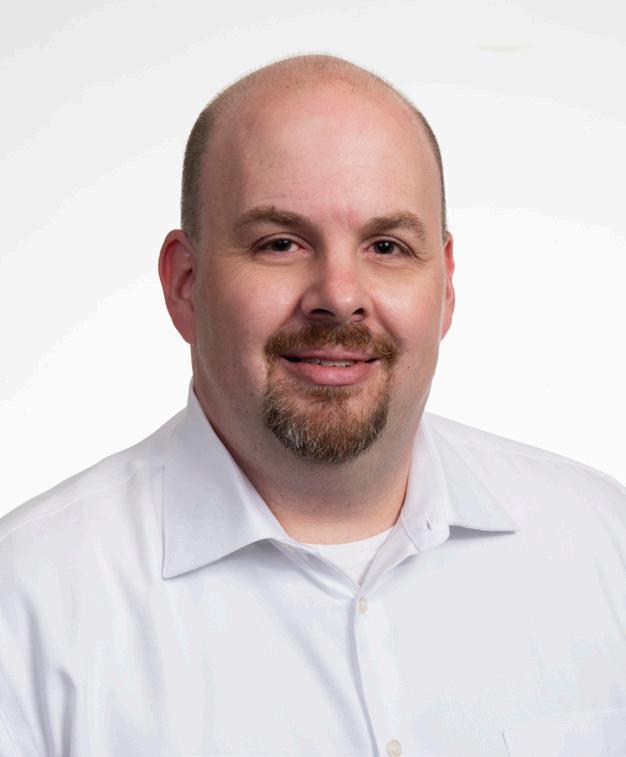
In addition to the quality of its technical offerings, Jackpot offers clients exclusivity by refusing to be hired by competitors. The firm has also added services related to reputation management and an Americans with Disabilities Act compliance solution, as well as embracing the use of artificial intelligence in its projects. Plunkett said the company will look to expand through acquisitions in the next few years.
“My business is an LREA success story,” he said. “Most members have a successful business, and then they are granted membership. Jackpot was granted membership in the group while in our first year of business. Since the beginning, we have had a number of clients that are LREA members, and we are constantly getting referrals from other members.”
Top: John Hugg, left, and Robert Hall
(Photo by Jamie Lee) Charlie Hugg in 1974
Hoyt Plunkett Jr.
LREA MEMBERS


LYears in Business
# of Employees
3,700 (U.S.), 70 (Arkansas)
Years in LREA
12001
LREA MEMBERS


amar Outdoor Advertising has more than 360,000 outdoor displays across the United States and the largest digital network in the country at more than 5,000 electronic displays. The company was founded in 1902 by J.M. Coe and Charles W. Lamar and became independent under its current name in Pensacola, Florida, in 1908, when the partners used a coin toss to divide their assets.
Lamar has since evolved from a small sign company into a leading outdoor advertising company with a national footprint, expanding its offerings from traditional billboards to include digital displays, transit advertising and highway logo signs. Growing through a combination of organic expansion and strategic acquisitions, Lamar is now the largest out-of-home advertising company in the U.S.

From ad copy production and placement to billboard maintenance, Lamar provides a fully integrated service that offers a competitive edge and boosts customer satisfaction. The company strategically concentrates its billboards in small and mid-size U.S. markets.
“Billboard advertising is much more affordable than people think, with a cost per thousand impressions that’s often lower than radio, TV or digital ads, making it one of the most cost-effective ways to reach thousands of people every day,” said Tom Gibbens, senior vice president and territory manager.
He added that being a member of the Little Rock Executives’ Association has provided a path for new personal and professional relationships, as well as enhancing the visibility of Lamar.
The beverage industry was forever changed in central Arkansas 25 years ago, when Jonathan Looney opened the doors of O’Looney’s Wine & Liquor in Little Rock. What started as a quaint wine shop is now a widely respected enterprise specializing in bespoke service and professionally curated inventory.
Looney is a Certified Specialist of Wine (Society of Wine Educators), a Certified Sommelier (International Sommelier Guild) and holds a Level 3 Award in Wines (Wine & Spirit Education Trust of London).

Through the shop’s Private Client Group, clients enjoy access to a team of passionate and professional beverage experts. Looney remains personally involved in guiding clients while his team supports everything from event planning and wine pairings to cellar acquisition advice and consulting. The team is also proud to support local charities and fellow businesses in the food and beverage space.
Looney and his team are committed to engaging guests in their personal wine journeys by fostering an environment of exceptional service and expert guidance. Whether a seasoned wine lover or a complete newcomer, guests find a warm, welcoming space where they feel supported and encouraged to explore.
The O’Looney’s team offers extensive resources and strong connections within the local food and beverage community, making them a valuable partner for exceptional event planning and support for corporate gatherings, weddings and private celebrations. Ultimately, the O’Looney’s mission is to deliver thoughtfully curated customer service and unwavering support at every step of the guest’s journey.
Tom Gibbens
Chuck Magill, from left, Desiree Lovell, Jonathan G. Looney, Bob Harrison and Jeff Franzetti


Parrish Delivery Services has met the delivery needs of its customers in Arkansas and surrounding areas for more than three decades. President Gary Parrish opened the doors to his company in 1991 with a main focus on the banking and medical industries. Since then, Parrish Delivery Services has maintained its unparalleled reputation in those fields while expanding to serve businesses in many other lines of work.
Parrish Delivery Services provides secure, ontime delivery services with thorough tracking records and proof of delivery to every location and destination. From medical specimens and bank transits to parts for field technicians, from mailroom management to warehouse fulfillment, clients rest assured thanks to the company’s commitment to transparency.
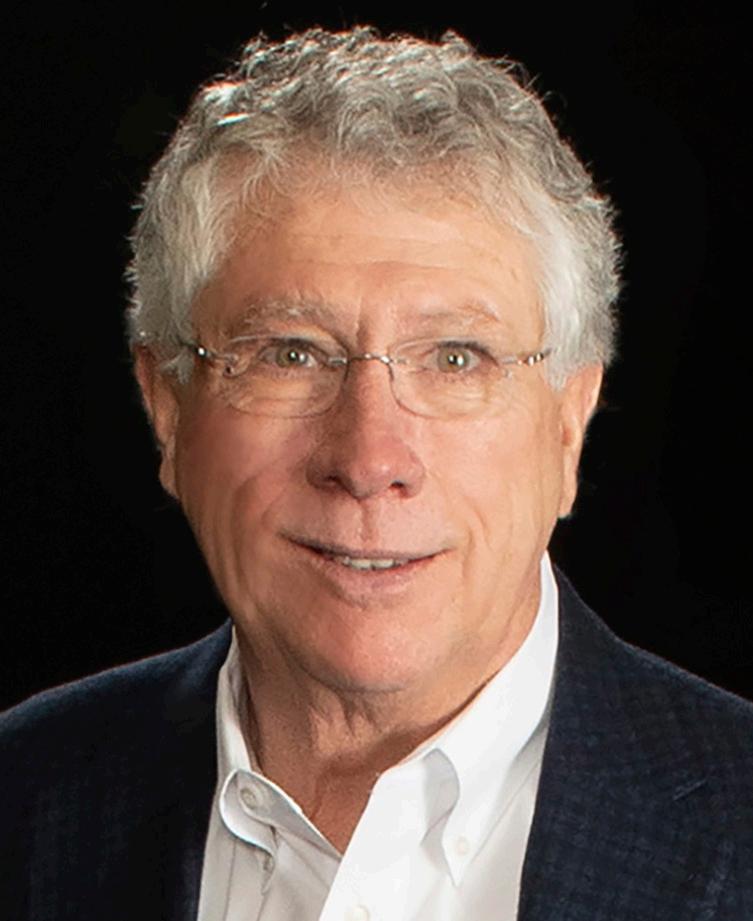
“Each of our delivery team members takes what we are moving very seriously,” he said. “The average length of service of our teammates is 20 years. We often say, especially on the medical end of our deliveries, that we treat each item moved as seriously as if it were for our child, parent or grandparent.”
Parrish and his team are proud to be the service of choice for so many important packages. He joined LREA in 1994 and has found the association to be an indispensable resource for growing his company. Fellow LREA members not only make up a portion of Parrish’s clientele; their referrals have also garnered the company new business.
“It has also given me a resource for good and reliable companies to do business with and refer to others,” Parrish said.
LREA MEMBERS


Tipton & Hurst is an iconic Arkansas brand that has grown into a true Little Rock institution. The floral and gift retail juggernaut launched in 1886, when Joseph B. Hurst and David Tipton partnered to create Tipton & Hurst.
Howard Hurst, company president, carries on his grandfather’s legacy of “guaranteed satisfaction.”
Following a childhood spent at the store, Howard became vice president after graduating with high honors from the University of Arkansas at Fayetteville in 1980. At 26, he assumed the position of president from his father, Joe Hurst. Hurst’s daughter, Josie, has also joined the company, representing the fourth generation in the family business.
Howard credits his hardworking, talented staff with helping enable the company’s unprecedented success. Tipton & Hurst has grown to include four branded locations and two stores operated under different brands. The company has a presence in Little Rock, North Little Rock, Conway and Pine Bluff, with a fifth location opening this fall in northwest Arkansas.

In addition, the company has its own wholesale warehouse and its robust internet sales division, giving Tipton & Hurst the capacity to fulfill orders nationally. The fullscale speciality retailer has a vast in-store and online selection of floral design, plants, gifts and decor that meet the Tipton & Hurst standards of excellence.
After nearly 140 years, Tipton & Hurst has been there for countless weddings, anniversaries and celebrations of life. However, the team stands ready for each next delivery, always striving to provide over-the-top service to its customers.
Gary Parrish
Howard Hurst
LREA MEMBERS


Established in 1984, Trivia Marketing in Little Rock has helped promote Arkansas companies for more than 40 years. Providing screen printing, embroidery and promotional items, Trivia Marketing has the largest showroom of its kind in Arkansas and is a preferred vendor for state and local business.
No project is too big or too small for the expert staff, who work to provide some of the fastest response times around. With more than 150 years of combined experience, staff aspire to provide the finest printing services in the area.
Scott Moritz, vice president, has been in the screen printing business since 1994 and studied for five years before starting professionally. He said he takes pride in mentoring the younger generation by providing them with technical training and enjoys seeing the smiles on customers’ faces after a job well done.

“If you can dream it up, Trivia Marketing is here to make it a reality,” he said. “We can do anything and everything.”
Moritz is ever focused on growing the business, which began with one automatic printer and one embroidery machine and now offers 31 heads of embroidery and three automatic print machines that run full time.
A member of the Little Rock Executives’ Association for nearly 10 years, he said the organization has allowed him to meet like-minded professionals who understand the group’s focus on reciprocity and has helped him grow as a person and a leader.






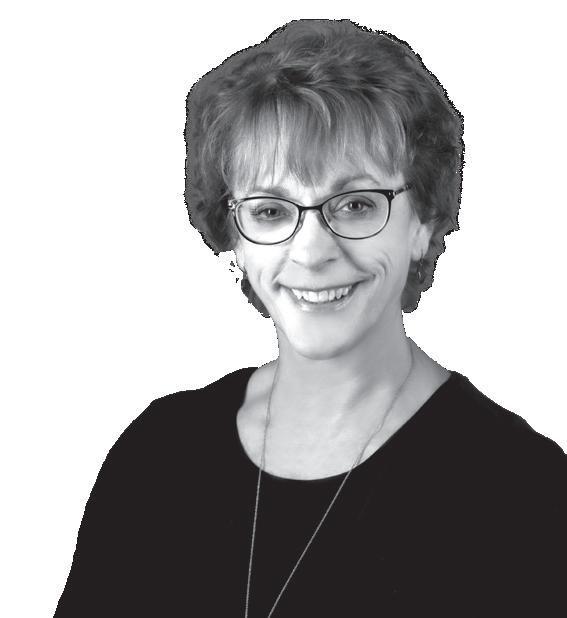
Scott Moritz

Très Magnifique
Former busser Louis Petit now a member of Arkansas food royalty
By Dwain Hebda
Photos by Lori Sparkman
ouis Petit’s rise to the highest echelon of the restaurant game has been an intoxicating dish of serendipity flavored by good fortune, salted by timing and simmered over the low, steady heat of hard work.
The co-owner of Little Rock’s Petit & Keet, a contemporary fine-dining restaurant that has fast become a regional favorite, Petit seemingly knows and is known by everybody, wearing easily the mantle of Arkansas’ godfather of fine dining. Sophisticated in dress and courtly of manners, the 83-year-old cut a European silver fox motif as he talked about the personal — nay, intimate — nature of succeeding in the food business.
“The definition of my job — I am a master of ceremonies, so to speak,” he said. “When you invite someone — a customer, a friend — to your home, what do you do? You think, ‘What do they like?’ One guest, she doesn’t eat meat, so you do fish or whatever. ‘What do they like to drink?’ She likes rose, or she doesn’t like wine, or he likes sweet wine. That’s how we prepare the menu.
“It’s the same thing managing the flow of a restaurant. You come in the door, I direct the traffic. I’m the one that chooses the rhythm of the evening so everything will be harmonious.”
Though many who meet him mistake him for French by his melodious accent, Petit was raised in Belgium, having never known his birth father. His stepfather was a baker, and Petit began his life in food working with dough.
local fine-dining establishment.
“Somehow I had, I don’t know, the luck, I guess, to push the door of the No. 1 restaurant in my hometown at the time,” he said. “I mean, three-star, very beautiful decor. I just introduced myself. I said, ‘I’m looking for a job. Do you need anybody?’ They say, ‘Yes, we need a busser,’ and that’s how I started. I was 15 years old, and imagine — since then, I’ve never stopped.”
was a far cry from waiters elsewhere, given the restaurant’s ranking. After completing a mandatory hitch in the military, which took him to South America and back, 19-year-old Petit returned and applied himself diligently to his craft.
“Now, today, we make a waiter in three days, but back then, there was much you had to learn,” he said. “I had to learn the menu, and the service was very — how would I say it? — classic. Everything came on the silver tray, and we would plate it in front of you. Like, you order a chicken, we brought the whole chicken and carved it at the table in that classic European style —the breast first, then the thigh and so on.

“I was raised very simply, so to speak, and I had to start to work at a very young age,” he said. “I was looking for a profession, and I tried being a baker like my stepfather. I didn’t like it. We had to get up at 3 o’clock in the morning, and it was very hot in those days. More importantly, the pay was terrible.
“A friend my age said, ‘I work in a restaurant, and I’m making so much money.’ It was, like, 10 times what I was doing, so I said, ‘Let me investigate.’”
Petit started to scout around looking for restaurant work, a quest that led him to a
Petit made an impression with his drive and willingness to learn, something that caught the eye of his mentor, who told him he needed to learn English if he was to advance his career.
“I went at night to school to learn English,” he said. “I started to go two days a week at night, so imagine: I asked if I could get two evenings and work every lunch, even on my day off. I was literally working seven days a week, but it was very important to me, and because of that, I could go to England, and I stayed nine months there.”
Being a waiter in his elite environment
“I’m not missing those days, don’t get me wrong, but it was good to learn the basics so well. You can always downgrade, so to speak, but you cannot upgrade.”
Another perk of being a waiter as opposed to kitchen staff was the ability to be in the orbit, however tangentially, of successful people. For the young Petit, seeing achievement up close helped stoke his ambitions.
“Watching the customers inspired me,” he said. “I told myself that’s a life I would like to have, you know? I saw these people — well dressed, well mannered — and I was fascinated.”
After 12 years in Belgium and a year in Switzerland, the young veteran got the opportunity for an adventure that rivaled anything the military had thrown at him. Answering an ad in a trade publication, he soon found himself heading to America.
“Little Rock, Arkansas — would you believe it?” he said. “Everybody made fun of me, of course, but the best thing that ever happened to me was to come to Little Rock.”
While Petit may have been a fish out of water, the restaurant that drew him to the Natural State, Jacques & Suzanne, felt like a familiar pond. Widely regarded as one of the turning points in modern Arkansas dining, the upscale French restaurant is credited as the first to bring a true European fine-dining experience to the capital city and state.
Petit, right, and Chef Paul Bash in the Jacques & Suzanne heyday. (Photo provided by Paul Bash)
The restaurant’s ownership knew the learning curve for customers would be steep as a result, so they brought in as much experienced European staff as they could, both in the kitchen and, in Petit’s case, as maitre d’. From the get-go, the staff was a close one, given the things shared in navigating a new country and culture thousands of miles from home.
“It was my first time in America, and the good part of it was the whole crew was on the same level as I was. I mean, we were all new to America,” he said. “The vision [of Jacques & Suzanne] was something that I admired. In 1975, think of putting a French restaurant in downtown Little Rock. That was a challenge, but we didn’t know it was a challenge, which was a blessing.
“For us, it was a cultural shock, first of all, but we absorbed that, and together, all we wanted and all we worked for was to earn the love and the trust from the people.”
For a decade, the restaurant on the 30th floor of the First National Bank Building — now the Regions Bank Building — did just that, delighting diners and redefining Arkansas cuisine forever. Petit was at the head of the column, directing, orchestrating and, most of all, developing staff to be attentive and helpful rather than aloof and snobbish, which was the critical yeast by which the restaurant grew its following, turning even neophytes into repeat customers.
“We didn’t come with a mean attitude, like we are up here in the trees and [the customers] are peasants, which is a bad approach that most European restaurants do, unfortunately,” he said. “Our job was to show them things, make them feel comfortable. People would think they needed to speak French to say the wine’s name or whatever. I never wanted to embarrass anybody. I would say, ‘Just point to the number.’ This is what my job was all about.”
Taking a more customer-centered approach took nothing away from the overall experience of Jacques & Suzanne. Petit was as exacting in his expectations of staff as he was gracious in his dealings with patrons.
“The definition of my job — I am a master of ceremonies, so to speak.
When you invite someone — a customer, a friend — to your home, what do you do? You think, ‘What do they like?’ One guest, she doesn’t eat meat, so you do fish or whatever.
‘What do they like to drink?’ She likes rose, or she doesn’t like wine, or he likes sweet wine. That’s how we prepare the menu. It’s the same thing managing the flow of a restaurant.
You come in the door, I direct the traffic. I’m the one that chooses the rhythm of the evening so everything will be harmonious.”
restaurant is always a teamwork. People give me all the credit, but it’s not true. I was the most visible of them, but [Executive Chef] Paul Bash, the kitchen, the bartender — everybody’s so important. It’s not just one person.”
Shortly after opening the restaurant, its founders, Jacques and Suzanne Tritten, announced they were heading back to their native Switzerland, giving Petit another golden opportunity.
“Suzanne wanted to go back to Switzerland, and the bank, they’d just invested a million dollars,” he said. “They could not go to the stockholders and say, ‘Listen, we just lost everything. They’re leaving.’
“So what do we do? Me and Paul Bash and Ed Moore, we get this opportunity to take over as owners. It was wonderful, of course, but to sign the papers, your heart is beating, you know? It was an amazing opportunity. It was one of those defining moments in life that changes you forever.”
When Jacques & Suzanne finally ended with a black-tie bang Jan. 3, 1986, the ripple effects of the restaurant would roll through generations of the Arkansas restaurant industry. Not only did it carve a niche for fine dining in the state but Jacques & Suzanne remains to this day the blueprint for how it is done, its lessons reaffirmed by the restaurants opened by former staff once the famed French mother ship closed its doors.
“Good service is when you don’t realize that you’ve been served. It’s unobtrusive,” he said. “That’s what we look for. We look for you to have a good experience. We always stressed the basics. You go to the table. You check the food in one glance — the bread, the water and, in those days, since you were allowed to smoke, clean ashtrays. We taught how to replace a full ashtray with a clean ashtray in one motion, and when you do that, you can let the customers enjoy their conversation without interruption.
“It’s a teamwork. The success of a
“Whatever the occasion, we were the place to celebrate with your wife, celebrate an anniversary, marriage, having a child,” he said.
“You could relax and have fun because that’s the idea.
“We didn’t ever compromise on the quality, but the recipes, we would adjust to customers’ tastes and what people already liked to eat. Like for instance, we had a catfish dish where we took the fish, ground it, mixed it with heavy cream, pepper and salt, and cooked it in a double boiler. We showed catfish could be a very fancy dish, so to speak.”
Petit would go on to found other restaurants in the wake of Jacques &
Suzanne’s closing, both in Arkansas and later in Florida, and with each one, he refined his processes to keep up with the times. Then one evening in 2013, he had a visit from a longtime friend and fellow restaurant entrepreneur extraordinaire Jim Keet. The duo shared a glass or two of good wine, which fueled the idea of opening a restaurant together.
That conversation became Petit & Keet, which, for Petit himself, was and still remains a reinvigorating project.
“The restaurant business is extremely, I would I say, sensual,” he said. “When you conceive a restaurant, you think about things like the lighting, the music. If the lighting isn’t perfect, people can’t read the menu. It’s annoying. My partner, Jim Keet, is amazing for that. He’s such a perfectionist, whether it is the perfect decor, the perfect ambiance or the perfect recipes.
“We also want you, the customer, to dress the way you want. With Jacques & Suzanne, we had to fit the image because the bank wanted to have this picture of a fancy French restaurant, which is what it was, but this is an evolution all the time, and now we have no dress code. You come with jeans and a T-shirt, it’s fine. Nobody’s going to look down on you.”
Today, Petit continues to watch the industry that has defined his career change and evolve to meet modern audiences, from farm to table to the rise of the celebrity chef.
“In the old days, the chefs were in the kitchen. They were not seen,” he said. “Usually, they were introverted people. I mean, the chef could be polite but barely. The cooks used to hate us waiters because we made five times the money. They all say, ‘All you are is a beggar with a bow tie. That’s all, with your big smile and your fancy pepper mill.’
“Now the chefs suddenly became the stars, you know, and suddenly, you have a chef in an open restaurant layout because people want to see them.”
As much fun as Petit is having in Little Rock, he hinted there may yet be at least one more concept left in him to launch, although his adult children, who run his restaurants in Florida, think he is out of his mind to consider it. Talking about it, he radiated satisfaction at what he has built, revealing undertones of the ambition that whispers to him, alluringly, that he can do it all again.
“I was 34 when I first came to Arkansas, and I was in my 70s when we decided to do [Petit & Keet],” he said. “When I had to tell my children what I was doing, they said, ‘Dad, are you serious? I mean, come on. You’re going to drive 600 miles to go to your part-time job?’ Well, yes, because I was that happy I’m coming back, you know, and to show that I can still wear the crown.”
After decades greeting and serving, Petit has reached iconic status. On any given night in the restaurant, he can be found doing what he does best and loving every minute of it, especially in Arkansas, the place that gave him his start in America.
“The real reason I wanted to do Petit & Keet is I love Arkansas,” he said. “I love Little Rock because it has been so good to me over the years. Doing this was like giving back. It was a challenge, of course. Every time I open a restaurant, I have the butterflies. What I don’t know is how am I going to be perceived? Am I still relevant?
“I’m happy. I’m so grateful because of the restaurant business. Arkansas, especially, made me — I don’t want to say I’m rich — but comfortable in life. People still, thank God, remember me and love me after all these years, and for me, it’s a good feeling.”

“I’m happy. I’m so grateful because of the restaurant business. Arkansas, especially, made me — I don’t want to say I’m rich — but comfortable in life. People still, thank God, remember me and love me after all these years, and for me, it’s a good feeling.”
Income Up , Receipts Down on the Farm
UA official talks row crops, legislation, tariffs and more



By Mark Carter
For Arkansas row crop farmers, 2025 is shaping up to be a good news/bad news — but mostly bad news — kind of year.
Arkansas net farm income is up 22 percent (to $681 million) from last year, but as one University of Arkansas official told Arkansas Money & Politics, there is a flip side — crop receipts are down $466 million.
Hunter Biram, assistant professor and extension agricultural analyst at the University of Arkansas Division of Agriculture Department of Agricultural Economics and Agribusiness and associate director of the Southern Risk Management Education Center in Little Rock, said the increases come with a catch.
“A key factor behind the rise in income is a $670 million increase in government payments, which include both supplemental and ad hoc disaster assistance — most notably, about
$286 million from the Emergency Commodity Assistance Program — and the remainder likely coming from other funds appropriated for disaster relief, including both for livestock and crops,” Biram said.
Livestock receipts are up $50 million from last year, which Biram noted represents only a modest gain. Biram spoke with AMP about the state of the 2025 agricultural season in Arkansas, including a look at how the state has been affected by weather, recent legislation and tariffs, as well as farmers’ biggest concerns heading into the back half of the ’25 season.

Hunter Biram
He also provided an update on the state’s “big three” row crops: rice, for which the state leads the nation, producing roughly half of the U.S. total; soybeans (No. 2 in U.S.); and cotton (No. 3). Arkansas is also a top producer of corn, winter wheat and grain sorghum.
AMP: How are the state’s row crops doing currently?
Biram: Corn is seeing a 31 percent yearover-year decline in crop receipts, defined as total production multiplied by the state-average price received for corn. Corn receipts are also projected to decline 42 percent from 2023.

Cotton is experiencing a 1 percent year-over-year decline in crop receipts. Cotton receipts are also projected to decline 11 percent from 2023.
Rice is at an 8 percent year-over-year decline in crop receipts and no change from 2023, and soybeans are seeing a 6 percent year-over-year decline in crop receipts, with soybean receipts projected to decline 25 percent from 2023.
Declines are mostly driven by lower crop prices. There has been a 17 percent decline in corn prices over the past two years, while soybean prices have declined 20 percent over the same period.
Soybeans make up the largest portion of receipts at $1.67 billion, with rice closely following at $1.49 billion. The cotton and corn crops are valued at $619 million and $436 million, respectively.
Corn and soybeans have seen the most significant declines in crop receipts since the record farm income set in 2022, with declines of 48 percent and 31 percent, respectively.
AMP: How has Arkansas been affected, or how might it be, by tariffs and the One Big Beautiful Bill?
Biram: The crop markets have not been impacted by this round of tariffs to the extent they were impacted by the first round. More specifically, the soybean market took the greatest hit when China retaliated to the first Trump administration’s tariffs on Chinese goods. The November soybean-futures price declined by 14 percent in 2018 compared to the average decline of 3 percent within-season decline, and roughly $23 million was distributed through ad hoc federal government disaster assistance from the [U.S. Department of Agriculture].
Fertilizers and crop protection products like herbicides are primarily sourced from Canada, China, India and the European Union. We import about 85 percent of potash — potassium — from Canada via rail; 30 percent of nitrogen fertilizer is imported from Mexico; and most all of our phosphorus imports have come from Morocco and Peru. About 70 percent of all globalcrop protection imported to the U.S. comes from China.
The One Big Beautiful Bill provides the largest increase in
the farm safety net since 2002, with $67 billion over 10 years added to the farm safety net. The farm safety net includes commodity programs and crop insurance. The target price program, price loss coverage, now has higher statutory reference prices, which ensure higher price floors for major commodities produced in the U.S.
There were increases of between 10 percent and 20 percent to the statutory reference prices for crops, including corn, cotton, rice, soybeans and wheat. There is an inflation-adjustment factor to kick in starting in the 2031 crop year, which is designed to raise SRPs with inflation. Crop insurance premiums will be reduced anywhere from 3 percent to 5 percent depending on the level of coverage, which could equate to a few dollars per acre and thousands of dollars per farm. Payment limits have been increased from $125,000 to $150,000 per qualified passthrough entity, which includes general partnerships, S corporations and LLCs.
AMP: What is left to do with the Farm Bill?
Biram: While the bulk of the farm programs were updated in the reconciliation package, the Conservation Reserve Program and other “orphan” programs will need to be included in what House Ag Committee Chair GT Thompson [R-Pennsylvania] has called a “skinny” farm bill, which will run about $8 billion. While it would only require simple majorities in the House and Senate like the reconciliation package, it would be subject to filibuster rules, which require a 60-vote threshold to invoke cloture. Reconciliation allowed passage to bypass Senate filibuster rules but fell under the Byrd Rule, [a procedural mechanism designed to prevent extraneous matters from being included in budget reconciliation legislation].
AMP: What is a typical Arkansas row crop farmer’s biggest worry right now?
Biram: Put simply: making it through this year both financially and mentally. While the 2026 crop year is on the horizon, many farmers are just hoping to make it through the 2025 crop year. As if depressed commodity prices and tariffs did not create enough uncertainty, there was a major flood event that occurred in April and dropped three months’ worth of rain in three days and resulted in nearly $100 million in crop losses.
Arkansas is the No. 2 soybeans producer in the U.S. (UADA)
Flexion Point excels in fractional staffing market A WHOLE NEW PERSPECTIVE
By Justina Parker / Photos provided by Flexion Point
In 2023, Stuart McLendon recognized a critical unmet need within the corporate marketplace. He dreamed of a way to empower small and mid-sized businesses by addressing their labor challenges and providing specialized expertise without the overhead of full-time hires.
What began as a series of meetings and one employee has become Flexion Point, a thriving business with more than a dozen skilled professionals. Flexion Point focuses on offering accounting, finance and human resources support services as a cost-effective solution for businesses needing area expertise without the commitment of a full-time staff.
According to McLendon, the idea for Flexion Point came from an observation during his professional career.
“Many companies are already offering similar fractional services in [information technology] and marketing,” he said, “but during my time at DYNE Hospitality Group, I recognized a significant void for these positions within the accounting, finance and HR sectors.”
While still serving as a managing partner at DYNE, McLendon felt led to establish his own company to address that pressing need across the state and beyond. He said many business executives and hiring managers can relate to the difficulty of finding qualified employees, especially with the rise of baby boomer retirements.
“There are only three people for every five jobs available,” he said, adding that the severe talent shortage impacting various
industries nationwide not only creates a need for high-level accounting, finance or HR expertise but has driven up the cost of acquiring such employees.
The company also fills a skills gap for clients, since many small-business owners, while skilled and passionate about their services, lack specialized knowledge in areas such as accounting or human resources.
“By partnering with one of our employees who possess highlevel experience in their area of focus, it allows companies the opportunity to identify gaps within their business and utilize our support on an as-needed basis,” he said. “This enables them to scale their support up or down based on current demands.”

Flexion Point’s commitment to delivering customized solutions is displayed through the range of services they provide to client companies across various industries. McLendon proudly shared several success stories that show the company understands their services are not a one-size-fits-all model.
“We recently collaborated with a rapidly expanding small business that desperately needed a fractional [chief financial officer] to bring order to their finances,” he said. “The CEO had a strong growth mindset but didn’t have the time to execute the financial organization to help his business grow. I met with him one-on-one monthly, dedicating four hours a week to their needs.
“In just three months, we organized and caught up their books, creating clear
Stuart McLendon, CEO and president at Flexion Point

financial statements and processes. Ultimately, we helped them hire a full-time accounting professional to maintain the finances and plan for their company’s growth.”
Another client was a middle-market company undergoing a significant acquisition with plans to consolidate three factories into one centralized location. The transition presented demands on the internal team, requiring additional outside knowledge.
“We were able to provide crucial support that gave their existing team the necessary bandwidth during the process,” McLendon said. “We helped them revise their workload and supplied a fractional CFO for eight months during the critical transition period to their new financial leadership while ensuring accurate reporting throughout the change.
diverse sectors, including retail, restaurants, medical fields, mineral rights, construction and more.”
The company’s valuable combination of expertise and vision has led Flexion Point to surpass its growth goals thanks to a client-centric approach. Taking the time to understand a company’s specific needs, challenges and aspirations allows company personnel to design and develop a “back office” infrastructure that is tailored to the individual business.
“Many times, we’ve found significant savings opportunities for our clients that more than cover the cost of our services,” McLendon said.

While Flexion Point’s services are primarily in central Arkansas, approximately one-third of clients are located out of state. McLendon said recent acceptance of remote work arrangements has greatly increased the company’s potential for expansion.
“When business owners stop fixating on a particular ‘box’ their employees have to fit into — like a traditional 9-to5 office presence — they can truly find exceptional talent,” he
Taking the time to understand a company’s specific needs, challenges and aspirations allows company personnel to design and develop a “back office” infrastructure that is tailored to the individual business.
“We also assisted with their accounts payable system, streamlining workflows and improving efficiency. In addition, we provided a human resources director to help with the transition of their teams, research new benefits packages and serve as a guide throughout the process.”
The company’s wide-ranging stable of business talent ensures clients receive support from professionals familiar with their industry’s unique challenges and growth opportunities. Whether a client needs strategic financial planning, efficient HR policy development or accounting oversight, Flexion Point provides access to the right skill set.
“Flexion Point is bringing top-tier talent to the table,” McLendon said. “Our employees have extensive experience across
said. “People are actively seeking more flexibility post-COVID[-19] and now have more options in how and where they work, a reality that progressive companies are increasingly recognizing and embracing. I’ve never met someone who cared if their taxes were completed at 8 a.m. in the office or at 9 p.m. at night as long as they are done correctly and on time.
“We are committed to building strong, enduring relationships with our customers, and we leverage that culture to foster our business growth. There are people that have a problem, and we’re there to solve it. If you do a good job helping people, revenue takes care of itself.”
Elliott Chester, fractional CFO-consultant

Blue Truck and Junk-It founder thrives in the startup world
If it is not the hottest day of the year, it will certainly go on to earn honorable mention.
Chuck Fiser bounds into the afternoon light and heat from the darkened and only slightly cooler depths of the warehouse at Blue Truck in Little Rock, the final-mile logistics and distribution company he founded in 2012. Dressed in shorts and a polo shirt, he guides his visitor through the main office, where the air conditioner has chosen this day to go wonky, leading Fiser to send most of the employees home.
However, Angelica Barnard, scheduling director, and co-owner Emily Beckemeyer are still at their desks, fighting the heat with fans. That is because Blue Truck is a 24-hour, seven-days-a-week operation, and the deliveries are not going to schedule themselves. The malfunctioning AC may be an inconvenience, but even when such things happen, Fiser, 51, can simply chalk it up to life in logistics.
“One of the things that makes it enjoyable is every day is different,” he said.
Following a brief conversation, Fiser leads his guest on a tour of the Blue Truck warehouse, stopping briefly at a bay door to point across the way at the Imperial Ice
Opportunity KNOCKS,
Chuck Fiser ANSWERS
operation purchased 15 years ago and sold five years ago to his brother-in-law Mark Enderlin, who was already running it. After a slightly longing look at the icehouse, Fiser and guest move deeper into the muggy warehouse — packed with big-ticket items such as exercise equipment, generators, furniture and mattresses — before heading back into the screeching heat to walk the gravel lot of Junk-It, the roll-off dumpster service Fiser started in 2006.
“WE CAN SERVICE YOU WITHIN 24 HOURS ANYWHERE IN THE STATE.”
—
CHUCK FISER FOUNDER OF BLUE TRUCK AND JUNK-IT
Prior to setting up shop — or shops, one should say — on the Imperial Ice site in southwest Little Rock, Fiser flirted with a career in medicine, worked in the software industry and ran a residential construction
By Todd Traub
company. Somewhere along the way, he began to display his signature skill, a nose for opportunity that he coupled with a passion for building businesses.
“I’m kind of a serial junkie startup guy,” Fiser said.

Junk-It has 30 employees, 18 trucks, 750 dumpsters and multiple locations across the state. (Photos provided by Blue Truck)
SEEING AND DOING
Fiser comes from a family of medical people, which includes his late father, Robert, who died 14 years ago due to complications from Parkinson’s disease. As chairman of pediatrics, Robert Fiser was instrumental in helping Arkansas Children’s grow from a small hospital into a national health care entity.
“He loved the growth of it. … He built a team of superstar people and just went with it,” Chuck Fiser said.
Robert met his wife, Charlotte, at
‘I don’t think your personality suits medicine,’” Chuck said.
He may have been dissuaded from going into his father’s career field, but in a way, Robert Fiser handed down the entrepreneurial spirit to his son. One man helped build up a renowned hospital, while the other went to work building companies.
Chuck took a software job in Dallas immediately after college, and over five years, he traveled the U.S. and Canada, keeping his eyes and ears open and
fun,” Fiser said.
His next business, Junk-It, evolved from Fiser Construction’s constant need for dumpsters.
“It’s kind of one of those things where I got tired of dealing with other people’s dumpsters,” said Fiser, who went out and bought 10 of his own.
The inspiration to buy Imperial Ice came from Fiser’s observations of another such company making deliveries and the belief he could do it better.
Fiser operated his construction

Hendrix College in Conway and moved to California for a medical fellowship. Chuck was born in Los Angeles, but the family returned to Arkansas, where Chuck graduated from Little Rock’s Pulaski Academy. Intending to enter the family business of medicine, he earned a bachelor’s degree in microbiology at the University of Arkansas in Fayetteville.
He was planning to go on to medical school, but someone who would know best advised him against it.
“My dad gave me advice and said,
learning the ins and outs of capitalism.
“I saw how businesses ran,” he said.
After his father fell ill and Fiser married his wife, Anita, he moved back to Little Rock, where the couple began the commercial contracting business Fiser Construction. He had taken no business classes, he did not know accounting, and he admits today he had no idea what a profit and loss was — but he had realized his calling.
“I had planned to go to medical school, but I decided business was a lot more
business and Junk-It simultaneously, while Enderlin ran Imperial Ice, which then provided the inspiration for Blue Truck. People had seen the Imperial Ice trucks out and about and were inquiring about opportunities for hauling.
“At the time we’re doing Junk-It and by the time we’re doing Ice, people started calling us, and they saw our ice trucks, and they began asking if they could haul some dry freight,” Fiser said.
Fiser bought a couple of box trucks, and Blue Truck took off just as online
shopping was becoming popular. As the companies grew, offices and warehouses were built next to the Imperial Ice facility.
“These businesses I’ve built, it’s all based on when I see an opportunity,” Fiser said. “I see an opportunity, I observe it, and that triggers me to start these things.”
LOGGING ON
Junk-It operates statewide, servicing residential, commercial and industrial companies that need trash-management solutions. The company has 30 employees, 18 trucks, 750 dumpsters, and additional locations in Springdale and Jonesboro, as well as another planned for Texarkana. Future expansion is projected for the southeast all the way to Florida.
Blue Truck operates a dozen 26-foot box trucks and has 30 employees and a 50,000-square-foot warehouse where it receives and stores household items from online retailers prior to distribution. The company operates within a 450-mile radius of Little Rock, which includes all adjacent states.
Delivery time is no more than two days, and depending on the service customers select, the pair of Blue Truck drivers that make each delivery set up and assemble delivered items in homes. Blue Truck’s competitors are some of the larger online retailers, including Amazon and Walmart, but the smaller operation has shown it is

able to coexist.
“We compete with those guys, but then we’re small enough to be very customizable, very hands on,” Fiser said. “We can service you within 24 hours anywhere in the state.”
The explosion of online shopping, fueled by the COVID-19 pandemic, left Blue Truck well positioned. Fiser was especially surprised by the number of mattresses being ordered. Demand was so great that two years before the pandemic, he started his own vacuumsealed bed-in-a-box company, Sillow.

The North Carolina manufacturer that Sillow used did not recover from the COVID-19 downturn, but the mattress sales convinced Fiser that Blue Truck was on the right track.
“If people are buying mattresses online, they’re going to be buying bulk items online,” Fiser said.
As busy as he keeps himself, Fiser and Anita also found time to have three children. Avery is a chemical engineer; Charlie is a business major and incoming senior at Southern Methodist University in Texas, where he plays quarterback for the Mustangs; and Andrew is an incoming sophomore at SMU who also studies business.
Fiser said chasing the children around was one of the things that kept him busy when not working, and now that the kids are all older, he enjoys exercise and traveling with Anita.
It is entirely possible, maybe as soon as the next time the couple goes for a walk, that Fiser, with his antenna up for opportunities, will see something he thinks he can do better. If that happens, he is more than likely to jump at the chance.
“I love the startup,” he said. “I absolutely love the thrill of starting things up.”

GOLF 4 A CAUSE
PINNACLE HILLS COUNTRY CLUB
ROGERS, AR
CODY MATHEWS, CHAIR




GOLF SCRAMBLE
PLEASANT VALLEY COUNTRY CLUB
LITTLE ROCK, AR
MARCY WOODS-ROBINSON, CHAIR






Neil Denman
Deron K. Hamilton
A Night in Vegas slated for Sept. 19
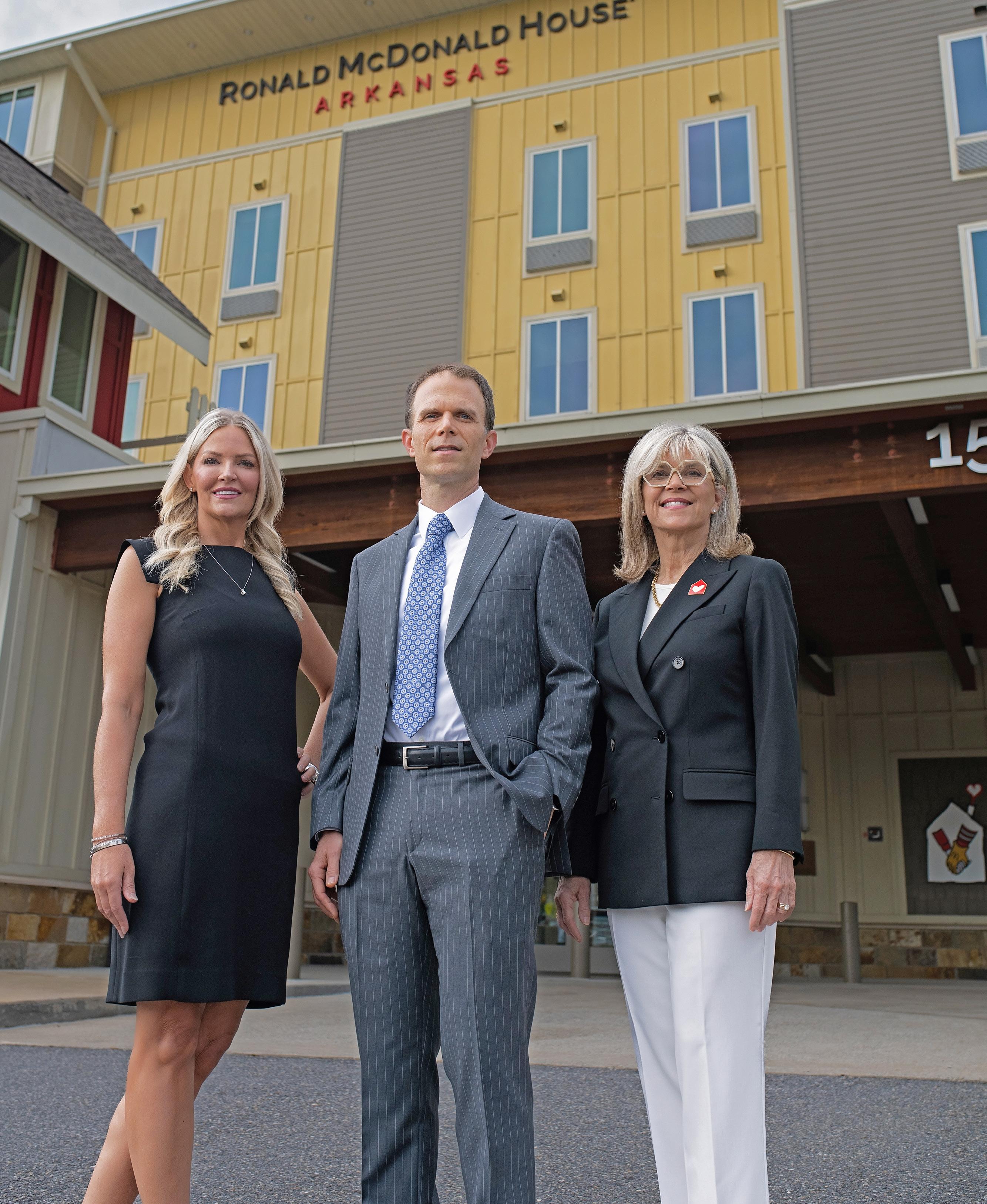
By Dwain Hebda
Photos by Jamie Lee
Stephanie Shine, co-founder of Arkansas Talent Group in Little Rock, from left, Brent Beaulieu, chief financial officer at Baptist Health, and Janell Mason, CEO of Ronald McDonald House Charities of Arkansas & North Louisiana, are working together to organize an unforgettable evening to support a great cause.
Janell Mason has seen a little bit of everything in her role as CEO of Ronald McDonald House Charities of Arkansas & North Louisiana. Some of it is celebratory, such as seeing the faces of a family who get to take a beloved child home from the hospital.
Some of it is somber, such as the gut punch of hearing the news a child has succumbed to his or her condition. Some of it is terrifying, nothing more so than the awful period in 2020 when she closed Ronald McDonald House briefly due to the COVID-19 pandemic, knowing helplessly that families in need would be without a critical resource.
Whatever her career brings her on any given day, especially after a decade at the helm, few things still surprise her — that is, until a recent encounter with a parent who shed new light on the critical nature of Ronald McDonald House’s work providing low- and nocost lodging and meals to families with critically ill children.
“I’ll tell you a story: I met a family from northwest Arkansas at one of our fundraisers who’d stayed with us in the Ronald McDonald Family Room at [the University of Arkansas for Medical Sciences in Little Rock]. They stayed with us for 159 days,” Mason said. “I told her, ‘Gosh, you know, when you were there for that long, I’m surprised you didn’t want to move to the [Ronald McDonald] house, which is five minutes away.’
“What she told me was how important it was to be steps away from their child. She told me about being there when the medical teams are knocking on your door saying, ‘Be here now. We need you.’ She told me about making medical decisions in your pajamas.”
Mason, who feels a protective kinship with every family that passes through Ronald McDonald House’s doors, fell silent for a moment.
“This mom gave me a whole new perspective,” she said at last. “I just got chills.”
Now, with nine facilities either operating or soon to open within its sprawling footprint, the organization is looking to make an even bigger dent in the number of families seeking its services. In the process, the nonprofit will easily obliterate the already-considerable impact it has had annually — last year, the organization saved 2,200 families in excess of $3.4 million dollars in lodging and food expenses — even though, as Mason said, Ronald McDonald House still will not be enough to serve all.

“We have a waiting list at the house of at least 20 people every night. Our social work teams refer families to us, assessing the families that need us the most, so we know there are even more families that aren’t on the waiting list.
Many people can be forgiven for seeing the steadfast mission of the 44-year-old Arkansas nonprofit from a different perspective these days, for it has been a recent period of great change. Since 2020, the organization has dived into expanding its reach to serve more people while continuing to provide its services for a freewill pittance or free to families.
— Janell Mason
The result of that focus has been more facilities opening locally and new territories in north Louisiana and most of the rest of Arkansas brought under the leadership of the central Arkansas team.
“We have a waiting list at the house of at least 20 people every night,” she said. “Our social work teams refer families to us, assessing the families that need us the most, so we know there are even more families that aren’t on the waiting list. Like I often tell people, if you go to a restaurant, and they say it’s going to be an hour, you may not even put your name on the list, so we know the need is great.”
That scope of need is the one thing, the most important thing, that the central Arkansas hub shares in common with its new territories. Stretching from northwest Arkansas to Fort Smith to Shreveport and Monroe in Louisiana, all of the areas seek to improve capacity and find ways to pay for it.
During its history in Little Rock, which goes back to 1981, Ronald McDonald House has steadily expanded its beds to serve as many families as possible. After years in makeshift quarters,


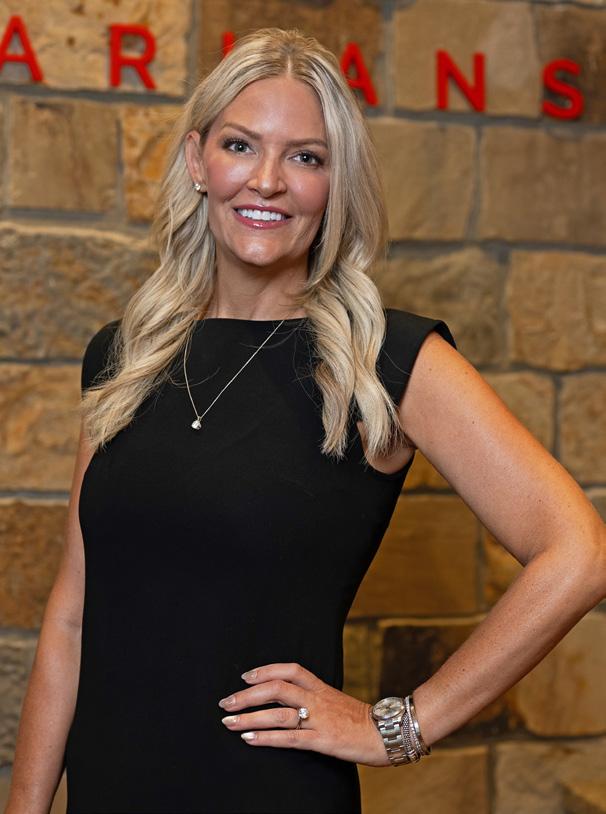
the showpiece Little Rock house opened across the street from Arkansas Children’s, offering 32 private guest suites and a dining room for 80 served by two large commercial kitchens.
In 2020, the group opened the Ronald McDonald Family Room in UAMS, located on the same floor as the hospital’s neonatal intensive care unit. That facility offers four overnight guest suites and hosts many more drop-in guests seeking a quiet place to sit, laundry facilities or a hot shower.
In Louisiana, Shreveport and Monroe seek to open a Ronald McDonald House and Ronald McDonald Family Room, respectively, in the near future, while northwest Arkansas and the River Valley operate Ronald McDonald Houses in Fort Smith and Fayetteville and a family room in Rogers.
Still, the line outside the door grows, which is driving the organization to expand once again right back in Little Rock, where another Ronald McDonald House is going to be built inside Baptist Health Medical Center, offering six private rooms and various amenities to families.
“My personal path is I’ve been involved with Ronald McDonald House, going to some of the events, for multiple years,” he said. “My wife and her family actually used Ronald McDonald House back in the day when she was younger. When she was a teenager, one of her siblings had a serious illness and spent time at Children’s. Knowing of that impact, you know, I wanted to get involved.
“You can play casino games, and if you don’t want to do that, you can go up into the VIP lounge and just watch the band, which everybody loved last year. Enjoy the food. Enjoy the drinks. Enjoy your friends.”
— Stephanie Shine
Brent Beaulieu, chief financial officer at Baptist Health, sits on the Ronald McDonald House board. He helped broker conversations between the two organizations to bring the $3.5 million project to fruition. Talking about the forthcoming house, which will occupy 6,000 square feet inside the hospital itself, Beaulieu’s emotions punch him in the throat, breaking his accountant-like calm.
“They had done the family room at UAMS, and I believe Janell had this thought that there was a need over here at Baptist, as well. As great as [Ronald McDonald House] is, there’s still some impact to families that is not ideal. You still have a mother who has a child here who’s in the NICU, and their place to stay is somewhere off campus. A lot of times, that may work, but for a new parent, that is obviously a very difficult situation, having to leave their child.”
The immediate need for funding the facility’s construction and operating costs — there is about $1 million left to raise, Mason said — has lent extra significance to fundraising, including the forthcoming A Night in Vegas, a casino event slated for Sept. 19 at The Hall in Little Rock, emceed by AY Media Group President and Publisher Heather Baker. One of the newer fundraisers on the organization’s calendar, A Night in Vegas, for which AY Media Group is a sponsor, offers a different vibe than the group’s Chocolate Fantasy Ball formal gala or even the annual golf tournament.
“I think what’s different about A Night in Vegas is it’s more
about the glitz and the glam and having fun with your friends,” said Stephanie Shine, co-founder of Arkansas Talent Group and chairperson for the upcoming fundraiser. “This is truly about networking, having fun, having a night out and really just enjoying yourself for a great cause.
Shine said while the event might not have the name recognition as the organization’s other events, being newer, those who attend are in for a fantastic evening that does not require black-tie garb or the ability to hit a 5-iron.
“You can play casino games, and if you don’t want to do that, you can go up into the VIP lounge and just watch the band, which everybody loved last year,” she said. “Enjoy the food. Enjoy the drinks. Enjoy your friends. There will be prizes and a silent auction. It really is so much fun, while you’re still making a huge difference for the organization.”
Under the best of circumstances, having a baby in the United States is a more expensive proposition than in any other country in the world. According to statistics published by Investopedia earlier this year, the average cost to give birth in the U.S. is nearly $19,000, accounting for the costs of pregnancy, birth and postpartum services.
In 1 out of every 10 cases, a baby arrives under less than the best of circumstances. Worldmetrics.org reported in May that about 10 percent of all births require some form of NICU care, and for those infants that are born preterm, the average length of stay is roughly 25 days.
AS magazine reported Americans spend about $21 per person a day on food, and the average cost of a hotel room in America clocks in at $171 per night, without allowing for seasonality, as reported by Budget Your Trip. Going strictly on those averages, one adult would spend nearly $5,000 in lodging and food expenses before the infant was released to go home.
Shine said numbers like that make Ronald McDonald House services all the more critical and added many, if not most, of the people who volunteer or donate, including those who attend and sponsor events, do so having had a child in the hospital or knowing someone who has. Shine herself is no exception.
“I have a friend who had a baby, and they stayed at the Ronald McDonald House. It was one of the
most difficult times of their lives, and [the house] just made it more comfortable and less stressful,” she said. “A lot of us who are parents, are like, ‘I couldn’t imagine if I had to go through this. I would want somebody there to help me through the situation.’
“I think if you ask anybody why they are involved or why they support Ronald McDonald House, I guarantee you they will say they either know somebody who was directly helped or because they would want something like this available if they had to go through a situation like these families have. That’s what really resonates with people.”
For Mason, just the thought of the steady stream of people living a family’s worst nightmare still gets her out of bed in the morning, ready to come to work and help. She hopes it motivates throngs of people to attend A Night in Vegas for the same reason.
“This event, for me, is a fun evening where just buying a ticket is enough to sponsor a family,” she said. “I want people to know that yes, it is a good time, but more importantly than that, they are helping Arkansas families.”
For tickets or sponsor information, visit rmhcarkansas.org/events.
Mac, a goldendoodle, is the house dog at Little Rock’s Ronald McDonald House. He is almost 11 years old and has become a staple for visitors and guests. His official title is director of smiles, and though he is not an official therapy dog, he may as well be.
Mac had to meet two requirements to become the director of smiles at the Ronald McDonald House. He had to be hypoallergenic to account for the many children with compromised immune systems that come through the house. As a non-shedding goldendoodle, the first box was checked.
However, he also had to have a good, gentle temperament and be able to handle a large number of people coming in and out, as well as interacting with sick and weak children. Box 2, checked.

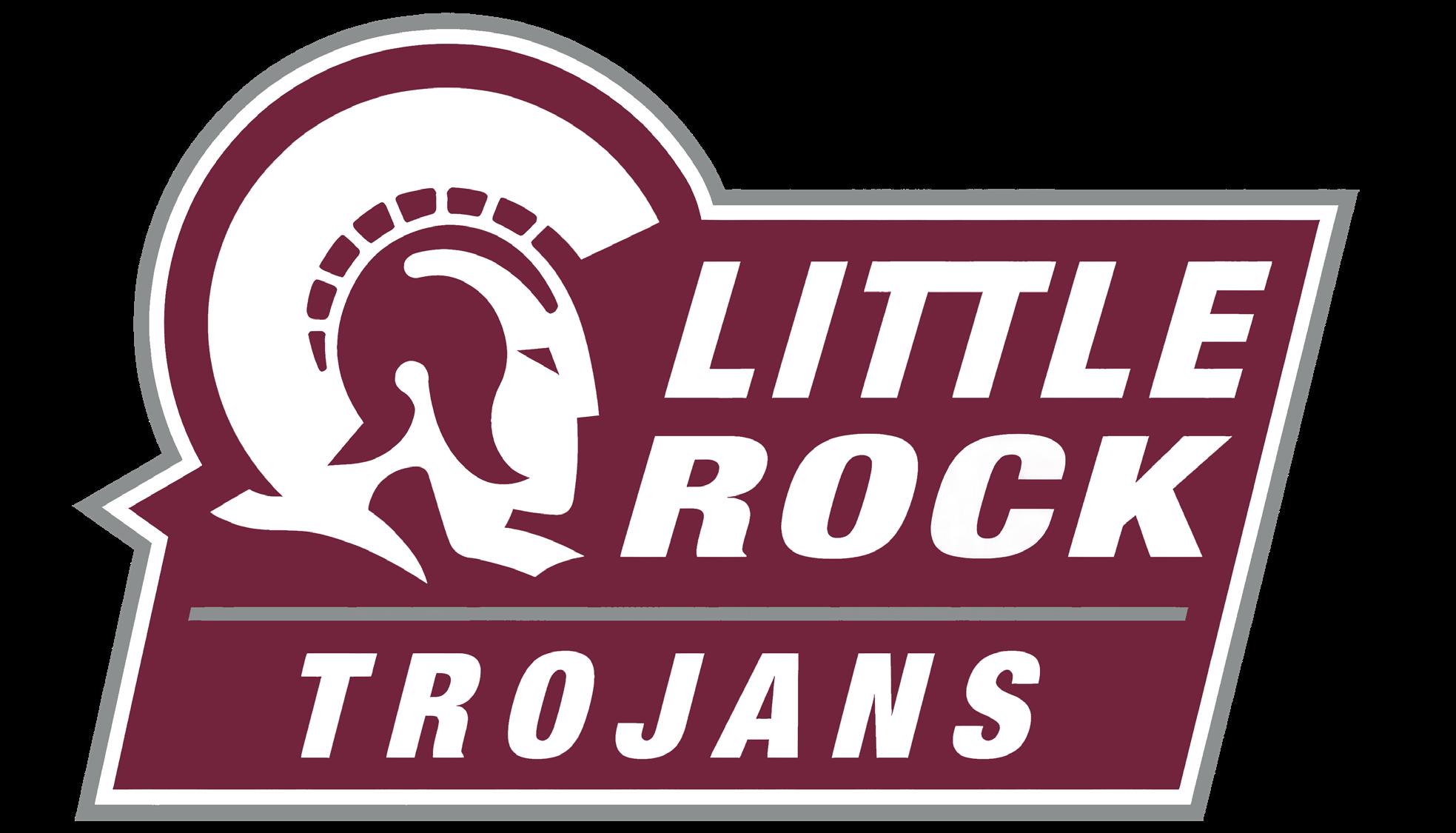
Growing Gains
Trojans
want it all in athletics and have a plan to get there
By Doug Crise

It was a warm day in July, and there was Chris Curry, walking onto a field that had driven everybody else off.
An Arkansas native, Curry moved intently up the collegiate baseball ladder after finishing a seven-year minor league career. He broke in at Hendrix College in Conway in 2007 and steadily moved up until that July day in 2014 when he was named head baseball coach of the Little Rock Trojans.
Curry’s celebration over becoming a Division 1 head baseball
coach was muted. The Trojans’ home facility, Gary Hogan Field, was not even on the Little Rock campus and badly needed refurbishing. The prior season’s players had split, having played under the shadow of a verbal abuse scandal involving then-coach Scott Norwood.
The program’s relationship with the state’s high schools was iffy at best. Between the ascendancy of Dave Van Horn’s program at Arkansas and the always-popular Arkansas Travelers close by, the Trojans program was getting squeezed out of baseball media
Photos by Ben Krain
The men’s wrestling program at Little Rock, which competes in the Pac 12, has become one of the school’s most successful sports.

coverage. Worst of all, membership in the football-centric Sun Belt Conference was taking its toll, and Little Rock was out of place against larger SBC programs located in talent-rich states such as Texas and Florida.
“Nobody wanted the job,” Curry said. “The program was down. They had a change in leadership for not-good reasons. That’s well documented. That’s not my opinion; that’s factual. It was in a tough place.”
Today, there is a framed photo of the Little Rock baseball team in the conference room that Chancellor Christina Drale uses to meet with staff and visitors. The picture shows the Trojans celebrating as a team, having completed a mad five-game run to the Ohio Valley Conference tournament championship. Curry’s team would go on to win the first NCAA tournament game in program history and then garner national attention after beating eventual national champion LSU in the Baton Rouge regional.
Drale will probably need more shelf space soon. Little Rock athletics, long an afterthought in sports outside basketball, is experiencing a resurgence not seen in program history. A new conference and a new athletics administration has galvanized the Trojans program, Little Rock finishing in a close second in the all-sports OVC Commissioners Cup a year ago and just barely missing the top spot again for the 2024-2025 athletics season.
Having finished his first full season as Little Rock’s athletic
director, Frank Cuervo, is not sitting still. With Drale’s support, Cuervo has decided now is the time to comprehensively review all aspects of the Trojans program. Facilities are getting a hard look, and efforts at donor engagement have redoubled. At the center of it all is the Trojan Athletic Fund, a comprehensive push for donations with the goals of improving facilities, retaining and compensating student athletes, and maintaining Little Rock’s newfound spot at the top of the OVC.
The question remains: Will it be enough?
“In order to support our programs at a high level, you’ve got to have a team behind the team,” Cuervo said, “and we didn’t have that. We had a number of vacancies and voids in certain areas that are critical in marketing, in sales, in fundraising.”
Cuervo brought on athletic advancement veteran Dan Crowley as deputy director of athletics, and he will be riding shotgun with Cuervo in matters of donor relations. Cuervo also hired central Arkansas sports-media veteran Nate Olson to increase the visibility and promotion of the Trojans program.
At the end of the day, it is all about the money, and it is all about what Cuervo and Drale want to do with it.
A few moves have already been made, such as the women’s soccer program receiving new field turf with heat-reducing technology at the school’s Coleman Sports & Recreation Complex.
Keeping Little Rock in the running for more OVC
Trojan fans celebrate at an NCAA tournament-selection watch party for the baseball team at Waldo’s in Little Rock.

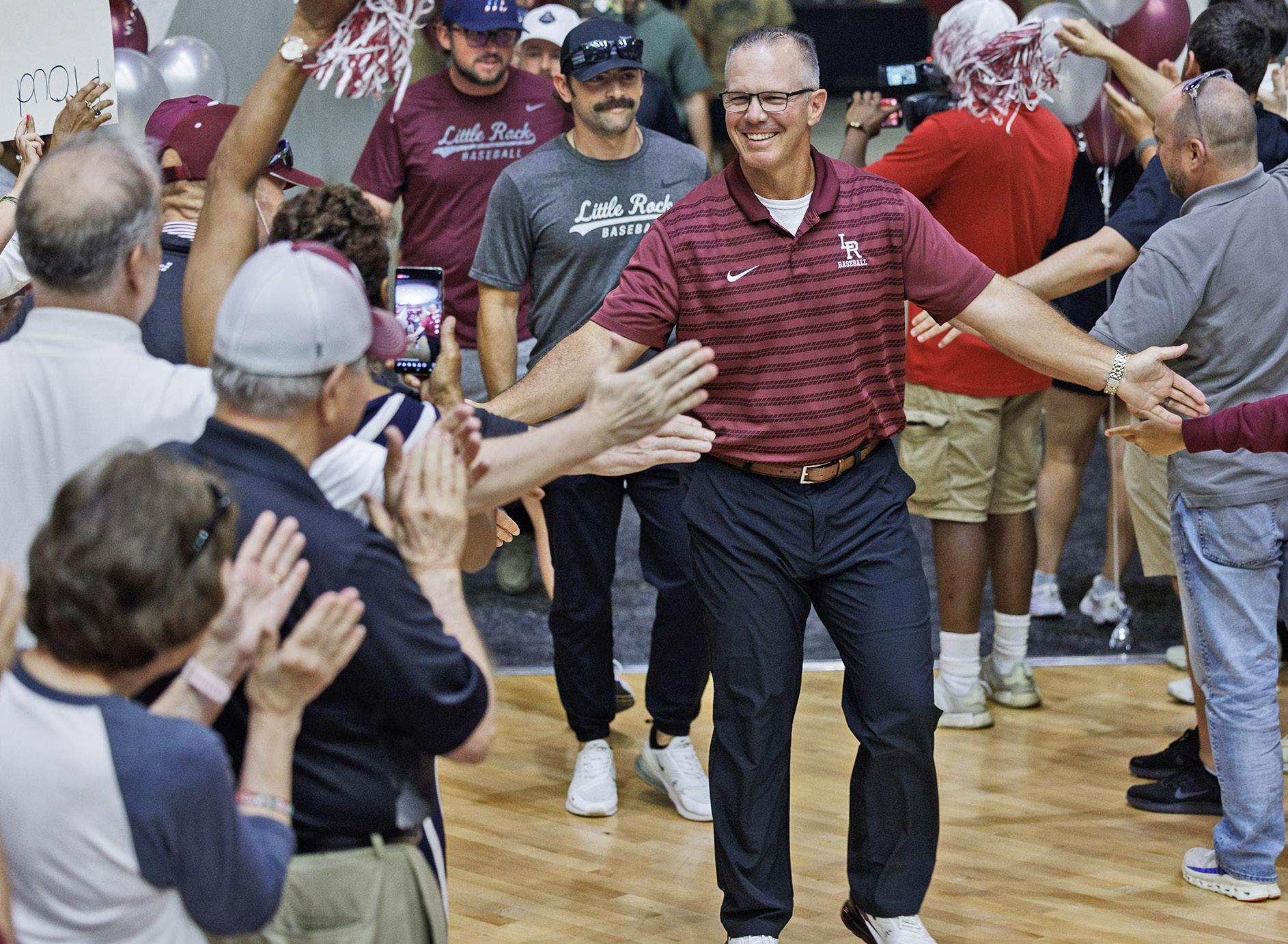
Commissioner’s Cups will require more than a fresh coat of paint.
“I won’t mince words,” Drale said. “Most of our salaries are below market, below the average market rate for similar positions at similar institutions. Now, in the Ohio Valley Conference, we’re either toward the top or toward the middle in those salary comparisons.”
Head coaches leaving for better jobs is not the worst thing it means the program is winning but the telling statistic is overall coaching staff retention. Finding a salary bump for assistant coaches ensures staff continuity in all sports, a major benefit in the recruiting process.
“I think continuity is super important,” said women’s soccer coach Kelly Farrell. “Money talks at the end of the day. I think investment in that side is really important.”
Of course, nowadays, coaches are not the only ones visiting the administration building with open wallets. The recently-passed House v. NCAA settlement threw the doors open for schools to pay their own athletes. Little Rock quickly opted in on the settlement, and with spending allowed to be up to $20.5 million per school annually, Trojans coaches want as big of a bank as possible.
“You can thank the NCAA for that,” men’s basketball coach Darrell Walker said. “They were greedy. They had temporary athletes for 60 years and didn’t give one athlete anything. If they had given every athlete $5,000, guys would be jumping out of the dorm room and going crazy, but they didn’t do that. They kept it for themselves, and now the genie’s out of the bottle. You got to pay players.”
Curry, like Walker, is more than happy to dole out university money to attract and keep the best baseball players possible. Unlike Walker, whose team practices and plays in the stillopulent Jack Stephens Center, Curry is asking for more.
“Frank Cuervo and Chancellor Drale are going all chips in,” Curry said. “On revenue sharing and opting in, there are some schools in the state that won’t. They are not opting in, and that’s OK. That’s OK. Our scenario is that we’re all in, and that’s huge. What do we need? We need a new stadium on campus. We need it, and Frank knows it.”
Cuervo said in April he and university administration will be taking a hard look at Little Rock’s current athletics facilities. On one end is the Stephens Center, which still largely looks brand new after 20 years of housing both basketball programs and the women’s volleyball program. Walker said the building could use a new practice court, and women’s basketball coach Steve Wiedower said he would not mind a little extra space for the weight room and coaches’ offices. Both coaches agree that, unlike Curry, they have few pressing needs.
“We’ve done a great job of taking care of it,” Wiedower said. “The administration has done a good job keeping it what it is, and I think it’s one of the best facilities in the state.”
Curry’s need for a new stadium highlights an issue that goes beyond money space. There is a reason the baseball facilities are off campus, and while not impossible, finding enough room on Little Rock’s metropolitan campus will be a challenge.
“I’m really very supportive of a master plan for athletic facilities that we will fold into a master plan for the whole campus,” Drale said, “but we’re not waiting for that. We’re already finding ways to upgrade.”
Cuervo is looking at the space issue, particularly as it pertains to baseball. He is quick to point out that an on-campus stadium in the barest sense will not cut it. Improvements have been made throughout Curry’s tenure to training and clubhouse facilities for the players, and anything new would have to include infrastructure for developing talent.
Cuervo is undaunted, and better yet, he thinks he can find some spare land if needed.
“The main question would be if we look for a new facility for baseball, where would that be?” Cuervo said. “There are a couple of options. There’s land the university has in its portfolio. That’s part of what this master plan will help unveil. Do we have enough land in certain areas? Then if we build on it, what’s the impact to the athletics program, the campus community and the Little Rock area at large?”
There is a good chance none of those conversations, much less an ambitious capital campaign, would be taking place were Little Rock still locked into the Sun


Little Rock baseball coach Chris Curry and his team were welcomed back to campus after winning the OVC tournament and earning an NCAA bid.
Little Rock AD Frank Cuervo and Chancellor Christina Drale, shown at the press conference announcing his 2024 hiring, have gone ‘all chips in’ on athletics.
“We really needed to look for a conference that was more basketballcentric and also more geographically accessible, and the OVC fit that bill.”
— Chancellor Christina Drale
Belt Conference. As the conference grew, the Trojans program found itself as the lone nonfootball member and near the bottom of the league in terms of university size. There is still football in the OVC but not at the FBS level like in the Sun Belt.
Little Rock administrators and coaches alike remain thrilled with OVC membership and credit it with helping spark the present turnaround.
“It became clear to us that this was not a great fit,” said Drale, who added that the total time Trojans student athletes have been traveling and away from classes has been cut with OVC membership. “We really needed to look for a conference that was more basketball-centric and also more geographically accessible, and the OVC fit that bill.”
Now that the Trojans have found a home, the university is betting more Commissioner’s Cups are in the future.
“Overall, the athletic department is upbeat,” Walker said. “All the coaches have bought into what everybody’s trying to do, and we all cheer for each other. It’s just been a blessing to sit here the last couple of years and watch people win championships, and man, it’s been amazing, to be honest about it.”




Drale and men’s basketball coach Darrell Walker celebrated the Trojans’ 2024 OVC regular season title.
Trojans guard Johnathan Lawson has helped take Little Rock to the top of the OVC.
Infielder Cooper Chaplain and the Trojans baseball team made program history in 2025.
Maximus, the Trojan mascot, is the face of a Little Rock athletics resurgence.

HOGS GEAR UP SEC GAUNTLET for another
By Mark Carter

How does one even begin to compress into mere words the journey of the Arkansas Razorback football fan, especially since Hog Nation left a comfortable life in the old Southwest Conference?
The answer, of course, is one doesn’t. Since the infamous motorcycle ride of 2012, Arkansas has flirted with gridiron respectability but been unable to sustain it on a consistent basis. That’s life in the vaunted Southeastern Conference, of course, but lest we forget, three SEC West title trophies sit in the trophy case in Fayetteville.
Xavian Sorey Jr. is back to lead the Razorback defense. (Photos courtesy of Arkansas Athletics)
The Razorbacks, however, have not seriously competed for an SEC title of any kind since Bobby Petrino roamed the sidelines as head Hog those 13 years ago. Back in town for his second season as offensive coordinator under Sam Pittman, Petrino guided the Hogs to a 21-5 record in 2010 and 2011, a span that included a BCS appearance, a Cotton Bowl win and many weeks in the top 10. Headed into the final week of regular season play in 2011, ESPN dubbed the former SEC West the “SEC Best,” the consensus top three teams in the land being Alabama, LSU and Arkansas.
These days, Arkansas continues to field an overall athletics department as competitive as almost any, but when it comes to football the bell cow sport that makes all other college sports possible the Razorbacks are usually looking up at their peers. Heading into the 2025 campaign, the Hogs are a consensus bottom three or four pick in the SEC. That’s coming off a 7-6 campaign capped by a Liberty Bowl win.
One could consider the built-in disadvantages the U of A faces as a member of the SEC in a rural state that

THE GOOD NEWS?
In Year 2 with Petrino and quarterback Taylen Green, the Razorback offense is poised to be very good.
THE BAD?
The
hit-or-miss defense may take a step back, and the schedule is its usual brutal self.
program before 1991, when Frank Broyles engineered Arkansas’ departure from the sinking ship that was the Austin-ruled and perpetually corrupt SWC. He was right to do so; the SWC was terminal by the end of the 1980s, when Arkansas won back-to-back regular season titles on the gridiron.


does not produce many DI football players. One could reason that in any other league outside the Big Ten, the Hogs are a perennial eight- or nine-win program, although the same could be said of many Power 4 schools.
Razorback football just can’t seem to get out of its own way. Arkansas was still considered a top-20 football
Broyles tried to prepare the fan base all those years ago. “We’ll go from one ‘Texas’ every year to seven or eight,” he said, referencing the tendency of SWC teams to save it all for UT, a consistent national contender with resources that dwarfed those of its peers.
And he was right. Despite themselves, Arkansas fans
Sam Pittman
Bobby Petrino
Travis Williams

(and coaches and players) always circled the next Texas game on the calendar before a season was even complete. While the SWC was on par with any conference through the ‘70s, its encapsulated footprint and the expansion of pro football across the South was not a good combination for the league’s ‘Vanderbilts,” smaller private schools like Rice, SMU, TCU even Baylor. Most of the time, the SWC’s big gridiron three consisted of Arkansas, Texas and Texas A&M.
Hog fans found out in a hurry that, unless it’s the Egg Bowl, Iron Bowl or Cocktail Party, one can’t circle a single SEC game. The vast majority of league games are circle-worthy every year. No breathers. And thanks to the conference schedule makers in Birmingham who


seem to despise Arkansas, the Hogs annually face one of the toughest schedules in the country. This year provides no exception, the first four games being played in different stadiums and half the schedule included in the preseason top 25.
The Hogs won’t have to wait long to run a gauntlet. After the opener, Arkansas will face an inspired ASU squad in Little Rock before embarking on back-to-back road trips to Memphis and preseason top 10 Ole Miss. Then comes 2024 national runnerup Notre Dame on Sept. 27. (The first-ever matchup with the Irish will be nationally televised by ABC, but kickoff is set for you guessed it 11 a.m.)
When Texas A&M rolls into Fayetteville on Oct. 18 (marking the end of the Southwest Classic game in Arlington), the Hogs will host their first SEC home game. On that same day, meanwhile, Missouri will embark on its first road game of the season, SEC or otherwise.
This season, the Hogs get one game that can legitimately be considered a “breather” the opener on Aug. 30 in Fayetteville against 1-AA Alabama A&M. After that, six teams currently listed on preseason top 25 polls (most in the top 10) await Pittman in what many believe is his make-or-break year.
Plus, for some reason that defies common sense, Hunter Yurachek scheduled Arkansas State in Little Rock and two-for-one series with Memphis and Tulsa. (Power 4 schools ought never to schedule road games at Group of Five schools, even if they get two home games in return.) Perhaps this will be the last game in Little Rock as of Aug. 1, the ASU game was still not a sellout but regardless, this type of scheduling perpetuates the notion that
Taylen Green is back to lead the Arkansas offense.
Fernando Carmona
Cameron Ball
Arkansas can’t get out of its own way.
The good news? In Year 2 with Petrino and quarterback Taylen Green, the Razorback offense is poised to be very good. Incoming portal additions have seemingly added depth up front and the running back room (which welcomes back speedy AJ Green in ’25) could be one of the better groups in the SEC. Plus, Arkansas typically does better when expectations are low.
The bad? The hit-or-miss defense may take a step back, and the schedule is its usual brutal self. Depth is back as a concern on the line, and the secondary will need to avoid lapses that saw Ole Miss dink and dunk down the field at will last year. Linebackers could be the strength on Travis Williams’ third Arkansas unit.
If the Hogs can limit turnovers in 2025, they could improve on seven wins. The Hogs suffered a couple of sound defeats last year, but most of the losses were, in typical Hog fashion, inexplicable. Arkansas outscored opponents 103 to 58 in the first quarter in 2024 but could not finish winnable games. Many of the offense’s TOs last year were drive-killers, often likely scoring drivekillers. In fact, the Hogs fumbled the ball 30 times last year, losing 14 of them. That’s compared to opponents losing just five of 11 fumbles.
Forcing more turnovers and finding a way to pressure
Alabama A&M Bulldogs
Saturday, Aug. 30, 3:15 p.m.
SECN
QBs will be priorities for the defense.
All-star candidates include Green at QB, Outland Trophy watch-list member Fernando Carmona (back at his natural guard position on the OL), linebackers Xavian Sorey Jr. and Stephen Dix Jr., DL Cameron Ball, and punter Devin Bale, and don’t sleep on running backs Braylen Russell or New Mexico State transfer Mike Washington Jr.
Notable transfer portal additions include WRs O’Mega Blake from Charlotte and Pine Bluff native Courtney Crutchfield from Missouri, OL Corey Robinson II from Georgia Tech, highly sought-after DL David Oke from Abilene Christian and DB Julian Neal from Fresno State.
Many national publications are setting the over-under win total for the Hogs at 5.5 or 6.5. A couple of nonconference losses are possible, however, and the Hogs have struggled to play .500 ball in SEC play of late. Pittman’s staff, though, has remained intact for a couple of years now, and the Hogs have talent.
Will the breaks go Arkansas’ way in 2025? Good teams make their own breaks, of course, and anything short of a bowl game will surely mean the end of the Pittman tenure, so Hog fans once again belly up the bar in 2025 with trepidation.

Oct. 4
Saturday, Nov. 8
Saturday, Sep. 6, 4 p.m.
Arkansas State Red Wolves (Little Rock)
SECN+/ESPN+
@ Ole Miss Rebels
Saturday, Sep. 13, 6:00 or 6:45 p.m.
ESPN or SECN
@ Memphis Tigers
Saturday, Sep. 20
Time TBA
Notre Dame Fighting Irish
Saturday, Sep. 27, 11 a.m.
ABC/ESPN+
@ Tennessee Volunteers
Saturday, Oct. 11, 2:30-7 p.m.
TV TBA
Texas A&M Aggies
Saturday, Oct. 18, 2:30-7 p.m.
TV TBA
Auburn Tigers
Saturday, Oct. 25, 11 a.m.–noon
TV TBA
Mississippi State Bulldogs
Saturday, Nov. 1, 2:30-3:30 p.m.
TV TBA
@ LSU Tigers
Saturday, Nov. 1, 11 a.m.-noon
TV TBA
@ Texas Longhorns
Saturday, Nov. 22, 2:30-7 p.m.
TV TBA
Missouri Tigers
Saturday, Nov. 29, 5-7 p.m.
TV TBA
SEC Championship (Atlanta) Saturday, Dec. 6, 3 p.m.
ABC/ESPN3
RAZORBACKS 2025

YOUNG MONEY
What do NIL dollars mean for high school athletes?
As students approach the end of their high school years, college tends to dominate most every conversation. For student-athletes, that now includes potential compensation for name, image and likeness.
While currently only high school students who will for sure play at an Arkansas college are eligible to receive NIL funds, that could change as NIL laws continue to evolve.
In 2021, the NCAA announced an interim policy allowing for the commercialization of NIL for college athletes. The policy prohibited and still prohibits schools from using financial incentives to
recruit or retain student athletes and prohibits schools from paying athletes to play.
That same year, Arkansas passed the Student-Athlete Publicity Rights Act, which allows student-athletes to enter into a contract to receive compensation for the commercial use of their publicity rights as defined in 2016 by the statute’s predecessor, the Frank Broyles Publicity Rights Protection Act.
The Arkansas Student-Athlete Publicity Rights Act has since been amended twice. In 2023, the statute was amended to allow colleges and universities to facilitate NIL contracts, and in 2025, colleges and universities became eligible to enter into
NIL contracts with student-athletes.
Notably for the Wampus Cats, Devil Dogs and other hometown teams, the act was also amended in 2023 to allow high school students to enter into NIL contracts under certain conditions. For example, the students must be admitted to a college or university in Arkansas; have signed a national letter of intent to enroll at a college or university in Arkansas; or have signed some other agreement to enroll at a college or university in the state.
“What you heard in each of those three conditions is that only if the high school student is affiliated with a higher ed institute within the state of Arkansas can
they participate in NIL deals in Arkansas,” said Judy Henry, partner and chair of the sports law practice at Wright Lindsey Jennings in Little Rock and one of Arkansas’ foremost sports attorneys.
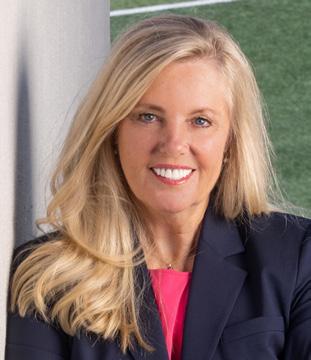
Henry noted the statute prohibits players who plan to leave the state for college and those who have not yet made a decision to remain in Arkansas from participating in NIL.
Missouri has similar requirements about students being somehow committed to play in-state at the collegiate level before entering into NIL agreements, she said, while Tennessee’s statute allows students as young as ninth grade to participate in NIL if they plan to enroll in a college or university in the future in-state or otherwise.
Texas does not have any requirements that high schoolers be committed to play in-state but does prohibit students younger than 17 from entering into NIL deals unless they are already enrolled in college, she said.
The heart of the matter is this: Studentathletes can make money big money before they even graduate high school.
“For the studentathlete committed out of state, there are significant NIL opportunities with their committed schools and businesses that they are missing because of the current restrictions. The rights of these student-athletes are not recognized under the current law.”
— Judy Henry, Wright Lindsey Jennings
“I think there ought to be a maximum amount of money,” he said. “I think you ought to be a senior in high school, and honestly, I’d like to see us implement an academic end of it, too, where a young man needed to have a certain GPA.”
He said the responsibility falls to high school coaches to mentor players when it comes to NIL. It is a sentiment shared by Kevin Kelley, head football coach at Sheridan High School.

“They need to be counseled on, No. 1, you’ve got to pay taxes on it. No. 2, invest it. Don’t go out and spend it on 10 cars, you know? Do something that’s going to benefit you in the future, make your life easier,” he said. “I would visit with them and their parents on that.”
Although it can be good for studentathletes and their families to benefit from NIL while still in high school, conflicts can arise when teenagers suddenly find themselves with vast amounts of money, he said.
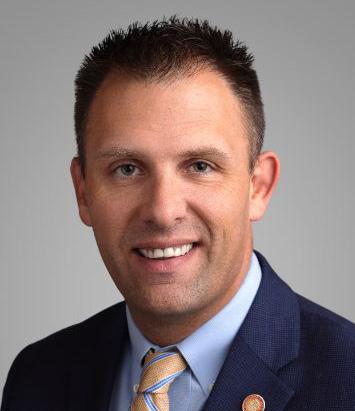
“Let’s hypothetically say I know some kids that played football, and after the season was over, they signed their national letter of intent, and before they went into college, they were doing some advertising for a boat company in central Arkansas,” said state Rep. RJ Hawk. “It’s things like that, making a little bit of money before you go off to college.”
Hawk put together a think tank comprised of attorneys, coaches, parents and former high school athletes across the state to discuss NIL and its implications for high schoolers in 2023. He said he received mixed responses.
“While we were having meetings, I would throw things out on social media and just
kind of get reactions from people,” he said. “I’ve got a fairly large following on social media, and there was a lot of negativity toward it a lot from parents. Now studentathletes were all for it, right? Studentathletes were like, ‘Yes,’ but I still have some saved letters that I got in my mailbox from parents that were like, ‘This is not what we need right now.’”
Brad Bolding, head football coach at North Little Rock High School, said he leans toward a more conservative approach when it comes to high school student-athletes receiving NIL money.

Brad Bolding
He added that he worries how one student receiving NIL money could affect the team dynamic and would like to see a cap on the amount of money student-athletes can receive at all levels, which would allow more student-athletes to participate in NIL.
Although the commercialization of NIL is currently prohibited for students who are not committed to play in-state, Henry said the statute has yet to be challenged, and she is not sure who is responsible for enforcing such restrictions.
“I don’t see that the statute has any teeth in it for either the business or the high school student-athlete as a consequence of doing a contract that is statutorily prohibited, but that doesn’t mean that someone wouldn’t step forth to try to enforce the statute,” she said. “The [Arkansas Activities Association] has strict rules for high school athletes. In its handbook, the AAA recognizes high school student-athletes have NIL rights, so maybe the AAA will exercise oversight.”
Kevin Kelley
Judy Henry
Rep. RJ Hawk
She added that she would like to see Arkansas broaden its law to include students who have been admitted to colleges and universities out of state. Although retaining quality players benefits Arkansas institutions, student-athletes who choose to study elsewhere for family, educational or other reasons may miss out on a one- or two-year opportunity, she said.
“We have some really great higher ed institutions here, and I would advocate that those provide great opportunities for high school student-athletes to further their education and play their sport,” she said, “but if they decide that is not in their and their families’ best interest, I would hope that we could give them an opportunity to participate in NIL, just like every other student-athlete.”
There is something else that strikes Henry about the law, as well. Despite Arkansas being renowned for its hunting opportunities, firearms are among the items athletes are banned from promoting. Henry said that while the statute makes sense for some weapons, it makes things tricky for athletes who may want to enter into a contract with businesses such as outdoor outfitters.
Both Hawk and Henry agreed that NIL is generally good for studentathletes, who are often the only students on a college campus who are unable to work. However, Hawk said, it is important to have regulations governing NIL deals.
“The way that it’s been handled and the way that it’s been governed, it’s the Wild Wild West,” Hawk said. “I think that people have seen the image of what’s happened at the collegiate level, and they’re like, ‘We don’t want that with our high school athletes right now.’”
Bolding noted that the collegiate transfer portal and NIL have become twin demons in the eyes of fans as players jump from school to school in search of more lucrative NIL deals. If high school booster clubs were to enter into NIL deals with students, the results could be disastrous for poorer school districts, he said.
“Do I see that happening? I really hope it doesn’t because that could be something that could get really ugly,”
“The way that it’s been handled and the way that it’s been governed, it’s the Wild Wild West.”
— State Rep. RJ Hawk
he said. “It would not be good for the districts that are underprivileged and impoverished.”
Hawk pointed to recent legislation tightening eligibility requirements for students who transfer schools to participate in extracurricular activities as a mitigating factor. The law requires students who transfer after June 1 following freshman year to sit out for 365 days.
However, he said there could be some interest in using NIL as a recruitment tool for high schoolers with devastating consequences for small-town Arkansas.
“I think that the law we passed this year kind of helps with that, but I do think that there are people that look at NIL and say are we now going to take that to the high school level and say, ‘Car Dealership A or Bank A, we want this kid in West Memphis to come to Bryant or whatever it might be. Let’s just pay to get his family here’?” he said. “That could be a real slippery slope, as well.”
Will NIL ever become available to high school students who have not yet committed to play college ball in Arkansas? Henry said it might be worth considering.
“Although I have not seen a market for Arkansas high school studentathletes who do not intend to pursue sports beyond high school, there is certainly a market for student-athletes who are either holding off on making a college commitment or have committed to an out-
of-state school,” she said. “These studentathletes lose opportunities with Arkansasbased and out-of-state businesses.
“For the student-athlete committed out of state, there are significant NIL opportunities with their committed schools and businesses that they are missing because of the current restrictions. The rights of these student-athletes are not recognized under the current law.”
She added that Arkansas’ NIL statute allows agents who are not licensed attorneys to represent student-athletes in NIL transactions, which concerns her not only as an attorney but as a former collegiate athlete and the mother of a collegiate athlete.
“Would I have wanted a nonlawyer representing our son?” she said. “No. Every word in that contract means something, and I would want someone who knows what they’re doing, has experience in the field to represent him. Being a mom and a lawyer, I know the value and the importance of that.”
Kelley said he would like to see tightened restrictions about who is eligible to represent student-athletes in NIL deals at both the high school and college levels.
“In the NFL, in the NBA and Major League Baseball, when you’re dealing with people, you have to have a certified agent to deal with or the individual himself, and in college NIL, you do not,” he said. “You could be dealing with somebody’s uncle or aunt or a friend of a friend. It goes all over the place, and to be honest with you, those people aren’t held accountable if they’re not doing what’s best for the student athlete.”
Hawk said Arkansas lawmakers will continue to examine NIL as it applies to high school students. He added that he hopes to find a happy medium that allows students and their families to benefit from NIL while reducing risks to students who are still learning about money.
“We’ve got to stress fundamentals and getting kids ready for the game, and the high school level’s where that happens,” he said. “If we make everybody a pro, then we never have amateur sports anymore, and the minute you start getting paid is when you start becoming a pro.”


CASTLE ON THE LAKE
No longer is there a permanent community of Carmelite friars at Marylake Monastery just south of Little Rock, but the Marylake “castle” still stands, keeping watch over 240 acres of pine-covered retreat in extreme eastern Saline County, just before those south Arkansas piney woods brush up against the rich, alluvial soil of the Delta.
The Catholic Diocese of Little Rock still owns the property, which it has since 1952. That is when Marylake was opened as a novitiate house for the Discalced Carmelite friars of the Semi-Province of St. Thérèse, based in San Antonio but encompassing all of Arkansas, Louisiana, Texas and Oklahoma, as well as a convent in Iowa.
Today, the property is used as a retreat
No novice friars, but Marylake Monastery still serving
for friars and other officials across the province footprint, including the nuns at Carmel of St. Teresa of Jesus in Little Rock, as well as a home away from home for visiting priests ministering to Carmelites in the area, carrying out duties within the diocese or seeking a contemplative refuge.
Two resident priests are expected to remain on-site through 2026, said Katie Zakrzewski, associate editor at Arkansas Catholic, the DOLR’s weekly newspaper, and who has written much about the property. Even though its role has changed, Marylake is expected to always remain a Carmelite facility, she added.
“Every three years, the friars gather to discern God’s will for the province and changes to be made in a two-week

By Mark Carter
regional assembly called the provincial chapter,” she said. “The chapter in 2023 established the need to focus more on the communal and contemplative aspects of the Carmelite vocation, leading to new assignments for Marylake. Paul Garro, chief development and external relations officer at St. Therese Province, said in August of 2023 that it doesn’t appear that the intended use of Marylake will change soon, given the contemplative function it serves in Carmelite life.”
The property now known as Marylake began to take shape in 1895 as a 400-acre tract on which a 50-acre lake was created from the damming of Clear Creek. A grist mill was opened on the site in 1906, but the dam ultimately broke, the lake dried up, and the property lay unused

The entrance to the monastery off Arch Street Pike (Arkansas 367), south of Little Rock. (DOLR)
for 11 years, the Encyclopedia of Arkansas states. The dam was repaired, the lake filled in and a small clubhouse built by the time 240 acres were sold to the Shriners in 1926 for $23,000.
The Shriners envisioned a country club, and 100-pound stones were hauled from nearby Pinnacle Mountain to lay the foundation of what would become known as the castle. Though the golf course was the second largest in the state at the time, the glory days of Shriners Country Club were few the 1929 stock market crash led to the organization defaulting on its loan. The property ultimately landed in the hands of what the Encyclopedia of Arkansas calls a “notorious medical quack,” Dr. John Brinkley, in 1937. Per the encyclopedia, his operation implanted goat testicles onto aging men in an effort to restore sexual vitality.
the property would continue to be used for Christian purposes), but by 1952, the LeTourneaus had sold to the Carmelites.
The Carmelites of St. Therese Province were looking for a spot to plant a monas-
“Carmelite novices for the region would study at Marylake for a year in preparation for taking vows,” Zakrzewski said.
Marylake of old included a farm with chickens, dairy cows, bulls and a few acres for growing vegetables. A provincial cemetery and lagoon were built on the old 9th hole. A pedestrian suspension bridge, still intact, spans the lagoon to connect the castle and the cemetery. By the 1980s, however, the majority of the property was converted into a loblolly pine tree farm, and the old fairways were beginning to fade.

A 1939 postcard features a rendering of the former ‘Shrine Country Club.’ (Encyclopedia of Arkansas)
Brinkley filed for bankruptcy not long after the “hospital” was opened, and the property was picked up by Little Rock’s Baptist Hospital for use as a convalescent home. In 1947, Marylake changed hands again, into those of private landowner R.G. LeTourneau. His wife, Evelyn, ran a Christian boys’ camp on the property (Baptist had included a provision in the sale that
tery to train novices, and with its natural retreat-like setting outside the city but still close, Marylake fit Carmelite needs to a tee. The order bought the castle for $60,000. It was dedicated in 1962 and renovated in ’77.
At its heyday in the 1960s, as many as 27 novices, priests and brothers were living on-site, the encyclopedia states. The priests traveled to Catholic parish churches on weekends.
The monastery also includes two guest houses, one with three bedrooms and the other a single, a lakeside hermitage, and facilities to accommodate weekend youth retreats and private retreats. It even hosted an annual Christmas dinner for Arkansas parish priests and an annual fall retreat for Carmelite friars in Arkansas, Oklahoma and Texas.
Marylake may no longer serve its original purpose, but it continues to serve as needed. Likely unknown to the majority of central Arkansas residents, it stands watch still over the enveloping woods, an interesting talking point for drivers-by on Arkansas 367.

The Marylake ‘castle’ is visible from the highway. (Google Maps)
Collaboration is Key
The impact of 33 hospitals aligning around one common goal is powerful
By Nirvana Manning, M.D.
There was something truly remarkable about standing in the Arkansas Museum of Fine Arts earlier this month, surrounded by maternal health leaders from across the state. For a few hours, the politics and pressures of our daily work gave way to a shared purpose: making Arkansas a safer, healthier place to give birth and be a mom.
As an organizer of the Aug. 6 Maternal Health Roundtable: Convening Arkansas Birthing Hospitals, I was deeply moved to see leaders from many of our state’s 33 delivering hospitals represented. It is no small thing to pause in the middle of summer, drive to the capital city, and commit time, energy and attention to one of our state’s greatest challenges. I left the convening with a remarkable sense of hope.
We came together not just to talk but to build, listen to and learn from one another. Most importantly, we came together to align around a new vision, one where every hospital, no matter its size or location, plays a vital role in improving outcomes for moms and babies.
That collaboration comes at a critical moment. Arkansas continues to face some of the highest maternal mortality and morbidity rates in the nation, but with the passage of the Healthy Moms, Healthy Babies Act earlier this year and the launch of the Arkansas Center for Women & Infants’ Health, we now have a clear path forward, along with the tools to navigate that path.
The ACWIH, based at the University of Arkansas for Medical Sciences in Little Rock, was created to build a coordinated, statewide response to maternal health needs. Thanks to a federal grant championed by U.S. Sen. John Boozman, we are investing in outreach and innovation in all regions of the state. From distributing infant care supply kits to launching coordinated postpartum care models, the ACWIH is reimagining what maternal care can look like across Arkansas.
At the roundtable, I shared updates about our growing hospital partnerships, the newly launched website myarkansasbirth. org and the timeline for our upcoming initiatives, but what inspired me most were the stories and commitments I heard from others. Rural hospitals talked about building stronger referral networks and shared ideas for integrating doulas, midwives and our family practice partners into clinical teams. We heard insights from advocates, policymakers and public health experts, and all the comments underscored one major truth that improving maternal health cannot and will not be a one-hospital job. It has to be a team effort.
That is why I am so grateful to the Arkansas Hospital Association for their partnership in hosting this event. Their leadership, alongside voices from the Arkansas Department of Health, the Doula Alliance of Arkansas, the Arkansas chapter of the American
Academy of Pediatrics, Ingeborg Initiatives and many others, reminded us that we each have a piece of the puzzle. When we put those pieces together, we can take steps together to change the future of health care.

Dr. Nirvana Manning
We heard from key advocates who helped shape important policy wins during the most recent legislative session. Those changes including expanded doula access, increased Medicaid reimbursement and unbundling of services for prenatal and postpartum visits, and presumptive eligibility for improved access to care are already opening new doors for families, but passing legislation is just the beginning. Implementation happens on the ground in hospitals, clinics and communities. That is why this convening matters.
The roundtable ended with a powerful discussion among hospital leaders about what statewide alignment could look like. We explored opportunities for joint training, data sharing, discharge planning and maternal warning sign education. These may not seem like glamorous changes, but they are laying the groundwork for saving lives.
So where do we go from here?
We keep going. We keep showing up. The ACWIH plans to continue convening hospitals quarterly to share updates, address barriers and surface solutions. We will refine our statewide infrastructure. We will expand access to postpartum care and supplies. We will identify ways to reach more women and families. Most importantly, we will stay rooted in the idea that collaboration is our most powerful tool.
To every hospital leader, nurse, advocate, policymaker and provider who joined us at the roundtable: Thank you. Your willingness to engage, share and lean into this moment brings me great joy and hope.
To Gov. Sarah Huckabee Sanders and Sen. Boozman: Thank you for believing in this work and helping us bring it to life. Your support is helping transform care in ways that will be felt far beyond the hospital walls.
Together, we are writing a new story for maternal health in Arkansas, and I could not be more hopeful about what comes next.
Dr. Nirvana Manning is the chair of obstetrics and gynecology at the University of Arkansas for Medical Sciences in Little Rock.
From the Natural State to the Nation’s Backbone, Lexicon is Arkansas-born and building America.
Through steel fabrication, steel erection, industrial maintenance, new construction, energy services, golf course construction and more— we don’t just deliver projects; we put hardworking hands behind every beam, weld, and foundation to insure excellence in every detail from start to finish.
Our values of people, quality, safety, and innovation have guided us through every project since 1968 and will continue to guide us for years to come.
If you’ve got a big project, start with Lexicon. We get it done. Scan the QR code to visit our website.



Named “Best Place to Have a Baby ” by
AY readers for six ocnsecutive years
Nurser y alliance with Arkansas Children’s Hospital
Specialized team including a newborn speech pathologist and a neonatolog y APRN
Our Labor & Delivery team brings together innovative services and specialized care to welcome your baby into the world – with compassionate providers here for you both. This is not mass-produced health care This is your family’s health care.


